test
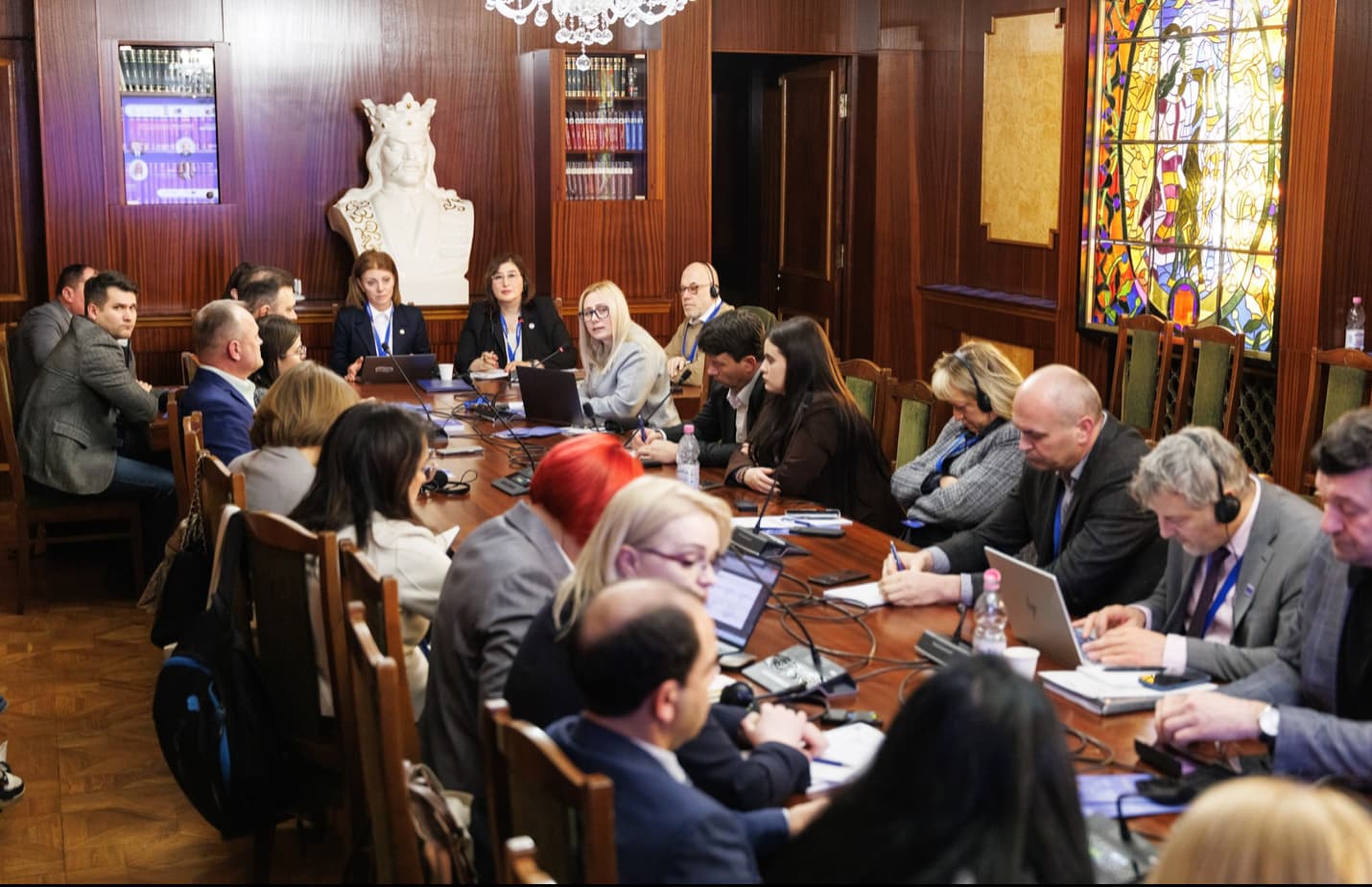
Democracy at the Ballot Box: Moldova’s Post-Electoral Reflection
Written by Dr. Dorina Baltag, Visiting Fellow, Institute for Diplomacy and International Affairs
Post-electoral moments are often treated as administrative closure. Ballots are counted, mandates are distributed, and attention shifts forward. Yet in democracies operating under sustained external pressure and internal reform fatigue, post-electoral reflection is not closure, it is consolidation.
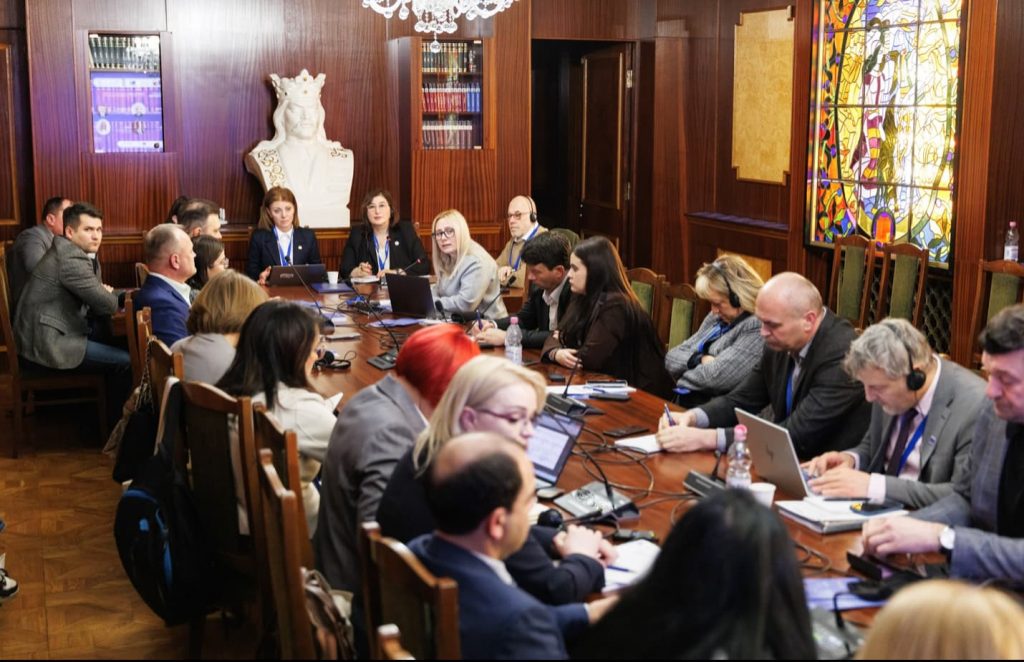
On 19-20 February 2026, the Central Electoral Committee of Moldova convened a two-day post-electoral conference to assess its 28 September 2025 parliamentary elections. Bringing together the electoral administration, public institutions, civil society, international observers, development partners, and diaspora representatives, the event offered something relatively rare in the region: a structured, institutionalised space for collective democratic self-assessment.
Beyond reviewing procedures, the discussions implicitly addressed a broader question: what does democratic resilience look like when legitimacy is contested, trust is fragile, and hybrid interference is persistent?
Resilience Is Produced Through Coordination
A first key conclusion emerging from the data presented is that Moldova’s democratic resilience is not primarily a function of formal institutional capacity. Rather, it is produced through coordination.
The 2025 elections took place in a context of intensified foreign information manipulation and interference (FIMI), illicit political financing risks, and sustained polarisation. Yet the electoral process itself remained operationally robust. This was less the result of institutional insulation and more the outcome of networked cooperation between the Central Electoral Commission, law enforcement bodies, civil society monitors, independent media, and diaspora networks.
For enlargement countries operating in contested geopolitical spaces, this lesson is particularly salient. Democratic security increasingly depends on coordination ecosystems rather than single institutions.
Beyond Numbers: The Diaspora as Political Infrastructure
Diaspora participation was frequently referenced in quantitative terms, i.e., turnout figures, percentage shares, electoral impact. These metrics are undeniably significant. However, numbers alone obscure the structural dimension of diaspora engagement.
The Moldovan diaspora has evolved into more than an electoral constituency. It functions as a transnational civic network, a channel of European norm diffusion, and an informal diplomatic actor shaping narratives about Moldova within EU member states.
Reducing diaspora engagement to voting logistics risks overlooking its strategic democratic function.
Equally, mobilising diaspora participation primarily during electoral cycles leaves a structural gap between episodic political activation and sustained institutional dialogue. In the absence of embedded consultation mechanisms, diaspora engagement remains politically visible but institutionally peripheral.
This creates a paradox: the diaspora is electorally decisive yet governance-light.
Reframing diaspora not merely as voters abroad but as part of Moldova’s democratic infrastructure would shift the discussion from logistics to long-term political integration – a shift that becomes particularly relevant in the context of EU accession and democratic alignment.
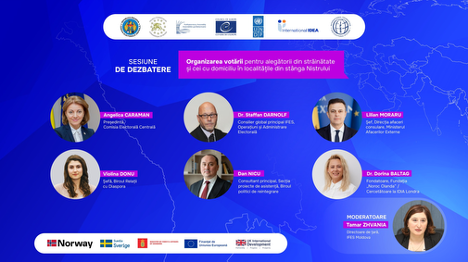
Trust as the Missing Strategic Variable
While procedural integrity and institutional coordination featured prominently in the discussions, one critical variable remained underexplored: trust.
Electoral systems can be technically robust and procedurally compliant yet remain vulnerable if public confidence in institutions is fragile. In Moldova’s case, the 2025 elections were not primarily threatened by technical failure. The more persistent risk lies in legitimacy erosion.
Hybrid interference strategies increasingly operate through perception rather than penetration. Their objective is not to disrupt ballot counting, but to cultivate scepticism, amplify grievances, and normalise institutional doubt. In low-trust environments, this form of interference finds fertile ground.
The conference rightly emphasised coordination and resilience. Yet without a parallel strategy for rebuilding social trust, resilience risks remaining defensive rather than transformative.
Why This Matters Beyond Moldova
Moldova’s experience resonates beyond its borders. Enlargement countries operate in an increasingly complex security environment where democratic processes are simultaneously domestic political events and geopolitical arenas.
The post-electoral conference in Chișinău demonstrated a commitment to structured reflection, multi-actor dialogue, and forward-looking agenda-setting. This in itself is a signal of democratic maturity.
For the European Union, Moldova represents both a candidate country and a democratic stress test. Its ability to maintain electoral integrity under hybrid pressure while pursuing accelerated European integration offers insight into the evolving relationship between enlargement and democratic security.
The key lesson is that resilience cannot remain reactive. It must become institutionalised, i.e., embedded in coordination mechanisms, trust-building strategies, and sustained civic engagement. Ultimately, democracy at the ballot box is not only about polling stations and voter lists. It is about predictability, inclusion, and the credibility of the relationship between citizens and the state — both at home and abroad.
Dr Baltag is a Visiting Fellow of the Institute for Diplomacy and International Affairs. She researches EU external relations and diplomacy, with particular focus on democratisation in the Eastern Partnership. Outside of academia she is the cofounder of Noroc Olanda Stichting, a Moldovan diaspora NGO based in the Netherlands. If you would like to get in contact with Dr Baltag, head to her LinkedIn page.
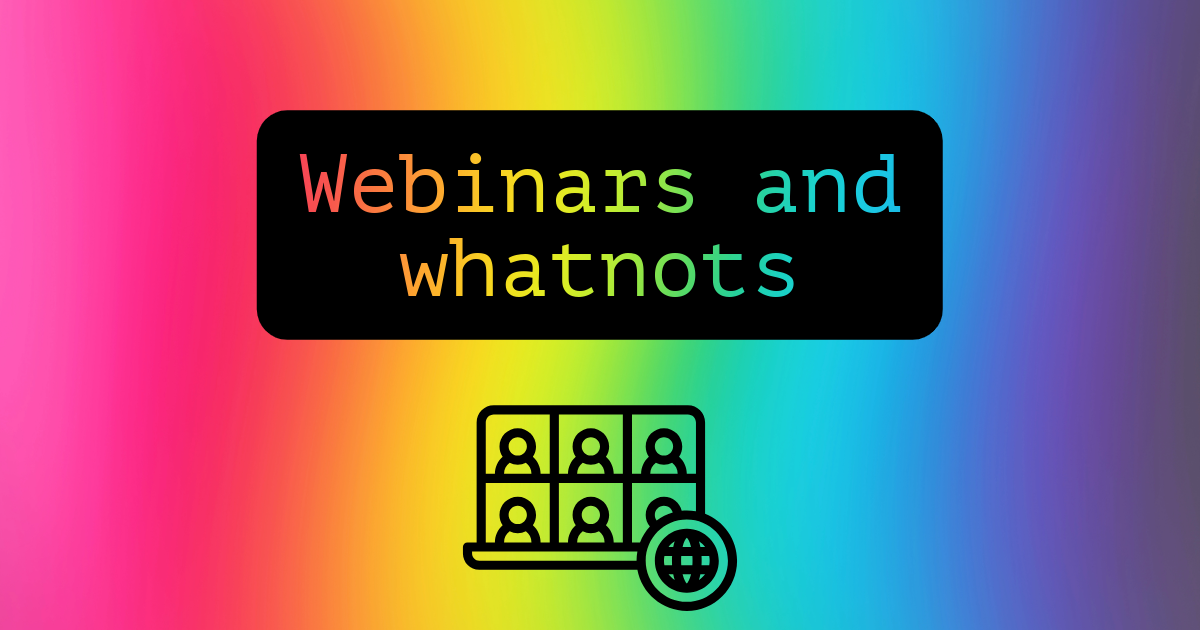
Webinars and whatnots – February 2025
Upcoming:
- Open Research Week 2026: 2-6 March (Edge Hill University, the University of Liverpool, Liverpool John Moores University, and the University of Essex
- Edinburgh Open Research Conference 2026: 18 June
- University of Derby Open Research Week: 11 & 12 March
Catch up:
Of interest:
Previous months’ Webinars and whatnots:
Research in Action - Vic Simms
Here is the latest instalment of our blogs about the Mr Barton Maths Podcast. This blog features Vic Simms from Loughborough University and you can hear his podcast with Craig here or in your usual podcast app.
Vic writes:
Returning the Craig Barton podcast is a pleasure, and a great opportunity to discuss our research on how families can support their children’s early mathematical development. As a developmental psychologist, I am fascinated about how children’s blossoming cognition, especially related to mathematics, can be supported through interactions in their environment especially in their homes, but also in early years and childcare settings. The last time we talked we were embarking on a new research project, so it was great to catch up and reflect on the processes and the challenges of doing research with families in their homes. Through this recent research, we have established that what families do with their children before starting school matters, we then worked with families to develop cheap, accessible, playful resources that can be used in everyday family routines. Our research team aims to make sure that parents feel supported and confident in their interactions with their children- and that they can have joyful mathematical experiences together. We don’t want families to feel burdened. We also discussed the long‑term influence of early maths experiences, the role of childcare settings, and why positive, low‑pressure interactions matter so much.
Vic mentions a link to the CEML evidence briefing for ‘phonics for maths’ and you can find that here.
We hope you enjoy listening to this episode. Don’t forget to check out the others in this series too, if you haven’t already.
A wintry but welcome stay at the IAS
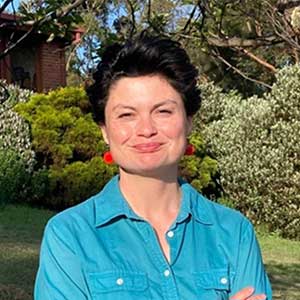
My January 2026 residency at Loughborough University’s Institute of Advanced Studies enabled me to finally meet in person with Professor Ksenia Chmutina! We had been familiar with each other’s work on disasters for some many years and had spoken many times, but the IAS fellowship provided the ideal setting to sit down together properly. Over the course of my stay, we were able to discuss our ideas about disasters and creative methodologies. These discussions have now progressed to the point where we are developing a joint grant proposal on the topic.
Alongside this I had the opportunity to run a workshop for postgraduate researchers on turning academic research into comics. The session drew a small but engaged group from various disciplines, and focused on the practical aspects of adapting complex ideas into visual narratives. This workshop fed into a broader event Ksenia organised for the Journal of Disaster Studies, which brought together storytelling and comics researchers Karen Sung, Oliver Hooper, and Richard Johnson – it was an absolute pleasure to learn about their practices. The event provided a useful forum for discussing the specific challenges and possibilities of using comics in research, and it was fantastic to be part of the conversation.
The residency also gave me the space to present my paper on worldmaking and the global climate order for the first time. It’s always a little nerve wracking to present an idea for the first time, but the IAS was the perfect space to do so and to receive some really constructive feedback.
Beyond these activities, the fellowship allowed me to connect with several other scholars at Loughborough whose research intersects with my own interests and we’re now in the early stages of discussing a potential joint project. Last but not least, the IAS team were absolutely incredible throughout, making me feel very welcome at every turn. And the flat that I was provided with on campus was a little oasis on campus. For anybody thinking about applying to be an IAS fellow I would definitely recommend it.
Dr Gemma Sou

Midland Innovation, NTU and OU Open Research Week 2026
Open Research Week 2026 is a week‑long, cross‑institutional programme championing the practices, skills and culture that make research more transparent, collaborative and impactful. Delivered in partnership between Midlands Innovation, Nottingham Trent University and The Open University, the week brings together researchers, technicians, librarians and professional services teams who are driving forward open knowledge.
Across five days, participants will discover practical approaches, hear from leading voices, and connect with a vibrant regional network. This year’s programme features standout keynote contributions, including Neil Jacobs (Associate Director, UKRN), who will explore how universities can evolve into truly collaborative, open‑knowledge institutions, and Carl Laflamme (Academic Associate, Montreal Neurological Institute, McGill University) and Chetan Raina (Chief Executive Officer of YCharOS), who will examine how open science principles can flourish even within commercially sensitive environments.
Throughout the week, participants can explore groundbreaking research, engage in thought‑provoking discussions, and uncover new opportunities for collaboration.

Research in Action - Chris Shore
Here is the latest instalment of our blogs about the Mr Barton Maths Podcast. This blog features Chris Shore from Loughborough University and you can hear his podcast with Craig here or in your usual podcast app.
In this episode, Chris reflects on his career to date and how that has influenced his current research interests. He also discusses the LUMEN curriculum and the connection it has to his research.
I recently had the pleasure of being interviewed on the Mr Barton Maths Podcast [The Mr Barton Maths Podcast | 200+ Maths Education Episodes]. Craig Barton is a skilful and generous interviewer, and although I was a little nervous beforehand, we ended up having a really enjoyable and wide‑ranging conversation. We talked about my experiences as a secondary school teacher before moving into the university sector, my current work in pre‑service teacher education, and my ongoing interests in pedagogy and how this plays out in the classroom.
A particular focus of our discussion was the question at the heart of my PhD: what makes a good mathematical explanation? We explored what explanations are, how they differ from other forms of teacher talk, and where they appear in real classroom practice. We also reflected on when explanations should be used within the modelling sequence and how they interact with other pedagogical tools such as worked examples.
We then connected these ideas to my work on the LUMEN Curriculum (https://www.lboro.ac.uk/services/lumen/curriculum/). One of the design principles of LUMEN is conceptualising the curriculum as a mathematical story, where mathematical objects (such as multiplication or fractions) act and behave in different settings. We pay close attention to how that story develops. Craig and I discussed the role of explanations within this curriculum story and how they interact with mathematical tasks and practice exercises.
I hope you enjoy listening to the episode! Please do get in touch if you’d like to know more or to chat about anything that came up in the conversation.
From Descriptive Writing to Critical Writing
Written by Bess Chan
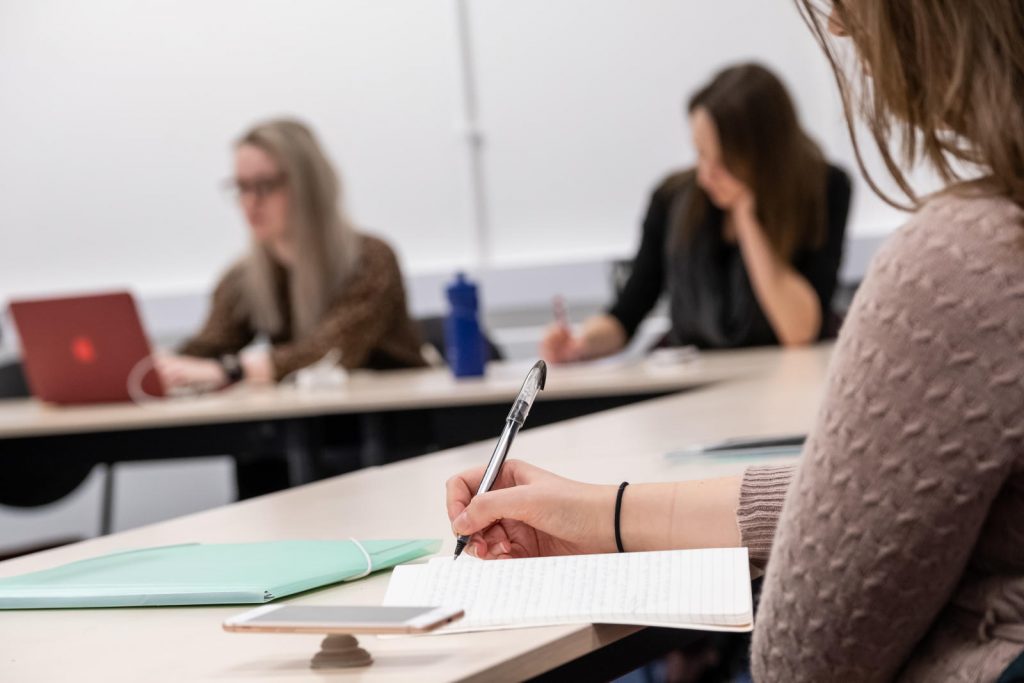
Your opinions, or your voice, are important in academic writing. To show your voice, you’re generally advised to first read your sources critically, including asking questions about the texts and making critical notes, and then formulate your paragraphs using the PEEL structure, adding evaluative language, and synthesising source information.
What if you are at the stage of revising or proofreading a piece of academic writing? How can you effectively check whether your writing is insufficiently critical and needs more of your voice and evaluation? Here are a few things you can do to check your work:
Check the paragraph first – what is it mostly doing?
Examine each sentence closely to identify its function. Is it showing:
- a description
- a piece of evidence
- an analysis (e.g., interpretation of evidence and significance of source information)
- or an evaluation (e.g., strengths, weaknesses, and implications)?
If your paragraph consists mostly of description and evidence, it is descriptive, and you’ll need to add more analysis and evaluation. Although examining each sentence can be quite tedious, this step is an effective way to see whether a paragraph reflects your voice.
Find out more about paragraph structure here.
Identify where to add your voice
Some students may rely too much on evidence to explain a point. Ask yourself these two questions:
- Have I added a follow-up explanation after a citation?
- Have I ended a paragraph with a conclusion rather than a reference?
If your answer to either question is “no”, consider adding one of the following to demonstrate your voice:
- Explain why the evidence matters
- Evaluate how convincing it is
- Compare it to alternative views or contrasting evidence
- Connect it to the argument
For example, if using the evidence “Several studies indicate that assessment feedback improves student performance in subsequent assessments (Smith, 2020; Brown, 2026)”, you can add your voice in the following ways:
- Explain why the evidence matters:
Several studies indicate that assessment feedback improves student performance in subsequent assessments (Smith, 2020; Brown, 2026). This evidence matters because it highlights feedback as an active factor in performance improvement, suggesting that without meaningful engagement with feedback, students may struggle to progress.
- Evaluate how convincing it is:
Several studies indicate that assessment feedback improves student performance in subsequent assessments (Smith, 2020; Brown, 2026). The consistency of findings across both studies strengthens this claim; however, the sample size of these studies may not be large enough to generalise the results.
- Compare it to alternative views or contrasting evidence:
Several studies indicate that assessment feedback improves student performance in subsequent assessments (Smith, 2020; Brown, 2026). However, Jones (2023) and Lee (2024) argue that feedback has limited impact unless students are trained in feedback literacy, suggesting that feedback alone may not automatically lead to improved performance.
- Connect it to the argument:
Several studies indicate that assessment feedback improves student performance in subsequent assessments (Smith, 2020; Brown, 2026). This pattern suggests that feedback not only justifies a grade but also actively guides students to recognise gaps in their understanding and adjust their learning strategies. Therefore, feedback functions as a key mechanism for enhancing learning because it enables students to make targeted improvements over time.
Find out more about voice in academic writing here.
Realise that your voice does not have to start with “I”
Students who are not familiar with academic style may assume only sentences beginning with “I” show their voice. However, “I” is generally not accepted in academic writing, as it is too subjective in tone. Instead, third-person pronouns like “it” and “they”, as in “it means” or “they imply”, should be used when you make an evaluation, weigh evidence, or draw reasoned implications.
If you feel uncomfortable showing your voice without the first-person pronoun “I”, try to write a sentence that begins with “I think” or “I believe” first. After writing the whole sentence, remove “I think” or “I believe” and qualify the sentence by adding hedges (e.g. could, would, likely, possibility, and appear to), boosters (e.g. must, absolutely, definite, and certainty), and attitude markers (e.g. surprisingly, significant, critical, and desirable).
Find out more about ways to show subtle differences in evaluation here.
Review your work against a checklist
Before submitting your work, ask yourself:
- Have I explained why this evidence matters?
- Have I evaluated how strong or limited the claim is?
- Have I linked this paragraph back to my overall argument?
- Does the paragraph show my reasoning, not just my reading?
If the answer is “no” to more than one question, you should revise your work to ensure your voice is clear.
Lastly, if you’re unsure whether you’ve written critically, I encourage you to book 1-2-1 meetings with me, Bess Chan, your London-based EAP Tutor, via email or the booking form.
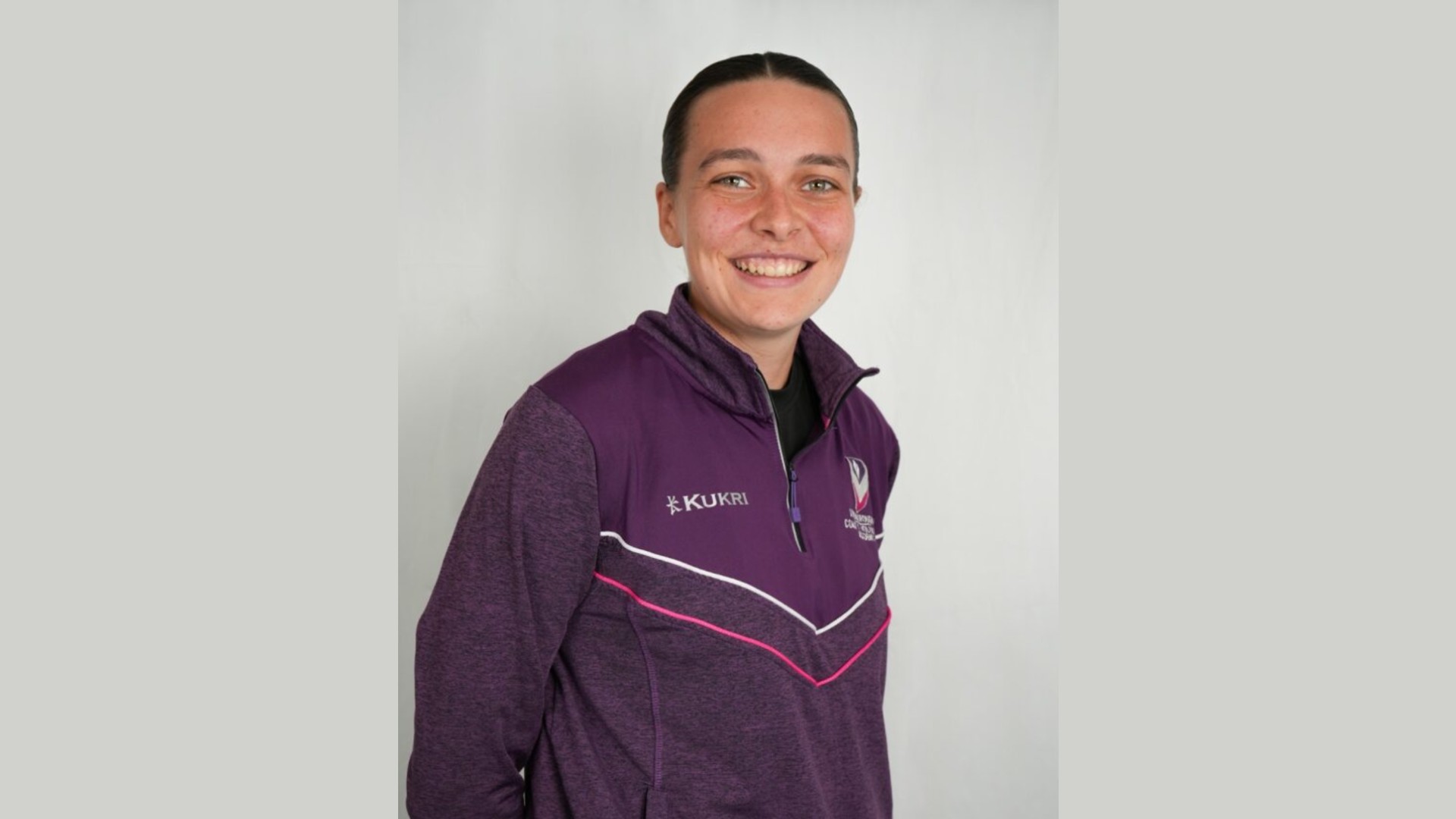
Five Minutes With: Phoebe Cross
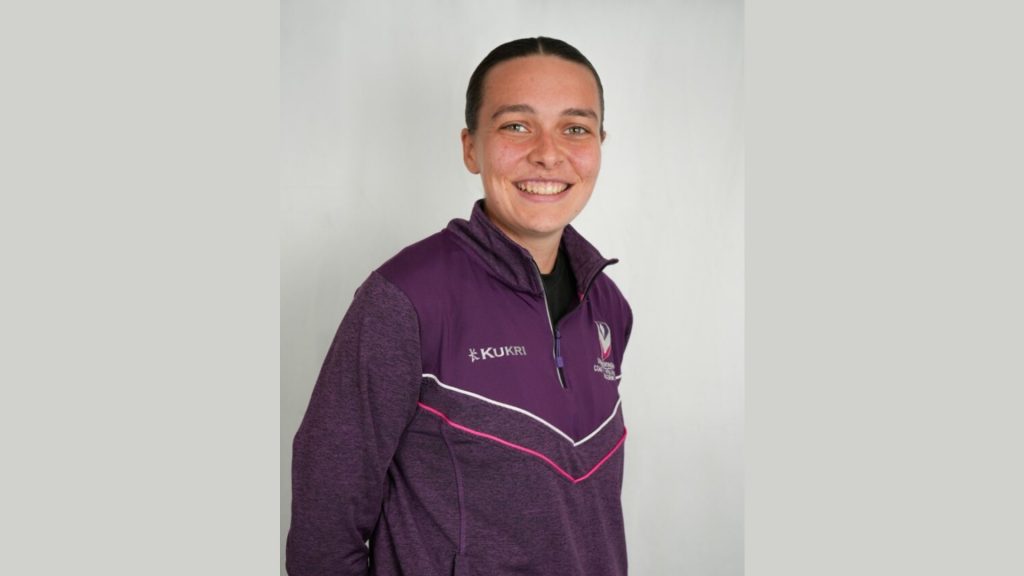
What’s your job title and how long have you been at Loughborough?
I work within Loughborough Sport as Sports Volunteering Officer, aiming to provide high-quality volunteering experiences for students through the Coach and Volunteer Academy (CVA). I have been doing this role since September 2024.
Tell us what a typical day in your job looks like?
I feel very lucky that my days at work are varied and it’s rare that two days look the same! Normally, I am based in our office in the Students’ Union, working through emails, in meetings or organising different areas of the Coach and Volunteer Academy strands. Sometimes, I am out and about on campus, meeting colleagues or supporting events. For example, I have recently supported Talk Sport and the Loughborough Student Officiating Conference, two events that brought students together to develop their skills and interests. I love being active throughout the day, so you might see me in the gym or at a spin class over lunch!
What’s your favourite project you’ve worked on?
This would definitely be recruiting volunteers for BUCS Big Wednesday (BBW) last year. The CVA provided over 100 student volunteers to be part of BBW, and they all played a huge part in the success of the event. I recruited the volunteers through the CVA portal, helped to organise the volunteer training with BUCS and coordinated the shift allocation for students across the event. It was really rewarding to see students actively contributing to one of the biggest events in the University calendar and with myself being a huge sports fan, BBW was a great couple of days!
What is your proudest moment at Loughborough?
My proudest moment at Loughborough would be planning and attending the CVA Awards 2025. This event brought together students, staff and alumni to celebrate the 10 years of the CVA. It was great to celebrate the impact that volunteers make across the University and recognise their hard work, passion and dedication. The event was a reminder of why I enjoy this role and a key motivator to continue developing our student workforce.
Which University value do you most resonate with and why?
Creative is the value I resonate with most because it best reflects how I approach my work. I enjoy finding new ways to engage volunteers, solve problems and bring fresh ideas to our programmes.
Tell us something you do outside of work that we might not know about?
Outside of work, I referee women’s football across the Women’s Super League and Women’s Super League 2. I love the challenge of managing high-pressure situations, making quick decisions and working with my officiating colleagues to deliver a game. There’s a strong sense of community and professionalism in the women’s game, and it’s exciting to be on the pitch as the sport continues to grow. A lot of the skills I use within refereeing are transferable to my area of work and those skills help me within my role.
What is your favourite quote?
“Control the controllables”
If you would like to feature in ‘Five Minutes With’, or you work with someone who you think would be great to include, please email Martha Causier at m.causier@lboro.ac.uk.
CA Day: Conversation, community & cake
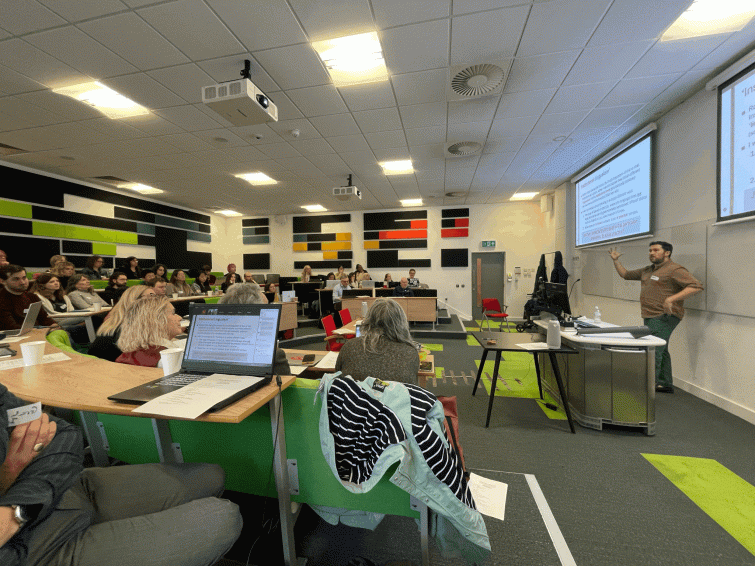
CA Day 15th December 2025
Celebrating its 18th year, CA (Conversation Analysis) Day was––as ever––a celebration of the global appeal of conversation analytic research. With a full programme of talks, including keynotes by Chase Wesley Raymond and Deborah Chinn, and the ever popular CAkeOff competition – delegates were certainly provided with plenty of sustenance for the body and mind.
Morning presentations
After a warm welcome from Saul Albert, the presentation programme began with Gilian Noord, Alison Pilnick, Elizabeth Stokoe and Tony Avery presenting their research on silence in GP telephone consultations. This was followed by a presentation by Virginia Calabria, Joe Webb and Brett Smith on their research about shared decision making between people with learning disabilities and social workers.
Before the first break Chase Wesley Raymond presented the first keynote, engaging the audience with a talk on institutional ‘lingualism’ as interactional practice and what bilingualism looks like in certain settings. The programme continued with Alexa Hepburn and Jonathan Potter looking at the institutional aspect of family mealtimes, before Natàlia Server Benetó presented data exploring the three-partedness of lists in Spanish and Catalan.
Afternoon presentations
The afternoon presentations began with Luyang Zhou presenting their research on how children contribute to interaction in paediatric consultations in China. Ole Pütz followed with a presentation exploring whether AI chatbots could understand a third-position repair.
After a short break, delegates heard from Sanaa Hyder about their research on story telling in consultations between GPs and ethnic minority patients. This was followed by Marco Pino, presenting for Kathryn Jordin with Emma Richardson and Laura Jenkins, who shared findings from their research on how children and adults mobilise gender categories to make sense of and organise play.
The day closed with the final keynote talk from Deborah Chinn, who shared her own research of how CA can explore how people with intellectual disabilities are positioned as ‘incompetent’.
CA Day will return in December 2026, for more details please check the Discourse and Rhetoric Group (DARG) website: https://darg.lboro.ac.uk/ca-days/
Celebrating Tết Away from Home: Lunar New Year as a Vietnamese Student in London
Written by Chi Nguyen
What would you like others to know about Lunar New Year?
Lunar New Year is the most important festival across many parts of Asia, reflecting deep cultural, spiritual, and familial bonds. In Vietnam, we call it Tet. Following the Western New Year, Tet usually falls in January or February, with decorations appearing as early as a month beforehand. From cities to rural villages, streets come alive with high‑spirited crowds, traditional ornaments, and national flags adorning every corner. Regional differences shape the atmosphere: pink peach blossoms brighten the North, while yellow apricot blossoms flourish in the South, both symbolising prosperity and good fortune. Although folk paintings and red calligraphy scrolls are less visible in major cities today, they remain culturally significant as invitations for harmony, wisdom, and luck. Central to Tet is the practice of honouring parents and respecting teachers, reflected in the traditional order of the first three days: Father first, Mother second, and Teachers third. These values deeply anchor in each Vietnamese, even as the country celebrates with joy in the biggest festive season of the year.
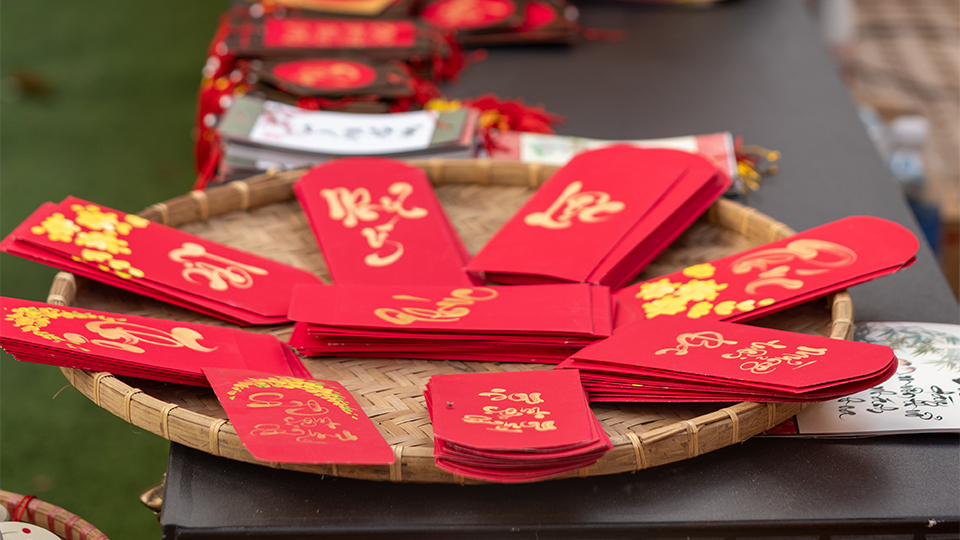
Are there any special traditions during Tết and what do they symbolise?
Tet holiday normally lasts five days, yet it remains the most anticipated season. The excitement perhaps comes from the abundance of traditional dishes and the joy of receiving lucky money in red envelopes. Each region has its own distinctive specialties, but children and adults alike love bánh chưng, the square sticky‑rice cake wrapped in dong leaves, and bánh tét, its cylindrical southern counterpart. Traditional pork sausage, spring rolls, red sticky rice, and candied fruits are also beloved Tet foods, cherished not only for their flavours but for their symbolism of prosperity, family unity, and a fresh start. Red envelopes, filled with lucky money, represent blessings passed from elders to younger generations, wishing them health, wisdom, and kindness for the year ahead. Tet therefore carries deep‑rooted cultural values that extend far beyond visible decorations and celebration. Wherever we are, Tet lives most strongly in our thoughts and reflections, shaped by a thousand years of ancestral values passed from generation to generation.

How will you be celebrating Tết as a university student away from home?
While I have always prioritised spending Tet with my family, this year will be my first Tet away from home. Although there are still two weeks until Lunar New Year, Loon Fung, the Far Eastern food market in Stratford, has already filled its aisles with festive items. The most striking are the kumquat trees, symbols of abundance and good luck. Decorations and foods from different Asian cultures are displayed right at the checkout, drawing in customers who will likely celebrate their traditional New Year here in London. For those seeking a celebration that feels almost like home, Chinatown is undoubtedly the heart of Lunar New Year festivities. Lion and dragon dances, street performances, and colourful food stalls create a completely different atmosphere from Western fireworks and champagne.

Beyond the festive energy, Lunar New Year is also a moment to slow down and reflect. I will spend the first day of Lunar 2026 at Linh Sơn Temple, a Vietnamese pagoda in Lewisham, Southeast London, to welcome the fresh energy of a new chapter. These practices help me cultivate focus, resilience, and compassion, qualities that support my journey as a sport leadership student and a dedicated marathoner.
In many Asian cultures, we believe that while the Western New Year, based on the solar calendar, brings a visibly festive and outward‑facing energy, the Lunar New Year offers a more personal, reflective balance. If Christmas and the Western New Year are celebrated with vibrant bustle, then taking a quiet moment to embrace the stillness and freshness of the Lunar New Year can become a meaningful way to reconnect with our inner peace, or simply a gentle pause to breathe.

All photos in this blog are credited to Dzung Viet Nguyen.

Roses are Red, My True Love is Fair: This Valentine's Day, You'll find Copyright There
Disclaimer: This blog post is for information only. We do not endorse any of the merchandise and we are not affiliated or receive any commission from any companies presented in this blog post.
It is February and like every year, all of us are happy that January is behind us, and we can now enjoy longer days as well as (usually) nicer and warmer weather (except if you live in the UK, of course).
There are multiple stories on how Valentine’s Day came to be, however some historical facts claim St Valentine was put to death for his faith around the year 270. There are claims that St Valentine performed secret Christian marriages in defiance of a ban by Emperor Claudius II ‘Gothicus’ which seems to be without historical foundation. Modern scholars believe that (with most such celebrations, see our Halloween post) it derived from an ancient Roman fertility cult called Lupercalia. As with everything, the origins of the festival are rather obscure, however the name derives from the Latin word lupus (wolf) and is believed to be a festival for a deity which protects herds from wolves.
Romanians have their own love festival on the 24th of February, called Dragobete. It is also a celebration about the arrival of Spring. While 14th of February was accepted as the day of love in Romania as well, some Romanians celebrate either, or both. Why not? I do specifically enjoy the part where tradition says men are not allowed to annoy women or your love falls apart.
I am sure you are asking yourself now, okay, that’s nice but how does this all connect to copyright?! Well, as we have seen with Easter, Halloween and Christmas, many things that we take for granted on holidays and celebrations are protected by some form of IP. So, let’s take them one by one.

Patent your Love
Of course, Valentine’s Day has its own array of patents. In general, that would be greeting cards. However, we also have a wishbone to test who loves more and a spice container containing love. If you your loved one is an avid swimmer, why not gift them some heart-shaped swim goggles? As you can see, love can be patented.
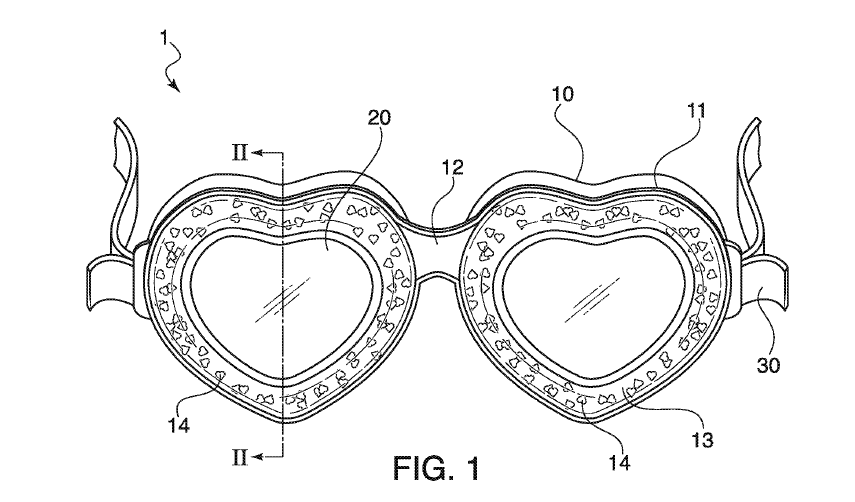
Put a (Trade)mark on it!
Valentine’s Day is also very popular day for popping the question. And many people would love it if that question is accompanied by a very special blue box, coming from a well-known jewellery company, called Tiffany & Co. Did you know that said popular jewellery company have not only trademarked their signature Tiffany blue but also their blue boxes?!
Of course, during the usual Valentine’s Day dinner date, Champagne does make an appearance. Many Champagne makers register their Champagne as trademarks, like this example from 1948.
However, this is not all that can be trademarked. Heart shaped logos, slogans and other distinctive signs can also benefit from trademark protection.
Designed, Registered, Loved
Think of the design of engagement rings or the love shaped chocolate boxes, wedding ornaments and anything else dedicated to love can be protected by design rights. Let’s take the Welsh love spoon for example, Paul Curtis protected the designs of many different looking Welsh spoons in 2020.
Another popular jewellery company is Pandora, and they have several registered jewellery designs.
I Would Do Anything for Love… But Not Copy Someone Else’s Work
As we all know, creative outputs are protected by copyright. Think dating apps, poems, love letters, romantic songs and anything else that goes with Valentine’s Day. If you have a creative streak, and compose your own romantic poem or song, or card, or cute love potatoes, those will be protected by copyright.
If your creative streak is rather lacking, you are in luck, as there are many romantic classics in the public domain. Feeling like the Bard would have some good sonnets on the go? Well, you are in luck, many of Shakespeare’s sonnets are in the public domain. Or maybe the world of Jane Austen is more your speed? Well, her works are also in the public domain. Important to note, please make sure that the work you are using is indeed in the public domain. Any re-publication of public domain material will add another 25 years of protection, like a newly typeset edition of Shakespeare. The older the better.

ystävänpäiväkortti by A.M. Davis & Co. Quality Cards London – Helsinki City Museum, Finland – CC BY.
Do You Want to Know a (Trade)secret?
It is good practice to never reveal a trade secret. It isn’t much of a secret if it is revealed. Secret recipes and formulas for chocolate or perfume, the algorithm that decides which chocolates appear in your curated Valentine’s bundle.
That Which We Call a Rose: Protecting New Varieties by Any Other Name
Want to love like the French? Why not buy an “Edith Piaf” rose?! Plant varieties can receive protection through Plant Variety Rights depending on certain conditions.
A plant variety can only be protected if it meets three conditions:
- It must be different from any other known variety in at least one clear, visible way.
- It must be consistent, meaning all the plants of that variety look and behave the same in the important features that make it different.
- It must stay the same over time, so those key features don’t change when the plant is grown again and again.

You Had Me at Merlot: A Love Letter to Geographical Indications
Valentine’s Day would not be complete without the romantic dinner at the end of the day. However, did you know that some of the food that you might enjoy on the evening are protected by Geographic Indications (GIs)? For example the Exmoor Blue Cheese or the Dorset Blue Cheese. The wine served might also be protected, like this Greek wine. And for those of us with a sweet tooth, we cannot forget some nice cakes at the end of the date.

❤️ Valentine’s Day Conclusion
As we celebrate a day devoted to love, it’s worth remembering that protection systems like Geographical Indications—and all forms of intellectual property—are, at their heart, about safeguarding meaningful relationships. Not between people, but between products and the places, traditions, and skills that shape them. Just as true love honours authenticity, integrity, and trust, so too do these protections ensure that what we value is recognised, respected, and preserved.
This Valentine’s Day, may we continue to show a little love to the origins, craft, and communities that make our favourite products truly one‑of‑a‑kind.
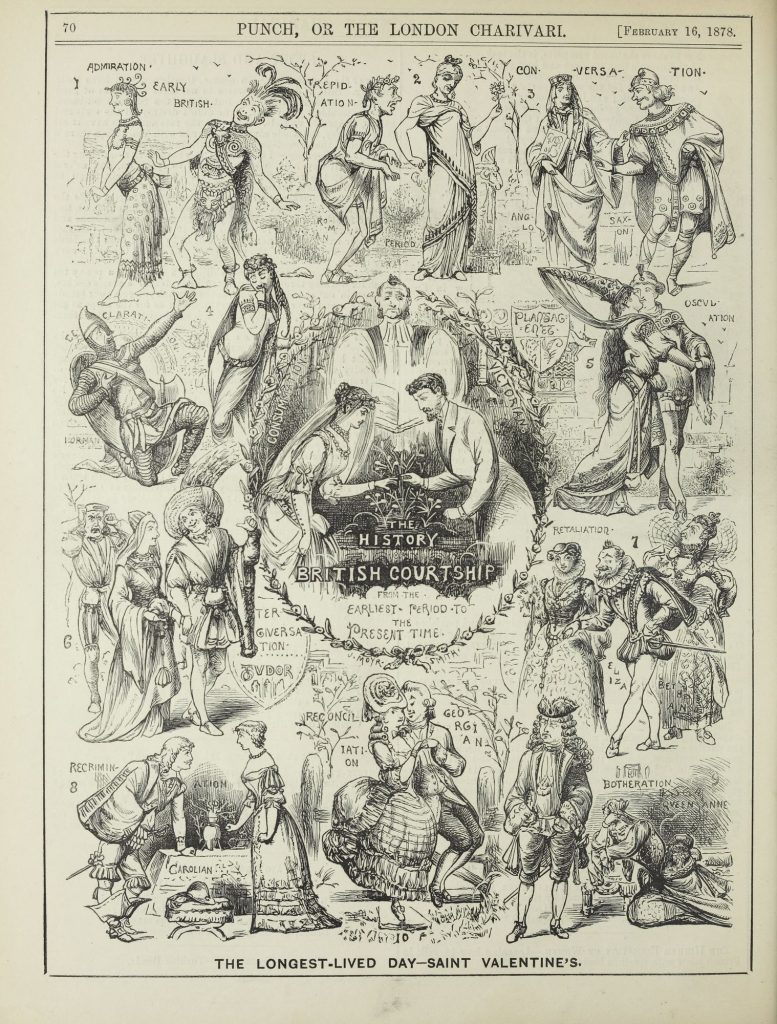
The longest-lived day-saint Valentine’s – Heidelberg University Library, Germany – Public Domain.
The information contained in this blog post should be taken as recommended advice or guidance but should not be taken as legal advice. If in any doubt, please seek proper legal advice. Some images licensed from Adobe Stock.

In Conversation with Anna Ligęzowska, winner of the Dean’s Dissertation Prize 2024/25.
We are pleased to share an interview with Anna Ligęzowska, winner of both the 2024-25 Loughborough University London Dean’s Dissertation Prize and the Dissertation Prize from Loughborough London’s Institute for Diplomacy and International Affairs, for her dissertation ‘Fragile Peace, Persistent Systems: Child Recruitment through the Lens of the Transformative Justice Cube’.
Anna studied for an MSc in Security, Peacebuilding and Diplomacy. In this interview, recorded with Dr Tim Oliver (Director of IDIA), Anna reflects on both the findings of her dissertation research and the challenges and opportunities of researching and writing a dissertation. Please click on the link below to watch the interview:
Interview with Anna Ligęzowska, Dean’s Dissertation Prize Winner 2025
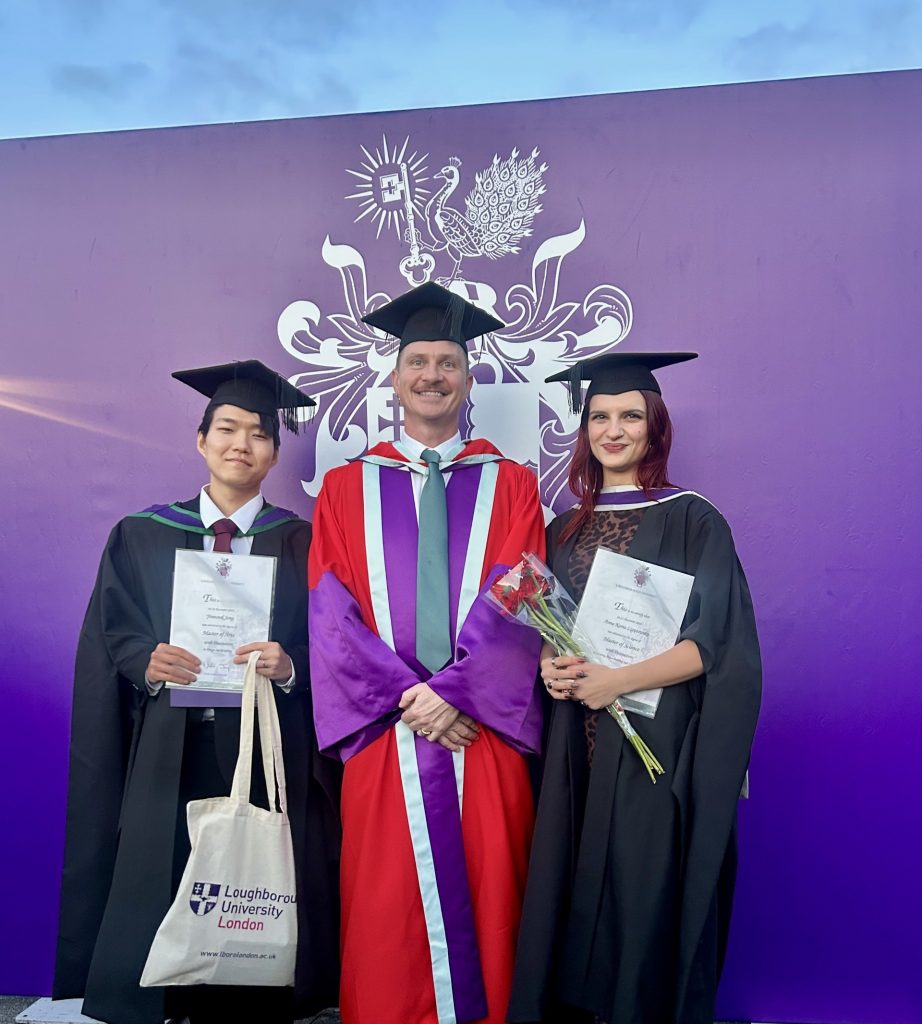
Framing Türkiye in European Security Discourse: Insights from a Master’s Dissertation
Written by Imannur Gül (Student of MSc Diplomacy and International Relations 2024-25, Shortlisted for the IDIA Dissertation Prize 2025)
Writing my Master’s dissertation at Loughborough University was both an academic and personal journey. As a student of Diplomacy and International Relations, with a strong interest in security studies and Turkish foreign policy, I wanted to engage with a topic that reflected current geopolitical realities while also contributing to ongoing academic debates. My dissertation, titled “Türkiye as a Strategic Actor in the European Union’s Security Architecture” with the research question “How have evolving global dynamics between 2017 and 2025 affected the way European leaders define Türkiye’s role in European foreign and security policy discourse?”, emerged from this motivation.
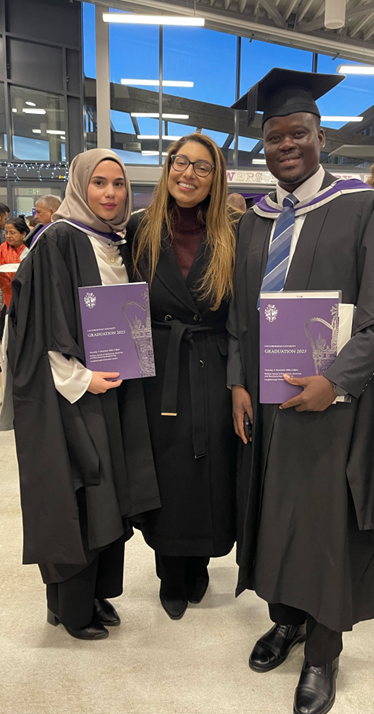
The starting point for my research was the changing nature of European and transatlantic security. Since the first Trump administration, debates about NATO, European strategic autonomy, and the reliability of transatlantic partnerships have intensified. Trump’s repeated statements questioning US commitments to NATO created uncertainty in Europe and raised concerns about security dependence on the United States. These dynamics were further accelerated by Russia’s invasion of Ukraine, which fundamentally reshaped European threat perceptions and security priorities.
Against this background, Türkiye increasingly appeared in political and academic debates. As a long-standing NATO ally with one of the strongest militaries in the alliance, a key actor in migration management, and a state positioned as a bridge at the crossroads of Europe, the Middle East, and the Black Sea region, Türkiye occupies a complex and often controversial role in European security discussions. As someone from the Turkish diaspora in Europe, and with an academic focus on Turkish political life, I became particularly interested in the question of whether Europe, in its efforts to strengthen its security architecture, increasingly needs Türkiye.
One of the main challenges I faced early on was narrowing down my research focus. Initially, I considered analysing the issue primarily from a Turkish perspective. However, through discussions and brainstorming sessions with my supervisor, Dr Nicola Chelotti, it became clear that a more original and analytically strong approach would be to examine how European leaders themselves frame Türkiye. This shift in perspective shaped the entire dissertation.
Methodologically, I chose to conduct a thematic analysis of speeches by European political leaders and EU officials. Using the six-step thematic analysis framework developed by Braun and Clarke, I systematically collected, filtered, and coded speeches delivered between 2017 and 2025. This period was divided into three phases:
1. 2017-2021 Coexistence of Strategic and Contentious Partnership
2. 2022-2024 Discourse Shift during the Zeitenwende
3. 2025 Emerging Consensus among European Leaders
Out of approximately 100 collected speeches, 61 were identified as directly relevant to my research question. These speeches were analysed and coded under two main themes: Türkiye as a Security Partner of the EU and Türkiye as a Challenge for EU Security. This approach allowed me to systematically assess whether Türkiye was predominantly framed as a security partner or as a problematic actor, and how this framing changed over time.
The findings revealed a nuanced picture. On the one hand, Türkiye was frequently framed as a challenging or difficult partner, particularly in relation to the Eastern Mediterranean, the Cyprus issue, and its military operations in Syria and Libya. These issues have repeatedly strained EU–Türkiye relations and reinforced perceptions of rivalry and difficult partner. On the other hand, the analysis demonstrated that Türkiye has increasingly been recognised as a key strategic actor within Europe’s security architecture. Its military capabilities, geostrategic position, and role in managing migration and border security have made cooperation with Türkiye indispensable for the European Union. Moreover, since the outbreak of the Russia–Ukraine war, Türkiye’s importance as a NATO ally has become more pronounced. Its ability to maintain communication channels with both Moscow and Kyiv, and its role as a mediator, have reinforced its strategic relevance for both European and transatlantic security.
Theoretically, my dissertation was grounded in neorealism, which provided a useful macro-level framework to analyse how systemic pressures, alliance dynamics, and shifting threat perceptions shape EU–Türkiye relations. Applying this lens helped connect empirical findings to broader structural changes in the international system.
Overall, writing this dissertation taught me that research is not only about answering a question, but also about refining it, adapting one’s approach, and remaining open to where the data leads. The project strengthened my analytical skills, deepened my understanding of European security politics, and confirmed my interest in pursuing further work in diplomacy and international security.
The Institute for Diplomacy and International Affairs (IDIA) offers master’s and doctoral programmes designed to meet the evolving demands of today’s world. At IDIA, we work alongside our students to provide them with the essential tools to comprehend these global realities, preparing them for diverse careers in both public and private sectors across the globe. Check out our programmes and apply to study with us here.
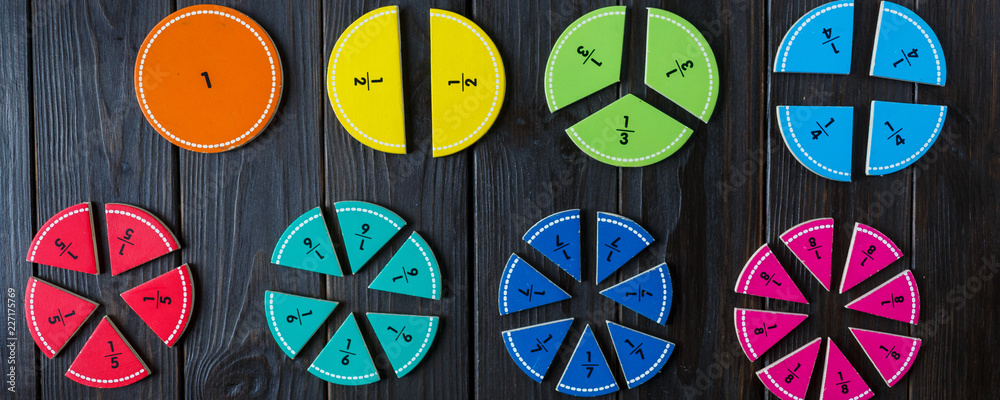
Research in Action - Hugo Lortie-Forgues
Here is the latest instalment of our blogs about the Mr Barton Maths Podcast. This blog features Hugo Lortie-Forgues from Loughborough University and you can hear his podcast with Craig here or in your usual podcast app.
In this wide ranging discussion, Hugo talks about his work on fractions, and the challenges with implementing and communicating the results of intervention work in a general sense. Craig shares his insights on being involved in these processes from a practitioner perspective, which is something we don’t always hear about as researchers!
Hugo: “I was recently interviewed on the Mr Barton Maths Podcast. Craig and I discussed some of my earlier research on how students learn fractions, including factors that can make this area of maths challenging. From there, we moved on to my more recent work on how best to communicate education research evidence to teachers. We talked about the practical and methodological challenges that come with evaluating the effectiveness of educational interventions, for example the importance of control groups and the need for valid and reliable measures. Craig shared his own experience of being involved in a randomised controlled trial, which brought a more practitioner-focused perspective. We also discussed how educational programmes can vary widely in their impact on student achievement, and how these effects can be communicated in different ways. Finally, we spoke about how the effects of educational programmes vary substantially in terms of how certain they are, and how important it is for teachers to consider this uncertainty when making decisions. Craig and I had a lot of fun unpacking these issues, and I hope listeners enjoy the conversation as much as we did”.
You can listen to the episode here The Mr Barton Maths Podcast | 200+ Maths Education Episodes
The Theory of Friendship in International Diplomacy: Insights from Dr Felix Berenskötter’s Lecture
Written by Rashane Jude Pintoe (Student of MSc Peace-building, Security and Diplomacy)
At a time when international politics is increasingly framed through rivalry, distrust, and transactional alliances, the idea of friendship between states can sound naïve or even misplaced. However, it was precisely this assumption that Dr. Felix Berenskötter set out to challenge in his recent lecture at Loughborough University. Titled ‘Theorising the Formation and Dissolution of International Friendship’, the lecture was a compelling argument for taking international friendship seriously – not as rhetoric or sentiment, but as a meaningful political relationship with real consequences. A political scientist, Dr. Berenskötter is a Reader in International Relations at the Department of War Studies, King’s College London.

Dr. Berenskötter’s research sits at the intersection of International Relations theory, political language, and identity, with a long-standing focus on concepts such as power, security, anxiety, and trust. He has worked on it since his doctoral thesis and will be published a forthcoming book on how international friendships emerge, endure, and unravel. From the outset, it was clear that this was not an attempt to offer a neat or closed ‘theory of friendship’, but rather to open a conceptual space that existing theories struggle to capture.
One of the most striking arguments of the lecture was that dominant IR theories leave important aspects of political relationships unexplained. Concepts such as solidarity, favouritism, backstage access, and the willingness to openly criticise another state are difficult to account for within realist or liberal frameworks. He also shed light on the fact that usually, states refrain from calling out other states unless something they deeply share is threatened. This sort of critique is something people usually associate with friendship – which he placed as an element in his theory. For students of diplomacy, this reframing was particularly thought-provoking as it makes us reconsider behaviours that we often take for granted as purely strategic.
A key distinction running through the lecture was between alliances and friendship. Alliances, Dr. Berenskötter argued, usually emerge in response to a shared threat and tend to dissolve once that threat disappears. Friendship, by contrast, does not originate from a security problem. This distinction felt especially relevant in a contemporary context where shifting alliances are often mistaken for deeper political bonds. Friendship, in this sense, becomes most visible when the stakes are high – during wars, moments of disappointment, or experiences of perceived betrayal – when expectations rooted in trust are either upheld or shattered.
Central to Dr. Berenskötter’s argument is the idea that friendship places trust at the centre of political analysis. Whereas realism assumes distrust and liberalism explains limited trust through institutions, friendship begins from the expectation of trust and mutual commitment. This focus on trust led to a deeper discussion of ontological security – the security of a political community’s sense of self and identity. Friendship, he suggested, can be one of the most important relationships through which political communities secure a stable sense of who they are.
Dr. Berenskötter conceptualised friendship not as a role that states perform, nor merely as language, but as a relationship defined by intertwinedness and a shared being in time. Drawing on biographical narratives, he then argued that friendships – both interpersonal and political – are shaped not only by a shared past, but by commitment to a shared future. He made a particularly vivid illustration whereby he likened friendship to standing in the rain, trusting that the bus will arrive in ten minutes rather than the next day. That simple illustration captured the element and degree of trust required to invest in this shared future even amid uncertainty.
The formation and breakdown of this friendship was also explored. Dr. Berenskötter delved into how interaction, positive or negative shared experiences, attraction to a shared future, and ultimately political choice and commitment are required for the formation of the relationship. Drawing on Aristotle’s distinction between friendships of utility, pleasure, and virtue, he further suggested that many political relationships remain stuck at the level of usefulness, never developing into something deeper. On the other hand, he theorised that breakdown of the friendship occurs through processes of estrangement, including changing perception of the counterparty, shifting material circumstances, leadership change, or the inability to recalibrate expectations after conflict. He argued that what matters most is not that friends fight, but how, or whether, they manage to move forward afterwards.
The discussion that followed extended these ideas into contemporary cases. The audience had questions about changes in leadership, differences in power, and the kind of government in place, prompting particularly engaging responses. Dr. Berenskötter further noted that friendship is one of the few relationships capable of bridging significant power differences, which is precisely why it has been viewed as politically dangerous by some philosophers. In the Q&A session, he spoke on German–Israeli relations – arguing that a shared past without meaningful investment in a shared future does not constitute friendship under this theory. Likewise, he suggested that Russia’s response to Ukraine can be partly understood through a ‘friendship lens’ by the former forcing the latter to remain in the friendship. This demonstrated the analytical reach of the framework.
For those in attendance, the lecture offered more than a new concept – it provided a different way of seeing international politics. By taking friendship seriously, Dr. Berenskötter challenged us to rethink how political communities relate to one another, how trust is built or broken, and why the language of friendship continues to matter in moments of crisis. For students and scholars at Loughborough, it was a timely reminder that some of the most powerful forces in world politics are not always the most obvious ones.
The Institute for Diplomacy and International Affairs (IDIA) offers master’s and doctoral programmes designed to meet the evolving demands of today’s world. At IDIA, we work alongside our students to provide them with the essential tools to comprehend these global realities, preparing them for diverse careers in both public and private sectors across the globe. Check out our programmes and apply to study with us here.
Invented Heritage, Brand Authenticity, and the Dissertation Journey: Lessons from an Award-Winning Dissertation
Written by Younseok Song (Runner-up for the Dean’s Dissertation Prize)

Writing my dissertation was the highlight of my Master’s degree. It was a precious time of intense intellectual growth, demanding active critical thinking and rigorous research. While I was personally satisfied with the outcome, I was thrilled and honoured to see my work recognised as the Runner-up for the Dean’s Dissertation Prize. In this blog post, I would like to reflect on the two biggest challenges I faced during my research and how I overcame them. I hope this post will be helpful to those starting their research or anyone finding the dissertation process daunting.
My Research: Invented Heritage and Brand Authenticity
My research explored the question: How do different types of invented heritage used by luxury perfume brands impact Perceived Brand Authenticity (PBA)? In the first phase, I conducted a multiple-case study and categorised the types of invented heritage into four strategies: acquisition, inspiration, forgetting, and fantasising. In the second phase, I conducted interviews to assess the impact of each strategy on PBA. I discovered that while ‘acquisition’ and ‘inspiration’ generally have a positive impact, ‘forgetting’ and ‘fantasising’ tend to have negative, yet mixed and nuanced effects. Ultimately, I concluded that consumers are not historical purists, but rather sophisticated interpreters of narrative who demand honesty.
Challenge 1: choosing the Topic Strategically
The first hurdle was defining the topic. If you want to write a valuable dissertation, you must approach topic selection strategically. Instead of starting from scratch or picking an “easy” topic, it is crucial to choose something you are genuinely curious about. Do not forget that a dissertation is a marathon, not a sprint—often lasting around seven months—so maintaining your passion is key.
A dissertation becomes truly valuable when it offers a novel discovery and contributes new findings. I started with the broad area of “deceptive branding,” a subject I have been interested in for years. I invested significant time reading existing literature to identify gaps and pinpointing exactly what I wanted to explore. Eventually, I settle on a novel topic: the impact of invented heritage on perceived brand authenticity.
Challenge 2: Defining the Scope
The second challenge was deciding the scope of my literature review. The more I read, the more I realised how many subjects were interconnected with my topic. When I struggled with trying to cover too many areas, my supervisor, Dr. Antonius van den Broek, helped me set the right direction by prioritising selective areas. He also emphasised feasibility. Do not forget the submission deadline and words limits. Following his advice, I narrowed my focus to the three subjects most relevant to my topic. This allowed me to gain a substantial understanding of those areas and transition smoothly to the next stage of research.
You Are Not Alone
It is normal to feel overwhelmed when you first start your research; I was no exception. Please remember that at Loughborough University London, there are many professionals besides your supervisor who are eager to support you. I received excellent support from Bess Chan at the Academic Language Support Service (ALSS). She provided valuable feedback and advice on my academic writing. If you need help, I strongly recommend engaging with your supervisor and actively using the university’s support services.
A big thank you to Younseok Song for writing this blog!
Considering postgraduate study? Explore our website to discover more about postgraduate degrees and how to apply!
Reflections from Canada House: Measuring Sport’s Contribution to the SDGs
Written by Céline Erciyas (Student of MSc Diplomacy and Sport)
On 4 February 2026, Canada House in Trafalgar Square hosted the launch of the Global Sport and Sustainable Development Goals (SDGs) Baseline and Initial Impact Report. Organised by the Commonwealth Secretariat’s Sport for Development and Peace (SDP) team in partnership with the High Commission of Canada in London, the event brought together policymakers, academics, and civil society actors to reflect on the role of sport in delivering the SDGs. More than a report launch, the event highlighted how sport is increasingly framed as a credible tool of public policy and international cooperation.

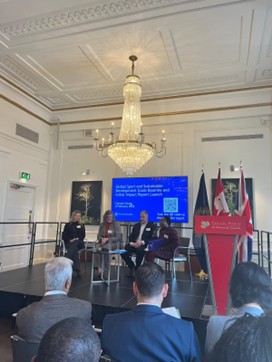
Opening remarks by Simon Collard-Wexler, Minister-Counsellor at the High Commission of Canada, set a clear political tone. Framing the report as a “call to action”, he emphasised Canada’s belief in sport as a means of building community and cooperation across the Commonwealth. With major sporting events on the horizon (Glasgow 2026 Commonwealth Games, FIFA World Cup), sport was presented as a platform for positive societal change rather than simply competition.
Dr Arjoon Suddhoo, Deputy Secretary-General of the Commonwealth, addressed a long-standing challenge: while sport’s contribution to the SDGs is widely acknowledged, it has remained difficult to measure. The report responds to this gap by delivering a first-ever global baseline, using data from across every country to evaluate the contribution of sport and physical activity against the SDGs. Importantly, the report is framed not as an endpoint, but as a starting point to guide future action, partnerships, and policy learning.
Panel discussion: from measurement to meaningful action
The panel discussion, moderated by Dr Lin Sambili, Adviser for Sport for Development and Peace at the Commonwealth Secretariat, brought together Steven Parker (Senior Policy Analyst, Department of Canadian Heritage – Sport Canada), Gemma Wood (CEO, Numbers and People Strategy), Catherine Carty (UNESCO Chair at Munster Technological University), and Simon Lansley (Managing Director, Connect Sport).
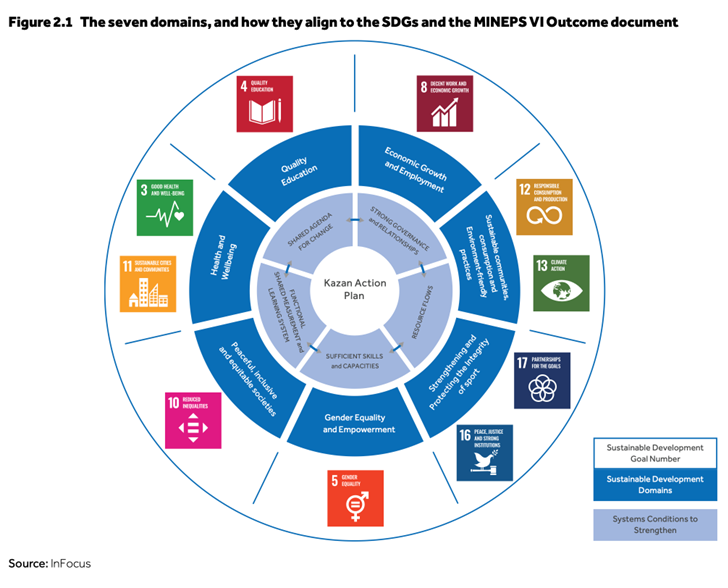
Panellists explored how improved measurement can fundamentally transform sport policy. The development of 60 indicators across seven thematic domains was presented as a clear shift from aspirational approaches to evidence-based decision-making. While acknowledging that approximately 25% of relevant data remains unavailable, speakers agreed that even partial measurement significantly strengthens governments’ ability to justify investment, design reforms, and align sport more closely with public policy objectives.
The discussion also highlighted the political value of data standardisation. Comparable indicators and the Global Sport and SDGs Impact Data Portal were identified as key tools for improving coordination across sectors and levels of government. The publicly accessible dashboard allows users to explore what works, region by region and country by country.
At the same time, panellists cautioned against an overreliance on quantitative data alone. Transformative action, they argued, should not be postponed in pursuit of perfect measurement. Instead, the report offers a shared language that enables sport to engage meaningfully with actors in education, social inclusion, and development, thereby enhancing its legitimacy and supporting sustained investment.
Finally, the panel raised important questions of power and participation. As decision-making in sport remains highly centralised, speakers questioned how communities can move from being passive data subjects to active users of information. In this context, storytelling was emphasised as a crucial complement to indicators, ensuring that lived experiences and local realities remain visible alongside quantitative evidence.
Students’ reflections
From my own perspective, these measurements are precisely what had been missing to fully understand the real contribution of sport to our societies. Coming from a European background, I am not surprised to see that Europe performs below the global average in aligning sport policies with the SDGs, with only around 23 per cent alignment. This gap is partly shaped by the way sport is financed at the EU level, as funding remains largely short term. Programmes such as Erasmus+ illustrate this challenge well, with projects typically limited to three or four years. Without a long-term funding vision, the transformative potential of sport risks being constrained, despite its increasing role in addressing broader societal and developmental objectives.
Another student, Sam Lynch, noted:
“I found the quantitative aspect of the event quite compelling. Working at the intersection between sport and international governance, I am constantly grappling with how to justify the importance of sport relative to other global challenges. The concrete, indicator-led data in the Commonwealth’s report will prove monumental in vindicating new sport for development initiatives.”
The Institute for Diplomacy and International Affairs (IDIA) offers master’s and doctoral programmes designed to meet the evolving demands of today’s world. At IDIA, we work alongside our students to provide them with the essential tools to comprehend these global realities, preparing them for diverse careers in both public and private sectors across the globe. Check out our programmes and apply to study with us here.
80 Years of the United Nations General Assembly: IDIA Students at a Historic UNGA Commemoration
Written by Rashane Jude Pintoe (Student of MSc Peace-building, Security and Diplomacy)

In January 1946, in a world picking itself up from the scourge of the Second World War, the leaders of that generation convened at Central Hall Westminster London in search of permanent peace – forming the United Nations. Eighty years later in January 2026, accompanied by faculty, eleven students from the Institute for Diplomacy and International Affairs (IDIA), attended the 80th year commemoration of that very pledge at the very same Central Hall Westminster.
The event, ‘UNGA at 80: From 1946 to Our Future’, organised by the United Nations Association UK, was both a privilege and a powerful reminder of history’s weight on the present. With keynote contributions from the UN Secretary-General, the President of the UN General Assembly and the UK Attorney General, and several panel discussions with prominent personalities, the event stood out as a rare high-level gathering at the intersection of global diplomacy, international law and multilateral governance.
The event offered a particular opportunity to reflect not only on the origins of the UN, but also on its relevance at a time when the rules-based international system appears increasingly threatened by several actors. Eighty years ago, the UN General Assembly emerged as a forum grounded in collective security, in the hopes of upholding international law with cooperation amongst nation states. That very vision echoed throughout the afternoon – yet it was difficult to ignore how distant that message of optimism felt given the status quo.
From multiple conflicts across the globe, to various norms being selectively applied, the trust between allies becoming increasingly fragile and renewed scepticism toward international institutions and collective commitments, the event felt less like a celebration and more like a moment of reckoning. UN Secretary-General António Guterres captured this tension clearly in his address. He emphasised that multilateralism is not an abstract ideal but a practical necessity. The strain on alliances and the transactional approach increasingly visible in global diplomacy raise uncomfortable questions about whether the rules-based international order can endure without consistent leadership from its architects. Against this backdrop, the Secretary General’s defence of international law and cooperative problem-solving felt less ceremonial and more urgent.
Annalena Baerbock, the former German Foreign Minister and current President of the UN General Assembly, built on this theme by touching on the Assembly’s foundational purpose – to serve as a space where all states can voice concerns and shape global norms regardless of their power and influence. Her speech also highlighted the dangers posed when major powers bypass or undermine it. In an era where unilateralism often appears expedient, her message was a reminder that legitimacy in global governance is derived not from power alone but from participation and consent.
The UK Attorney General, Lord Hermer KC, made his speech’s message firmly in the language and principles of international law, returning repeatedly to the UN Charter as a living document rather than a historical artefact. He spoke of how the Charter’s commitment to collective security, peaceful dispute resolution and legal restraint remains essential in an era marked by power politics and selective rule breaking. Particularly striking was his warning that when international law is treated as optional rather than binding, it is not only institutions that suffer, but the stability and predictability of the entire international system.

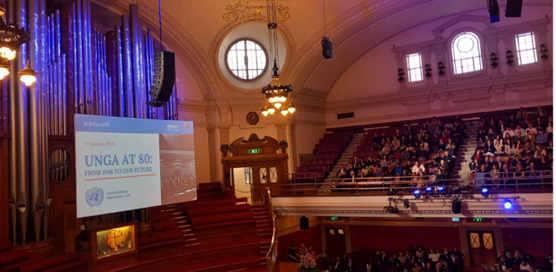

Another profound speaker came from outside the traditional diplomatic circle. Prominent astrophysicist Professor Brian Cox made an address that offered a broader and humbling perspective to the matters at hand. His placing of the issues of humanity as a mere blip in the larger existence of the universe brought strong perspective on why unity and peace are essential when looking at the grander scheme of things. This did not diminish the seriousness of global challenges but rather reframed them. If humanity occupies such a small window in time and space, then peace and collective survival become not just moral choices, but rational ones.
The perspectives of the speakers lingered long after the event concluded. The troubles facing the world today – fractured alliances, weakened institutions, and growing mistrust – are significant, but they are not immutable. The UN itself was born in a moment of profound crisis, when cooperation seemed improbable. That it has endured for eighty years, however imperfectly, is testament to the enduring appeal of multilateral solutions.
Leaving Central Hall Westminster, it was difficult for Loughborough students and all other guests not to reflect on the symbolism of place and time. The same walls that once hosted the hopeful beginnings of the UN now hosted a conversation about its uncertain future. Whether the next decades are defined by fragmentation or renewed cooperation remains an open question. Yet events like ‘UNGA at 80’ serve as a reminder that the principles of unity and collective responsibility are not relics of the past – they remain essential guides for navigating an increasingly complex world.
The Institute for Diplomacy and International Affairs (IDIA) offers master’s and doctoral programmes designed to meet the evolving demands of today’s world. At IDIA, we work alongside our students to provide them with the essential tools to comprehend these global realities, preparing them for diverse careers in both public and private sectors across the globe. Check out our programmes and apply to study with us here.
Love data? Then license it!
It’s International Love Data Week, 9-13 February 2026 <3 It’s the one week of the year when we come together to raise awareness around data and talk about the issues in using or reusing them.
Data of course does come with copyright considerations, especially when using third-party data or when using your own created data.
What data are we talking about?
No, we’re not just talking about numbers, although quantitative measures are definitely data. Data can be anything that comes together to inform findings – it could be interviews, videos, performances, or 3D printed objects. Research outputs, such as journal articles, conference papers, and performances, can be used as data too. It’s worth thinking in terms of your own data, but also what other research-related material you’re generating that could be data for someone else.
In general, unless there is an agreement to the contrary, what you create will belong to you, you will be the first copyright owner or rights holder. Copyright is an automatic right applied to original creations, as long as they are created by a “natural” person, aka a human.
Data sharing
You can do two things with your data: use it to inform your findings (obviously) and share it. You can do one or the other, you can do both. There are several good reasons to share your data. As your data underpins your findings, sharing your data is a way to validate your findings. It gives the reader some way of tracing back to where you found your conclusions, so that they can follow you to the end. Future researchers might reuse your data, which is a research impact in-and-of itself, and it might also save them the time and money they would have spent collecting the same data again. You might also find new audience via your shared data, audiences who don’t have access to journal articles.
Data and copyright
You’re not giving your data away if you share it. Anything you put out there is usually automatically under copyright (under UK law at least), unless you say otherwise. This is true for all forms of data, from spreadsheets to squiggles. Your data is your data until you relinquish the copyright.
It is important to note that for protection to occur, it must fall into certain categories: literary, dramatic, musical, artistic, broadcasts, sound recordings and films and typographic works. Copyright does not protect ideas, facts or equations, merely the expression of them.

Copyright license options
The default copyright licence in the UK is All Rights Reserved. If you don’t say anything about the copyright, this is the one that applies. It allows future users to look at your data and anything else they would need permission for. Since a big benefit of sharing data is reuse, a Creative Commons licence is a much better option.
Creative Commons is a copyright licence with certain permissions and restrictions baked in. The base licence is CC-BY: Creative Commons Attribution. This allows future users to reuse the data provided they cite you – standard practice in academia.
Then you can have some add-ons: Non-commercial (NC) means that future users may not sell your data without separate permissions, No Derivatives (ND) means that no changes can be made to your data and Share Alike (SA) requires future users to reshare (if they do) under the same license that you’ve put on.
It makes little sense to use ND for data – the point of data is to derive something, isn’t it? And Share-Alike is oddly restrictive – there might be very good reasons to change the data. At Loughborough University, we recommend the Creative Commons Attribution Non-commercial (CC-BY-NC) license as the default for data.
If you wish to be even more generous you can always share your data under CC0, meaning you relinquish all rights, and the data has gone directly into the public domain. No attribution is legally necessary – although, ethically, you should always cite the work of others.
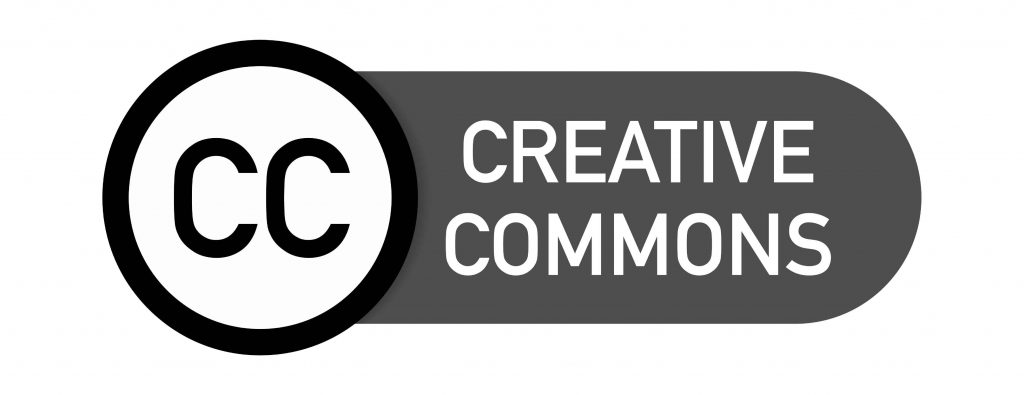
Secondary data & license considerations
You might be a researcher who doesn’t generate their own data and reuses data that others have shared. Knowledge of copyright license is essential for you, too. If the data isn’t licensed for reuse, then you can’t reuse it. Just being publicly available does not mean that you are allowed to use it. Social media data, for example, is owned by someone who might or might not have given permission for their material to be reused in research. If you’re going through a data provider (like a social media platform), you may have to comply with their terms and conditions, as well as the copyright. If you wish to re-share third-party data, unless it is under a Creative Commons licence, you might need to ask for permission to use it (potentially) or share it (definitely).
Tl;dr
- Just about anything can be used as data;
- Data sharing is good;
- Use a Creative Commons licence to make reuse clear;
- Consider a CC-BY-ND licence for your data;
- Always check licences before reusing others’ data.
Last word
Data sharing is good, and the complexities should not stand in the way of that. If you need any assistance, contact the Copyright and Licensing Manager or the Open Research Manager for Data and Methods.
To help, we have also created a useful guide How to keep data sharing legal – A quick guide. You can also read more about The State of Open Data on Springer Nature website. And if you need more evidence that Open Data is the way to go, why not have a read of the 2025 report on Open Data?! The future is Open!
So go ahead, Love your Data!
And Subscribe!
Research in Action - Andrew Manches
This is the second post about our latest Research in Action podcasts on the Mr Barton Maths Podcast. This pod features a Centre of Early Mathematics Learning (CEML) colleague Andrew Manches, from the University of Edinburgh and you can hear the episode here or in your usual podcast app.
In this wide ranging discussion, Andrew talks about his work including how to translate research into practice, embodied learning and the use of technology in cognition.
Andrew writes:
In my role as a Co-Investigator for Loughborough’s Centre of Early Mathematics Learning (CEML) at Loughborough I had the pleasure of being interviewed by Craig Barton. You can listen to the here. The interview was very relaxed, giving me the opportunity to share work as well as personal thoughts on the challenges of translating educational research into classroom practice, and the opportunities and risks of emerging technologies.
In our discussion about translating educational research into practice, I was able to draw on recent work critically reflecting on the tension between the depth and scale of translation. The former is often more familiar to academics -the opportunities to engage in depth with non-academic partners on projects, or to attend, and write for, events targeting practitioners. Here there has been much effort, and much improvement in academic ‘knowledge-exchange’, although the increasing volume and noise of information in the world makes this increasingly challenging. Unfortunately, however, this work is often limited to already interested parties; it is harder to scale impact to the thousands of educators and children our work seeks to benefit. There are avenues – identifying and communicating with key stakeholders and gatekeepers – but what about when our research develops educational resources for children – how do we develop and scale these sustainably?
Here I was able to draw on several projects that have explored the potential to scale resources informed by underpinning research. Generally, these resources draw upon my research field of ‘embodied learning’, an emerging area in education drawing upon cognitive theories that our embodied (body-based) interaction shapes how we think. For an educational example, how a child may conceptualise ‘addition’ in terms of physically bringing two groups of objects together. One way we can explore embodiment is looking at the spontaneous gestures that we create when communicating our thinking. For example, how young children use their hands when they lack the language. Or how adults naturally use gestures when explaining ideas to children, although they may not be aware they are doing so. These gestures reveal much about how we think. This is why on one project we created a game – STEM Charades – which educators (and parents) can play with children (with or without the physical resource) to reflect on how we use our hands to represent and explain different ideas.
In other work, we have explored the potential of technology to provide new interaction experiences. This is not about artificial intelligence (although our group is exploring the impact and potential of AI for young children), but rather how we can represent ideas – such as numbers – in new ways through technology. As an example, we are creating a virtual number representation within a creative environment (Numbuko) as part of CEML to enable young children to explore numerical relationships through colour. We are also exploring how Numbuko could be physical – digitally augmented blocks – allowing children to physically add groups of objects together and see the numerical changes through colour.
Trying to scale ‘adoption’ of educational resources is challenging and presents awkward questions to academics about the boundaries of their role. The government is encouraging social-minded (e.g., educational) ventures from research – but do academics have the time, support, or motivation? While personally I lack time, my previous career as an infant teacher gives the motivation to try and find ways to scale resources – whether through industry partners or directly through entrepreneurship. Importantly, I feel where academics do try to develop or support the development of research-informed resources, they have more voice to critique the many proliferating resources already out there – which as anyone attending an educational technology show recently will testify – is only set to accelerate.
We’d love to know what you think, so please drop us a line or get in touch with Andrew if you’d like to know more about his work.
You can listen to the previous Research in Action series on Craig’s podcast page here.
This blog post was edited by Chris Shore.
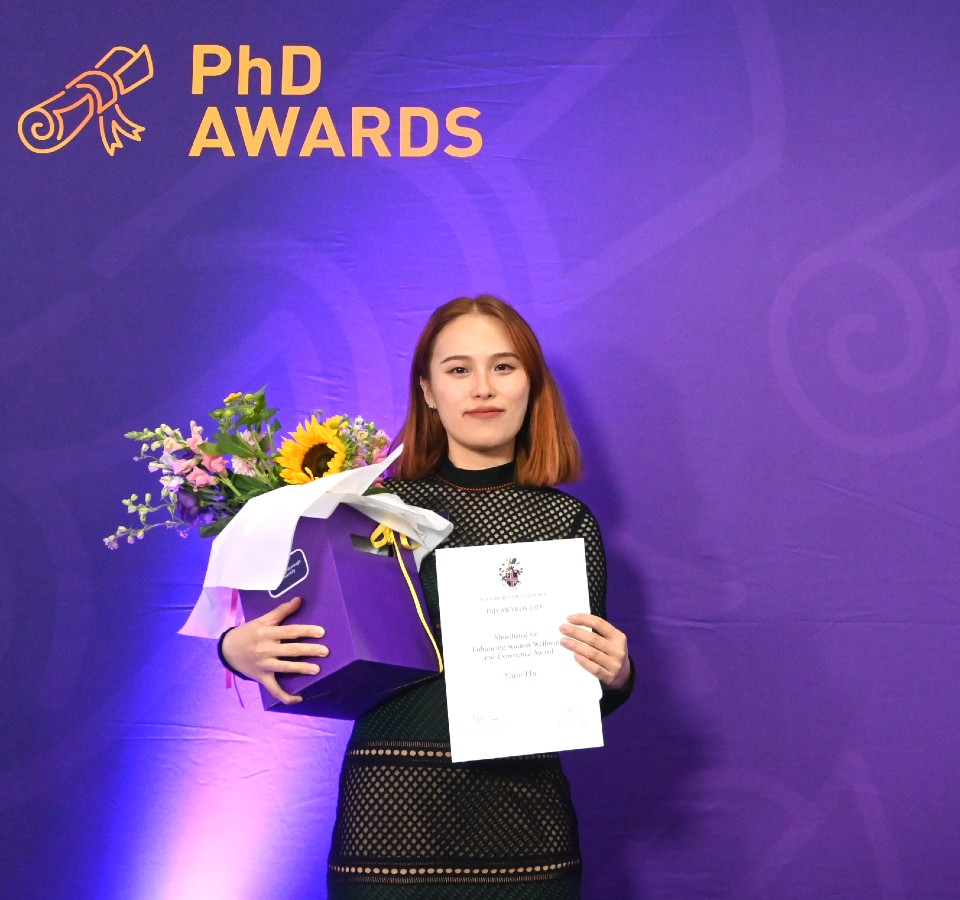
Five Minutes With: Yajie Hu

What’s your job title and how long have you been at Loughborough?
I am a Doctoral Leader at the Institute of Advanced Studies (IAS) as well as a Doctoral Researcher in the School of Design and Creative Arts. I have been at Loughborough for more than four years now.
Tell us what a typical day in your job looks like?
Now that I have submitted my PhD thesis, my days are quite varied. Much of my time is spent juggling different roles across the University. When we have IAS events, I usually help support activities or attend meetings with the team. On other days, I might be teaching or supervising students, which can easily fill a full day with tutorials and academic support. I also enjoy getting involved in creative and student-focused activities, such as leading LU Arts workshops whenever the opportunity arises. So there isn’t really a typical day for me at the moment, but that’s exactly what keeps things interesting!
What’s your favourite project you’ve worked on?
One of my favourite projects has been my role as a Doctoral Leader at IAS. This role has given me the opportunity to connect and network with researchers/academics from diverse disciplines around the world, help organise academic events, and contribute to fostering an inclusive and supportive research community. It has not only broadened my perspective on multidisciplinary research but also enhanced my skills in academic networking and collaboration, which are experiences that I believe will significantly benefit my academic journey in many ways.
What is your proudest moment at Loughborough?
I think my proudest moments at Loughborough are not just a single event. They are really a combination of experiences. It could be submitting my PhD thesis, receiving positive feedback from colleagues or students, or being nominated for an award. All of these moments have been incredibly rewarding. I feel that Loughborough University has offered me so many opportunities, and if you are able to see them and make the most of them, you can truly enjoy and grow from everything the University has to offer.
Which University value do you most resonate with and why?
I would say the value I most connect with at Loughborough is collaboration. From my experience, even though the University is very large, there are many events and opportunities that bring different departments together. This encourages dialogue, teamwork, and collaboration across disciplines. I have felt a strong sense of community at Loughborough, almost like being part of a big Loughborough family, which makes the collaborative environment really special.
Tell us something you do outside of work that we might not know about?
Outside of study or work, I am a professional jewellery artist with around ten years of experience in contemporary jewellery. My work is internationally recognised and has been exhibited in many countries, including the United Kingdom, the United States, China, Germany, Italy, France, Portugal, Poland, Greece, Turkey, Romania, Sweden, and Belgium. Notable exhibitions include TALENTE 2018 during Munich Jewellery Week, New York Jewellery Week, and Florence Jewellery Week. I have received several awards for my work, and some of my pieces are featured in the book ‘Chinese Contemporary Jewellery Design’ by Dr Bifei Cao. As an artist, I am passionate about exploring colour, texture, and form, creating pieces that are both wearable and appreciated as art.
What is your favourite quote?
“Success is not final, failure is not fatal: it is the courage to continue that counts”, by Winston Churchill. It reminds us that winning or losing is never the end of the story, and what really counts is having the strength and determination to keep going, even when faced with difficulties.
If you would like to feature in ‘Five Minutes With’, or you work with someone who you think would be great to include, please email Martha Causier at m.causier@lboro.ac.uk.
Solar Panels - are they worth it?
This blog post has been written by Nik Hunt, Loughborough University’s Environmental Manager.

As Loughborough University’s Environmental Manager for 14 years it may surprise many to learn that I only installed solar panels on my home 12 months ago. Through this blog I explain the concerns I had, which many may have shared, which delayed this choice, what finally convinced me, and how I feel 12 months on, sharing some of the performance figures from my installation.
Why didn’t I install solar panels earlier?
My career started at Loughborough University over 28 years ago and I only got interested in Environmental Management in my late 30’s so in fairness I was still learning a lot in my early 40’s. Of course, costs were a major consideration as was the possibility I may move house, yet here I still am.
Costs.
So, let’s talk costs as the main consideration. When it comes to big expenditures, a house and car are probably the biggest, a wedding may be in there too (so I am led to believe). Extensions or additions to a house probably come next and solar panels are no different although the costs are not, perhaps, as bad as they use to be.
According to web sources the cost of a solar panel installation has decreased by anywhere from 73%1 to 90%2 over the last 10 years.
UK Government data3 for UK installations doesn’t show such a great reduction but an 18% inflation adjusted reduction for the average price of a 4-10kW installation nonetheless.
My first experience of the likely costs was a discussion with a previous colleague who had solar panels installed over 10 years ago at a cost of around £20K. My first enquiry for a quote though wasn’t until 2022 where the system, including a battery, would have cost around £15K, which still seemed a lot. Then of course the war in Ukraine came along and the cost of both Gas and Electricity dramatically increased, and I started to think about it again. A random encounter with a Renewable Energy Consultant, through my work supporting the Civic Universities Partnership, then occurred in 2024. He was doing a dissertation on why people were not taking advantage of solar panel installation schemes, and this then led to a conversation as to why I hadn’t taken the plunge and an offer from him to design and provide a quote for a system through a local supplier.
The process of designing a solar system isn’t that difficult, with the right tools, in fact at least one of the companies I sought a comparative quote from did it all remotely using google earth with a few questions by phone/email to determine the potential roof space, orientation and pitch. I would however recommend working with a company who come and visit before your sign anything and will explain more on that later.
Different system options.
One of the big cost differences with a solar installation is whether to have a battery or not. On my first quote the battery was more than 50% of the system installation cost yet when I took the plunge my battery (2 x 4kWh) cost around 25% of the total installation. Of course the benefits of a battery will depend on how you plan to use your system, how much you are at home, your usage, time you are at home etc.
The advantages of a battery
I think we all know that the demand for electricity varies throughout the day and many of us will know that as a result many electricity retailers offer packages that vary the price to reflect these demand variations. A battery allows a household to manage and take advantage of these price variations, filling the battery with solar generation (free) or from the grid during low cost electricity periods (cheaper overnight) and then taking advantage of this by using the stored energy and/or solar generation during the day when energy costs are higher. Exporting solar generation and stored energy during higher value periods also has the potential, of course, to maximise your income potential.

Key factors in the solar generation potential of your roof space.
OK so everyone will immediately think south facing is the best, and yes on the whole this is correct, but there are other factors that can effect solar generation. I’m lucky in that I have a south facing roof but I lose out on late afternoon sun because of my chimney. A house with a west facing roof will benefit from the afternoon and evening sun at a time when demand and costs can be at their highest. Solar4good offers a good explanation of the differences as a result of orientation and pitch. Not all installations have to be on one side of your roof, I’ve seen installations that have multiple panels orientated in different directions which enables generation throughout the day. Obstacles which cast a shadow can be a problem depending on how your system is configured, as mentioned I have a chimney which casts a shadow over 4 of my panels and so it was recommended I fit Tigo Optimisers (other brands are available) which prevents my system from not operating at optimal levels when some panels are shaded.
Of course one of the big factors in the solar generation potential of your roof space is the number of panels which can be accommodated. The panels themselves are actually not that expensive, mine were only about 30% of the overall cost (around £200 each), meaning that a big part of the cost is the inverter, battery, labour and scaffolding costs. Logic therefore would suggest, IMHO, that you install as many as you can whilst the scaffolding and labour is on site. Here lies another reason for insisting on a site visit. The panels themselves are not mounted directly on the roof, they are mounted on a rack. The rack is mounted by removing tiles and attaching the rack to the roof trusses, so the positioning of the roof trusses in relation to the edge of the roof can impact on the positioning and hence number of solar panels.
My choices.
I decided, despite being single with no children, to go for as many panels as would fit on my roof and a fairly large battery. I did this for two reasons. Firstly the number crunching I did suggested the payback period would not be effected by the additional (£1K) outlay but that the system income over its lifespan would be increased be £12K. Secondly my house is large enough for the average family and therefore maximising the solar potential seemed logical for when I do eventually sell.
My installation therefore included: 14 x 435W panels with a 6.09 kWp theoretical peak output (under optimal conditions), 4 Tigo panel optimisers, 6kW inverter and a 8.29kWh capacity battery pack. This system cost approximately £9K


Now by this point I suspect you’re all dying to know how it has performed… well here are some figures for you:
- The system was forecast to produce 5523 kWh per annum, in the first year they have actually produced 6331 kWh
- The saving in year one was forecast to be £1146 but this was based on:
- Export rate of 15p generating £414.25 of income
- Unit costs of 26.5p
- Exporting 50%
My figures are telling me my income is £577.50 and my year 1 savings are £1385
- What does this mean for the payback?
- The designers prediction was between 6-7 years
- My prediction at current rates is 5 years and 7 months or allowing for the lost interest on the savings 6 years and 1 month
- However do consider:
- Import and export rates effect these figures,
- The weather is unpredictable, some days the panels produce very little (less than 1 kWh) but on peak days over 35kWh (39.2kWh 12th July 2025). Even on a sunny winter day they can produce over 15kWh (16.8kWh on boxing day this Christmas)
- How much you use can impact payback – a family purchasing more grid electricity at standard rates will benefit more from the solar they generate from using it than exporting it.
- What the installers don’t include in their figures is any added value to your property. In a report from 2024 Homebuilding & Renovating4 quoted sources that indicate that the added value can be from 0.5-2% (source was Octopus Energy) or as much as 4% (source was a Director of property company). The basis of this is that the solar panels will improve the EPC rating of your property. Now whether this would add to your selling price or just make the property more sellable in comparison to a like for like property without solar panels is unknown but at just 2.5% my installation costs would be covered so that’s something to be considered in the payback surely.
- My figures would have been slightly better had I chosen my current energy supplier and purchaser but I wrongly assumed I would benefit more with the supplier I chose but their decision to increase import costs whilst reducing export costs made me re-evaluate and change suppliers which lost me a couple of weeks of income and lowered my first 4 months so I expect this year to be even better.
Additional Reasons for ensuring a site visit
To survey access, scaffolding positioning, where the mounting rack can be attached to, the number of panels which can be achieved, potential shadows, battery and inverter positioning, cable runs, meter location, type of equipment in place and which will best fit the spaces.
Why should we be installing more home solar?
Solar is readily abundant – the earth received enough sunshine (343 watts per square meter) on average to meet all our needs, we just need to harvest it, store it and distribute it. We could be doing more. The Netherlands is 1/6th the size5 of the UK yet harvests 50%6 more solar power. Germany might be 45%5 bigger than the UK but they harvest a staggering 5 times6 more solar power.
1 – Solar panel costs have dropped 73% in the last 10 years, gov’t data shows | Homebuilding
2 – The Declining Cost of Solar Panels
3 – Solar photovoltaic (PV) cost data – GOV.UK
4 – Do solar panels add value to your home? We ask the experts | Homebuilding

From the Vice-Chancellor – January 2026

In my first newsletter of this year: looking after the London Games social legacy; outcomes from the Staff Experience Survey; our inaugural Futures Festival; advisory roles on HE bodies; and the WE Innovate project launches.

Loughborough becomes Spirit of 2012 custodian
After the London 2012 Olympic and Paralympic Games, the National Lottery Community Fund established the Spirit of 2012 to fund projects and research centred on the lasting legacy from local and national events. Since its inception, the Spirit of 2012 has amassed a huge collection of materials and I am delighted that we have been asked to be the custodian of this archive, ensuring that the Spirit of 2012’s learning, research and impact will remain accessible and free to policymakers, researchers, funders and anyone dedicated to delivering social impact through events.
Over the last 12 years Loughborough researchers have contributed to the delivery and evaluation of Spirit of 2012 programmes including a feasibility study for a proposed UK Capital of Sport. In 2023 we were appointed as one of the Spirit’s three Legacy Learning Partners to translate the organisation’s knowledge into digital learning resources; one of our projects, In The Spirit Wood, used evidence from the Spirit of 2012 knowledge bank to create a digital storytelling resource to foster positive perceptions of disability and impairment from an early age.
Future plans for the collection include the development of an oral history archive to enhance Loughborough’s social impact partnership with UK Sport. The Spirit of 2012 collection complements our world-leading expertise in sport, and continues the commitment made by our Chancellor, Lord Coe, when he was Chair of the London 2012 Organising Committee that the London Games would have a lasting and far-reaching legacy. They were widely regarded as one of the best Games for legacy and the archive we now host will be the foundation for the planning of events such as these into the future.

Headline results of the 2025 Staff Experience Survey
We now have the headline results of the 2025 Staff Experience Survey, with Loughborough retaining its position as a sector-leading university. Once again, we sit above, or in one case equal to, the sector average for all nine themes within the survey.
More than 2,200 of you had your say on what it’s like to work at the University. Your feedback is crucial in helping us to understand what we’re doing well as a University and where we can change things to truly turn the dial on our staff experience. In the last twelve months alone, we’ve made some major changes because of your feedback. Working together, we’ve strengthened academic line management structures and brought to life the philosophy of GLOW to support better conversations about growth, learning, opportunities and wellbeing. These are all important things you highlighted in previous surveys.
Of the nine themes measured in the survey, we have increased our score in six compared to 2024. We were especially pleased to see the progress we are making with work on our values – this was the theme that increased most significantly compared to last year. We were also pleased to hear the things you like about working at Loughborough University, receiving lots of comments particularly about the sense of community we have here.
Given the challenges facing the sector it is encouraging to see such results. However, we cannot stand still; there is more we plan to do as part of our People and Culture Strategy, and your feedback will help us to focus this further. For instance, we’ll be continuing the work to support wellbeing across our community. We’ll be looking at ways to help all colleagues feel recognised – ‘reward and recognition’ continues to be a theme that colleagues feel strongly about and we recognise that this is an ongoing challenge within higher education. And we’ll be further developing organisation-wide skills around feedback and embedding GLOW as the foundation of our colleague experience.
Your Dean or Director will be communicating your local results over the coming weeks and we will share further details about our University results during February. We will also keep you informed throughout the year about our progress as a result of your feedback. Thank you for engaging with the survey and for sharing your views. Your feedback really does make a difference.

New Futures Festival launched
Our first-ever Futures Festival is now in full swing, offering events such as workshops, hands-on challenges and hackathons to help our students explore different career paths, enhance their employability skills and network with employers. The week-long event aims to support them at every stage of their journey, whether they have a clear idea of the path they want to take or are still exploring all their options.
One of the speakers at this year’s event is Zak Marks (Industrial Design and Technology, 2020). During his final year Zak came up with a concept that could store, monitor and provide training for emergency anaphylaxis medication in public places. With a grant from Loughborough University’s Start-up Fund, Zak and his business partner launched Kitt Medical in 2023 and secured investment from two of the Dragons’ Den entrepreneurs in 2025. To date 1,500 of the kits have been installed in more than 1,000 UK schools and businesses and have also been trialled on our own campus. I was delighted to present Zak with a Vice-Chancellor’s Gold Pin today in honour of his achievements. I’m sure his story will inspire many more of our student to follow their entrepreneurial dream.
The Futures Festival was one of the outcomes of the academic calendar year project, which was a priority initiative in our Education and Student Experience core plan. By making some changes to our academic year, we have been able to dedicate the week between Semesters one and two to professional and personal skills development activities for our students. Events such as the Futures Festival are a crucial part of the student experience, which is assessed through the National Student Survey (NSS). The NSS enables us to gain real insight into what our students think we’re doing well and where we could improve. Professor Sam Grogan, Pro Vice-Chancellor (Education and Student Experience), emailed you all earlier this week to explain why the NSS, which launches next week, matters. I would encourage you all to consider how you can encourage our students to take part.
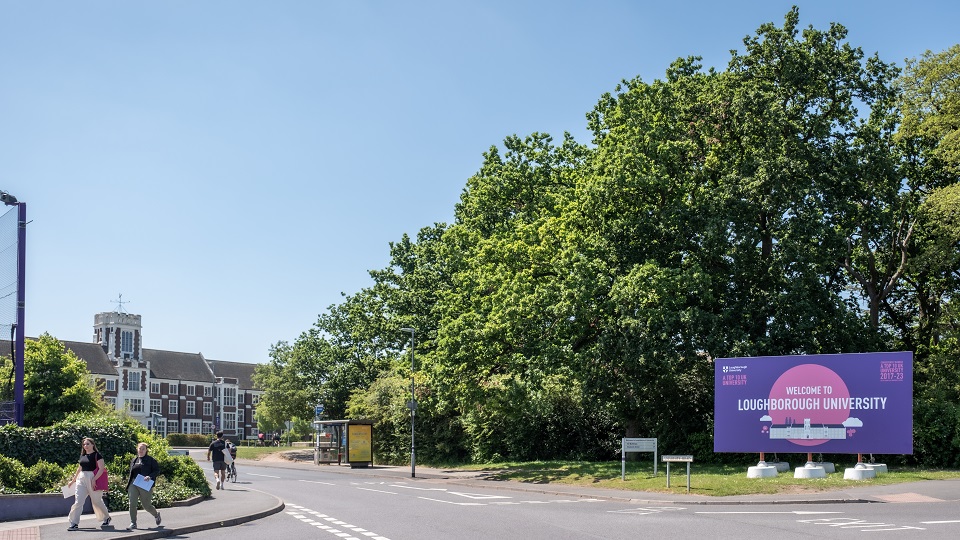
Helping to shape UK higher education
I have recently been privileged to accept appointments to two of the country’s leading higher education organisations: to become a board member of Universities UK (UUK) and to join the new Office for Students (OfS) Provider Panel.
UUK is the voice for 142 of the country’s higher education institutions. It works to bring universities together to take collective action, engage with government to influence policy and provide insight into the role that universities play and the benefits they bring to so many aspects of society. The Board, which is part of the organisation’s governance structure, is UUK’s main decision-making body.
The OfS is the regulatory body for higher education in England. It ensures that universities are well-run and enable students to have a high-quality academic experience and achieve positive outcomes, and that students from all backgrounds are enabled to access, succeed in and progress from university. The OfS’s Provider Panel will help the organisation to understand the views of the diverse institutions it regulates and alert the OfS to any risks that universities are facing. Appointments such as these enable Loughborough to play a key role in influencing decisions and policies that are crucial to higher education and other sectors, both now and in the future. I know colleagues across the University are regularly invited to take up advisory roles on national and international bodies or to contribute their expertise to formative projects. I would encourage you to engage with opportunities open to you and ensure you are sharing your knowledge and expertise with influential organisations around the globe.
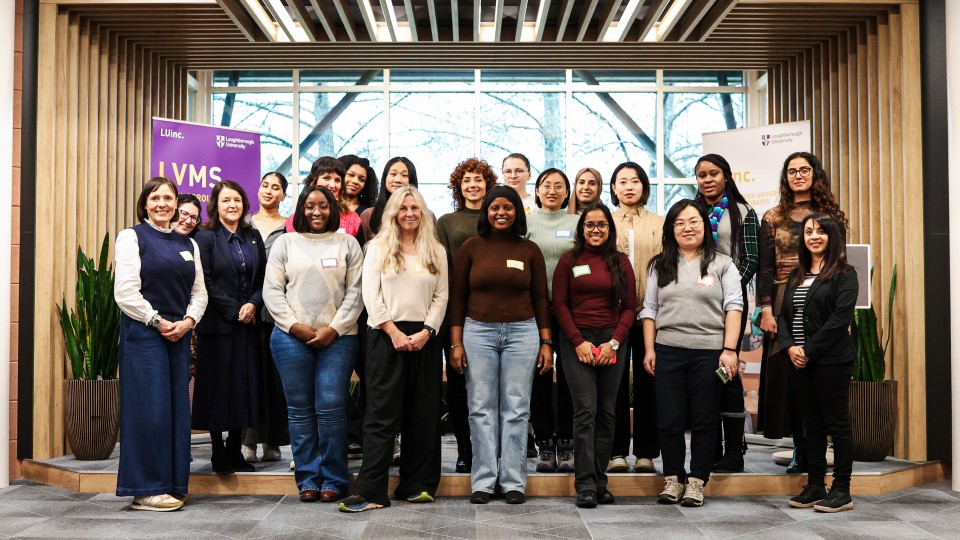
University becomes a partner in ‘WE Innovate’
This month we launched our first programme as part of the WE Innovate national programme, which is led by Imperial College London to support women-led startups across the UK. Loughborough was announced as a partner in the scheme last year and is the only Midlands university involved in the prestigious network that is committed to breaking barriers for women in entrepreneurship.
WE Innovate is a six-month pre-accelerator programme running from January to June. Participants benefit from expert-led masterclasses, personalised coaching, and monthly mentoring sessions, all designed to help transform early-stage ideas into viable, investor-ready ventures.
Each year five standout teams are chosen to pitch their ventures in a high-profile competition held in May, where they compete for a share of a £30,000 prize fund as well as legal support and leadership coaching. The programme is open to current students, alumni within two years of graduating, and PhD researchers who are looking to spin out ventures. Since its launch ten years ago, the WE Innovate programme has supported more than 500 women entrepreneurs, helping them to raise over £88million in funding and lead high-growth ventures in sectors such as health, sustainability and deep tech.
In our first call for participation, we received 38 expressions of interest, with 20 female founders selected to join the six month programme at Loughborough, which is supported by staff from the Loughborough Enterprise Network and the Research and Innovation Office. I am incredibly proud of the entrepreneurial culture we have here at Loughborough and am delighted that our partnership in this programme will enable us to expand the support and opportunities available to our women-led start-ups. I look forward to seeing how the first cohort of funders progress.
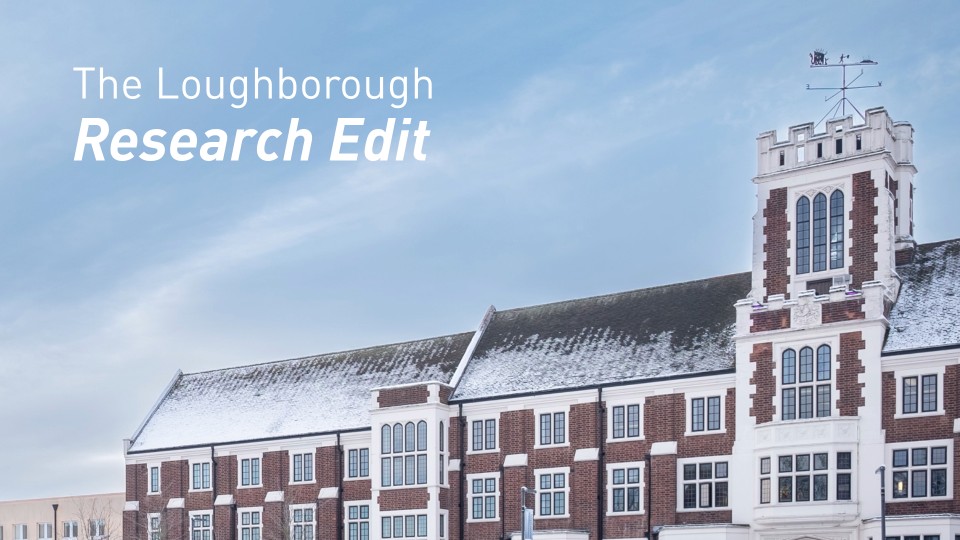
LinkedIn newsletter launched
The Loughborough Research Edit will be released monthly and include stories on research projects, features on staff awards and honours, and thought leadership pieces. It’s a great way to share with your networks how our research, people and discoveries are making a real difference.

Partnership for a Net Zero future
The Manufacturing Technology Centre, a research and technology organisation at the forefront of manufacturing innovation, has partnered with Loughborough University to fasttrack the development of hydrogencompatible systems for aerospace, automotive and power generation.

Webinars and whatnots – January 2025
Upcoming:
- Open Research Week Ireland 2026: 2-11 February
- International Love Data Week: 9-13 February
- The Benefits and Challenges of Open Source Software in Research: 11 February (LSE)
- Open Research Week 2026: 2-6 March (Edge Hill University, the University of Liverpool, Liverpool John Moores University, and the University of Essex
- Edinburgh Open Research Conference 2026: 18 June (submission deadline 13 February)
Catch up:
Of interest:
Previous months’ Webinars and whatnots:
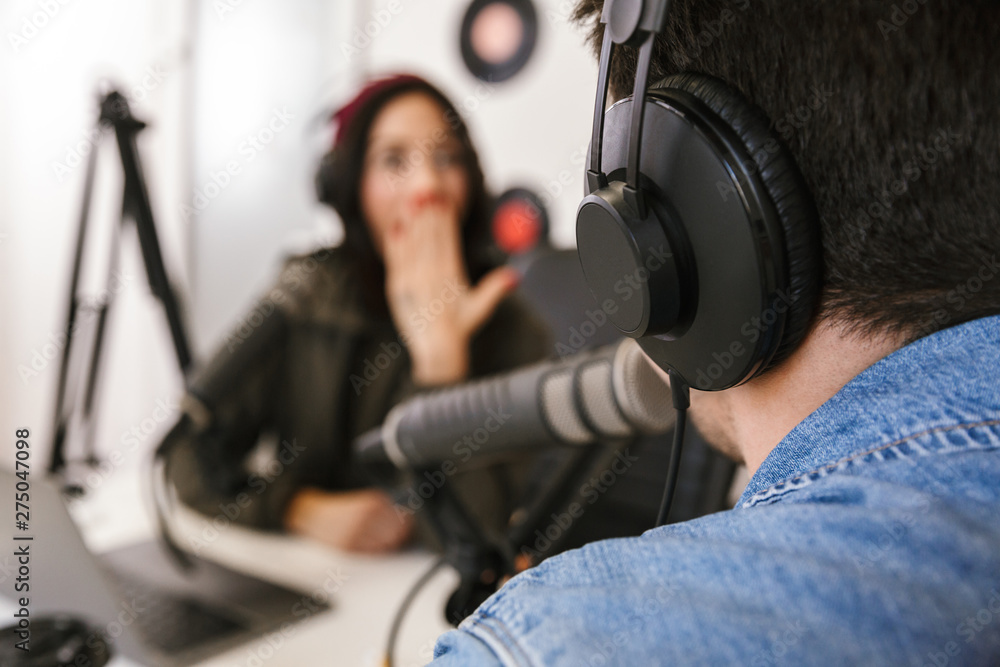
Research in Action - Silke Goebel
This is the first post in a series celebrating the latest round of podcasts hosted by the well known UK mathematics educator, Craig Barton. Craig is an author, trainer, podcaster and former classroom teacher. He is widely recognised for his research informed approach to teaching high school maths and his ability to translate complex ideas into practical classroom strategies. His podcast, books and training are an influential voice in maths teaching, along with his popular websites, including Mr Barton Maths and Eedi.
The first episode features Silke Goebel, a professor at the University of York (UK) and a challenge lead in the Centre for Early Mathematics Learning (CEML). In this podcast episode, she discussed with Craig about the linguistic influences on number processing. You can find the podcast here or search for it in your usual podcast app.
Silke writes:
As part of my involvement with the Centre of Early Mathematics Learning at Loughborough I had the exciting experience of being interviewed by Craig Barton. You can listen to the here. Craig Barton is a fantastic and engaging interviewer, and we covered a wide range of topics in our conversation.
We started talking about the basic building blocks of numerical skills with a particular focus on exact numbers, i.e. number words (‘twenty-five’) and Indo-Arabic digits (25). Next, I touched upon how numbers are represented in the brain. We then moved on to discuss the differences in number word construction between languages and how that might affect numerical learning and number processing. Next, we considered whether the numerical bases used affect learning (for information beyond the podcast, see our review article The cognitive processing of numerical bases) and why children when they first learn digits often mirror-reverse digits when they write them down from memory.
We’d love to know what you think, so please drop us a line or get in touch with Silke if you’d like to know more about her work.
You can listen to the previous Research in Action series on Craig’s podcast page here.
This blog post was edited by Chris Shore.
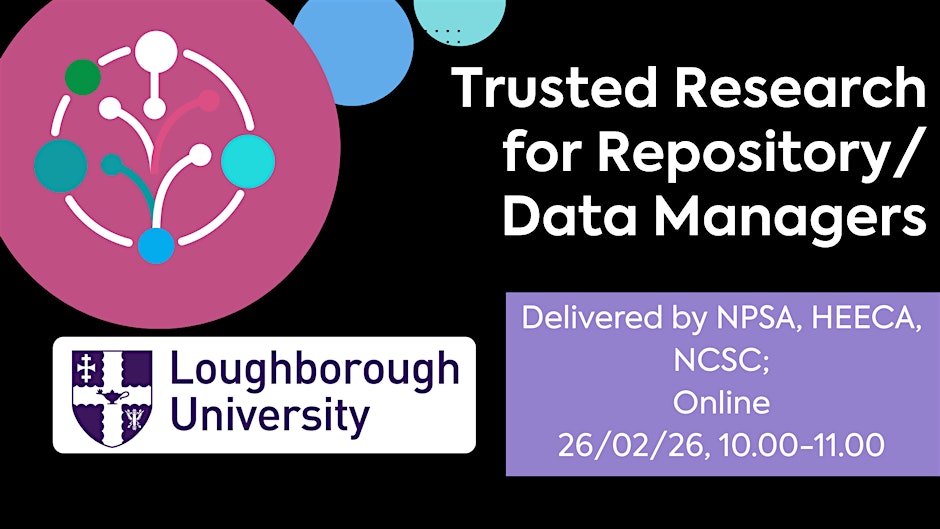
Trusted Research for Repository/Data Managers: 26 February 2026, 10:00-11:00

Trusted Research principles are vital to data stewardship but often misunderstood. This webinar introduces TR and builds user understanding.
In partnership with Loughborough University and CaSDAR, NPSA and HEECA are delivering this inaugural webinar as a fantastic opportunity to introduce trusted research (TR) and begin to touch on how you as repository and data managers already are or could be involved in TR as part of your work. We aim to support you by recognising and highlighting the critical role and value you hold in delivering world-leading institutional research, whether this be ensuring compliance and mitigating security risks, dealing with commercial data, and much more. This webinar is the beginning of a wider package of work highlighting the significance of the repository/data community in TR. NCSC will also be present to provide information about cybersecurity.
Trusted Research supports the integrity of the system of international research collaboration, which is vital to the continued success of the UK’s research and innovation sector.
International research is vulnerable to misuse by organisations, institutions and individuals who operate on behalf of nations that seek to undermine the prevailing system of international research collaboration. Trusted Research seeks to protect that system from being undermined by those who might seek to abuse the principles of open science and academic freedom for their own gain.
Trusted Research is a joint National Protective Security Authority NPSA and National Cyber Security Centre NCSC campaign, developed with academic institutions and endorsed by key bodies within the sector. It helps the UK’s world-leading academic sector continue to get the most out of international scientific collaboration whilst protecting intellectual property, sensitive research and personal information from potential theft, misuse, or exploitation. It is run collaboratively with the sector and supports self-regulation and sector identification and ownership of risk.
All attendees must sign up with an institutional email address.
Please note:
• No recording, screenshots, transcription, AI assistants etc throughout the webinar.
• All attendees should be physically located in the UK at the time of the webinar.
• NPSA/NCSC cameras will be off for the duration of the webinar.
• No material presented will be shared with attendees post webinar, but please see the NPSA and NCSC websites for information and resources.
Sign up here.
Critical Reading
Written by Bess Chan
When preparing for any assessment, one of the first steps is conducting thorough research and reading different sources. At this stage, some students may struggle to read efficiently and critically. If you’d like more guidance on efficient reading, additional support is available on LEARN.
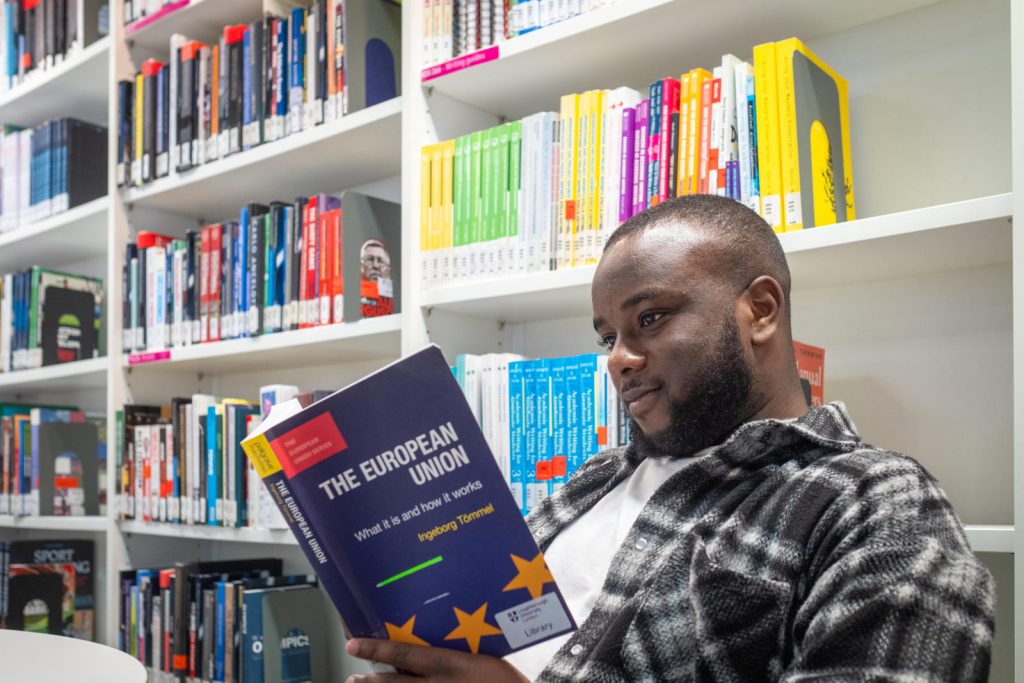
However, if you’d like to learn more about critical reading, which is an active, analytical approach to reading that goes beyond simply understanding the words, you’ll find some advice below.
Read with a clear purpose
Before reading a text, you need to ask yourself why you are reading it. Is it because you want to understand the theoretical framework, evaluate the methodology, or find empirical evidence? It’s important for you to be clear about your purpose, as it’ll help you focus on relevant sections. For example, if you’d like to understand the theoretical framework, you may want to spend more time reading the introduction, literature review, and research questions or hypotheses.
Find out more about reading different sections of research articles here.
Question the argument systematically
You should keep asking yourself a few questions while reading.
- What is the central argument?
- Is there a problem that the author is addressing? If so, what is it, and why does it matter?
- What assumptions are being made?
- What evidence is used? Is it appropriate and sufficient?
Throughout the process, you need to pay attention to what is emphasised and what is omitted. By doing so, you may be able to find out some possible areas for research.
Click here for more questions which can help you better understand a text.
Evaluate theoretical/conceptual frameworks, methodology, and evidence
When you’re working on long pieces of work, like dissertations, you’re usually required to include a theoretical framework. This provides a foundational structure for your research. You’ll use existing theories, concepts, and assumptions to guide your study, explain phenomena, and interpret your findings. Therefore, when reading, you need to find out:
- Whether the theoretical framework is clearly defined and justified
- Whether alternative theories are acknowledged or ignored
- If the framework constrains or enables the analysis.
In addition, you should evaluate the methodology and evidence. For example:
- Are the methods appropriate to the research question?
- Is the sample, dataset, or corpus adequate?
- Are interpretations warranted by the data?
In short, awareness of methodology is essential for judging the truthfulness and validity of published research.
Find out more about critical reading here.
Take analytical notes
When reading sources, you shouldn’t just read without making notes, as you can forget the details very easily. To ensure that you’re actively engaging with a text, you should go beyond summarising the sources and take analytical notes. These include strengths and weaknesses, questions raised by the text, points of agreement or disagreement, and relevance to your research.
Click here for notetaking techniques and here for a critical notetaking template.
Compare and contrast sources
Students are usually advised not to read only a few sources because you can develop a biased view on a particular issue. Therefore, one way to become objective is to read widely and understand the different views in the existing literature on a specific topic. Throughout the process, you’re expected to find out the relationship between different texts – whether a source confirms, challenges, or extends existing knowledge – and the patterns, tensions, and unresolved debates.
A good way to organise different ideas is to put them in a research matrix. Find out more about research matrices here.
Position sources within the literature
After comparing and contrasting different texts, you’ll be able to find out how sources are related to each other – whether one confirms, extends, or challenges other established work. This step is crucial in research, especially when you’re writing the literature review. In this section, you should identify the gaps in existing literature and show how your research is going to address them. Therefore, when you’re familiar with the sources, it’s likely that you’ll find out what’s missing in the current literature through understanding the relationships among various sources.
Click here for more information on the relationship between critical reading and literature reviews.
Maintain intellectual scepticism
Critical reading is not about dismissing work but engaging with it rigorously. Therefore, you should not accept claims at face value but check for overgeneralisations, unsupported claims, and methodological flaws. Remember: we accept different viewpoints even they are against our stance, and we need to readily reject arguments if they are not strong enough, even if they may support our point of view.
Developing critical reading skills takes time and practice! If you have any questions about the tips shared, you can book a 1-2-1 meeting with me, Bess Chan, your London-based EAP Tutor, via email or the booking form.
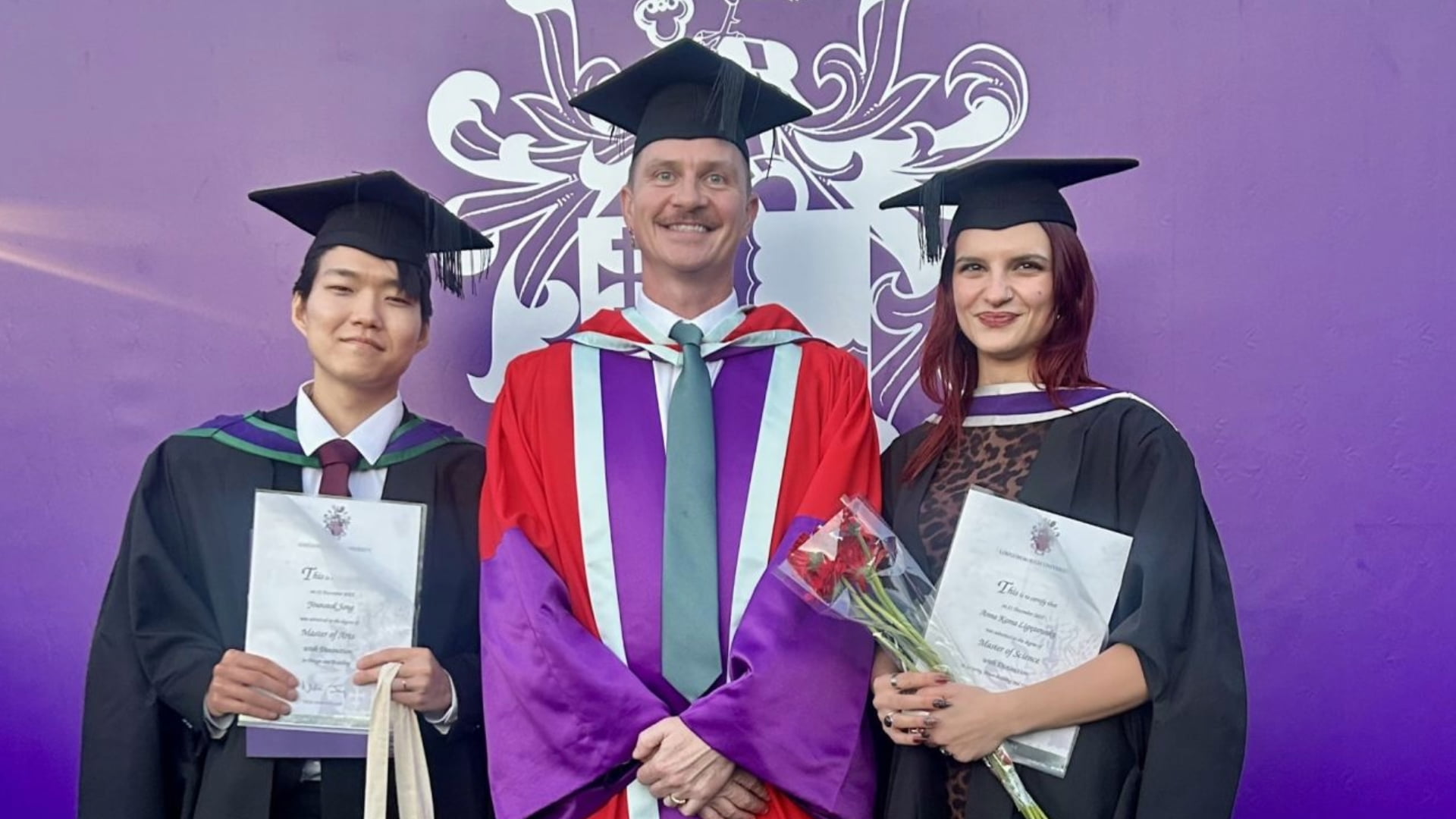
Fragile Peace, Persistent Systems: What My Master’s Dissertation Taught Me About Peace After Peace
‘Peace’ is often imagined as an endpoint. A signature on a treaty, a ceremony, a moment of relief. When Colombia signed the Havana Peace Accord in 2016, the world celebrated. After more than fifty years of armed conflict, the agreement promised justice, reconciliation, and, crucially, the protection of children.
Nearly a decade later, that promise feels far more fragile than many expected.
In Colombia, child recruitment declined briefly after the accord, only to surge again in recent years. Nearly a decade on, children continue to be recruited into armed groups – in some regions at new high levels. This raises a troubling question: how can such practices persist in a country that is officially ‘at peace’?
My dissertation, Fragile Peace, Persistent Systems: Child Recruitment through the Lens of the Transformative Justice Cube, grew out of this contradiction. I wanted to understand why child recruitment persists not during war, but after peace, and what this tells us about the limits of how peace is usually imagined and implemented.
At first glance, this appears to be a problem of implementation. Peace agreements look good on paper but fall apart in practice – a familiar story. But the more I read, the more interviews and reports I analysed, the clearer it became that this explanation was not enough. Child recruitment in Colombia is not a leftover from the past. It is not an accident. It is a feature of the present – a symptom of much deeper, persistent systems of violence.
This insight became the core argument of my research: child recruitment is not simply a consequence of armed conflict but a systemic practice, sustained by deeper structures of inequality. To explore this, I developed what I call the Transformative Justice Cube – a conceptual framework that brings together three dimensions: level of explanations, the levels of systemic violence and logics of capitalism, coloniality and patriarchy, and the different levels at which peacebuilding responses operate.
Using this framework, a sobering picture emerged. Many children do not join armed groups because they believe in a cause, but because armed groups offer something the state does not: income, protection, belonging, and sometimes even a sense of purpose. In regions marked by poverty, racialised exclusion and weak public institutions, armed groups often function as employers of last resort. From this perspective, recruitment is not a deviation from social order but an expression of it.
This also helps explain why Transitional Justice, despite its achievements, has struggled to prevent recruitment. The 2016 peace accord strongly recognised children as victims and established ambitious justice mechanisms. Yet Transitional Justice largely operates within the same economic, political and social systems that produced violence in the first place. As long as capitalism continues to generate extreme precarity, colonial legacies shape who is marginalised, and patriarchy structures violence and opportunity, children remain structurally vulnerable – peace agreement or not.
This is where Transformative Justice becomes essential. Rather than focusing only on accountability or reconciliation, it asks deeper questions: What systems make violence profitable? Whose knowledge and experiences are ignored in peace processes? And what would justice look like if it aimed not to stabilise inequality, but to dismantle it?
My argument is not that Transformative Justice has all the answers – far from it. Instead, I see it as an unfinished project that needs clearer tools, stronger grounding, and greater attention to context. The Transformative Justice Cube is my attempt to contribute to that conversation.
Writing this dissertation taught me something humbling: without transformation, peace risks becoming a thin layer of stability over persistent harm. Or, as my research ultimately suggests, peace without transformation does not end violence, it reorganises it.
That insight may be uncomfortable, but it is also an invitation. If we are serious about protecting children and marginalised communities, and about building lasting peace, we need to look beyond agreements and ask harder questions about the systems we leave untouched.
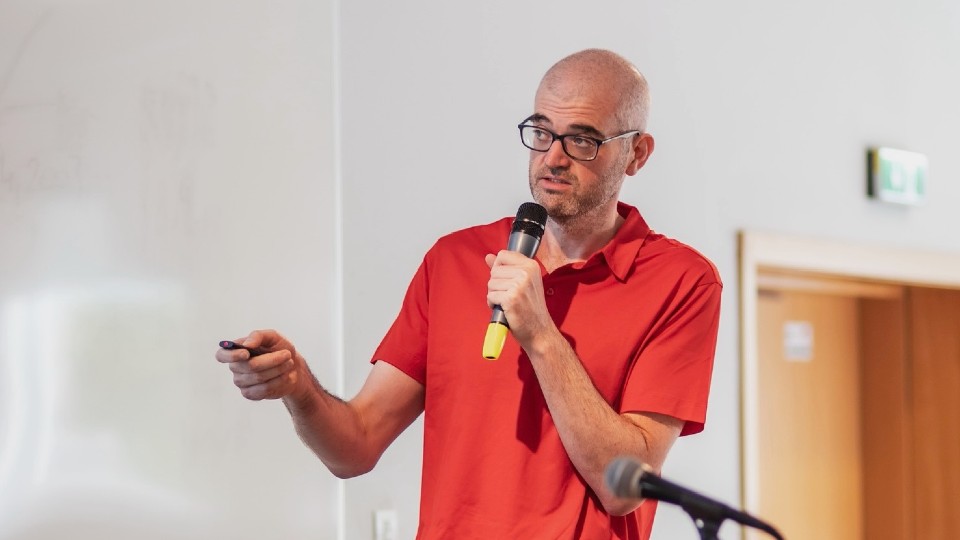
Five Minutes With: Matthew Inglis

What’s your job title and how long have you been at Loughborough?
I’m a Professor of Mathematical Cognition and have been at Loughborough for just over 15 years. I know that, because last year I was given a £150 voucher to celebrate. I spent it on plates.
Tell us what a typical day in your job looks like?
Normally, I start off with some coffee and do emails for half an hour or so. Then I get the train to Loughborough and cycle across town to campus. Maybe today was a typical day in the office. I had a meeting with a coauthor about a draft paper we’d received some reviews on, and then I read a section of a book. After that, I had lunch in the department, gave a two-hour lecture to our second-year undergraduates and finally met with a final-year project student.
What’s your favourite project you’ve worked on?
I have a tendency to think that whatever I’m currently working on is the most interesting thing I’ve ever done, which obviously can’t be right. Currently, I’m quite enthusiastic about a project I’m doing with Lara Alcock, which examines how prior belief influences logically reasoning in mathematics. It’s quite interesting psychologically (it’s not obvious whether probabilistic theories of day-to-day reasoning can/should apply to mathematics), but also philosophically (what does it mean for two known-to-be true mathematical statements to differ in believability?)
What is your proudest moment at Loughborough?
By far the proudest moment of my career was the 2018 USS pensions dispute. I was the Loughborough UCU branch chair at the time, and it felt like quite a big responsibility to lead the branch through a really difficult period. Universities UK were proposing to convert USS to a defined contribution scheme, which would have led to USS members being significantly poorer in retirement. Local members were fantastic. After a lot of effort from our branch committee, we obtained the fourth-highest turnout of any university in the industrial action ballot. The sense of solidarity on the picket lines was tangible, even (perhaps especially) when the “beast from the east” snowstorm arrived. As branch chair, I had to liaise with local management here at Loughborough, but also the national UCU leadership. Somehow we managed to maintain a really positive relationship on campus, despite many challenges. As a result, the then Vice Chancellor made a number of important national interventions supporting the union’s position. I think it’s well understood that all USS-eligible (grade 6 and above) staff at Loughborough today are meaningfully better off because of the action taken by UCU members during that period. But it’s much less well understood that the University itself is also in a much better financial position because of what we did: if the UUK plan had been implemented, then Loughborough would be spending about £3.8m/year more on pension contributions than it currently is (18% of salary rather than 14.5%). That’s about 60 lecturer salaries. You should never believe people who say that collective action doesn’t work.
Which University value do you most resonate with and why?
I actually think the University motto is much better than any of the values: by truth, wisdom and labour. That nicely encapsulates what academia should be about.
Tell us something you do outside of work that we might not know about?
According to chess.com, I’m currently the 13,554th best blitz chess player in the world (that’s the version where each player gets 3 or 5 minutes for all their moves). It occurred to me recently that I’m probably better at chess than I am at being an academic, and that, therefore, maybe I should spend less time on work and more on chess.
What is your favourite quote?
“See it, say it, sorted.”
If you would like to feature in ‘5 Minutes With’, or you work with someone who you think would be great to include, please email Lilia Boukikova at L.Boukikova@lboro.ac.uk

January Copyright Reads (2026)
Welcome one and all for the first iteration of copyright reads in 2026! In the Romanian calendar January is classed as gerar, meaning cold weather that generally comes with frost, and it has been frosty lately.
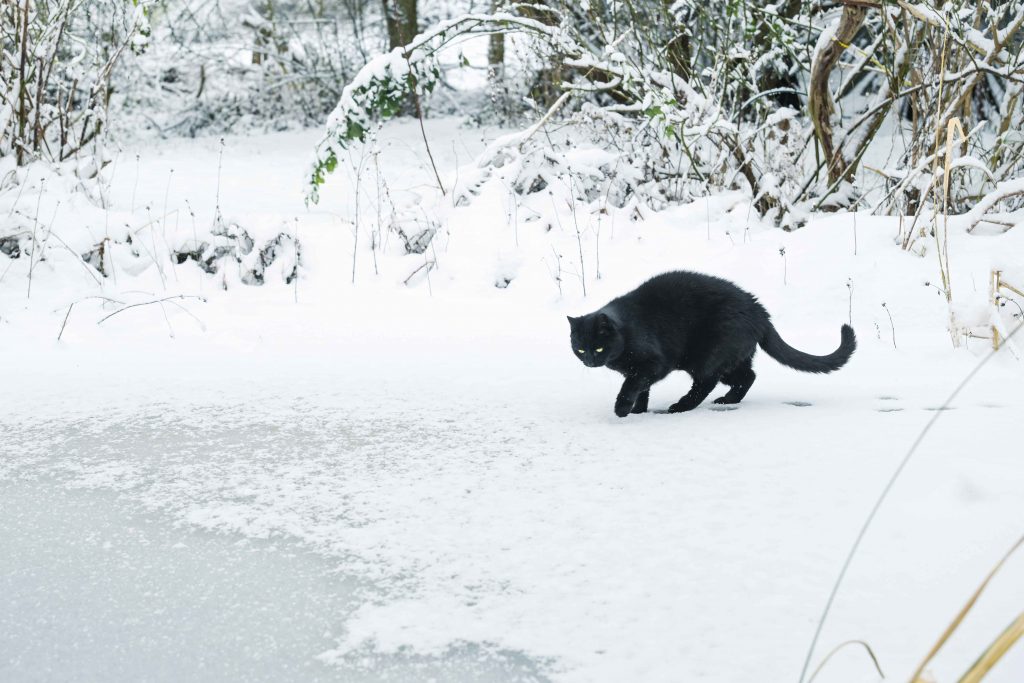
I can tell you that Copycat is not a fan of frost. Unless, frost and snow happens while Copycat is in a warm cottage in the Highlands with a roaring fire, some hot chocolate and curled up with a Agatha Christie mystery book.
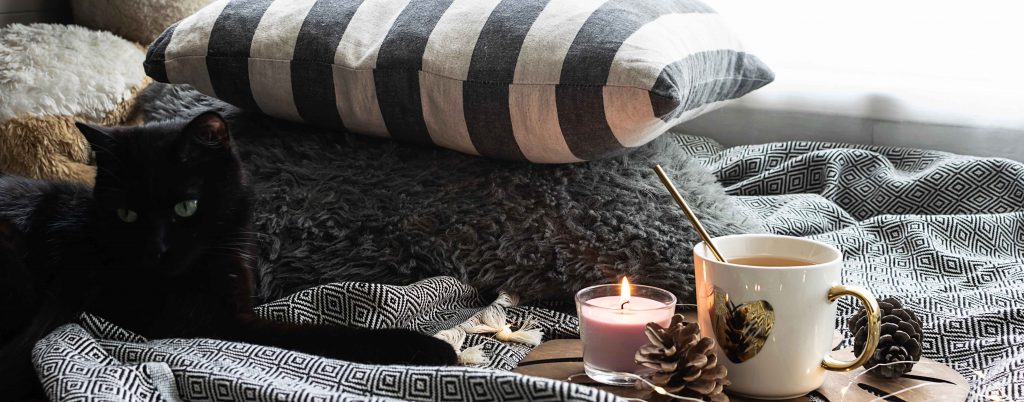
However, Copycat has been hard at work, choosing interesting copyright reads, videos and events from around the world.
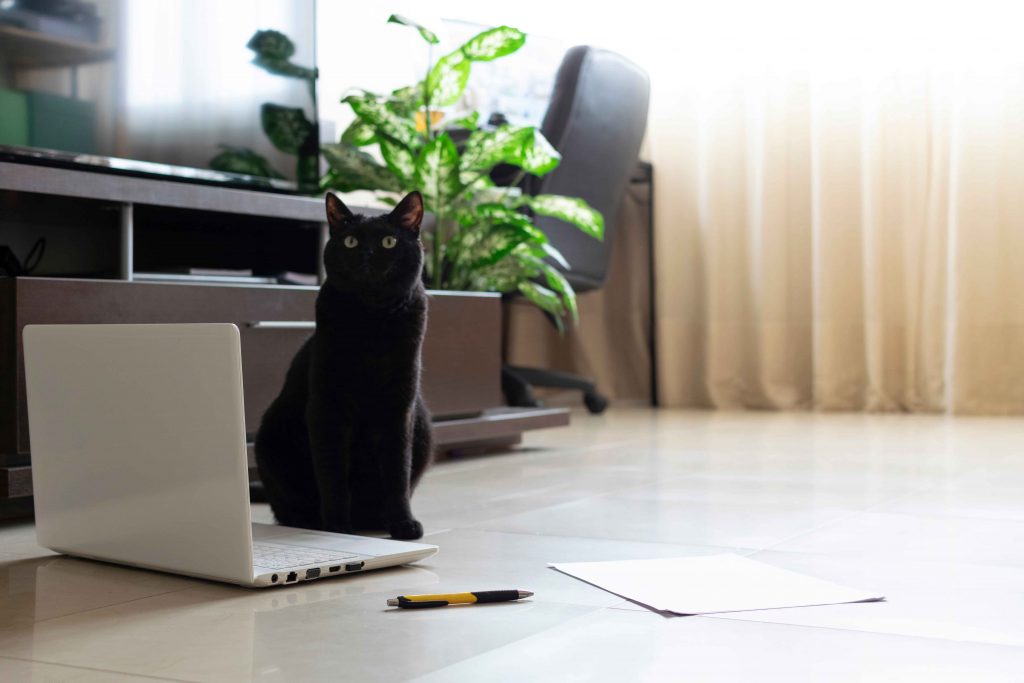
We start of with Copyright Lately’s count down of the worst copyright decisions of last year, the public domain, new and old court cases and of course AI mayhem.
Enjoy!
The 5 Worst Copyright Decisions of 2025
Copyright: Artworks entering the public domain in 2026
Royalty-Free vs Public Domain vs Creative Commons: What Creators Actually Need to Know
What happens when the copyright I own expires?
Fifth Circuit Expands Copyright Termination Beyond U.S. Borders
Two New Top Gun Rulings Map Copyright’s Danger Zone
The Public Value of Arts and Culture
IP BASICS – IP made easy [YouTube videos]
GEORGE ORWELL rejection clarifies impact of copyright on EU trademark applications
Copyrightschool 2025: For one more year we bring copyright into the classroom [Greece]
AI and Copyright: Updates from the Data (Use and Access) Act 2025 progress statement
The Question of AI and Copyright Infringement is Actually an Easy One
Why academics should do more consulting — and how to make it work
Will the Kat Von D Tattoo Case Kill “Total Concept and Feel”?
AI, Authorship, Copyright, and Human Originality
Drawing as Structured Inquiry: A Comparison Between Artistic and Scientific Visualization IICAH 2026 [YouTube video]
Public Domain Day a big deal for Australia
The Case of the Disappearing Copyright: Virtual Public Domain Day 2026 [Free Event]
South Korean creator, copyright groups oppose ‘use first, pay later’ stance in government AI plan
Lizzo sued over copyright for Sydney Sweeney song
Lizzo settles copyright infringement lawsuit over unreleased song
Fashion in TV shows: Emily in Paris’ outfits
Call for submissions to WIPO Magazine on Sports and IP
The 18th-century legal case that changed the face of music copyright law
We hope you enjoyed this selection of items from around the world. Hope to see you back next month, until then, stay warm but also enjoy the winter weather!

All images are from Adobe Stock.

Top viewed items in 2025
There’s a wider range of items among the 2025 top ten viewed items from the Loughborough Research Repository. Half of them are theses (#2, #4, #6, #7, #8), two reports (#3, #5), one chapter (#9), one dataset (#10) and the only journal article (#1) has over 100k views!
From an Open Research perspective, it warms my heart to see how visible Michael Norris’s work on the citation advantage of Open Access is <3
Celebrating Excellence: IDIA Graduates Honoured at Loughborough University
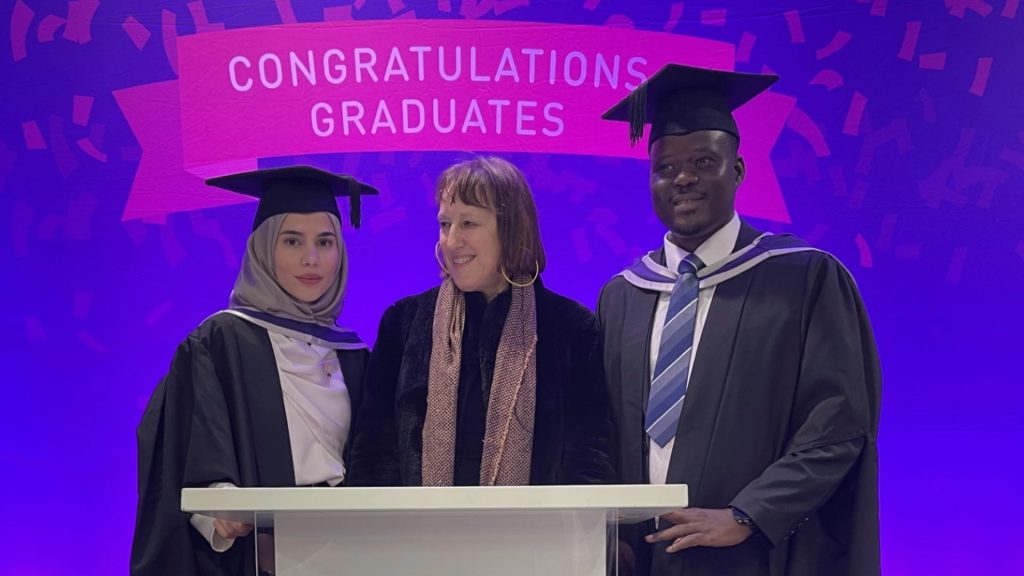
In December 2025, students from the Institute for Diplomacy and International Affairs (IDIA) at Loughborough University London gathered on the University’s East Midlands campus to celebrate their graduation. Set against the winter backdrop of the Leicestershire campus, the ceremony offered a fitting occasion to recognise their achievement, perseverance, and ambition.
Year after year, Loughborough University ensures that its students graduate in style, and this ceremony reflected an operation refined through decades of experience. Graduates from the London campus spent the day alongside their East Midlands counterparts, accompanied by family and friends, enjoying all that the larger campus has to offer. From the solemnity and pageantry of the ceremony itself to the warmth of the reception afterwards, the day balanced formality with celebration. Informal campus spaces provided the perfect settings for photographs and shared moments, creating lasting memories of an important milestone.
For some students, graduation marked the last opportunity for some time to see classmates with whom they had shared intense periods of study, debate, and mutual support. While there was a note of nostalgia, it was quickly overtaken by excitement and anticipation for the professional and personal opportunities that lie ahead.
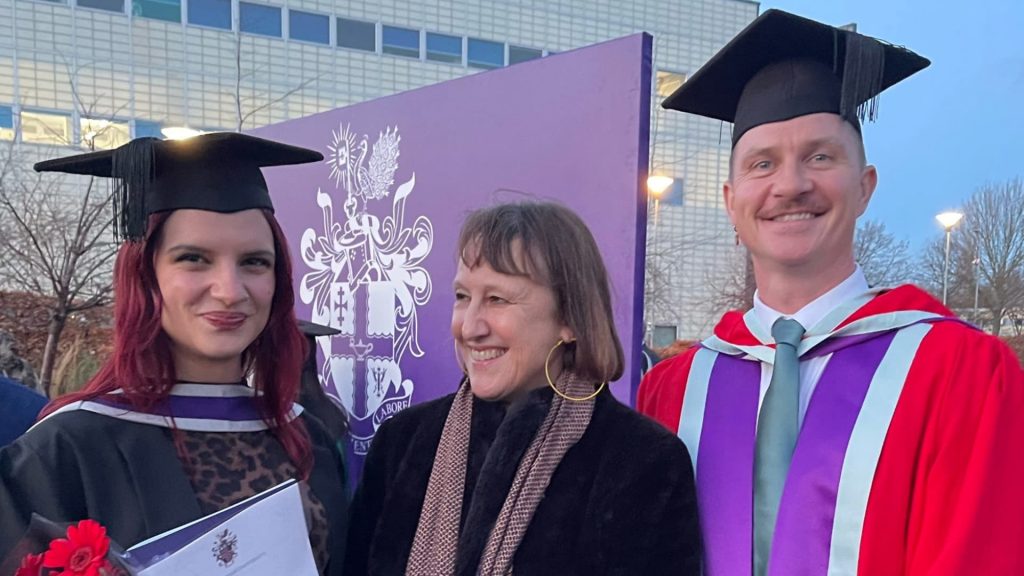
The ceremony celebrated the achievements of several outstanding IDIA students, pictured. Anna Ligezowska (pictured with Prof Helen Drake, Director or IDIA and Prof Aidan McGarry, Dean of the Loughborough London), graduating with an MSc in Security, Peace-building and Diplomacy, won both the IDIA 2025 Dissertation Prize and the Dean’s 2025 Dissertation Prize.
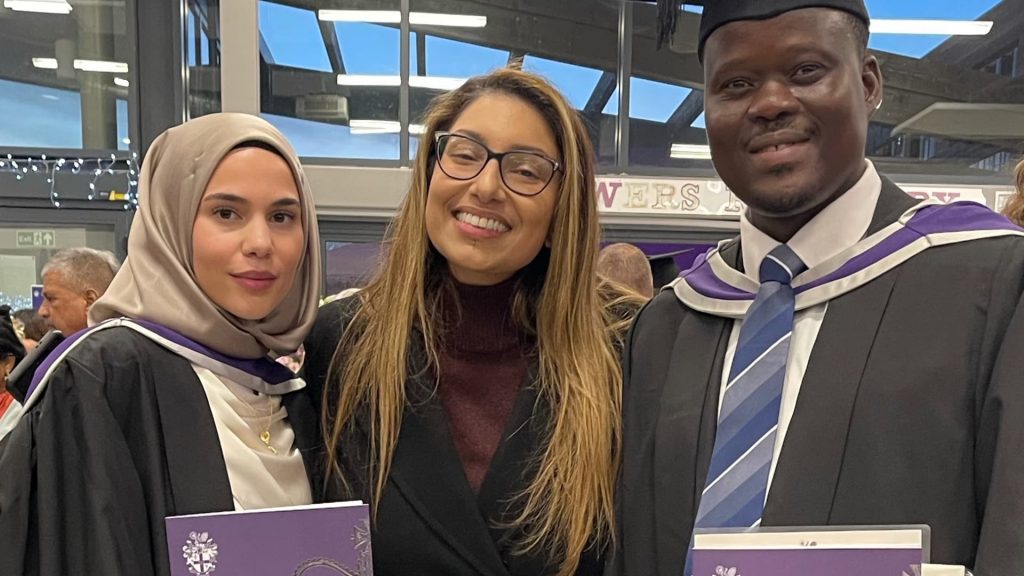
Imannur Gül (Left) graduated with an MSc in Diplomacy and International Relations was runner-up for the IDIA 2025 Dissertation Prize. Amadou Bakayo (Right) also graduated with an MSc in International Sustainable Development, joining his peers in marking the successful completion of a demanding programme.
For academic staff, graduation remains a highlight of the teaching year. It is a moment to share in students’ joy and to celebrate the tangible results of their hard work and dedication, reinforcing the collective pride at the heart of the IDIA community
Introducing Dr Sara Shaker
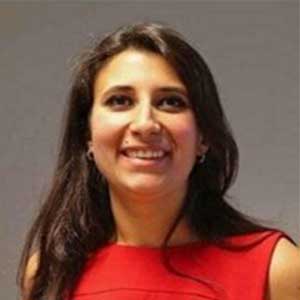
Having the opportunity to be a Residential Fellow at the Institute of Advanced Studies (IAS) at Loughborough University was one of the most enriching experiences of my academic journey. From the moment I arrived on campus, I was deeply humbled by the amazing welcome of the IAS team (Ksenia, Laura, Kieran, Lynda, Connor, Will) and the intellectually stimulating community that extends beyond disciplinary boundaries.
The IAS Residential Fellowship programme offers outstanding researchers from around the world a month-long research residency, providing not only time and space for scholarly work production but also a platform for connecting with fellow researchers and colleagues across different disciplines and research groups at Loughborough University.
During my stay at the IAS, I had the opportunity to meet with Dr. Vinícius Teixeira Pinto where we exchanged how sports become an arena for politics and activism. One of the most valuable aspects of the IAS is the interdisciplinary engagement it fosters. Through the IAS coffee mornings to corridor conversations, I was able to explore perspectives and insights outside my own field. This diversity opened new directions in my own research and broadened my ability to further explore new questions.
During the fellowship, I presented my work about “Drawing the Unseen: Graphic Reportage of Silencing during the Arab Spring”, where I explored the role of comic journalism in archiving the Arab Revolutions/Uprisings, with a particular focus on the graphic narratives of Arabic artists like Deena Moahmmed, Yazan Al Saadi, Hamid Suleiman, and Rawand Issa. I examined how these visual narratives function as counter-archives that challenge the official accounts circulated by Arab regimes. By introducing my work in an IAS research seminar, I was able to share key ideas with an engaged audience of faculty and students. This exercise not only sharpened my presentation skills but also yielded constructive feedback for further improvement. Additionally, in collaboration with the IAS, I had the opportunity to deliver a workshop to postgraduate students on job applications and postdoctoral opportunities, which fostered future collaboration and new avenues for joint research, including potential co-authored publications and grant applications, reflecting the interdisciplinary ethos of the IAS.
The IAS team was incredibly supportive throughout my residency. From navigating logistics to providing opportunities across departments, their administrative and academic support was incredible. The IAS residential fellowship provision, which includes campus accommodation, workspace, and collegial support, creates the ideal environment for immersive scholarly work.
The campus’s mix of green spaces, high-quality research facilities, and friendly spaces for dialogue made it the perfect space for focused academic work. It was only during my stay at the IAS, I was able to submit two scholarly works, one to the journal of Middle East Critique titled “Visual and Creative Resistance in Hamas’ Al-Fateh Comic Magazine: Beyond Militarism and Indoctrination ” that explores the comic magazine not only as an instrument of military indoctrination but as a hybrid medium of creative resistance. And another one to the international conference “Reimaging the New Middle East” at the Faculty of Economics and Political Science, Cairo University, which focused on how audio podcasts shape public opinion regarding the June 2025 Israeli attack on Iran, underlining their role as a media platform that plays an evident role in constructing political discourse.
As I reflect on my time as an IAS Residential Fellow, I am deeply grateful for the opportunity to connect with such a dynamic community and dedicated academics who invigorated my research agenda. I am truly thankful for such a rewarding academic experience, and I cannot wait to come back for another visit 🙂
Thank you so much for hosting a young, humbled academic from Egypt. I look forward to contributing to the growing legacy of international exchanges that the Institute of Advanced Studies champions.
Dr Sara Shaker
“Just as (great) as I remembered it”: My IAS Fellowship Experience at Loughborough University

This was not my first visit to the Institute of Advanced Studies (IAS), and that familiarity is precisely what made my time there as a Residential Fellow so special. During my PhD, I spent three months at the IAS under the supervision of its former Director, Professor Marsha Meskimmon. Since that research stay, almost three years ago now, I have remembered the IAS as a welcoming and generous place (rain notwithstanding), where I felt truly at home and where outstanding scholars offered invaluable advice and unwavering support. Returning this time, I was delighted to find that nothing had changed.
On this second visit, I had the pleasure of meeting more inspiring researchers (and nice colleagues), including Professor Ruth Kinna and Dr Alex Christoyannopoulos, both members of the Anarchist Research Group, as well as reconnecting with others such as Professor Hilary Robinson, also from the Department of International Relations, Politics and History. Throughout my stay, the IAS once again proved to be a stimulating and pleasant place to work. It was also a space for sharing ideas, cat anecdotes and delicious homemade cakes. Laura, Lynda, Connor, Kieran, Ksenia, Yajie and the other doctoral leaders form an exceptional team, and the mutual admiration and easy collaboration between them are palpable.
As part of my visit, I led a PGR workshop in which MA and PhD students from a wide range of disciplines reflected with me on the methodological biases present in research on women artists. However, I remember with particular fondness the public lecture I delivered on my research into Lu Märten, Hannah Höch and Rosa Luxemburg. The support offered by the IAS team, the openness and respect shown during the Q&A, and the thoughtful feedback that followed all contributed to an experience that I left with a genuine sense of fulfilment.
My final encounter at the IAS, this time as a member of the audience, was an engaging seminar addressing the challenges of freedom of expression and censorship in the current climate of militarisation. It was a fitting conclusion to a stay that, once again, reaffirmed the IAS as a place of intellectual generosity, critical engagement and warmth.
I hope to be able to return soon, this time with my cat!
Dr Andrea Pérez-Fernández
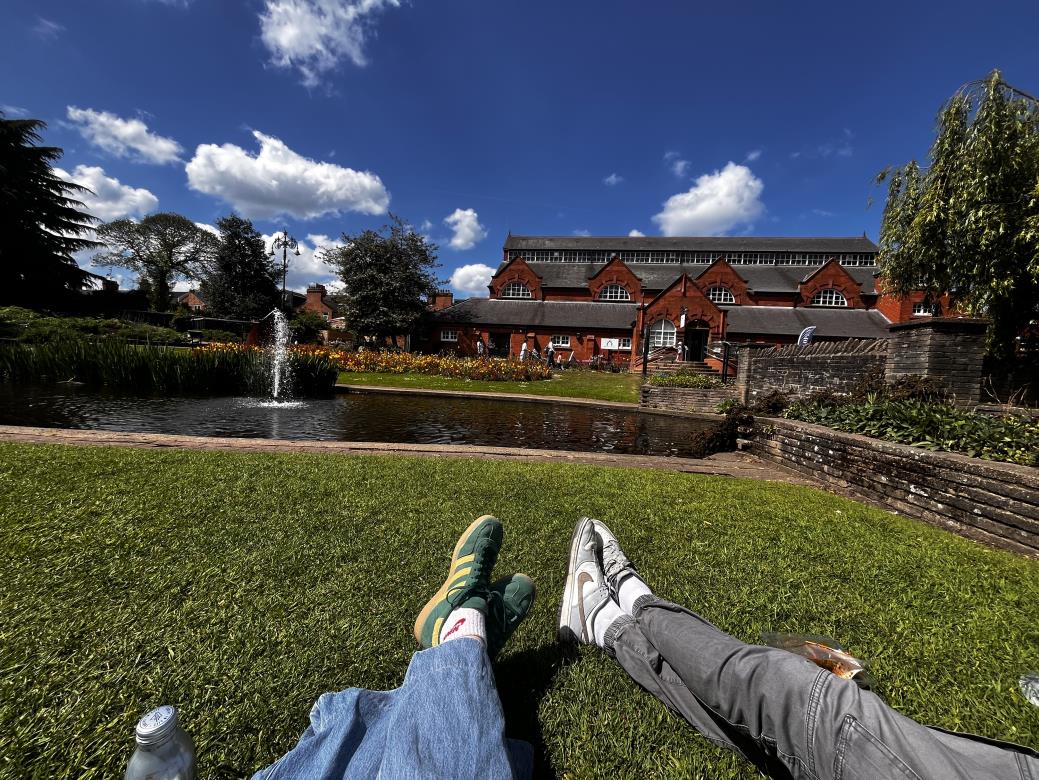
Life @ Lough: my top tips for making sure you get the most out of your university experience!
Hey! I’m Lauren. I’m a home student currently studying Graphic Design and Visualisation as an MA. I know, little me can’t believe it either! As a student, balancing studying, working and of course partying sounds tricky. That’s why I am going to give you a little insight into my tips and tricks of not just surviving university but having the best time while you study here at Loughborough!
Firstly, if you are fresh out of graduating from your degree, I just want to say congratulations! You made the right call joining us at Loughborough for your master’s – I am sure you are going to have the best time! Remember, your time at university is more than just studying – it’s about becoming who you want to be. This, for some, can feel a little daunting – but trust me, it is a lot of fun! You’re not on your own. You’re making these first steps into adulthood with course mates, flat mates and anyone else you meet on the way! If you find yourself a little lost and struggling to meet new people, we have a whole bunch of exciting societies and clubs to get involved with, from Anime and Creative Writing to Fighting Robots and Hiking – many of my friends were made this way.
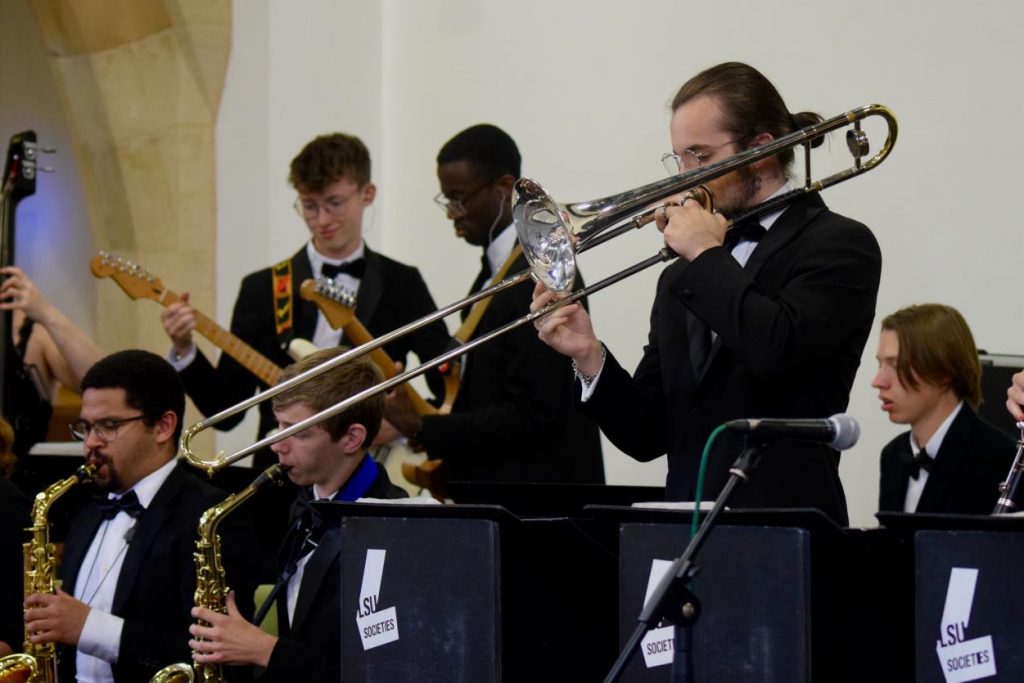
My course, MA Graphic Design and Visualisation, is taught under the SDCA (School of Design and Creative Arts). I chose to pursue a master’s degree after deciding to combine my previous degree in Production Design with graphics and I quickly learnt that there was such a wide range of creative backgrounds in my class. I didn’t study my undergraduate degree here, so I was a little worried about fitting in. However, I have never met such a positive, welcoming and inspiring group of people. My first little bit of advice – the more ‘you’ you are, the better your journey will be. The university staff, specifically SDCA staff, are always here to help and encourage you to be yourself!
As a university, Loughborough has the most incredible opportunities… make use of them! As an SDCA student, I can safely say there is so much to get involved with, from competitions like Christmas card designs, collaborations with the wider community and exciting trips to places like the London Design Museum and the Birmingham Design Festival. With these opportunities comes networking, which can be crucial when looking for work experience or post graduate jobs!

If you choose to work while studying, as a student who has a part-time job as well as a heavy workload for my course, I encourage you to make sure you are transparent with your employer about how often you are available for shifts. At the end of the day, you are here to study, so your priority must be that, and every reasonable employer understands this. I know first-hand that sometimes, working is needed for being able to afford essentials (and having fun). However, not giving yourself any time to relax can lead to burn out. The university recommends working no more than 15 hours a week. Hospitality, if you can deal with late nights, is a good option, as many contracts are flexible and zero-hours. If you find yourself struggling to balance things, our wellbeing team and learning staff are fantastic at giving advice and help.
Now, onto the fun bit. With studying hard, comes partying hard. It is important to let your hair down occasionally, especially when you have just handed in your assignments! If you haven’t been yet, I fully recommend a night out at our Student’s Union. Wednesday nights are Hey Ewe. I’m not much of a clubber, but as soon as Love Story starts, I am on that dance floor! If you prefer quieter events, we have quiz nights at JC’s, craft events like sip and paints, as well as many others to keep an eye out for on our SU page. Don’t forget about our local town, which includes a cinema, lots of cosy pubs with the Organ Grinder offering board game nights, and our surrounding open spaces, like Queens Park or Beacon Hill, where you can find highland cows and lovely picnic spaces. If you enjoy day trips, we are only ten minutes away from Leicester, where you can find the Space Centre, or thirty minutes away from Nottingham, where you can find every shop under the sun!
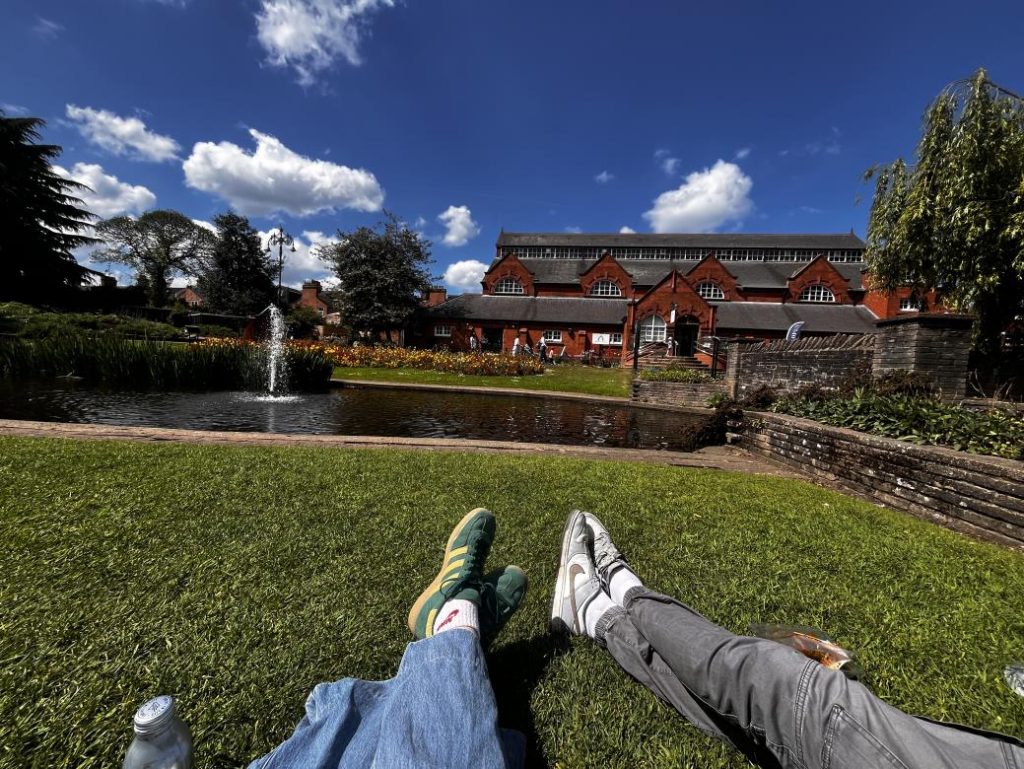
Finally, remember, your time at university will fly by! Studying is important, of course, but university is more than that. It’s about having fun, it’s about becoming independent, and it’s about becoming who you want to be. So, go out there, take every opportunity and go and experience the start of this exciting chapter. I’m nearly at the end of my time here at Loughborough, but I’d do it all again in a heartbeat.
Lauren Somerville, MA Graphic Design and Visualisation
The impact of screens and how to mitigate it

Screens have become an integral part of daily life, whether on smartphones, laptops, TVs, or tablets. They help us work, learn and connect but as screen time increases, so do concerns about its impact on our health and wellbeing.
Screen time can affect us in a number of ways:
- Mental health and emotional wellbeing
Excessive screen use, especially on social media, has been linked to increased anxiety, depression, and loneliness.
- Sleep disruption
Blue light from screens interferes with melatonin production, making it harder to fall asleep and stay asleep. Poor sleep quality can lead to fatigue, irritability, and reduced cognitive performance.
- Physical health
Prolonged screen time contributes to sedentary behaviour, which increases the risk of obesity, cardiovascular issues, and musculoskeletal problems like neck and eye strain.
- Cognitive function
Mindless scrolling and overstimulation can impair attention span, memory, and decision-making. The brain’s reward system becomes hooked on dopamine spikes from digital engagement, which can reduce motivation and focus.
- Social and developmental impact
For children and teens, too much screen time can hinder language development, social skills, and academic performance. Face-to-face interactions are essential for emotional growth and learning.
How to mitigate the effects of screen time
- Practice digital mindfulness
Be intentional about how and when you use screens. Avoid passive scrolling and engage with content that adds value whether educational, creative, or social. You could also remove all non-human notifications on your phone, returning it to its original purpose of communicating with others. Reflect on how digital habits affect your mood, relationships, and productivity.
- Create screen-free zones and times
Designate areas like bedrooms and dinner tables as screen-free. Avoid screens at least one hour before bedtime to improve sleep quality and use night mode or blue-light filters on your devices to minimize sleep disruption. You can also enable Night Light on Windows 11 which lets you switch your display to a more yellowish tint to counteract the effects of blue light.
Consider investing in an alarm clock. By leaving your phone in another room overnight, you create space for a calmer morning. Waking up without the immediate pull of screens can help you start the day feeling more positive and focused.
- Try a digital detox
Take breaks from screens whether for a few hours or a whole weekend. Use the time to read, cook, or spend time with friends and family.
- Prioritise physical activity
Balance screen time with movement. Regular exercise boosts mood, improves sleep, and counteracts the negative effects of sedentary behaviour. Find out simple ways to incorporate fitness around working life.
- Use tech to manage tech
Leverage screen time trackers and app timers to monitor and limit your usage and put your device on Do Not Disturb mode when you want to focus. You could also try the Pomodoro Technique which ensures that periods of working are productive and promotes a healthy balance between work and rest.
- Reconnect with nature
Spending time outdoors reduces stress and restores attention, offering us an opportunity to pause, reflect, and heal. Exposure to natural light also helps regulate circadian rhythms and supports mental health. Discover ways to enjoy more time outdoors.
By cultivating mindful habits, setting boundaries, and prioritising real-world connections, we can harness the benefits of technology whilst looking after our health and wellbeing.

When a proof feels beautiful (Even if you don’t completely understand it)
In this blog post, Matthew Inglis reflects on the role of philosophy in mathematical cognition, and discusses a study which explored mathematical aesthetics. Specifically, Matthew asks whether appreciating the beauty of a mathematical proof requires, or is defined by, fully understanding it.
This blog post relates to a special issue in the Journal of Mathematical Behaviour (The Journal of Mathematical Behavior | Mathematics Education meets the Philosophy of Mathematical Practice | ScienceDirect.com by Elsevier), and was edited by Jo Eaves.
Philosophy and Mathematical Cognition
Cognitive science emerged in the mid-20th century as a response to the perceived limitations of behaviourist approaches to psychology. From its early days, the field was an explicitly interdisciplinary endeavour. Howard Gardner famously depicted “the cognitive sciences” as nodes on a hexagon: psychology, artificial intelligence, neuroscience, anthropology, linguistics and philosophy. The logo of the Cognitive Science Society remains a hexagon to this day. Their website lists the same six foundational disciplines as Gardner did, but adds a seventh, education, to the list.
So the early cognitive scientists regarded philosophy as a core component of cognitive science. It played a foundational role by framing important questions about representation, computation, and intentionality, and by shaping theoretical models of cognition. But what role does philosophy play in the branch of cognitive science focused on mathematics, mathematical cognition?
Not much. Few philosophers attend MCLS conferences or publish in the Journal of Numerical Cognition. And, of the 2786 articles in the Web of Science database which have either “numerical cognition” or “mathematical cognition” in their abstracts, just 121 (4.3%) are from the philosophy category.
A couple of years ago the Centre for Mathematical Cognition at Loughborough hosted a workshop designed to explore this situation. The event led to a special issue of the Journal of Mathematical Behaviour, which has recently been published. The issue, entitled “Mathematics Education meets the Philosophy of Mathematical Practice”, explores the intersection between two fields that have historically operated in parallel. The collection of papers brings together research from mathematics education and philosophy of mathematical practice, and attempts to demonstrate how each can inform the other. In this blog post, I discuss the contribution that my colleague George Kinnear and I made to the issue, with the hope that it demonstrates how the empirical methods of mathematical cognition can produce findings that shed light on philosophical questions. The original article can be found here.
Mathematical Aesthetics
Many mathematicians say they know a beautiful proof when they see one: Henri Poincaré famously described mathematical beauty as a “real aesthetic feeling” recognised by “all true mathematicians”. Mathematicians routinely describe proofs as elegant, inspired or profound, and such judgements shape what is valued, remembered and pursued. Education researchers have also argued that aesthetic experiences can motivate learners, support engagement, and help students to see mathematics as meaningful rather than mechanical.
However, some philosophers of mathematics have questioned whether aesthetic judgements in mathematics are truly aesthetic. One influential view, associated with Gian-Carlo Rota, suggests that calling a proof “beautiful” is really a way of talking about understanding. On this account, beauty is shorthand for enlightenment. A mathematician who claims that a proof is beautiful, according to Rota, is actually saying that they understand the proof: that they can see how it fits into the wider mathematical landscape.
If that view is right, then probably mathematics educators shouldn’t worry about helping students to appreciate mathematical aesthetics. Focusing on developing a deep understanding would be enough, as aesthetic appreciation would simply follow.
Can empirical work shed light on this issue? Specifically, was Rota correct to suggest that when we ask questions about aesthetics in mathematical contexts we get answers that in fact relate to understanding?
George Kinnear and I conducted a study investigating this question, which was recently published in the special issue of the Journal of Mathematical Behavior. We asked second-year undergraduate mathematics students to read a well-known proof: Cantor’s diagonal argument showing that the real numbers between 0 and 1 cannot be listed in a sequence. This proof is often described as a classic example of mathematical beauty.
After reading it, students completed two kinds of tasks. First, they rated the proof using descriptive words. Some words captured aesthetics, such as ‘striking’ or ‘profound’. Others related to different qualities, such as precision or usefulness. Second, we measured their understanding in three different ways:
- Self-reported understanding, where students said how well they thought they understood the proof.
- A comprehension test, with questions checking knowledge of definitions, steps, and applications of the proof’s ideas.
- A proof summary task, where students wrote a short explanation of the key ideas, later judged by experts.
This combination allowed us to compare how aesthetic judgements relate to both perceived understanding and performance-based measures. The main result was clear. Students who said they understood the proof better were more likely to judge it as being aesthetically appealing. However, students who actually demonstrated better understanding on the test or summary task were not. In other words, feeling that you understand a proof and finding it beautiful go together to some extent. Actually understanding it, as judged by performance, is unrelated to whether you think it’s beautiful.
The performance-based measures of understanding didn’t seem to be invalid. They were related to each other and to students’ wider results in their studies. Understanding was being measured in a serious way: it just was not what drove students’ aesthetic appraisals.
This finding challenges the idea that aesthetic judgements in mathematics are merely disguised assessments of understanding. If that were the case, we would expect strong links between aesthetic ratings and all our measures of understanding, not just the self-reports. Instead, the results suggest that aesthetic appraisal is a distinct psychological response. It is connected to understanding, but not reducible to it. A proof can feel inspired or striking even when its details are only partially grasped.
This aligns with broader research showing that self-assessments of learning are influenced by emotion, confidence, and general impressions, not just by what has been learned. A proof that feels pleasing or impressive may create a sense of understanding, whether or not that sense is accurate.
What does this mean for the field of mathematical cognition?
Should mathematical cognition research concern itself with topics, such as mathematical aesthetics, more traditionally associated with the philosophy of mathematics? I think so. The goal of mathematical cognition is to understand how humans comprehend and use mathematics. Many branches of the philosophy of mathematics touch on these issues: epistemologists ask how humans can come to know mathematical ideas, philosophers of mathematical practice interrogate how mathematicians work, and how mathematical cultures develop. All these topics should be of interest to the field of mathematical cognition. I hope that the Journal of Mathematical Behavior special issue demonstrates the value of regarding philosophy as a core part of mathematical cognition research.
About the Author
Matthew Inglis is Professor of Mathematical Cognition at Loughborough University. His research focuses on how people understand, evaluate, and experience mathematics, including proof comprehension, reasoning, and mathematical aesthetics.

Five Minutes With: Siân Adiseshiah

What’s your job title and how long have you been at Loughborough?
I joined Loughborough as Senior Lecturer in English and Drama in 2018, and have been Professor of Literature, Politics and Performance since 2023. I took on the role of Head of English in the School of Social Sciences and Humanities in 2024.
Tell us what a typical day in your job looks like?
Quite a few of your respondents say this, but it’s true for me too: every day really is different. As Head of Department there are usually quite a lot of meetings and emails – about both operational matters and strategic planning. This week I also delivered Part A lectures and workshops to Introduction to Drama students and finished final organisational work for a theatre trip to the Birmingham Rep for students on that module. I’ve spent time re-assigning some teaching and amending WAMS (workload allocation management system), meeting individual staff members about various matters including programme development, fellowship applications, and promotion, reading drafts of PhD work and holding supervisions, joining the Health Humanities Research Group for a planning meeting, and submitting a research funding application.
What’s your favourite project you’ve worked on?
Particularly enjoyable was a project called ‘The Good Age: Long Life, Literature and Utopianism’ (2016), which I worked on with a long-time collaborator and former colleague. I was able to bring together two research passions: literary age studies and utopian studies. The project culminated in an AHRC and British Academy Being Human festival, where we used utopian literature and theory to engage older local community members in imagining alternative futures.
I’m also having a lot of fun with a current project on old age, AI, and the uncanny in contemporary theatre. It was definitely enhanced by an invitation to participate in a VR/metaverse performance in Innsbruck, Austria, where I played the role of “Chartruse”, a small green alien!
What is your proudest moment at Loughborough?
It’s always incredibly nerve wracking when your PhD students undergo their Vivas, and absolutely fantastic when they pass.
A close second was when I heard the news a few weeks ago that I had been appointed as a sub-panellist to REF2029 UoA 27.
Which University value do you most resonate with and why?
I’d like to say ‘creative’, but many of my colleagues put me to shame on that one, so I’ll go with ‘collaborative’. I am lucky to lead a brilliant department with excellent colleagues, and I’ve enjoyed trying to develop a collaborative departmental culture.
Tell us something you do outside of work that we might not know about?
I run a few times a week, including a weekly 11-mile Sunday run with a colleague and my dog (a red fox labrador). But I guess that’s par for the course at Loughborough, so I’ll also mention that I love all kinds of cooking, baking, and fermentation, including making sourdough bread, and my own kefir and kombucha.
What is your favourite quote?
Angela Davis: “Freedom is a constant struggle.”
If you would like to feature in ‘5 Minutes With’, or you work with someone who you think would be great to include, please email Lilia Boukikova at L.Boukikova@lboro.ac.uk
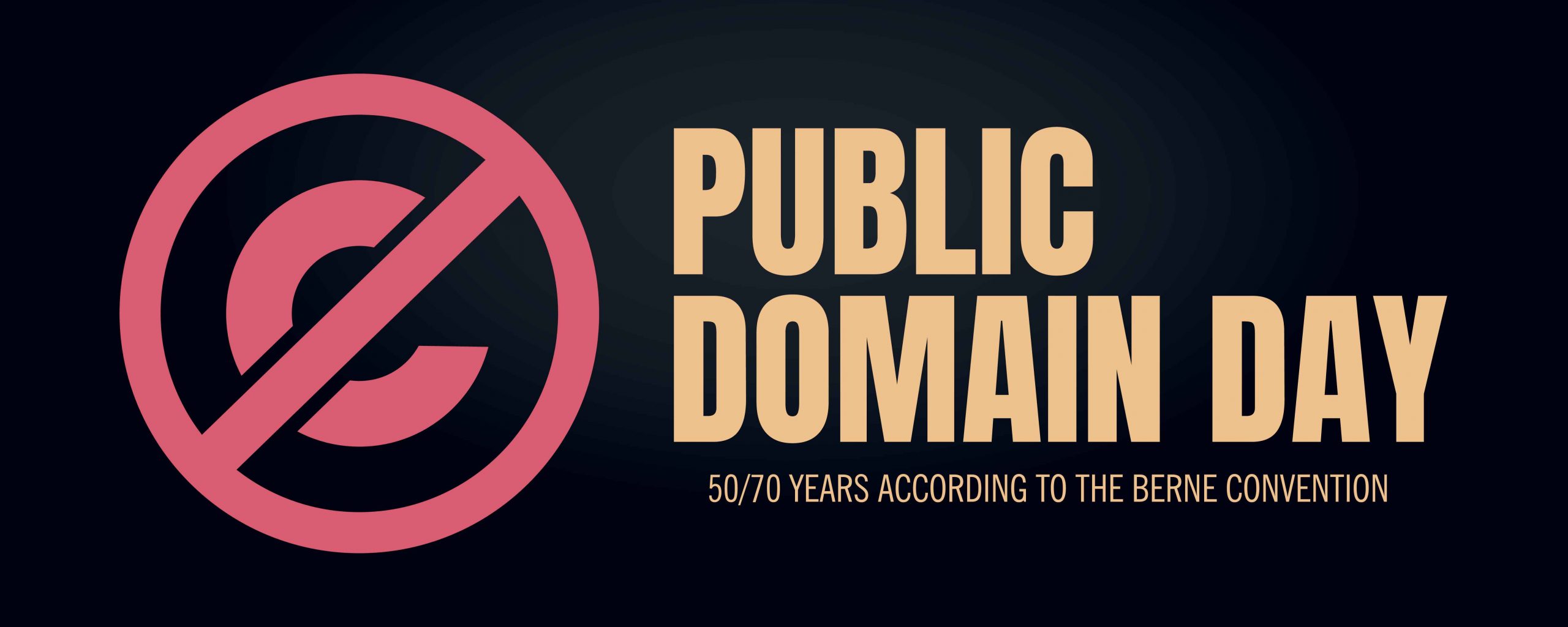
Public Domain Day 2026: What’s Entering the Commons in the UK?
It is finally that time of year when we celebrate the new wave of creative works entering the public domain, becoming free for anyone to use, adapt, and share.
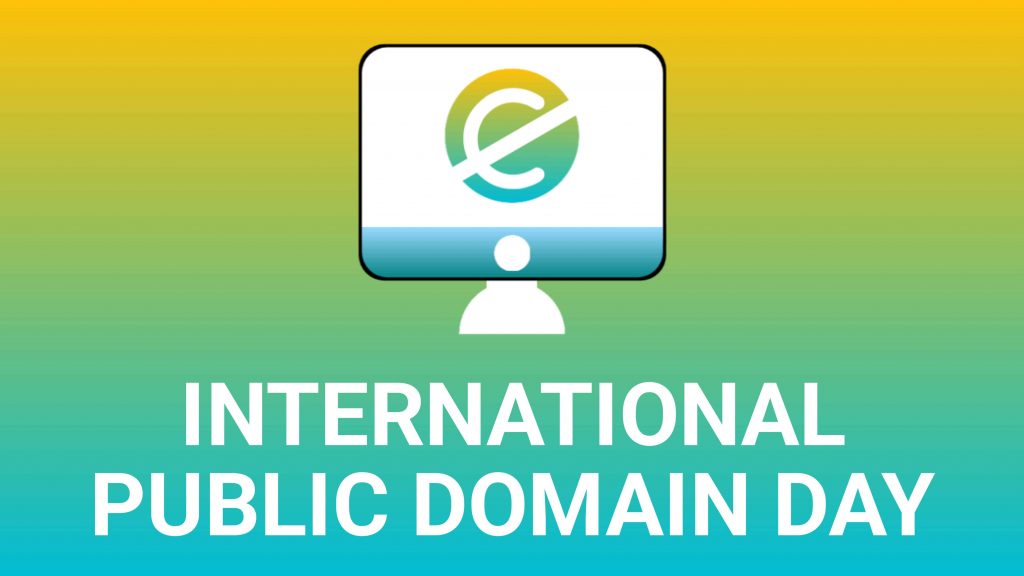
In the UK, copyright generally lasts for 70 years after the creator’s death, so works by those who died in 1955 are now open for all. We also tend to get a number of slasher movies coming our way with characters which are no longer protected, or I should clarify, early versions of characters.
It is important to note that due to the territoriality of copyright, material can enter the public domain in one country however still be protected in another country.
- Works by creators who died in 1955 in countries with a copyright term of life plus 70 years (such as the UK, Russia, and most of Europe and South America).
- Works by creators who died in 1975 in countries applying a life plus 50 years term (including New Zealand and much of Africa and Asia).
- Films and books published in 1930 (including any featured artworks) for the United States.
Why Does This Matter?
Public domain status means these works can be digitized, remixed, and incorporated into new projects without seeking permission or paying fees. It’s a celebration of cultural heritage and creative freedom. Please be aware that public domain does not refer to the world wide web, although that is used often, public domain are works to which copyright has either expired or relinquished.
Literary Giants
One of the most significant authors joining the public domain is Thomas Mann, the German novelist behind Buddenbrooks and Doctor Faustus. His writing is celebrated for its rich symbolism and deep psychological insight into artists and intellectuals.

Other notable names include:
- Léon Werth (France)
- Guido Battelli (Italy)
- Clemence Housman (UK)
- James Agee (A Death in the Family, USA)
- Dale Carnegie (How to Win Friends and Influence People, USA)
- Nat Schachner, author of Space Lawyer (USA)
Poetry lovers can rediscover works by Wallace Stevens and Paul Claudel, now free for adaptation.
Music and Performing Arts
Compositions entering the public domain include:
- Arthur Honegger (Switzerland)
- Francesco Balilla Pratella (Italy)
- James P. Johnson, the jazz pioneer behind the “Charleston” (USA)
Film history also benefits, with works by director Lloyd Bacon and screenwriters William C. deMille and Robert Riskin now open for reuse.
Visual Arts
Art enthusiasts can explore creations by French artists Yves Tanguy and Fernand Léger, whose works shaped modern art movements.
Philosophy and Science
Philosophical writings by José Ortega y Gasset enter the public domain in most European countries (except Spain). Additionally, publications by influential thinkers such as:
- Albert Einstein (physics)
- Dr. Alexander Fleming (medicine)
- Hermann Weyl (mathematics)
- Herbert Stanley Jevons (economics)
These works are now free to be modified, adapted and used in a commercial way.
Across the Pond
In the US we have some more goodies entering the public domain. The debut of Nancy Drew the fictional teen detective, a response to the Hardy Boys, The Secret of the Old Clock which is the first volume in the Nancy Drew Mystery Stories entered the public domain on the 1st of Jan 2026. I guess these types of stories can be compared to The Famous Five in the UK or Cireșarii(The Cherrys I guess) cires in Romanian is cherry tree. Anyway, the book tells the story of 7 teenage friends who have many adventures together.
When it comes to characters, we welcome Betty Boop (the first iteration, the newer ones are still protected under copyright and most likely trademarks) as well as the first appearance of Pluto when he was still an unnamed bloodhound in the 1930s The Chain Gang. There are many more creative works entering the US public domain, Agatha Christie’s Murder at the Vicarage, which features the first appearance of Jane Marple. Please be aware that these only apply to the US, and not the UK.
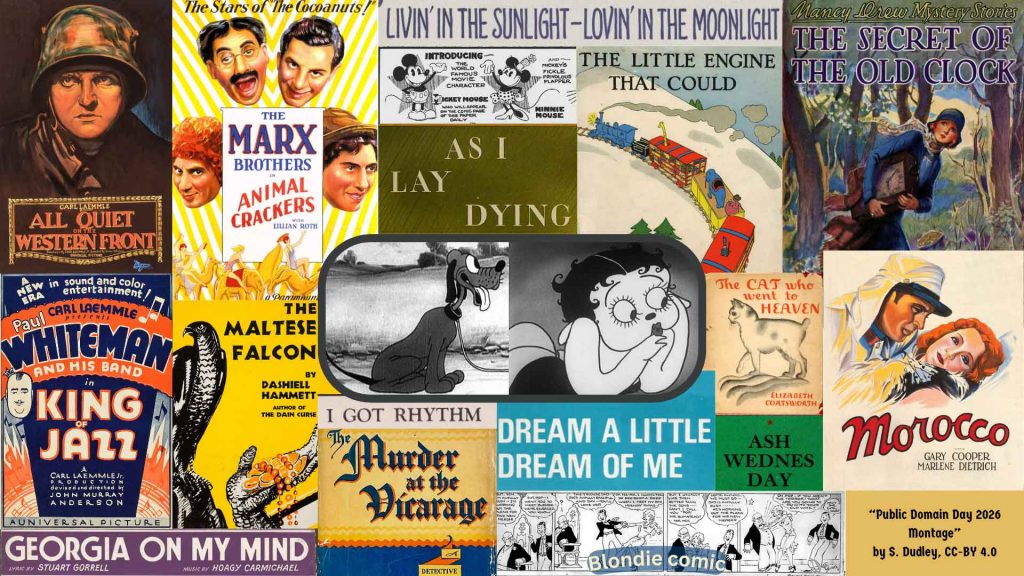
Public Domain Day 2026 Montage by S Dudley, shared under a CC BY 4.0
What Can You Do With Public Domain Works?
- Create new adaptations – films, plays, or modern retellings
- Digitize and share – make classics accessible online
- Incorporate into teaching – free resources for education
- Design merchandise – art prints, themed products
Celebrate the Commons
Public Domain Day reminds us that creativity builds on the past. By respecting copyright during its term and embracing the public domain when it expires, we keep culture alive and evolving.
Happy Public Domain Day!

The information contained in this blog post should be taken as recommended advice or guidance but should not be taken as legal advice. If in any doubt, please seek proper legal advice.

Webinars and whatnots – December 2025
Upcoming:
- Open Access and the Commons: The many faces of scholar-led publishing: 27 January (LSE)
- Open Research Week Ireland 2026: 2-11 February
- The Benefits and Challenges of Open Source Software in Research: 11 February (LSE)
- Open Research Week 2026: 2-6 March (Edge Hill University, the University of Liverpool, Liverpool John Moores University, and the University of Essex
- Edinburgh Open Research Conference 2026: 18 June (submission deadline 13 February)
Catch up:
Of interest:
Previous months’ Webinars and whatnots:
- November 2025
- October 2025
- September 2025- none
- August 2025
- July 2025
- June 2025
- May 2025 – Midlands Innovation Open Research Week 2025
- April 2025
- March 2025
- February 2025
- January 2025
- December 2024
- November 2024

From the Vice-Chancellor – December 2025

In my last newsletter of 2025: major investment in our sports ecosystem, our first-ever Giving Day, how we’re supporting staff and students to use AI responsibly, and our winter Graduation ceremonies.
Investment to reinforce our world-leading position in sport
Our University is renowned for its sporting ecosystem – the global success of our athletes and teams, our world-leading research and innovation that underpins those headline-hitting performances, the opportunities we provide to participate at every level, and the first-class facilities based on our campus.
If we are to retain our position in world sport, we must continue to push the boundaries of innovation and provide facilities that support athletes’ ongoing needs. So I was delighted last week to welcome athletes, influential sport leaders and iconic figures from across the world of sport, including Dame Denise Lewis DBE, former Olympic gold medal athlete and President of UK Athletics, to celebrate a major £5.5 million investment in our sporting ecosystem.
The funding – from the Government, UK Sport, multiple national governing bodies and the University – has enabled enhancements in several facilities.
We have created a high-performance training environment in the Netball Centre, to provide a base for England Netball, the Vitality Roses and our own athletes. Enhancements in the High-Performance Athletics Centre (HiPAC) – made in partnership with UK Athletics, UK Sport and the UK Sports Institute – include a running analysis system and transformed medical and treatment areas. A £2 million Government grant has allowed the swimming pool to be fully decarbonised and funding from UK Sport has enabled further enhancements to support elite performance training at the facility.
We have also transformed the entrance to the Sir David Wallace Sports Hall to showcase the University’s rich sporting history. All our graduands, their families and friends passed through the area on their way to the graduation ceremonies this month, and we received lots of positive feedback from them about the new-look space. If we are to continue being the partner of choice for a broad range of sports, it is essential that we stay ahead and continue to innovate to meet world class standards and the requirements of all those who use our facilities.
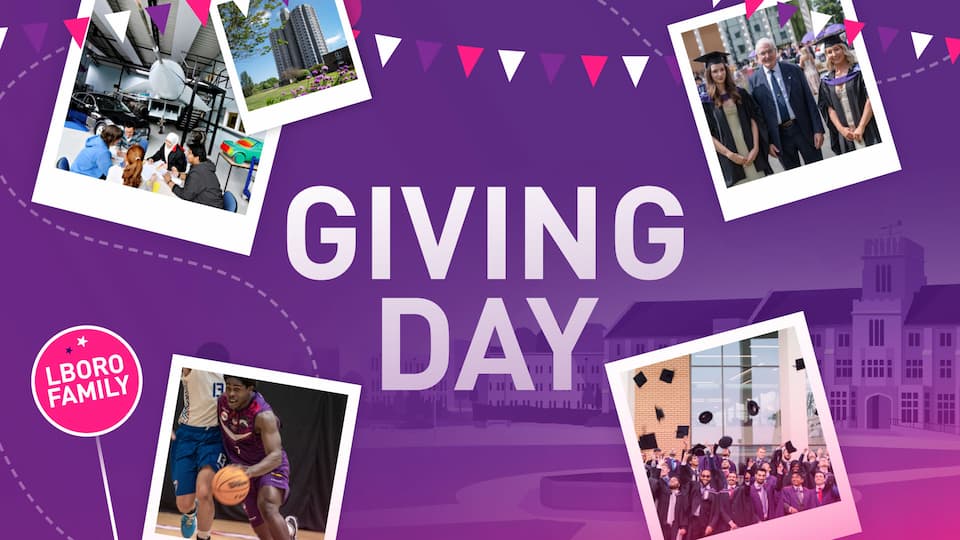
University hosts first ever Giving Day
At the start of the month we hosted our first ever Giving Day, which was an opportunity for alumni, staff and friends of the University to help us change lives by donating to four Loughborough causes.
Thanks to them, we raised more than £90,000 – an incredible achievement. This will help to support projects across all our priority areas of education, research and sport. Funding will go towards our Opportunity Scholarships for students from areas of low participation in higher education, our Digital Decarbonisation research, our Sports Scholarships, which support our student athletes as they embark on their path towards the global stage, or the Loughborough Fund to support those most in need.
Giving Day was managed by the Philanthropy, Alumni and Supporter Engagement (PASE) team in Marketing and Advancement, with the support of others from across the University. Thank you to all those who lent their support to deliver this fundraising event. I would also like to say thank you to the staff who generously donated money; your support will help us to make a real difference. And if you missed this year’s Giving Day and would like to make a donation, you can still do so via the Giving Day site.
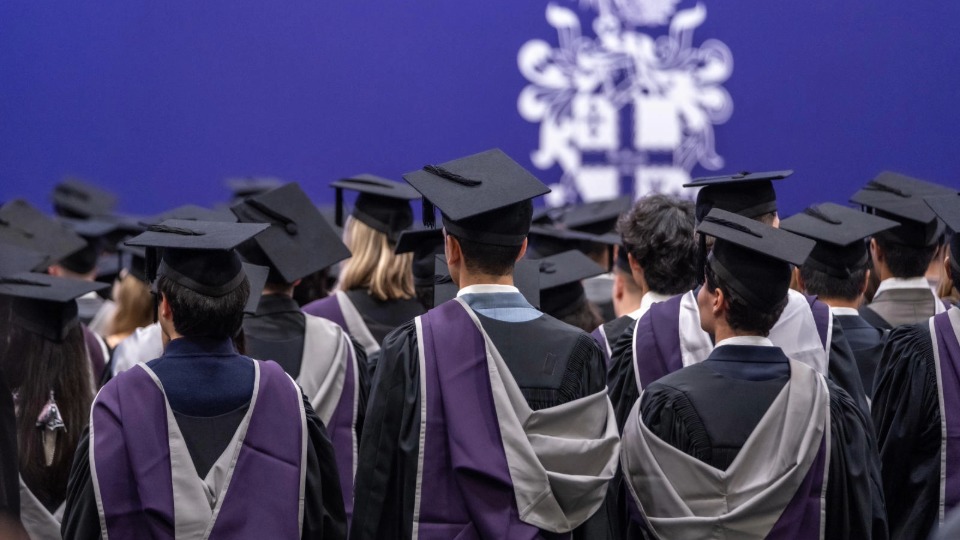
Celebrating achievements at our winter graduation ceremonies
Our winter graduation ceremonies are a key event as we approach the end of each calendar year and, as always, it was wonderful to welcome hundreds of our students, their friends, families and supporters to campus to celebrate their academic achievements.
At the congregations we awarded honorary degrees and University medals to recognise the work of individuals who have contributed so much to our University and society more broadly.
An Honorary Doctorate of the University was awarded to James Chiutsi, President of the Malawi Paralympic Committee, who was recognised for his contribution to sport and his efforts in promoting equity, diversity and inclusivity in Para sport. We have worked closely with James through the AT2030 Para Sport Against Stigma project, delivered in partnership between Loughborough University London, the International Paralympic Committee, the University of Malawi and the Global Disability Innovation Hub.
We also awarded an Honorary Doctorate of the University to Paul Sinton-Hewitt CBE, the founder of Parkrun, in acknowledgement of the impact he’s had on sport, health and wellbeing, aligned closely with our strategic theme.
University medals were presented to three individuals: Professor Scott Lockyer, a Royal Academy of Engineering Visiting Professor in Advanced Materials; Eric MacIntyre, the former Head of Higher Education at Loughborough College and author of our book on the history of Loughborough sport; and Pauline King, a Senior Technician and Technical Tutor in the Department of Chemistry.
Our degree ceremonies mean so much to those who attend, and I know that teams across the University work very hard to ensure that everyone has an enjoyable day. Thank you as always for everything you do to make these events so memorable.
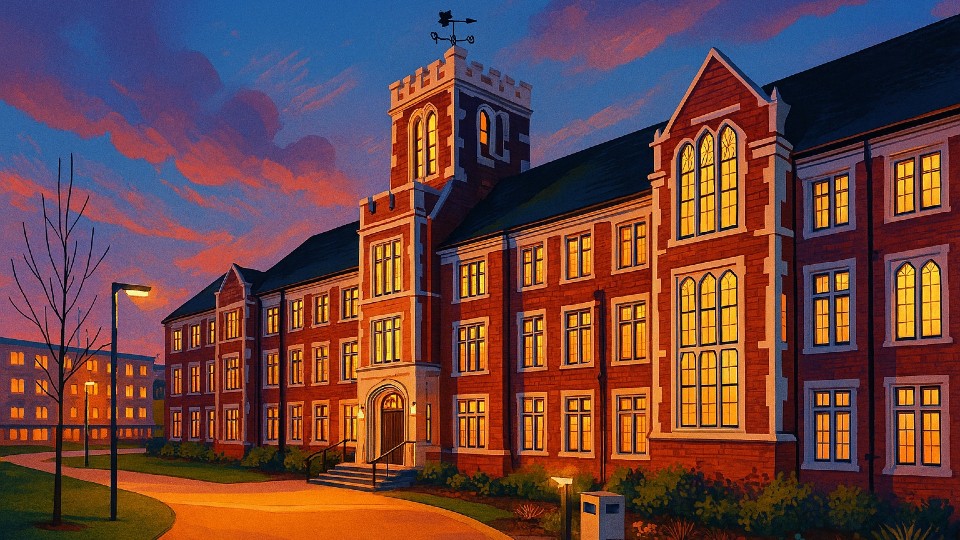
Using AI responsibly
Artificial Intelligence, or AI, is now firmly embedded in society, with people everywhere debating both the benefits and risks. But AI isn’t a new concept. I’ve spent the last 35 years researching AI and we can trace its foundations back at least 70 years, when the British mathematician Alan Turing wrote a research paper asking whether machines can think.
These days AI is genuinely starting to transform society in all kinds of ways – how we live, learn and work. Vipin Ahlawat, our Director of IT Services, and I recently joined forces to write a blog on how we can make best use of AI in a responsible way.
Over the past year, we’ve been putting in place a strong framework to guide how we design, deploy and use AI tools. We have made Microsoft 365 Copilot Chat available to all staff and students, and established ethical guidance for learning and assessment to ensure transparency and fairness in how AI is used in coursework and exams.
Understanding how to use AI responsibly is as important as the tools themselves and over the coming months, we’ll be helping staff and students to develop their AI literacy. Through practical sessions and guidance, we’ll explain, for example, when – and importantly when not – to use AI tools in learning and research, and how AI can help to save time, improve efficiency and spark your creativity.
I know some of you will already be comfortable in using AI, while others may be more tentative. AI is changing how we work right now and I’d recommend you begin building it into your daily or weekly routine. Perhaps start small; use Copilot Chat to summarise a document or report or Firefly to generate a visual – I generated the image in this section of the newsletter using AI!
I’d also recommend you look at the Responsible AI Guidance site we’ve put together, which offers advice, dos and don’ts, and links to useful training resources. Over the coming years AI technology will continue to improve and we’ll find ever more creative ways to harness it to enhance the way we live, work and play. Let’s make sure we do so responsibly.
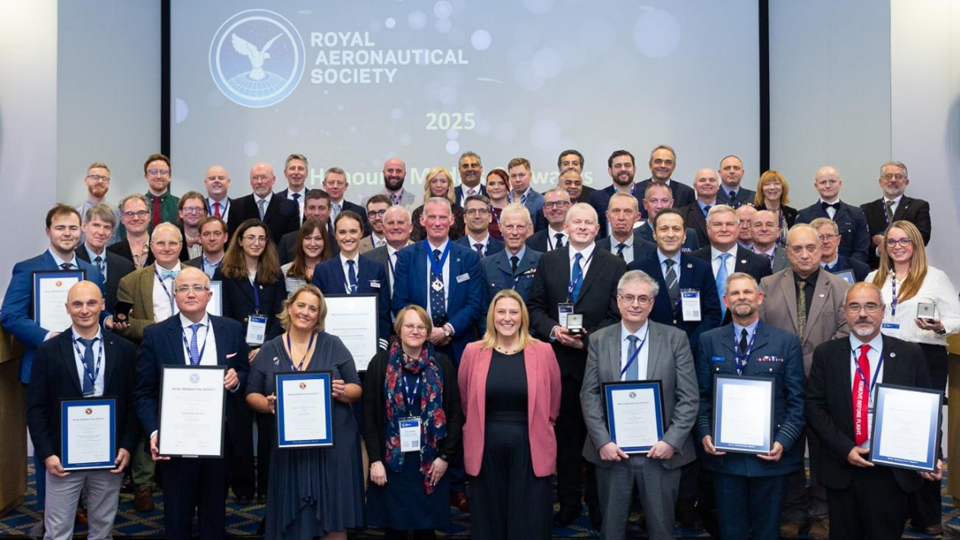
Royal Aeronautical Society award
The National Centre for Combustion and Aerothermal Technology has received a team medal from the Royal Aeronautical Society in recognition of its long-term partnership with Rolls-Royce.

Clean power hydrogen partnership
Our partnership with Clean Power Hydrogen plc will help to make hydrogen generation more efficient and cost-effective, using renewable energy to reduce reliance on fossil fuels.
Season’s Greetings – and thank you
Thank you for everything that you have contributed to the University’s success over the last 12 months. Whatever you are doing while the University is closed, please enjoy the holiday, relax and take a break from work. I wish you a very Happy Christmas and look forward to seeing you in the new year
Day in the Life With: Emily Binns
Join Security Patrol Officer, Emily Binns, for a day in the life as she shares her journey into campus security, what inspired her to join the team, and how they work every day to keep students and staff safe. Discover the vital role security plays in creating a welcoming and secure environment for everyone on campus.
Following on from our Five Minutes With series, this new video series celebrate staff who work behind the scenes and not behind screens. This series will showcase our operational staff member’s roles and offer a glimpse into their working days.
If you would like to feature in a ‘Day in the life with’, or you work with someone who you think would be great to include, please email Lilia Boukikova at L.Boukikova@lboro.ac.uk
Have a green Christmas
Whilst we are winding down for a well-deserved Christmas, it is a good time to consider the impact of the festivities on the environment. The 3 days of Christmas (Christmas Eve, Christmas Day and Boxing Day) account for 5.5% of the UK’s total annual carbon footprint (1). In this blog we will be looking at how we can enjoy Christmas but not at consequent to the environment.

This blog has been adapted from a post shared by Barbour EHS.
Waste:
The waste generated through the festive period is 30% more than the waste created during the rest of the year (1). Packaging alone has a monumental impact on the environment. Around 114,000 tonnes of plastic packaging is being thrown away in the UK each year, that is the equivalent of the weight of 650,000 reindeer (2) Look out for options of reduced packaging on your purchases.
When it comes to wrapping gifts, it is predicted that about 227,000 miles of wrapping paper is used and thrown away each year (2) with a lot of wrapping paper not being recyclable. Try and look out for the recyclable logo when shopping for wrapping paper, avoiding shiny, glittery papers which cannot be recycled.
Giftbags, bows and ribbons can be reused, year after year, saving the environment and money. Over 150 million Christmas cards are sent each year (3), try turning these into next year’s gift tags!
Each year, around 250,000 tonnes of Christmas trees are disposed of (4). Try replanting your Christmas tree or using it for mulch or compost in your garden. If this is not possible, take your tree to a recycling point. You can find your local point here.
Food:
For many, food is an important part of Christmas however is often overbought.
In the UK, approximately 40% of groceries are sold on sale during the Christmas season, which encourages people to overconsume what they don’t need. For many, Christmas is about food, but unfortunately it is estimated that around 42 million meals get wasted over the Christmas period (5). Around 175 million mince pies are purchased each year (using 175 tonnes of aluminium packaging) and approximately 74 million are discarded (6).
Whilst it can be hard to predict your food shops over the Christmas period, try and stick to your plan and ensure you use any food leftovers to avoid them going to waste. Whether that’s freezing for a later date, dropping off at a food bank or turning leftovers into new meals – you can find some inspiration here.
Energy:
In order to cook all of the nation’s 8.5 million turkeys, over 63GWh of energy has to be used. This could power 23,500 homes for a whole year (7). Households are expected to use 7 times more electricity than the daily average (8). A few tips to keep your energy usage down over Christmas:
- Keep the lids on your pans when cooking on the hob
- Let leftovers cool down before freezing
- Turn devices off at the plug
- Turn your heating down when guests are over – the body heat will warm the room!
Sources:
- Christmas Waste Facts – It’s Not Very Jolly
- Christmas packaging facts and waste statistics (2025 update)
- Have a Very Green Christmas – Circular Ecology
- From puddings to packaging: Inside the UK’s Christmas waste problem – edie
- Christmas Waste Facts – Tis The Season To Recycle
- Sustainable festivities: how you can reduce your waste this Christmas – Environment
- Powering up Christmas: 12 Festive Facts from National Grid | National Grid
- No Lighty, No Likey: With Brits Set to Use 7× More Electricity on Christmas Day EDF is gifting customers eight hours of free electricity to help households enjoy the festivities | EDF
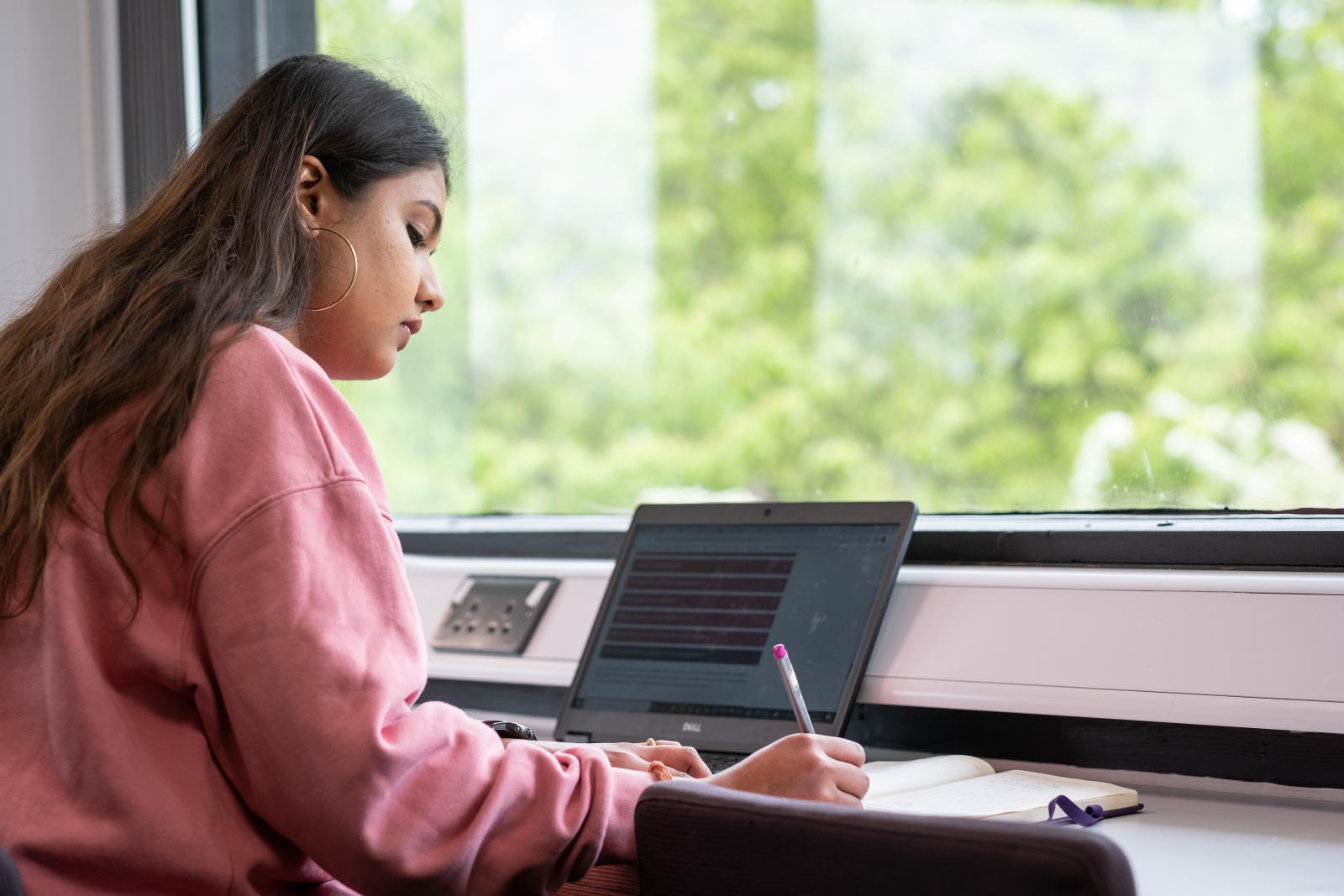
Strategies to Present Coherent Text
Written by Bess Chan
A common challenge in academic writing is presenting ideas clearly and logically. Organisation has two layers: micro (cohesion) and macro (coherence). Cohesion involves grammatical and lexical links, such as conjunctions (and, but), linking phrases (however, consequently), and reference pronouns (it, they, this). Coherence, on the other hand, ensures the overall flow and logical structure of a text. Below are some strategies to improve cohesion in academic writing.
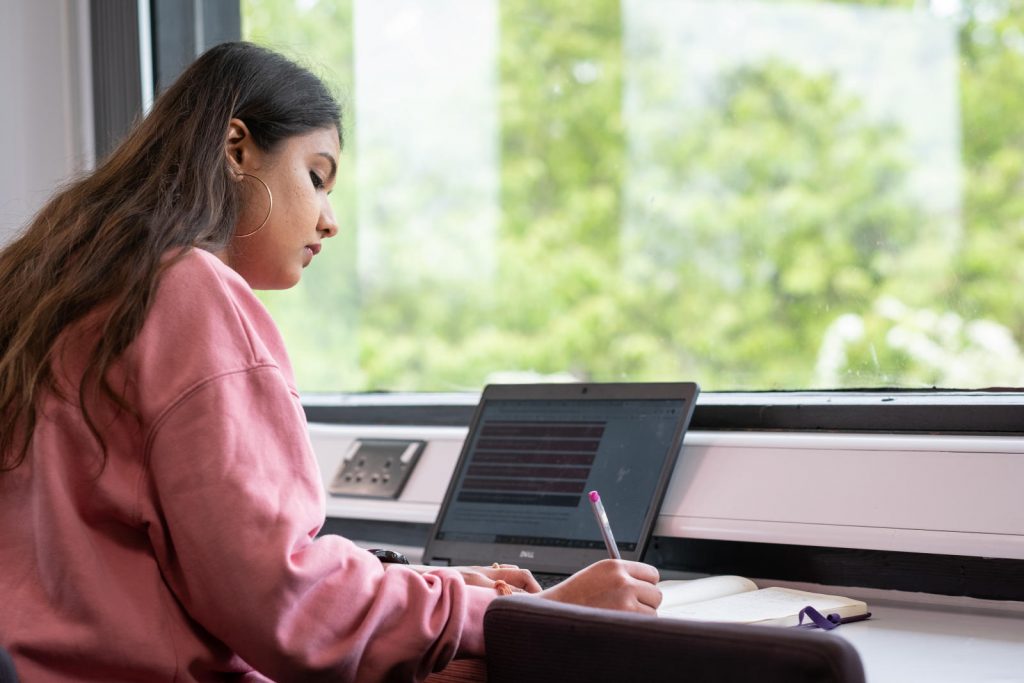
Using linking words and phrases
The easiest way to join ideas together is to use a variety of linking words and phrases appropriately. Proper use of such words and phrases can help you show clearly how sentences are related to each other.
However, research has found that some students who speak English as their first language, or who are advanced English speakers, may underuse linking words (Granger and Tyson, 1996; Appel, 2020). On the other hand, some others who speak English as an additional language tend to use them too frequently (Lei, 2012; Patriana, Rachmajanti and Mukminatien, 2016; Appel and Szeib, 2018; Torn-Leesik, 2025).
To solve these issues, review your work and check how frequently you use linking words and phrases. If there are only a few instances throughout your text, check carefully whether the relationship between the sentences is always clear. If it isn’t, consider adding a linking word and phrase. However, if you rely on these words and phrases too much, such as using one at the beginning of each sentence, think about using other strategies instead, such as establishing a good information flow within a paragraph or using synonyms of key words.
Find out more about using linking words and phrases here.
Establishing strong word connections
As mentioned above, you don’t necessarily have to use a lot of linking links and phrases to show the relationships between ideas. You can still make your work cohesive by creating a good information flow between sentences in a paragraph. Essentially, you use one of the key words in the previous sentence and make it the focus of the following sentence.
Example:
One of the ways to show critical writing is synthesising information from academic sources. Such synthesis can show one’s understanding of the original texts.
In the first sentence, one of the key phrases is “synthesising information from academic sources”, which is reduced to “such synthesis” and used as the subject of the second sentence. You can establish connections like this by using a synonym of the key word or a referencing word like “it” or “this”. Alternatively, you may choose to repeat the same word.
Find out more about establishing strong word connections here.
Making reference words clear
It’s quite common to see unclear references in sentences, and this occurs when a pronoun, such as “it” or “they”, or a demonstrative, such as “this” or “that”, does not clearly point to a single, identifiable word mentioned in the previous sentence.
Example:
The study examined teacher feedback and student motivation. This was found to be significant.
In the example, “this” is unclear because we aren’t sure whether it refers to teacher feedback, student motivation, or the relationship between the two. Therefore, when you use any pronouns or demonstratives, make sure that there is clear reference for each of them.
Find out more about making reference words clear here.
In addition to creating a cohesive text, we should also aim to achieve coherence in writing. Here are a few strategies to do so.
Writing clear topic sentences
Topic sentences are key to understanding the focus of different paragraphs. They usually come first in body paragraphs and clearly state the main point of the paragraph. For example, if you’re writing a paragraph on why students ignore the feedback on their assessments, you should state the reason explicitly at the beginning by saying something like:
Students tend to ignore the feedback on their assessments because they lack the skill of decoding the comments.
In this way, readers can expect the focus will be on the lack of skill to truly understand the feedback.
Find out more about writing clear topic sentences here.
Expanding short paragraphs
You may wonder why writing short paragraphs can lead to coherence problems. Remember that coherence is to do with the overall flow of ideas and logical structure, meaning that readers need to see how ideas develop. Since short paragraphs often fail to show how a claim is supported or explained, all the ideas in a paragraph may appear equal in weight, and readers may not be able to see which ideas are central and which are supporting. Therefore, short paragraphs should be expanded through synthesis of more evidence and your critical voice, offering example and explanation.
Find out more about expanding short paragraphs here.
Showing explicit links between paragraphs
It’s not uncommon to see students fail to show links between paragraphs. This causes issues with coherence because there may not be logical sequencing of paragraphs, possibly making readers fail to understand why one paragraph follows another.
Example topic sentences supporting the following claim: “Reading teacher feedback is essential for students’ academic development”:
- Paragraph 1: Reading teacher feedback helps students identify gaps in their understanding.
- Paragraph 2: Reading teacher feedback strengthens students’ capacity for self-regulated learning.
If we just simply show the topic sentences like this, we don’t know how the two reasons are related. Therefore, one way to demonstrate the logical connection between the paragraphs is to add a link to the topic sentence of paragraph 2, such as:
Engaging with teacher feedback actively not only helps students understand what to improve, but also strengthens their capacity for self-regulated learning, allowing them to apply insights to future assignments.
In short, showing a link between the two paragraphs helps readers better understand the flow of ideas and prevents confusion caused by possible gaps.
Find out more about showing explicit links between paragraphs here.
If you’re unsure whether your writing flows well, I encourage you to book 1-2-1 meetings with me, Bess Chan, your London-based EAP Tutor, via email or the booking form

Finding Home Away from Home: The Holiday Season in London
Rohan, a recent MSc Sport Business and Leadership graduate and Student Ambassador at Loughborough University London, shares a personal reflection on spending the holiday season in London as an international student from India.

What is the holiday period like for you in London compared to how this time of year is usually spent back home?
Back home in Delhi, the holiday period feels very family-centred and familiar. Even if there is no single specific festival happening right then, there is always a sense of warmth and activity in the house. People drop by, family friends visit, there are long conversations over chai, and there is a general feeling that you are surrounded by people who have known you your whole life. The sounds, smells, and rhythm of the city are familiar, and you almost take for granted that you will be spending this time with family, sharing meals and small everyday moments.
In London, the feeling is quite different. The city slows down a lot as you approach Christmas and the New Year. University campuses become quieter, many students travel home, and some shops and restaurants have shorter opening hours. You notice the silence more, especially as an international student. At the same time, London has its own special kind of festive atmosphere that I do not experience in the same way in Delhi. The streets are beautifully decorated, there are lights everywhere, and whole areas of the city are transformed for the season. It feels less like a big family gathering and more like me consciously creating my own version of the holidays with friends, with the city itself, and with small traditions that I have started to build here. So while Delhi is about comfort and familiarity, London is about discovery and making the holiday period meaningful in a new setting.
How do you like to spend the holiday period in London as an international student?
As an international student in London, I have realised that the holiday period is much better when I treat it as a mix of rest and exploration. On one hand, it is a valuable break from deadlines, classes, and constant movement. I allow myself to slow down, sleep properly, cook, catch up on things I have been putting off, and just breathe a bit. That quiet time is important, especially after a busy term.
At the same time, I try not to let the days blur together, because that is when homesickness can creep in. I like to make simple but intentional plans. Last year, for example, I went to Winter Wonderland at Hyde Park, which felt like a very “London in December” experience. I spent time walking around different Christmas markets, which are perfect for wandering, eating warm food, and soaking up the atmosphere. I also went out in the evenings specifically to see the Christmas lights across central London, which turned into some of my favourite memories from that period. In between these outings, I enjoy quieter days where I stay indoors, watch films, cook something comforting, or meet a friend for coffee. None of it is particularly extravagant, but together it creates a holiday period that feels full, gentle, and genuinely enjoyable.
Are there any seasonal events, traditions, or places in London that you enjoy during the holiday period?
There are a few things in London that really define the holiday season for me now. Winter Wonderland at Hyde Park is one of them. It is busy and very obviously festive, but walking through it with friends, seeing the lights, hearing the music, and trying some of the food gives you a strong sense that you are part of the holiday spirit in the city. It almost feels like stepping into a temporary winter festival within London.
Another thing I really enjoy is simply walking through central London in the evenings to see the Christmas lights. Areas like Oxford Street, Regent Street, Carnaby Street, Covent Garden, and the surrounding streets look completely different at this time of year. Last year, I spent time just wandering around these places and taking it all in, and it genuinely felt magical. It is also one of the best free experiences you can have as a student, which is always a bonus. I also love going to the Christmas markets. There is something very relaxing about strolling through stalls, holding something warm to drink, chatting with friends, and not being in a rush.
New Year’s in London has its own charm as well. Going to see the New Year’s fireworks was a highlight for me. Being in a crowd of people, with the skyline lit up and everyone counting down together, felt like a very powerful moment of being part of a shared experience in a new city. All of these things together have become my little set of “London holiday traditions.”

Do you ever feel homesick during the holiday period, and what helps you cope with being away from family and friends?
I do feel homesick during the holiday period, and I think that is very natural as an international student. It often hits hardest on days when I know my family in Delhi is together, or when I see photos and videos of gatherings back home. Sometimes even small things trigger it, like seeing families shopping together or hearing a familiar song. It is in those moments that the distance feels most real.
What helps me cope is treating homesickness as something normal rather than something to be ashamed of. I try to stay connected to my family in a structured way instead of just missing them in my head. Planning video calls, even short ones, makes a big difference because it gives me a direct sense of their presence rather than just imagining what they are doing. I also try to bring a bit of ‘home’ into London, whether that is through food, music, or small routines that remind me of Delhi. Something as simple as eating a familiar dish or having a quiet evening with a comforting film can ground me.
Being around people here also helps a lot. I have learnt that spending too many days completely alone during the holidays can make everything feel heavier. Meeting a friend for a walk, going to see the lights together, or just having someone to talk to changes the tone of the day. It reminds me that even though I am far from home, I am not actually alone. I also remind myself that missing home does not mean I am not happy in London; it just means that both places matter to me, and that is actually something quite special.
What advice would you give to new international students who might be spending their first holiday period away from home in London?
For new international students spending their first holiday period away from home in London, my main advice would be to approach this time with a mix of gentleness and intention. It is completely normal to feel emotional or unsettled at first. You are not only adjusting to a new country, but also experiencing a time of year that is usually very family-based in a completely different context. Acknowledging that this might feel strange or even difficult is a good starting point. At the same time, it helps a lot to make some kind of plan for the holidays rather than drifting through them. The plan does not need to be complicated. It could simply mean deciding that you will explore Winter Wonderland, visit at least one Christmas market, or spend an evening walking through central London to see the lights. These small experiences give you things to look forward to and create memories that are uniquely tied to your time in London. They turn the holiday period into something you actively experience rather than something you just “get through.”
Staying connected with home is also important, but it is helpful not to spend all your time comparing London to your usual celebrations. Regular calls with family and friends can be comforting, but try to also create small traditions of your own here, whether that is cooking a favourite meal, having a film night, or making a particular walk or café part of your holiday routine. And finally, do not be afraid to reach out to others. Many international students stay in London over the holidays, and a lot of them are feeling the same way. Sending a message to a classmate or a friend and suggesting something simple, like going out for coffee or visiting a market, can make a big difference for both of you. The holidays can be a time of loneliness if you let everything close in, but they can also become a time of quiet connection, reflection, and new experiences if you allow yourself to participate in what the city has to offer.

A big thank you to Rohan for writing this blog!
Journaling: What is it and how can it be useful?
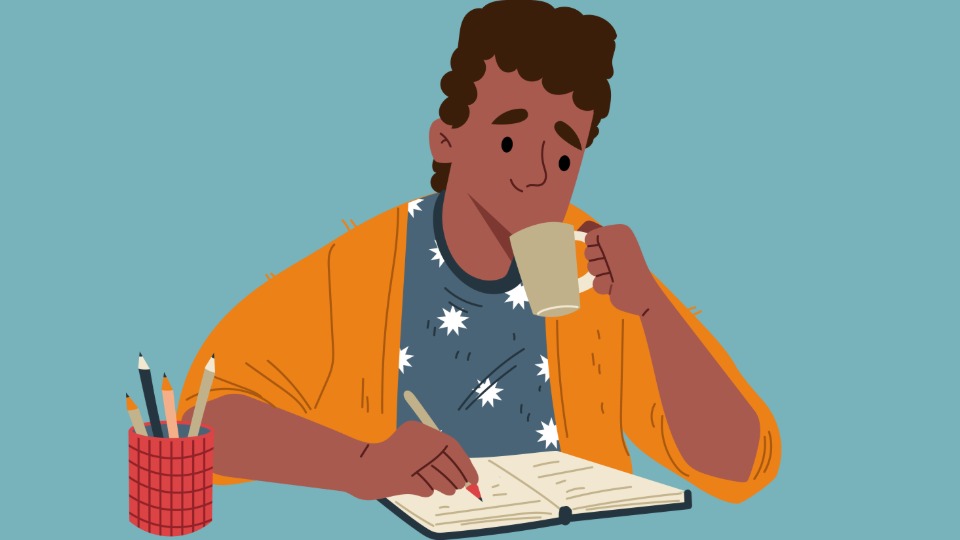
Image: courtesy of Adobe Stock
Sometimes, our minds can feel like a mess. Life is full of decisions to make, problems to solve and responsibilities to keep on top of. It’s not always easy to identify the full breadth of our feelings or find a simple route through the winding path of daily decisions and obstacles.
No wonder that, for many of us, life catches up and leads to frustration, stress and burnout. In those moments when everything feels too much, it can help to find a way to release those thoughts.
It can sometimes be difficult to confide in another person, either because you don’t know who to speak to or you aren’t ready to share what’s wrong. Journaling is a fantastic starting point that can help to place your worries and feelings out in the open. By externalising your thoughts this way, it can feel as if you can finally lift the emotional weight of the worries, fears, annoyances and excitement you carry.
More than just a diary
Journaling is simply the practice of making a record of your thoughts and emotions. It doesn’t have to be a secret diary that structures your daily life into a best-selling novel.
Journaling comes in many forms, including:
- Keeping a regular mood log – even if it’s just a single emoji to summarise your feelings about a given moment
- Recording each immediate thought on your mind
- Forming a list of as many of the responsibilities you have and prioritising them carefully
- Creating words or phrases in unconventional ways, like cutting letters out of paper or with letter-shaped fridge magnets
- Noting down your favourite and/or least favourite part of a day or week that’s created mixed emotions
- Turning thoughts and feelings into metaphors, poems, songs or through other creative outlets
- Drawing, doodling or scribbling to record thoughts and feelings in a more abstract manner
- Respond to daily or weekly questions such as ‘what made me smile today?’
Journaling doesn’t need to be ‘good’. You don’t need to be creative. It doesn’t need to make sense.
The reality is that life is not always pretty or important, and to expect something glamourous or poignant to come from it is unrealistic and harmful. No matter what, how or why you journal, whatever you put into it will be real, relevant and valuable to you.
Where should I journal?
Many people might think of a private notebook, but journaling doesn’t have to happen this way. You might find it useful to journal:
- on scrap paper, a whiteboard or with other sustainable materials
- using different colours to express different feelings
- in a private folder on your phone’s notes app
- onto a Word or Google Docs document, or a dedicated notetaking app like OneNote or Notion
- creating voice notes or recordings of yourself speaking out loud
- through a website such as Type Into the Void, though be careful not to share personal or sensitive information for data protection purposes
Don’t feel pressured to be open with others about your journaling experience, or that you need to memorialise or revisit previous journal entries. Sometimes having private thoughts recorded in a physical or digital space that are never returned to can be enough to lift their burden.
If you need some help getting started, LU Arts offer a number of resources through journal tips and support materials on their website.
LU Arts offer an example journal that you might find helpful to use as a reference. Request a copy by emailing LUArts@lboro.ac.uk.
You can also access this Daily Thoughts template document provided by LUArts if you’d like some structure to help you get started on your journaling journey.

December Copyright Reads
How did a year already go by? Last year around this time I started the monthly copyright reads and they changed throughout the months. I hope the past year has brought many interesting reads your way and you have enjoyed the small glimpses into Romania.
In the Romanian calendar December is known as neios meaning snowy, as in general it is the month in which it snows. Well, it used to be before climate change.
Christmas is a big thing in Romania, with many different traditions across the country. We would put up the tree on Christmas Eve, and get everything ready for the big meal in the evening. Unlike the UK, we would open the Christmas presents in the evening after the meal. Nowadays, being in a relationship with a British man, we tend to mix things up a bit. We combine both Romanian and British traditions to make a fusion Christmas, making it our own celebration.
For this last month of the year, we have some interesting reads for you. AI and copyright takes center stage again, as usual. However, we also have some interesting conclusions to court cases, some nature news and last but not least, the UK Government’s response to the AI consultation. Happy reading!

The real Slim Shady? Eminem sues Australian company Swim Shady for trademark infringement
Fashion and Intellectual Property [Book]
New Working Paper: Can Generative AI Reproduce Iconic Photographs?
Copyright, Competition, and AI Training
EU design reform: Growing divergence from the UK
Paul McCartney joins music industry protest against AI with silent track
All wrapped up: the 10 best British towns and cities for Christmas shopping with a local flavour
Solange Opens Free Digital Library Of Rare Black Books
Midlands Innovation Extracellular Vesicles Conference 2026
Second Circuit Dismisses Zuru’s Appeal in LEGO Copyright/Trademark Case for Lack of Jurisdiction
At the Crossroads of Copyright, Fundamental Rights and Innovation of Generative AI
Protect the Public Domain: Stop the 70-year term for non-creative photographs
Copyright in Europe – interactive map
Public Domain Day 2026 Is Coming: Here’s What to Know
Taylor Swift’s Disney Documentary Release Could Be Blocked by Aileen Cannon
Should be edited by a “native speaker”: Anglo-American hegemony and peer review processes
Condé Nast Sues Dog-Fashion Magazine Dogue Over ‘Vogue’ Marks
New Italian Law on AI: a general framework
Copyright Risk in Financial Services and the Rise of Responsible AI [Podcast]
L’Oréal v. nkd: What This Trademark Battle Means for SMEs and UK IP Law
ChatGPT violated copyright law by ‘learning’ from song lyrics, German court rules
Creative Grey Zones: Copyright in the Age of Hybridity [Report]
The smallest town in Romania cracks the secret to peaceful human–bear coexistence
UK importers can be liable for IP infringement by overseas suppliers
We hope you enjoyed our collection of reads for this month and throughout the year.
We look forward to bring you more news from the world of copyright and beyond in the New Year!
We wish you Happy Holidays and a Merry Christmas as well as a Happy New Year!


Why gender stereotypes in maths still matter and what they are doing to our students
In this blogpost, Serena Rossi, Iro Xenidou-Dervou and Krzysztof Cipora explore how belief in gender stereotypes around mathematics can influence male and female university students’ academic confidence, anxiety and performance differently. Using data from over 900 students, the research explains why some students may feel more anxious in maths than others, and how false beliefs about gender and ability can play an important role. Edited by Dr Joanne Eaves.
The full article describing this research can be found here https://nyaspubs.onlinelibrary.wiley.com/doi/full/10.1111/nyas.14779 .
“I am just not a maths person”
This is a sentence many educators have heard, especially from young women. And indeed, some people would also say “Mathematics is for men but not for women”.
Even though men and women perform equally well in mathematics, the belief that men are naturally better at maths remains surprisingly widespread. This stereotype is not only outdated, but it can also harm students’ confidence and learning.
In our study, we found that University students’ beliefs about stereotypes like this one can significantly influence their confidence, anxiety, and even their actual performance in maths.
So, why should teachers, researchers, and students care? Because these false beliefs have real and unequal effects. In this post, I will explain how gender-based stereotypes in mathematics affect male and female students differently, why we must be careful with how we measure these effects, and what all this means for education.
The background: What we already know
We have long known that Maths Anxiety (MA) is a real phenomenon, defined as: “A feeling of tension and anxiety that interferes with the manipulation of numbers and the solving of mathematical problems in ordinary life and academic situations” (1). We also know that, despite performing similarly to men (2), women report higher levels of maths anxiety and lower confidence in their maths abilities (3). However, we are still learning why this gap exists.
One potential reason is the belief that maths is a “male domain” (men are better than women at maths) (4): a stereotype shaped by society, media, and culture. Our study examined how endorsing this stereotype affected students’ maths anxiety, their self-concept (how good they think they are at maths), and their arithmetic performance.
The study
We asked 923 university students to complete an online survey using a set of self-report questionnaires and a timed arithmetic task. We measured:
- Maths-gender stereotype endorsement, i.e. their level of endorsement of a series of stereotypes related to the idea that maths is for men but not for women.
- Maths anxiety, i.e. their level of anxiety related to both maths testing situations as well as everyday numerical tasks.
- Maths self-concept, i.e. how good students believe they are at maths.
- Arithmetic performance. their accuracy on a set of timed arithmetic tasks
We then used Structural Equation Modelling (SEM), a statistical method that helps us to test how all these factors interact and influence each other, and whether this differed between men and women.
The findings, and why they matter
1) Stereotype endorsement affected women more negatively than men.
Among female students, endorsing the mathematics-gender stereotype was linked to higher maths anxiety, lower confidence, and poorer arithmetic performance. This was not a simple one-step process; rather, believing such stereotypes related to increased levels of anxiety, which in turn related to lower self-confidence, and finally reduced performance. In short, for women, endorsing negative stereotypes about their group can trigger a detrimental chain reaction.
2) Men were not unaffected, but the pattern was different.
In male students, the endorsement of these false stereotypes about women was associated with higher confidence in their maths ability. However, this boost came with a twist: endorsement of such stereotypes was also associated with higher numerical anxiety. This suggests that while gender stereotypes may increase men’s confidence, they may also place pressure on them to live up to those expectations.
3) The questions used in popular measurement tools may not mean the same thing for men and women.
Crucially, we found that men and women interpreted the survey questions differently (in technical terms: we did not obtain measurement invariance). That means that responses on self-report questionnaires about maths anxiety, confidence, and stereotypes cannot be directly compared across genders.
Figure 1 illustrates the results between women and men.
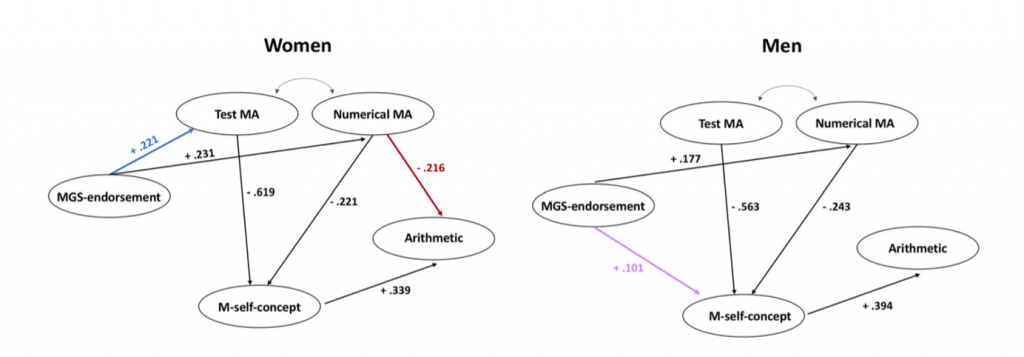
Discussion: What do we take away?
Our study shows that gender stereotypes in maths continue to shape how students feel and perform, even when men and women are equally capable. For women, believing the stereotype that “maths is for men” relates to them feeling increased maths anxiety, less confidence, and gradually pushes them away from maths. These beliefs are often learned over many years and can be one of the reasons for women’s lower participation in STEM fields.
In men, gender stereotypes relates to increased feelings of confidence in maths, although that leads to feeling pressured to live up to the expectations generated by these false stereotypes.
From a methodological perspective, future researchers must take into account the fact that women and men understand and interpret questions about maths confidence, maths anxiety and gender stereotypes differently, meaning we need to be cautious when comparing their scores.
In short: Beliefs about gender stereotypes can shape students’ experiences of learning maths, and the gender differences we found may help explain why women remain underrepresented in STEM (Science, Technology, Engineering, and Mathematics) fields.
Educational Impact: What this means for practice
- Challenge stereotypes early and openly: Educators and schools should talk openly with students about common gender stereotypes in maths and challenge them. Young people need to know that these ideas are false and damaging. These conversations should happen early, before negative beliefs take root.
- Support girls’ confidence in maths: Because belief in stereotyping is linked to higher maths anxiety and lower confidence in women, educators can play a key role in building girls’ maths self-concept. Praise effort, encourage risk-taking in problem solving, and give examples of women succeeding in maths-related careers.
- Use caution when interpreting surveys across genders: Many commonly used tools to measure maths anxiety and confidence may not be interpreted in the same way in men and women. Educators and researchers should be cautious about comparing scores between genders without first checking how different groups of students interpret the questions.
Reference list
1. Richardson, F. C., & Suinn, R. M. (1972). The Mathematics Anxiety Rating Scale: psychometric data. Journal of Counseling Psychology, 19, 551–554. https://doi.org/10.1037/h0033456
2. Devine, A., Fawcett, K., Szucs, D., & Dowker, A. (2012). Gender differences in mathematics anxiety and the relation to mathematics performance while controlling for test anxiety. Behavioral and Brain Functions, 8, 1–9. https://doi.org/10.1186/1744-9081-8-33
3. Hill, F., Mammarella, I. C., Devine, A., Caviola, S., Passolunghi, M. C., & Szucs, D. (2016). Maths anxiety in primary and secondary school students: Gender differences, developmental changes and anxiety specificity. Learning and Individual Differences, 48, 45–53. https://doi.org/10.1016/j.lindif.2016.02.006
4. Fennema, E., & Sherman, J. A. (1977). Sex-related differences in mathematics achievement, spatial visualization, and sociocultural factors. American Educational Research Journal, 14, 51–71.
5. Rossi, S., Xenidou-Dervou, I., Simsek, E., Artemenko, C., Daroczy, G., Nuerk, H.-C., & Cipora, K. (2022). Mathematics–gender stereotype endorsement influences mathematics anxiety, self-concept, and performance differently in men and women. Annals of the New York Academy of Sciences, 1513(1), 121–139. https://doi.org/10.1111/nyas.14779
About the Authors
Serena Rossi is a Lecturer in Mathematical Cognition at Loughborough University and part of the Centre for Mathematical Cognition. Her research explores how beliefs, emotions, and individual differences influence students’ learning experiences in mathematics. Krzysztof Cipora is an Associate Professor at Jagiellonian University in Krakow (Poland). Iro Xenidou-Dervou is a Reader in Mathematical Cognition at Loughborough University.

Inside Our Toy Safety Treaty Negotiation Simulation

By: Nadeen Maher Mohamed Studying for MSc Security, Peace-building and Diplomacy
In the Institute for Diplomacy and International Affairs (IDIA), students are consistently offered practical and immersive experiences that bring diplomacy, negotiation, and international policy to life.
For those taking the module “Negotiation – Strategy, Skills and Leadership” taught by Dr. Nicola Chelotti, the Toy Safety Treaty Simulation provided a unique opportunity to apply classroom theory to realistic diplomatic scenarios and strategic decision-making.
Negotiating Competing Interests
Negotiation lies at the heart of international cooperation, and our simulation highlighted just how intricate these processes can be. We worked on a proposed ‘Treaty on the Approximation of Laws Concerning the Safety of Toys’, taking on the roles of intergovernmental delegates responsible for shaping a shared legal framework. What began as a technical policy exercise quickly revealed political, economic, and ethical dimensions, offering an authentic glimpse into the complexities of multilateral decision-making.
Each student represented a country navigating competing interests, advocating national priorities, and collaborating toward common goals. The simulation unfolded over several stages: individual preparation, bilateral discussions, and multilateral negotiations where all delegations debated the treaty text.
Guided by Dr. Adam Steinhouse, an independent international lecturer and former Head of the School of European Studies at the UK National School of Government, we gained valuable insights into strategic negotiation and international dialogue. Acting as delegates in the Intergovernmental Law Conference (ILC) Toys Treaty Working Group, we addressed concerns over unsafe products and the absence of unified standards. The Conference’s Secretariat, represented by one of the students, provided a draft treaty defining toys, outlining essential safety requirements, explaining the ILC conformity mark, and detailing procedures for withdrawing unsafe products.
Negotiation proved more challenging than anticipated. Each country brought different political, economic, and safety priorities. Some advocated stricter measures, while others aimed to protect national industries or preserve economic flexibility. Progress required compromise, careful dialogue, and balancing domestic interests with collective goals, highlighting the nuanced and delicate nature of international cooperation.
Skills Developed and Lessons Learned
The simulation offered hands-on experience of a realistic diplomatic scenario, helping students analyze competing priorities, identify key interests, and determine areas for compromise. It highlighted the importance of clear communication, as we practiced presenting arguments persuasively, responding to concerns, and engaging in constructive dialogue. Informal discussions and active listening helped uncover common ground even when positions initially conflicted. The exercise also fostered strategic flexibility, requiring students to adapt approaches as negotiations evolved while keeping shared objectives in focus.
Students’ Reflections
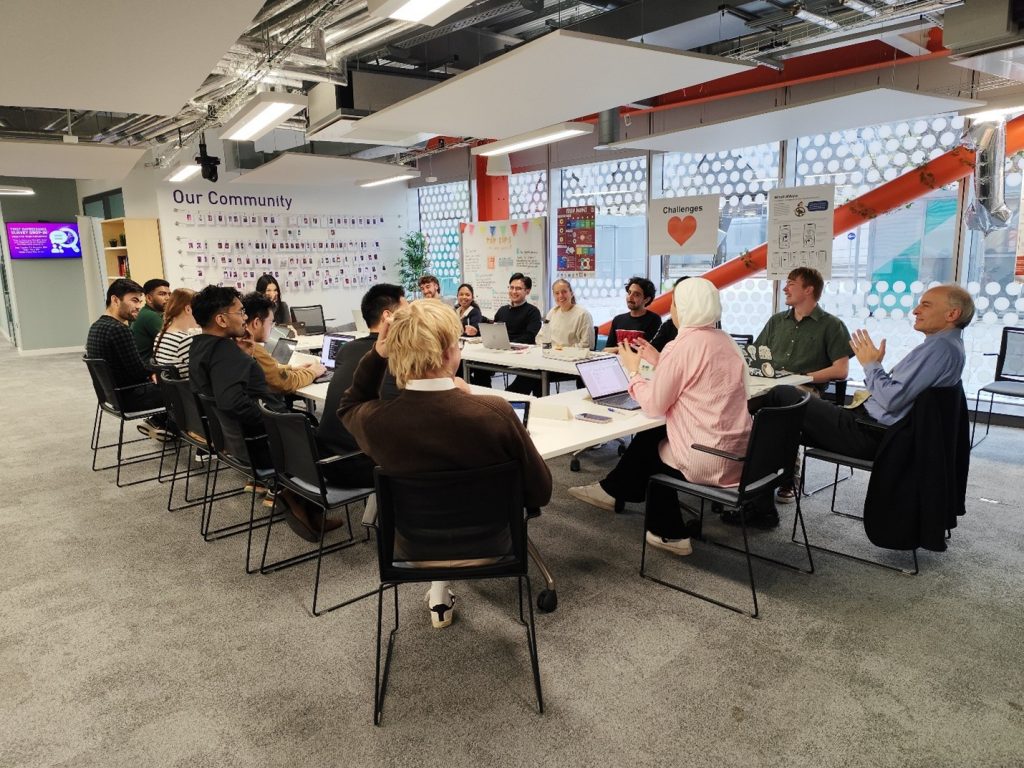
Students found the negotiation session both thought-provoking and highly engaging. One student, Céline Erciyas, shared:
“This simulation showed me the delicate balance between national interests and international cooperation. I learned that successful negotiation requires patience, collaboration, and flexibility to reach an agreement that satisfies all parties.”
Another student, Rashane Pintoe, noted:
“It was a really interesting simulation that had a lot of parallels to Model UN scenarios. All the students were very well engaged, and it was a great learning experience. I thank Dr. Steinhouse, Dr. Nicola and Loughborough University’s IDIA for the opportunity.”
The Toy Safety Treaty Simulation offered more than just a classroom exercise; it provided an immersive experience in the art and practice of diplomacy. By navigating complex negotiations, balancing national and collective interests, and engaging with real-world decision-making processes, students gained a deeper appreciation for the skills, patience, and strategic thinking required in international diplomacy. This experience reinforced that meaningful agreements are built through collaboration, adaptability, and a commitment to shared values, leaving students better prepared to contribute effectively to professional diplomatic and policy contexts.

The Santa Clause: Unwrapping the IP Behind Christmas
Disclaimer: This blog post is for information only. We do not endorse any of the merchandise and we are not affiliated or receive any commission from any companies presented in this blog post.
I am sure you knew, that after going after Easter and Halloween, I will be coming after Christmas next. It is now time to have a look at how many things we love about Christmas are protected by different types of Intellectual Property (IP).
Christmas is a Christian feast celebrating the birth of Jesus Christ and has been held on the 25th of December since around the mid-fourth century. In Pagan times, midwinter would have been celebrated on the winter solstice which generally falls on 21st December. Different countries tend to have different traditions for Christmas, from the type of foods eaten to when and what type of gifts are exchanged. Romanians also have a range of different traditions during the Christmas period.
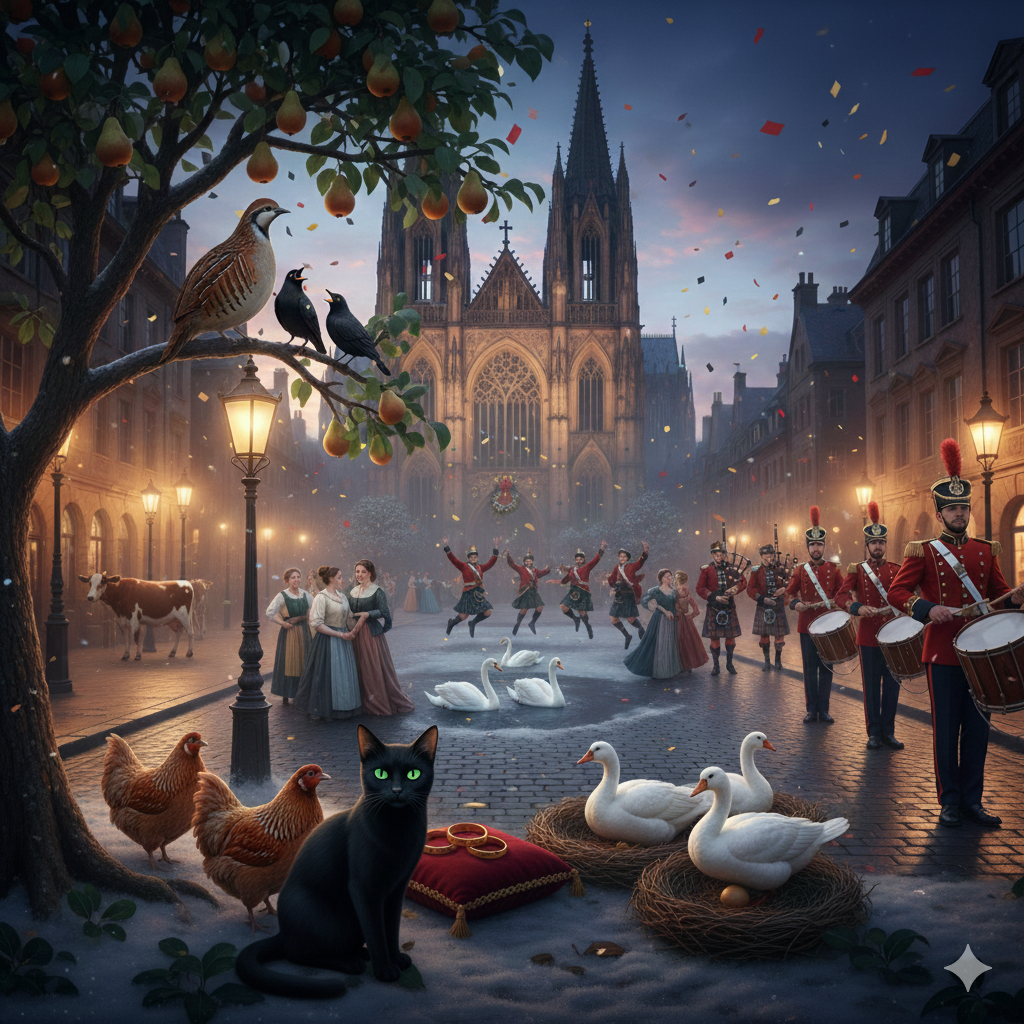
On the First Day of IP – Copyright for Christmas Classics
I am sure you know by now all about copyright, but in case you missed our other blog posts, in the UK, copyright is set up in the Copyright, Designs and Patents Act (CDPA) 1988. Copyright protects original, human creations (at least for now) that fall into certain categories, like literary, dramatic, musical works, broadcasts and so on.
When it comes to anything related to Christmas, we have protection for your favourite holiday songs, movies and of course books. And, let’s not forget the Christmas jumper.
Let’s have a quick look at holiday songs. All music recordings are protected by copyright, which typically lasts for 70 years from the date of recording. To put this into perspective, only recordings made shortly after the Second World War have now fallen out of copyright. For example, Bing Crosby’s “White Christmas” from the 1942 film Holiday Inn is no longer protected, whereas “Frosty the Snowman,” first recorded in 1950, still has a few years left—along with “Rudolph the Red-Nosed Reindeer,” which predates it by just one year.
However, don’t think you are out of the clear if you use old songs, because while the song (when it was written) might be out of copyright, any recording of old songs made in the last 70 years will still be protected.
You might not have considered Christmas jumpers protected by copyright, but they are. Why? Well, all the patterns, illustrations and Christmassy slogans are an artistic expression which is protected by copyright.

Two Trademarked Turtledoves – Branding the Holidays
Trademarks protect brands and identifiers—such as names, logos, slogans, and distinctive symbols—that distinguish goods or services in the marketplace. A trademark helps prevent consumer confusion and ensures brand recognition. Unlike copyright, trademarks can last indefinitely as long as they are actively used and renewed.
Why are trademarks so important for the holiday season? Well, while Black Friday is still one of the busiest times for retailers, it is followed closely by Christmas gift shopping. A survey done in November reveals that UK consumers desire clothing, textiles and shoes as well as gift vouchers for Christmas. However, as I am sure most of us know, we also spend a lot on themed gift wrapping, themed clothing (Christmas themed jumpers or hoodies), and all the other things associated with Christmas. I don’t know about you, but I also tend to want to get more Christmas ornaments and decorations every year (not that I need any, but that is a different issue altogether), because they are so cute. Which is why many brands will trademark Christmas themed products.
As for holiday trademark some examples include:
The Grinch: Beyond the original 1957 book and its later film adaptations, the story and character are heavily protected. A California limited partnership managing Dr. Seuss’s intellectual property holds 30 registered trademarks related to the Grinch. (I succumbed and got a Grinch themed sweatshirt, that reads Merry Grinchmas).
The Polar Express: Warner Brothers’ 2004 film adaptation of the 1985 children’s book has led to 14 registered trademarks under the studio’s name.
Home Alone: Twentieth Century Fox owns two trademarks tied to its iconic 1990 holiday film.
Coca-Cola’s Santa – The iconic Santa image used in Coca-Cola’s holiday advertising is a trademarked brand element, not just a creative illustration.
Starbucks Holiday Cups – The seasonal cup designs are protected as trademarks because they signal the Starbucks brand to consumers.

Three Patented Presents – Innovation Under the Tree
Patents protect innovations in all types of industry. Like trademarks they need to be registered and have a protection of up to 20 years.
Patents can cover innovative products and technologies that make the festive season special. From unique Christmas tree lights and automated decoration systems to novelty items like musical ornaments or self-heating mugs, inventors often seek patent protection to secure their seasonal creations. Unlike copyright or trademarks, patents protect functional inventions rather than creative expression or branding.
Did you know that the first set of Christmas lights, which was a string of 80 red, white and blue lights, was created by Thomas Edison’s friend and partner in the Edison’s Illumination Company, Edward Johnson in 1882?
On the other hand, LED (Light Emitting Diode) Christmas lights have transformed holiday decorating by offering numerous advantages over traditional incandescent bulbs. They consume far less energy, making them more cost-effective and environmentally friendly, while also producing minimal heat, which reduces fire risks and makes them safer for indoor and outdoor use. Beyond efficiency, LED technology enables vibrant colours, dynamic lighting effects, and innovative designs such as programmable patterns and smart controls, giving decorators endless creative possibilities during the festive season. Many of these innovations have been protected through patents, covering everything from the circuitry and energy-saving mechanisms to advanced features like colour-changing technology and app-controlled lighting systems. LEDs were patented in 1966 by James Biard and Gary Pittman while they worked for Texas Instruments.
Looking away from the shiny fairy lights, we also have patents for or concepts such as group gift cards. Surprisingly, there have been patent applications for Santa’s sleigh—and even inventive methods for feeding his reindeer! Let’s not forget tinsel, candy cane, the Christmas stocking and much more!

Four Calling Clauses – The Legal Language of IP
Just as the carol speaks of calling birds, intellectual property agreements rely on “calling clauses” that set out the essential rules for using and protecting creative works. These clauses form the backbone of contracts such as licenses and assignments. Common examples include the Ownership Clause, which defines who holds the rights; the License Clause, outlining permissions and limitations for use; the Termination Clause, specifying when and how the agreement can end; and the Jurisdiction Clause, determining which country’s laws apply. Each clause plays a vital role in avoiding disputes and ensuring that creators and businesses understand their rights and responsibilities—because in IP law, every word matters.

Five Golden Rights – The Core of Intellectual Property
The expression of ideas in a physical medium is not only protected by copyright, but by many other IP rights. Let’s have a closer look at each:
- Copyright – protects an original intellectual creation, it protects audio-visual works, pictures, graphics, architecture, databases, software, designs, literature, novels, poems, plays, music and video, dramatic works. It prevents a work being (without permission) copied, published, distributed or made available online. It lasts for the lifetime of the author +70 years, protection is automatic, no registration required.
- Trademark – protects distinctive signs that identify brands of products / services. Trademarks protect words, personal names, designs, letters, numerals, colours, shapes, packaging, sounds. Prevents unauthorised use of distinctive signs for the same or related products or services. Registration is required, and if the trademark is used in commerce and renewed, protection does not expire.
- Patent – protects inventions, a new and innovative way of doing something, or solving a technical problem. Inventive products and processes in all lines of businesses are protected. It prevents unauthorised making, using or selling of the patented invention. Registration is required and protection lasts for around 20 years.
- Design rights – design rights protect a new and original visual appearance of a product. Items protected are packages, containers, furnishings, graphic symbols, graphical user interfaces, logos and maps. As the above, it prevents unauthorized use of identical or similar visual appearance for the same kind of products and / or services. Designs do not to be registered, but it is advisable to do so. Unregistered designs are only protected against unauthorised copying and have only 3 years of protection. Registered designs are protected for up to 25 years.
- Trade secrets – protect any type of useful information for business that is secret and kept confidential. It protects any confidential information: business methods, R&D data, financial information, cooking recipes, software, datasets, know-how, algorithms. Prevents others from using the confidential information, as long as it remains a secret. Protection is indefinitely if not revealed. Unlawful disclosure of the confidential information allows to claim monetary compensation.

Six Geese-a-Licensing – How IP Deals Hatch Revenue
Licensing agreements are an important part of holiday merchandising, enabling brands to legally grant permission for their Intellectual Property to be used on festive products. These deals not only create seasonal appeal but also ensure that rights holders maintain control over how their IP—such as trademarks, characters, and logos—is represented. Popular examples include Disney-themed ornaments and branded advent calendars, which leverage the strength of well-known brands to boost consumer demand. By formalizing usage through licensing, companies protect their IP from misuse while generating significant revenue streams during the holiday season. As an example, we have LEGO® which has a number of Disney themed sets. Of course, LEGO® is not the only company which will have licensed material from Disney or other IP rights holders. The Grinch themed sweatshirt I mentioned earlier is a similar licensed holiday product.

Seven Swans-a-Suing – When IP Disputes Make Headlines
The holiday season, with its massive commercial appeal, is a hotbed for Intellectual Property (IP) disputes, proving that even Santa’s workshop needs a legal team. Famous cases like the copyright battles over the movie “It’s a Wonderful Life” (which fell into the public domain due to a clerical error before being reclaimed via rights to the underlying story) and the litigation over the “Elf on the Shelf” figurine against knock-offs like “Elf off the Shelf” (where the parody defence prevailed on the copyright claim) highlight the complex intersection of creativity and commerce. The key lessons learned are that strong, well-documented IP—including clear trademarks on unique character appearances (like Coca-Cola’s distinct Santa) and meticulous records of the creative process for advertising campaigns—is essential.

Eight Rights-a-Monetizing – Turning Creations into Profit
In UK Copyright law, the creator or rights holder (not always one and the same) of a copyrighted work is granted a specific set of exclusive rights to control how their work is used. These rights primarily fall under the umbrella of “copying” and “communication” to the public. The rights holder has the exclusive right to authorise or prohibit:
- Direct or Indirect Copying of the work.
- Issuing Copies of the work to the public.
- Rental or Lending of the work to the public.
- Performing the work in public.
- Broadcasting the work.
- Inclusion of the work in a different work they own copyright to (think world crossovers in films for example, i.e. Avengers meeting The Fantastic 4).
- Adaptation or other alteration of the work.
- Making the work available to the public.
These rights ensure that the financial investment and arrangements made by the rights holders protected, allowing them to monetize their creations.
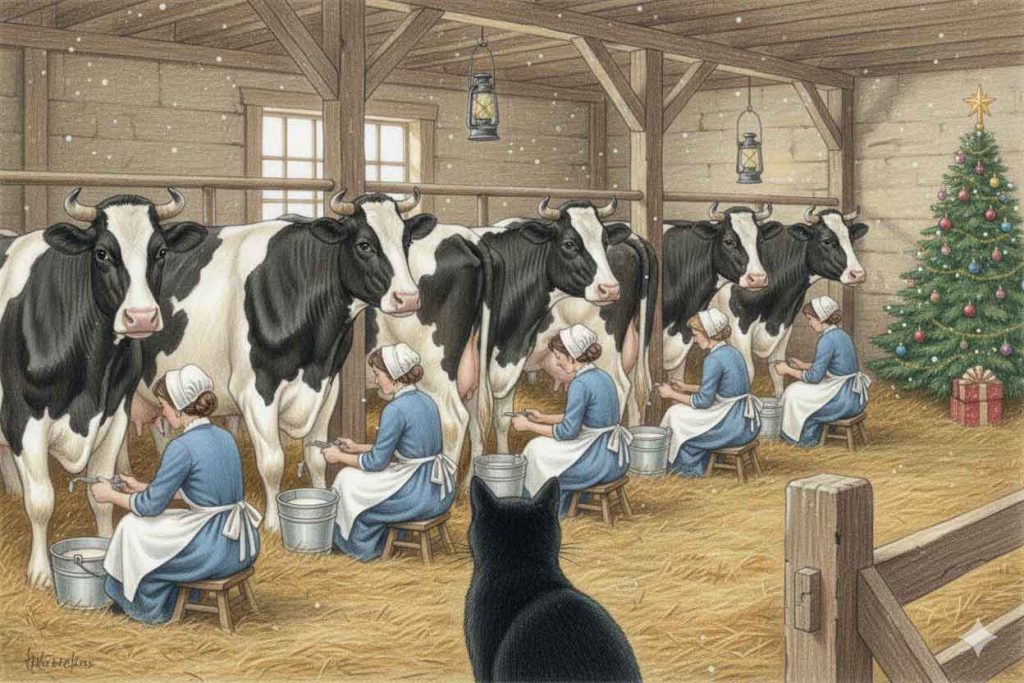
Nine Ladies Dancing Around Fair Dealing
Holidays also come with parodies and remixes. These often fall under the UK’s fair dealing exception for criticism, review, or parody, provided the use is genuinely transformative and does not compete with the original work. During festive seasons, creators on platforms like YouTube frequently produce humorous remixes of popular songs or holiday-themed parodies, while memes circulate widely across social media. These creative works typically qualify as fair dealing when they add new meaning or commentary, but they must still respect moral rights and avoid excessive copying of the original material.
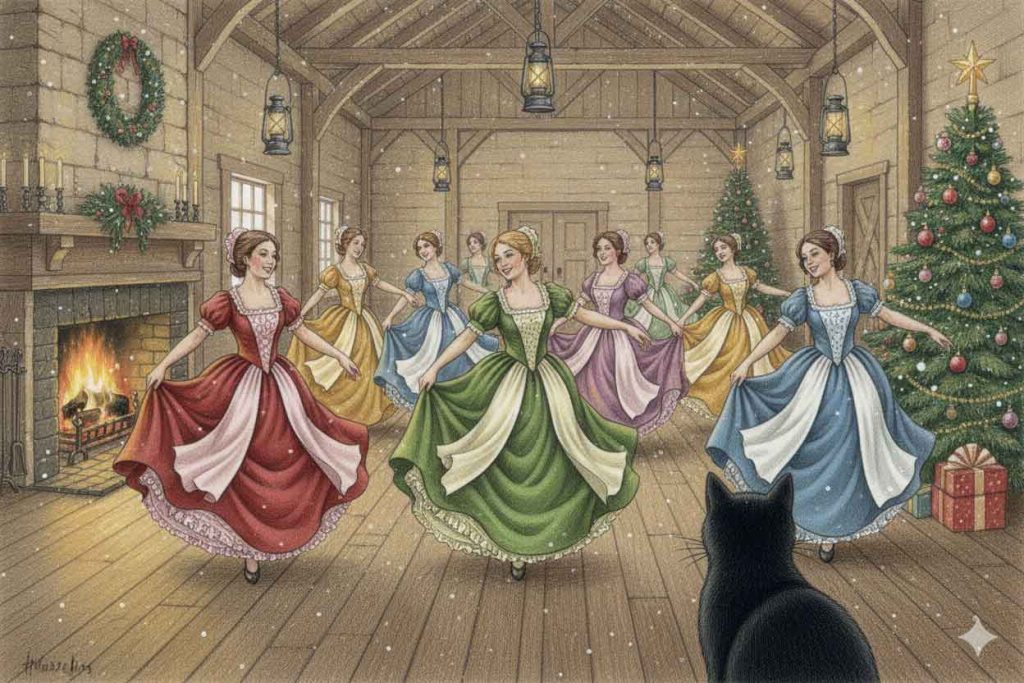
Ten Lords-a-Leaping into Global IP Laws
Intellectual property protections vary significantly across jurisdictions, creating challenges for global holiday campaigns. While UK law relies on fair dealing exceptions, other regions—such as the U.S.—apply broader fair use principles, and some countries impose stricter limitations on parody or remix rights. Trademark registration, copyright duration, and enforcement mechanisms also differ internationally, meaning a festive advert or meme that is lawful in one country could infringe rights elsewhere. For brands running worldwide holiday promotions, these inconsistencies complicate clearance processes, requiring careful licensing, regional compliance checks, and sometimes tailored content to avoid legal pitfalls.

Eleven Pipers Piping Up About Piracy
Holidays tend to become a hotbed for counterfeits and piracy. Now some might think that is not an issue, some big corporations are not getting richer. The issue is however bigger and more dangerous than that. Counterfeits pose a real threat to others, especially children. Let’s take the Labubu phenomenon (if you are like me and have no kids and no clue what these Labubu are, apparently, they are some form of hot-trend toy) their retail value is high and their resale is even higher which might lead people to fall for counterfeits. Fake toys, like Labubu’s, can pose a serious risk to consumers, they can contain toxic chemicals, can be choking hazards from loose parts, and be of inferior quality. Recent national data highlights the scale of the issue: more than 259,000 counterfeit toys, valued at approximately £3.5 million, have been intercepted at UK borders this year. Among the most frequently targeted items are viral, high-demand products such as Labubu dolls. Shop safe this Christmas, while at the same time being careful not to get into financial struggle. Christmas is about time together, more than what is under the tree (and yes, I know that that is corny, but it is Christmas soon, so let’s go with it).

Twelve Drummers Drumming Home the IP Message
Intellectual Property plays a vital role in preserving the magic of the holiday season. From iconic festive songs and beloved characters to creative campaigns and handcrafted designs, IP ensures that creators and brands can share their work without fear of exploitation. When rights are respected, traditions thrive, and innovation continues to bring joy year after year. As we celebrate, let’s support originality—choose authentic products, credit creators, and avoid counterfeit goods. Protecting IP isn’t just a legal obligation; it’s how we keep the spirit of the holidays alive for everyone.

Merry Christmas and Happy Holidays!

The information contained in this blog post should be taken as recommended advice or guidance but should not be taken as legal advice. If in any doubt, please seek proper legal advice.
The images with Copycat and the Twelve Days of Christmas have been created using Copilot and Gemini. All other images are from Adobe Stock Library.

Drought warnings for 2026 issued

This blog has been adapted from a post shared by Barbour EHS.
Despite the recent downpours, the Environment Agency have announced that without significant winter rain, there will be a drought in England next year.
The 2025 spring was the driest in 132 years, and the summer, the hottest on records since records began in 1884 leaves England in a vulnerable position.
The Droughts Prospects Report provides an outlook for water security in 2026. Whilst there has been recent rainfall, due to how severe the dry spring and summer have been, the winter rainfall needs to be at 100% of the long term average to make a true difference.
For a drought to be classed as officially over, water levels need to be fully replenished, with England having experienced below average rainfall for eight out of ten months so far this year, this does not indicate promising results.
What does this mean?
The Met Office has warned of a higher-than-usual likelihood of dry conditions from November to January. This could cause:
- Drought conditions to worsen
- Hosepipe bans
- Pressures on the environment
- Risk to crop yields
What can you do?
The Environment Agency has urged the public to use water efficiently over the festive period.
This could be:
- Using a watering can instead of a hose
- Using less water in your bath
- Shorter showers
- Fill your washing machine to its recommended load size to make sure you use water efficiently
Dry weather not only affects humans but also nature such as:
- The breeding of birds
- Migration patterns of eels and salmon
- Old trees becoming severely stressed
For more water saving tips, view our Water blog.
Introducing Dr David William Braithwaite
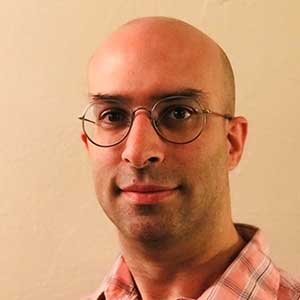
In the years prior to my visit to Loughborough, my research focus had gradually shifted from children’s arithmetic to logical reasoning. In this connection, I quickly became aware of the work of Matthew Inglis and Lara Alcock at Loughborough, both of whom were already well established in the area. We got to know each other initially through email and virtual meetings, and we were all interested in initiating a collaboration. A perfect opportunity to do so came in the form of the IAS Residential Fellowship, which enabled me to visit for a month during my sabbatical year (2025-2026).
We decided to work together on a project investigating the roles of knowledge and logical form in undergraduate math students’ logical reasoning. This project built on Matthew and Lara’s work on “belief bias” in mathematical reasoning (a phenomenon in which judgments about the formal validity of an argument is influenced by one’s prior beliefs about the argument’s content). Our goal was to test theoretical predictions, derived from theories in cognitive psychology about which I had some expertise, regarding how the form in which arguments are presented should affect the magnitude of belief bias. We worked out most of the details of our collaboration in advance; in fact, data collection and analysis were complete before my arrival. We consequently were free to spend the month of my visit discussing implications of the findings, possible next steps, and broader theoretical questions.
This month was among the happiest of my academic life. Matthew and Lara were not only very welcoming, but also incredibly thoughtful, knowledgeable, and sharp. We had so many common interests that we could only begin to explore them in one month. To mention just one concrete result of our work together, while I was at Loughborough, we jointly conceptualized, then coded, a novel computational cognitive model that formalizes the differences between two alternative psychological theories of students’ logical reasoning and compares the theories in terms of their fit to our data. I am hopeful, and confident, that we will continue a productive collaboration for years into the future.

My interactions with the broader research community at Loughborough were also highly enjoyable and stimulating. I was provided an office space within the Wavy Top building, home to the math cognition research group, a globally known center for research on mathematical thinking, learning, and education. I found that I had common interests with almost every researcher in the group and was fortunate to be able to meet one on one with many of them. I also had the opportunity to give several research presentations while at Loughborough — two at the IAS and two more to the math cognition group. The questions and comments that I received at these presentations were very probing and useful, and helped me considerably in developing my new research direction.
Finally, I must not neglect to mention that the IAS and its staff, including Kieran, Jenny, Connor, Lynda, and others, were absolutely crucial to making my time in Loughborough so pleasant and successful. From arranging my travel and housing (which was very comfortable and convenient), to helping me join Loughborough’s excellent gym, to providing a campus tour and answering all of my questions, to arranging logistics for my presentations – everything ran smoothly and made me feel welcome. I will continue to think fondly of my time in Loughborough as I continue to work with my colleagues there.
Dr David William Braithwaite
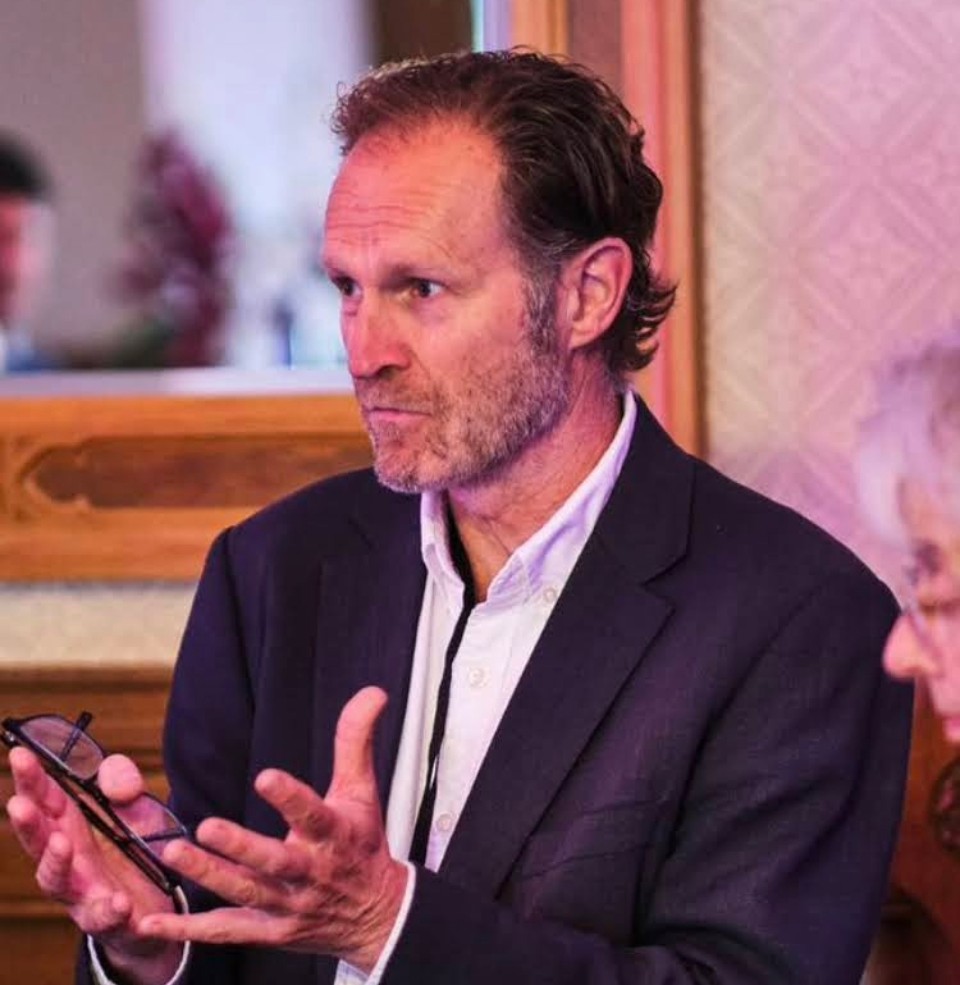
Five Minutes With: Graham Hitchen

What’s your job title and how long have you been at Loughborough?
I am the Director of the Policy Unit and have been at Loughborough for 5 and a half years.
Tell us what a typical day in your job looks like?
Wake up listening to the Today programme on Radio 4. Emails. Travel to London or East Midlands campus (term-time I tend to work 1-2 days per week at both). I try to read my book (rather than emails) when I’m on the tube (just finished the quite extraordinary ‘Question 7’ by Richard Flanagan). WhatsApp exchanges relating to my Creative Industries research project. R&I leadership meeting. Staff 1-1. Emails. Policy Unit meeting. Emails and other actions in response to meetings. Catch up on the news. 1-1 meeting. WhatsApp exchanges to sort out my game of football on Thursday. Train home. Emails etc.
What’s your favourite project you’ve worked on?
Setting up the CRAIC Creative Research and Innovation website.
What is your proudest moment at Loughborough?
Apart from being invited to do ‘Five minutes with…’, my proudest moments have been watching, sometimes timid, researchers gain the skills and confidence that result in their research being used to influence government policy.
Which University value do you most resonate with and why?
I’d like to think I’m Adventurous but more than anything, I’m very Collaborative, since I cannot do anything exciting or impactful without my colleagues 🙂
Tell us something you do outside of work that we might not know about?
I play football every Thursday evening and have done so for the last 20 years. My family knows that it’s sacrosanct in the diary and nothing gets in the way of it. The oldest player is 67, the youngest 30. It’s very competitive but lots of fun. Oh, and Keir Starmer sometimes turns up to play.
What is your favourite quote?
What’s so funny about peace, love and understanding? – Elvis Costello
Check out the song.
If you would like to feature in ‘5 Minutes With’, or you work with someone who you think would be great to include, please email Lilia Boukikova at L.Boukikova@lboro.ac.uk
From the Vice-Chancellor – November 2025

In my November newsletter: Loughborough’s eighth Queen Elizabeth Prize, academics play a key role at COP30, preparations for REF, and UUK’s CEO Vivienne Stern visits the University.
Loughborough awarded its eighth Queen Elizabeth Prize for Education
At a ceremony this week last night at St James’s Palace in London, it was announced that Loughborough University has been awarded a Queen Elizabeth Prize for Higher and Further Education, in recognition of our pioneering contributions to Para and disability sport. This is a hugely prestigious honour. Loughborough now ranks among the most highly acclaimed institutions for the Queen Elizabeth Prizes with eight awards in total – only the University of Oxford has more.
I was also delighted to see the work of MIRA Technology Institute (MTI), in which Loughborough University is a partner, receive a Queen Elizabeth Prize for Education. MTI is an education-industry collaboration led by North Warwickshire and South Leicestershire College that equips thousands of students and professional engineers with specialist skills in demand from the UK’s automotive sector.
The Queen Elizabeth Prize is part of the UK Honours System, awarded every two years to celebrate excellence in academic fields that have made a significant impact on society and the wider community.
Loughborough University stands at the forefront of global excellence in Para and disability sport research, led by the Peter Harrison Centre for Disability Sport within the School of Sport, Exercise and Health Sciences.
Over the last two decades, the work of Professor Vicky Tolfrey (the Centre Director) and her team has been pivotal in driving Britain’s success in Para and disability sport, delivering performance innovations that have helped ParalympicsGB to secure a top two world ranking at three consecutive Paralympic Games.
Together with Para sport colleagues in Loughborough Sport, they have steered the creation of a world-class ecosystem at Loughborough that is unique in higher education and has supported international athletes such as sprinter Thomas Young, tennis player Alfie Hewett and swimmer Tully Kearney.
Their researchers’ work has influenced international policy and practice. For instance, they developed Minimum Impairment Criteria that ensured wheelchair basketball remained a Paralympic event, securing its place at the Paris 2021 Games where ParalympicsGB men’s team won a silver medal. And their research is informing strategies to help Para athletes adapt to competing in high temperature conditions during summer events.
The researchers’ work has also helped to transform lives beyond the competitive arena. For example, they worked with the University of British Columbia in Canada to co-develop exercise guidelines for adults with spinal cord injury, which are now available in ten languages. My very warmest congratulations go to Professor Tolfrey and her team, Alasdair Donaldson (our Head of Para Sport) and his team, and all those who have been involved in helping Loughborough to secure this world leading position in Para and disability sport.

Loughborough at the UN Climate Conference
Some of the most influential people from around the globe gathered in Belém, Brazil this month for the 30th UN Climate Conference (COP30) to discuss the climate crisis and, importantly, the steps the world needs to take to address it.
Among those in Brazil were academics from the University’s Centre for Sustainable Transitions: Energy, Environment, Resilience (STEER). Professor Ed Brown, Co-Director of STEER and Research Director of the UKAid-funded Modern Energy Cooking Services (MECS) programme, spoke at more than ten events at the conference. MECS’ work on the transition to clean cooking, and its presence on the COP agenda, is hugely important for individual countries and the world as a whole, as Ed explains in this video.
Professor Mark Howells, Co-Director of STEER and Programme Director of the Climate Compatible Growth (CCG) programme, also contributed to several events.
Among the highlights was the COP chief executive officer’s endorsement of the Green Grids Initiative, in which CCG is involved. The Green Grids Initiative brings together governments, legislators and international organisations to accelerate the construction of the new infrastructure needed for a world powered by clean energy. Through opportunities such as these, our research and innovation, and the partnerships we develop, which align with our strategic theme of Climate Change and Net Zero, we have a real opportunity to make a tangible, positive difference.
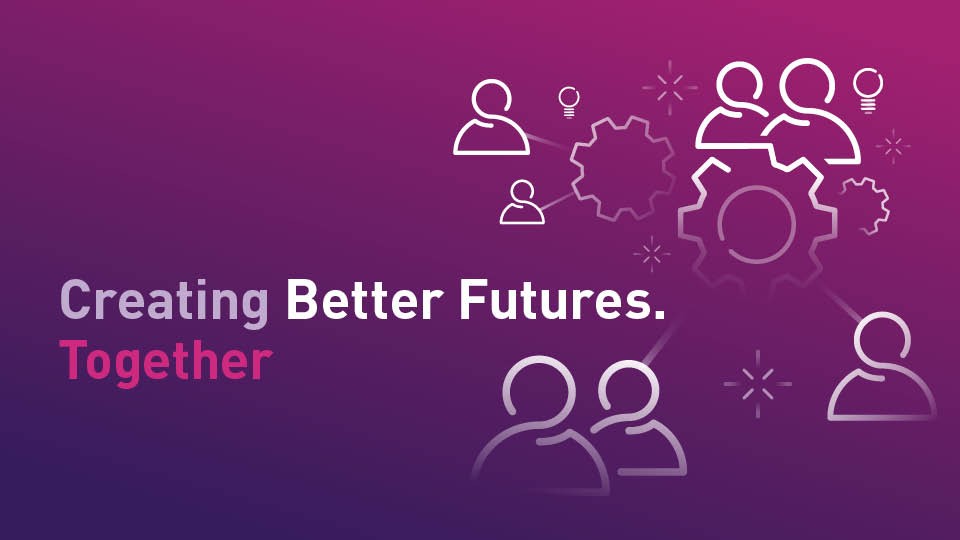
Our preparations for the next REF
Over the coming months, you’re likely to hear increasingly frequent references to the Research Excellence Framework, known as REF. REF is the UK’s system for assessing the quality of research in UK higher education institutions and is undertaken every few years; the last one took place in 2021.
As Professor Dan Parsons, Pro Vice-Chancellor for Research and Innovation, explained in my newsletter last month, REF is one of our strategic priorities for the coming years, and it’s important for a number of reasons.
It provides external validation of the quality of our research and the impact it has on the world, which helps to enhance our global reputation and enables us to attract world-leading staff, high quality students and international partners. REF also underpins a crucial funding stream for us; the results from REF directly influence the allocation of quality related (QR) funding that we receive from Research England.
Loughborough has a proud tradition of undertaking research that shapes public policy, improves lives and enables business and industry to compete more successfully. For example, a battery electrolyser, designed in the School of Mechanical, Electrical and Manufacturing Engineering, is providing remote African communities with the energy they need to cook cleanly and more environmentally friendly. And our researchers in the School of Sport, Exercise and Health Sciences, have shown that walking even a few thousand steps a day can reduce the risk of Alzheimer’s. The next REF will allow us to showcase our pioneering work as part of the University’ submission.
The upcoming REF will also see increased emphasis on research culture and environment. Through this we’ll be able to evidence our commitment to fostering vibrant and inclusive communities and innovative research cultures university wide.
Some of you will be directly involved in REF but all of us have a part to play in supporting the University’s research endeavours, as Professor Parsons explains in this video. For example, our technicians play a fundamental role in supporting our academics’ work, the expertise of our HR staff helps us to recruit the very best people, and our colleagues in Estates and Facilities Management ensure the buildings and facilities that our researchers use are among the very best in the world. By working together we can ensure that REF enables us to shine a spotlight on the breadth and excellence of our research endeavours.
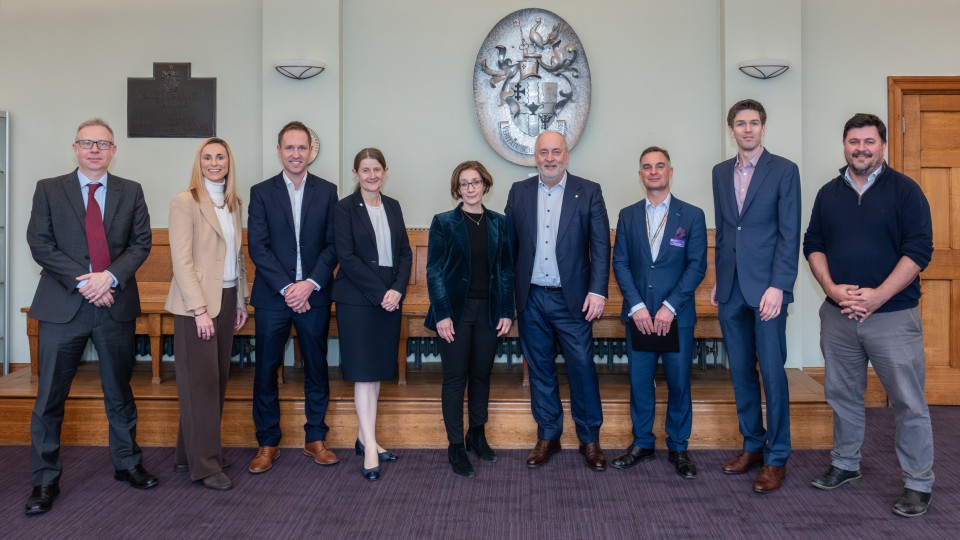
UUK Chief Executive visits Loughborough
Today we have welcomed the Chief Executive of Universities UK (UUK), Vivienne Stern, to our East Midlands campus, alongside the Deputy Director of Policy, Charlie Ogilvie. This was an exciting opportunity for us to showcase Loughborough’s impact, strengths and distinctiveness.
As well as meeting with the senior team, Vivienne and Charlie spoke with our Executive Officer team from the Students’ Union. The UUK team had the opportunity to see the virtual reality headsets in our £5.8m DigiLabs facilities in action. They were also taken on a tour of several of our newly refurbished sports facilities that have attracted significant external funding from government and UK Sport, including the swimming pool and High Performance Athletics Centre. The University engages with Universities UK on a regular basis across a wide range of policy and regulatory matters, and this visit was a fantastic opportunity for us to showcase, in person, the outstanding experience that Loughborough offers to our students, staff and partners.
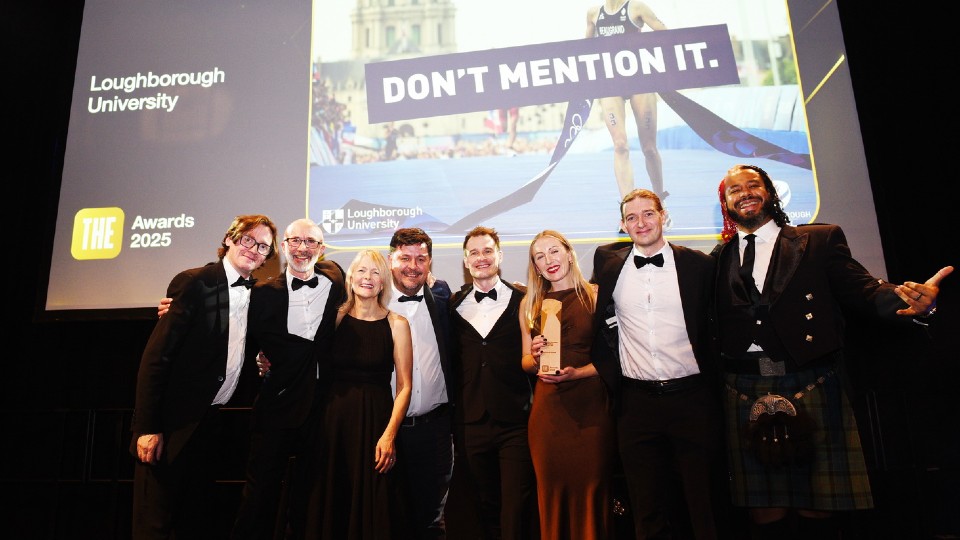
THE Awards win
The University’s ‘Don’t Mention It’ campaign, which ran throughout the Paris 2024 Olympic and Paralympic Games, won the Outstanding Marketing/Communications Team award at this year’s Times Higher Education Awards.

QS World University Rankings: Sustainability
The University’s ‘Don’t Mention It’ campaign, which ran throughout the Paris 2024 Olympic and Paralympic Games, won the Outstanding Marketing/Communications Team award at this year’s Times Higher Education Awards.

Staff Survey 2025
Don’t forget to have your say in the Staff Survey, which is open until 30 November. It’s your chance to let us know what you think we already do well, and the areas we need to focus on to make your experience of working here even better.
AI at Loughborough – Building confidence, capability and responsibility
Co-authored by Prof. Nick Jennings and Vipin Ahlawat.
Artificial Intelligence (AI) is transforming how we live, learn, and work – and Loughborough is taking a thoughtful, people-centred approach to this rapidly changing landscape. From supporting learning and research to enhancing everyday productivity, AI has the potential to make a positive difference to all of us. We do, however, need to make sure we use AI in a responsible way.
We’re responding to AI opportunities with purpose: building the right foundations, supporting our community, and ensuring that innovation goes hand-in-hand with responsibility. One of us (Nick) has written about these issues for universities in general in a previous blog post, but today we want to focus on Loughborough and challenge you all to think about this technology and how you can use it
Our foundations: Responsible, inclusive and human-centred
Over the past year, we’ve been putting in place a strong framework to guide how AI is explored and adopted across the University. This includes:
- AI Governance Model – overseen by the IT Governance Committee (ITGC), ensuring AI projects are well-managed, risks are identified early, and activity aligns with our University strategy.
- AI Principles for Loughborough – a set of commitments approved by ITGC that guide how we design, deploy and use AI tools. These principles focus on:
- Human-centred design – keeping people at the heart of every AI decision.
- Academic integrity – ensuring AI supports, not undermines, assessment and research standards.
- Skills and confidence – helping staff and students build their AI literacy.
- Access to tools – promoting fair, inclusive access to secure AI technologies.
- Safety and ethics – encouraging responsible and transparent use.
- Sustainability – considering the environmental and social impact of AI.
- Ongoing review – keeping our approach under regular evaluation as technology and expectations evolve.
Putting principles into practice
AI is becoming part of how we all work and learn. This is why we have made Microsoft 365 Copilot Chat available to all staff and students, as well as providing everyone with free credits for Adobe Firefly for AI image generation and editing. Other recent developments include:
- Secure tools – promoting trusted options like Microsoft 365 Copilot Chat, integrated into the University’s Microsoft environment to keep AI use secure and compliant with data protection policies.
- Ethical guidance for learning and assessment – including AI responsible use declarations, staff training, and a three-tier assessment model to ensure transparency and fairness in how AI is used in coursework and exams.
- AI Communities of Practice – over 300 colleagues from across academic and professional services collaborating to explore AI opportunities and share best practice.
- Pilot projects – departments are identifying pilot use cases for AI in both education and operations, supported by a structured AI Pilot Framework to manage risk and learning. For example, we are exploring how we can use Copilot to automatically create meeting summaries, as well as AI-powered tools like Studystash for more personalised, adaptive learning.
A challenge for everyone
We know AI will have profound implications for the future, but it’s also changing how we work right now.
We both use AI systems regularly and think you should as well. So here’s our challenge to you:
Try using AI in your daily or weekly routine. And if you’re not using it yet — ask yourself why not?
Even small tasks can benefit from AI support. You could try using:
- Copilot Chat to summarise documents or reports.
- Copilot or Firefly to generate ideas or create visuals for social media.
- Copilot in Word or Outlook to polish or draft documents and emails.
- Copilot in Excel to analyse data or spot trends.
These tools are available to everyone and every experiment helps you learn how to use AI effectively and responsibly.
Building AI literacy
Understanding how to use AI responsibly is as important as the tools themselves. Over the coming months, we’ll be focusing on AI literacy for staff and students, including:
- Practical sessions on using generative AI effectively and responsibly.
- Further guidance on when (and when not) to use AI tools in learning and research.
- Case studies showcasing staff who are using AI to save time, improve workflows, or spark creativity.
- How to make more informed and sustainable choices when using AI.
If you’re new to AI, the Responsible AI Guidance site is a great place to start – it offers guidance, “dos and don’ts”, and links to useful training resources.
Get involved
AI is a collective opportunity. Whether you’re a colleague or student, there are many ways to engage:
- Visit: Responsible AI Guidance site
- Join: one of our AI-focused Communities of Practice.
- Try: approved AI tools such as Microsoft 365 Copilot Chat and Adobe Firefly, available to all staff and students.
- Learn: find out more about AI and look out for more guidance on responsible AI use coming soon.
Our goal is simple:
To harness the potential of AI in ways that enhance human creativity, uphold academic integrity, and strengthen our community.
Together, we can make AI work for people, with purpose, and guided by our values.
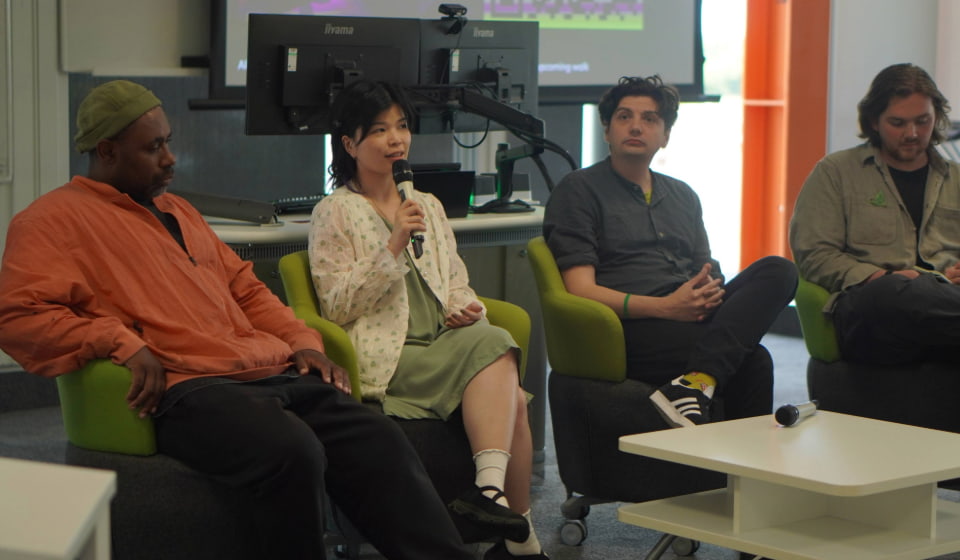
FLUX 2025
What does designing with the More than self entail?
Written by Noémi Zajzon
“There is something incredibly charming hearing people you know in another body’s experience — their takeaways from encounters with other species.” This reflection from Ruth Catlow captures most viscerally the spirit of FLUX 2025: More than self, held on 17 June 2025 by the Institute for Creative Futures at Loughborough University London.
The day-long event brought together students, practitioners, and researchers from across the arts, design, and academia, interweaving a student exhibition, a soundscape workshop, a panel discussion with Angela YT Chan, Christie Swallow, Dr Spyros Bofylatos, and Harun Morrison, and a presentation by Ruth Catlow in conversation with Dr Viktor Bedö. The symposium was chaired and organised by Dr Pandora Syperek and Dr Ksenija Kuzmina, with assistance by Ania Mokrzycka and in collaboration with the Flux25 Organising Committee.
Framed by critical questions of subjectivity, agency, and empathy, the symposium asked how we might attend to radical otherness across species, technologies, and ecologies, while acknowledging the social inequalities and uneven histories that shape these entanglements. The presentations showed how engaging with data, stories, and sensory methods can deepen insights about the complexities that bind human and beyond-human worlds. We learned how role-play might help us imagine new forms of justice, what species like parakeets or the Jamaican Swallowtail Butterfly can teach us about belonging — and non-belonging — and how our desire to care across multiple worlds often collides with uneven knowledge and responsibility.
More-than-human Encounters & Citizens across Species
Through their projects, each speaker foregrounded the ethical and political stakes of more-than-human coexistence.
In her talk,artist and climate researcher Angela YT Chan presented her work examining how technology and climate justice intertwine in discourses of climate change. Projects like Forestscapes collected soundscapes across multiple geographies and seasons to engage collectives of people in forest ecologies, their issues and restoration efforts, while the Weathered Radio workshops recorded sensory experiences about changing political and natural climates. In discussing her engagements with public narratives around the UK’s net-zero strategy, Chan emphasised the importance of documenting such futurings that contribute to normalising green militarism, framing war as compatible with sustainability.
Artist Harun Morrison further thematised the political stakes of ecological interventions by tackling the controversial efforts to reintroduce the endangered Jamaican Swallowtail Butterfly in the Dolphin Head Mountain, a land used for bauxite mining that significantly altered the butterfly’s habitats. Drawing on archival materials from the Horniman Museum’s Natural History Gallery — including a 1972 handbook titled Defences of Animals — Morrison’s 2023 exhibition Dolphin Head Mountain, conceived as a shifting display, combined sound and performance to prompt reflection on how museum collections preserve and mediate knowledge.
In a parallel enquiry, artist and designer Christie Swallow investigated urban parakeets as both historical actors and fellow city-dwellers, developing Paracologies as a lens for studying interspecies relationships, their environments and shared ecologies. The project traced the parakeets’ ancient lineage through their ties to places and their coevolution alongside humans across urban habitats, challenging origin stories that essentialise species or marginalise non-Western and Indigenous epistemologies, and prompting reflection on what it means for a species to be considered “native” to a place.
Dr Spyros Bofylatos also emphasised the importance of place, noting that places “feed into our practices”. Speaking directly to the design community, he discussed how autoethnographic practice can help designers harness intuition and inspiration to build their practice while engaging in rigorous introspection. Through projects that used reflexivity to understand place and developed protocols that weave in multi-layered sensory experiences —capturing material encounters, for instance, by asking engineers to write haikus about bioplastics made from food waste — Bofylatos showed how such methods can inspire new vocabularies of material engagement.
UK-based artist, researcher and organiser, Ruth Catlow introduced Furtherfield, the initiative she cofounded and has been fostering commoning cultures and advancing more-than-human interests at the intersection of art, technology, and eco-social change. This vision guided also her work on The Treaty of Finsbury Park that used multispecies Live Action Role Play (LARP) to promote “interspecies democracy” within the context of London’s Finsbury Park, a site marked by pollution, traffic, and ongoing financial pressures. Conceived as a future-facing event, The Treaty gathered a delegation of park residents — including rangers, managers, everyday users and nonhuman stakeholders from grass to geese to stag beetles — to strike a shared agreement in protecting their habitat. Through online and live role-playing, participants stepped into the world of other species to reflect on how colonial domination, institutional structures and governance systems shape urban parks and their biodiversity.
Collectively, the presentations gestured toward articulating the interfaces between humans and other-than-humans where play and experimentation negotiate differences towards more ecological citizenship and democratic futures.
Entanglement, Multitudes & Subjectivity
In exploring interspecies communication, the projects tackled processes of emergence, mediation, and experiences that transform subjectivities. While converging on challenging unity, identity, and atomism, each speaker sharpened a different methodological edge that brought us closer to one of the key questions posed by the symposium:
“Where are the boundaries between the individual and the other-than-human, when we are porous and entangled bodies, each containing multitudes?”
The term multitude here highlights the multiplicity of living agents that create shared worlds. Originally drawing from political philosophy,[1] multitude describes a collective defined not by shared identity but by common modes of existence and relational agency. In multispecies contexts, the concept underscores how bodies, environments, and ecologies are made up of interconnected lives, each with their own agencies and knowledges.
Such entanglements are at the core of Paracologies, where Christie Swallow sought a deeper understanding of human-nature relationships and coexistence, while also problematising how bodies perform knowledge and shape how others come to belong within allegedly artificial ecologies and postcolonial landscapes. By staging a sensory exchange that convened humans and parakeets in close yet distinct ways, Swallow invited participants to think in solidarity with so-called invasive species like parakeets.
Extending this reflection, Harun Morrison questioned not only how we communicate with other species, but also to what end, and who benefits from cultivating sensitivities and ways of thinking across species. He cautioned that in seeking understanding there is a risk of reproducing the intrusive gaze of past naturalists, who probed animal lives more out of control than curiosity. As a counterpoint, Morrison’s metaphor of the Telepathic Butterfly invites respect for the unknown within nature and animal worlds, resisting colonial categorisations and Western taxonomies embedded in the museum collections, and allowing certain boundaries between species to remain.
This sense of accountability for embodied knowledge also resonates with the relational and historical approach Angela YT Chan adopts to guide the collection, processing, and mobilisation of data for climate justice. Forestscapes extends this sensibility through its use of sound to expand the boundaries of listening and narrate affective encounters and shared understandings of forest ecologies.
Moving towards ecological justice, Ruth Catlow suggests, involves embracing “what feels lively as well as what feels deeply uncomfortable”, as demonstrated in The Treaty of Finsbury Park. By tracing how local choices connect to global systems and how situated knowledge shapes urban habitats, the project shows that caring for small patches of urban biodiversity can inspire imaginaries of more equitable coexistence.
In practising conversing across species, these more-than-human encounters highlight the power dynamics at play, but they also enrich experiential skills to nurture these ecologies in which humans are nested in dense networks of connections as part of larger multispecies collectives.
Auto-theory, Liberation, Radical Otherness & Inequality
While inviting us to see life as plural and evolving through shared encounters, the projects also turn our attention inward to reflect on further provocations posed by the symposium:
“How do we look inward to look outward, navigating the terrain of the self without succumbing to navel-gazing? What potential does auto-theory present for collective and multispecies liberation? And which methods can bring a focus to the radical otherness of species difference without sidelining social marginalisation and inequality?”
In responding to these questions, the projects grapple with what Dr Spyros Bofylatos describes as “what matters but cannot be measured or explained”. They foreground tacit knowledge — the contextual skills and sensitivities key for navigating uncertainty — and articulate practices that expose the material and intersubjective dimensions of creative process, including the relational and socially mediated nature of inspiration itself.
Across the projects, sensory and participatory practices offer alternative ways of engaging with complexity and data, moving from introspection toward a relational and historical understanding of selfhood.
For example, Forestscapes activates climate datasets through affective and imaginative registers bycollecting sound-based narratives from field recordings, curating playlists, and encouraging collective listening. These methods honour the autonomy of the forest “other” while highlighting the social dimensions of climate justice embedded in the data and generating insights that speak to both expert communities and broader publics. Where Chan repositions data collection through storytelling for public engagement with forest ecologies, Morrison blends fiction with archival research to interrogate the museum collection. Sound and performance animate the endangered butterfly with its own histories, vulnerabilities, and agency, extending tacit knowledge across species while signalling the limits of human understanding of more-than-human consciousness.
In Swallow’s Paracologies, quilting allows a tactile and reflective way of layering information by stitching archival materials into textiles that are carried on walks and used to connect humans directly with parakeets. This intention is amplified through musical performances inspired by the song of London’s ring-necked parakeets and sung by humans. It demonstrates how creating “moments of first contact” with “othered” species can foster proximity and empathy, similarly to role-play in Catlow’s The Treaty of Finsbury Park, where participants took on characters to navigate other-than-human perspectives, negotiate interests, and improvise responses to the needs and attachments of these species.
The projects position us within the historical trajectories of multispecies justice to guide collective decision-making and enacting alternative futures. For instance, The Treaty’s Interspecies Cooperation sentience dial — a fictional device helping humans connect with their nonhuman counterparts — invited participants to pledge a cooperation pact among all living beings and imagine a future where all Finsbury Park inhabitants share equal rights. In aligning with Chan’s relational approach to climate justice, methods of listening and narrating emphasise human agency that sustains ecological awareness within broader environmental and social histories. Likewise, efforts to save the endangered Swallowtail Butterfly, whose habitat has been disrupted by extractive industries, illustrate how conservation decisions often compensate for the technological reworkings of landscapes that undermine any vision of multispecies liberation.
More than self implications for Design Practice
The concept of the more-than-selfcallsfor a radical rethinking of human agency participating in collectivity beyond the individual gaze. In the arts, this perspective has shaped participatory, community-based, and socially engaged approaches that prioritise relations and collaborative experimentation over singular artistic intention.
The projects staged at FLUX 2025 extend this ethos towards interspecies cooperation and coexistence. At their core lies a commitment to the hopeful possibilities Donna Haraway describes as the “time place for learning to stay with the trouble of living and dying in response-ability on a damaged earth”.[2] In this context, relational awareness decentres the self to attend to forms of agency often overlooked. By moving beyond anthropocentric thinking and addressing ecological restorations entwined with colonial histories, the projects extend tacit knowledge in multispecies perspectives to guide critical enquiry into human positionality and relational responsibility.
This outward attention to nonhuman agencies shapes the language and medium of embodied self-reflection. Visuality, sound, performance, quilting, music, and acting enable sensory methodologies for thinking with the self, yet also beyond the self by situating creativity within — but not limited to — human experience. Curating and collectively listening to forest soundscapes, as well as composing and singing a parakeets-inspired song, create language that, in Karen Barad’s terms, transcends the human-nonhuman binary. Moving from merely representing to enacting, methods such as listening, sensing, and improvising, invite affective engagement and situated narratives that unsettle the boundaries of the individual and anchor agency in favour of more-than-human interests.
At the same time, working within the limits of a medium (such as sound) draws attention to the limits of translation and the dangers of abstraction. Chan illustrates this by reflecting on the challenge of integrating two types of forest environments into a narrative soundscape without blending them into an abstract whole. While attending to difference re-sensitise our perceptions, the pursuit of clarity, she suggests, mirrors the human desire “to find answers because uncertainty is hard to sit with” — the same impulse that makes the seemingly straightforward path to net-zero appear reassuring, even when such certainty conceals troubling power dynamics.
Each project intervenes in this tendency to seek solutions in fixed answers. Moving across genres, disciplines, and languages, they engage the ambiguities of ecological transformation and relational justice in search of a shared vocabulary for collective stewardship across species. Yet this ethical imagination demands a richer language to describe individual and collective processes of becoming and the values they generate. It calls for cross-disciplinary engagements within institutional structures that still privilege measurable outcomes over accountability for the public narratives they sustain. It urges better understanding of the systems and bodies — civic, public, nonprofit, or individual — responsible for caring for more-than-human ecologies. It situates selfhood within broader multispecies ecosystems, refining auto-theories of practice through more rigorous introspection.
In this context, the radical openness in the more-than-self becomes meaningful only when we recognise that change also relies on our capacities to integrate and adapt over time. While attuned to designing amid the troubles we perpetuate, the quieter lesson of the Telepathic Butterfly reminds us that learning to find ease in uncertainty may itself be an ethical gesture of care.
[1] Most notably from the work of Spinoza, and later Michael Hardt and Antonio Negri. The term also refers to the phrase “I contain multitudes” from Walt Whitman’s 1892 poem “Song of Myself”, which explores the potential for communion between individuals and inspired the title of science writer Ed Yong’s book on the role of the complex ecosystems of microbes in human and nonhuman bodies (Ed Yong, I Contain Multitudes: The Microbes Within Us and a Grander View of Life. Ecco, 2016).
[2] Haraway, D.J., 2020. Staying with the trouble: Making kin in the Chthulucene. Duke University Press, p.2.
Ways into regeneration: What our recent public dialogue event taught us about sustainability and ambiguity
Rethinking regeneration through dialogue, creativity and wisdom
On an unusually mild October afternoon, conversations about what it means to ‘become regenerative’ filled the Loughborough University London campus. Voices from the UK, US and Japan contributed to a rich dialogue exploring more personal engagements with regenerative values and leadership.
Through workshops and discussions, our recent event Ways of Becoming Regenerative: Learning from ecological thinkers, artists and Indigenous wisdom invited participants to explore regeneration through intercultural, creative and relational lenses. Part of our research at Becoming Regenerative (B-Regen) investigates how innovative regenerative ideas emerge, evolve and gain traction within entrepreneurial contexts.
From reflective workshops to an evening of talks and discussion, the event created space to question, listen and reconnect – not just to new ideas, but to one another.

Uncovering the many meanings of regeneration
A collective dialogue exploring how regeneration is understood and practised across cultures laid the foundations for a day of open curiosity. Dr Tuukka Toivonen briefly outlined B-Regen’s research and interest in unconventional approaches to regeneration. We’re interested in how regenerative paradigms in art and design education shape the emerging landscape of regenerative innovation and more-than-human relations.
Event collaborator Yasuhiro Kobayashi, Founder of Ecological Memes, touched on a project mapping a rural watershed ecosystem in Japan and reconnecting people with traditional animistic stories. B-Regen’s Project Manager, Hannah Lyons Tsai, noted how, in their practice, Ecological Memes were “the weaving of old and new stories, and how this sparked a conversation about the etymology of nature from our more Western perspectives.
This reflective opening set the tone for the afternoon’s embodied, dialogic exploration.

The Words of Suiten: Reconnecting with nature’s wisdom through dialogue
Suiten no Kotoba (The Words of Suiten) are described as practical wisdom rooted in nature. The cards, inspired by Buddhist philosophy and Ecological Memes’ exploration of living ecosystems in practice, invite reflection and offer wisdom on life patterns, emotions and our relationships with the more-than-human world. B-Regen was honoured to host the first English-language version of the workshop facilitated by Yasuhiro.
Comprising 27 cards of practical wisdom (each called a ‘seed’), the deck spans four distinct themes:
- Inner exploration (eg, listening to your somatic voice and reawakening your senses)
- Awai and Emergence (eg, appreciation for chaos and surrendering to flow)
- Re-encountering the world (eg, learning to ‘savour the hassle’ and allow for differences)
- Living with the more-than-human (eg, being in a heterogeneous community)
Working in small groups, participants intuitively picked cards to explore what they evoked. With each iteration, conversations deepened, revealing shared emotion and connectedness. Many noted that relational encounters of this kind are novel in academic settings, yet essential to truly becoming regenerative.
B-Regen’s Dr Ida Telalbasic reflected on the exercise, noting its resonance with her own process of “embracing chaos while looking at nature in a more internalised way.”
As the afternoon drew to a close, participants carried these insights (and this sense of interconnection) into the evening’s dialogue and panel discussion.

From linear systems to relational ontologies and ‘generative ambiguities’
With guests settled in the lecture theatre, Dr Ida opened the evening by presenting early insights from our investigation. A screening of Echoes from Clouds by Japanese artists Koichi Sato and Hideki Umezawa followed, bringing the physical reality of living in infrastructures while relying on nature (water) into anxious focus.
Panellist Yasuhiro shared that in Japan, the concept of “nature” as separate from humans is a relatively recent Westernised import. Architect and regenerative design pioneer Michael Pawlyn built on this, drawing from his new book, Biomimicry in Architecture, to compare Western colonial and Asian Taoist mindsets.
Scholar and filmmaker Saori Ogura introduced her work with communities from the Himalayas to Zimbabwe through the Centre for Braiding Indigenous Knowledge, highlighting Indigenous relationships to seeds as kin and the cultural revival of millet practices and stories.
During the inspiring panel discussion, chaired by Dr Tuukka, the conversation shifted toward regenerative ontologies: “While most public discourse treats regeneration as a linear shift from negative to positive impact, our discussions revealed another way – an ambiguous, more-than-human, relational ontology rooted in how we see, feel and relate to the world.”
He noted that the ability to move between scientific and animistic lenses signals a growing comfort with multimodality in regenerative thought.
Embracing ambiguity as opportunity
From the workshops to the panel discussion and the conversations over hot coffee in-between, the event invited us to imagine regeneration not as an end goal, but as a way of being – one that values ambiguity, interdependence and planetary care.
For the B-Regen team, these conversations opened new questions about how entrepreneurs navigate between economic systems and ecological sensibilities, and how ambiguity itself becomes fertile ground for innovation. As our research progresses, we will continue exploring how entrepreneurs shift between economic, aesthetic and relational modalities.
We extend our thanks to all our speakers, partners and participants, including Climate & Ecological Transitions Research Hub at Loughborough University London, Ecological Memes, Living Things drinks and Holon gin.
For more information you can visit the project’s website
Sustainability Blog Guide: Travel
Welcome to the Loughborough University Sustainability Blog Guide – your go to guide to practical yet fun ways to live and work more sustainably. This blog series is part of Sustainability Week (10-14 November) and is designed to support both students and staff in making meaningful sustainable changes.

In a world where so much of life happens online, it’s easy to forget the value of stepping out into the real world. Travel connects us to people, places, and experiences, but it also impacts the planet. By choosing smarter ways to get around and making conscious decisions to reduce our carbon footprint, we can turn every journey into an opportunity to live more sustainably.
Travelling locally
- Walk or cycle where you can: plan ahead so you can leave in plenty of time and dress for the weather. Active travel reduces emissions and boosts wellbeing!
- Use public transport: make use of the Sprint Kinchbus service, local routes snd trains into Loughborough. If you are in London, the Tube is a great low-carbon option too.
- Try car sharing: car sharing with friends, course mates, or colleagues helps cut down on fuel use and congestion while saving money.
- Mix up your routes: walking doesn’t have to be repetitive – our campus is full of green paths and scenic spots. Mixing up your routes keeps things interesting and encourages outdoor time.
- Try electric options: book electric taxis where available and look for bus routes that use low-emission or electric vehicles. Staff can also take advantage of Cycle2Work and Electric Vehicle Schemes to make sustainable commuting easier.
Long-route travel
- Drive economically: if you don’t have a hybrid or electric vehicle, adopt eco-driving habits. Use engine braking, shift gears smoothly, and keep your revs below 3000rpm to reduce fuel consumption and emissions.
- Choose rail and coach travel: trains and coaches are lower-carbon alternatives to flying or solo driving. Railcards can save you up to 30%, and long coach journeys are often budget friendly.
- Explore the UK: stay local and cut down on air travel emissions. From Cornwall’s beaches to Edinburgh’s history, the Lake District’s trails, and even the Channel Islands, there’s plenty to discover close to home.
- Avoid flying: consider interrailing, taking a cruise from the south coast, or planning a scenic road trip through Europe. These options are often more sustainable and enriching.
- Make green choices on holiday: support local businesses, try vegetarian or plant-based dishes, respect local culture and nature, avoid littering, and travel in groups to reduce your footprint.
- Pack reusable items: bring a refillable water bottle, reusable toiletries, and pack light. Only take what you need and bring back what you don’t use to minimize waste.
Try this
The next time you need to get across the East Midlands campus, instead of taking the campus Sprint, leave earlier than you need and explore new walking routes.

Ready Player One? Copyright and Gaming Explained
Press Start: Copyright in Video Gaming
This is part 1 of two parts blog series which looks at copyright implications in the gaming world. Part 1 will look at video gaming while part 2 will look at board games. When it comes to video gaming and copyright, it can be a bit of a maze. Because of the complex nature of video games and the multiple parts it contains, it can be difficult to navigate the complexity of copyright. As copyright is territorial, the way video games are perceived and protected in other countries is also a complex matter. However, as usual, we will mainly look at how copyright applies in video games in the UK.
The worldwide gaming market is projected to be around $ 29,48 billion. The UK has around 10,84 million gamers and this community is forecast to increase by 6,64% by 2027. Battle royale games reign supreme as the top online gaming format, according to the Academy of Animated Art. As of March 2025, Fortnite was leading the charts of most viewed hours.
How does copyright law intersect with gaming culture? Let’s read the rulebook to find out.
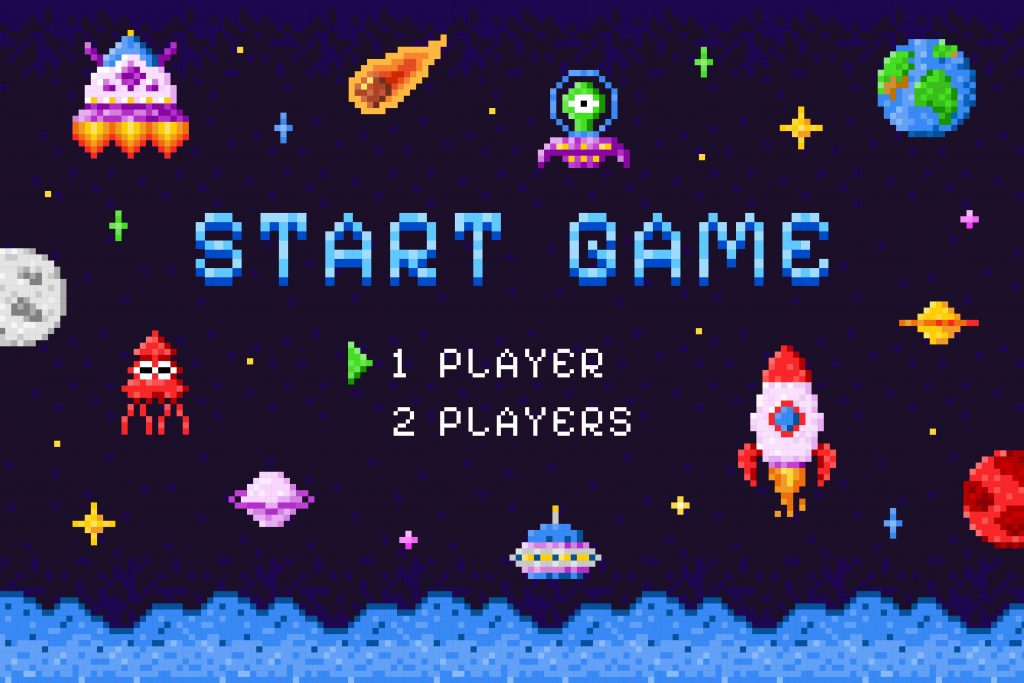
The Rulebook: What is Copyright in Gaming?
A video game or computer game is an electronic game which is usually played on a device. Video games are generally categorised according to their hardware platform, which includes arcade video games, console games and computer games. More recently, the video game industry has expanded into mobile devices, virtual and augmented reality and remote cloud gaming.
In the UK, copyright law is governed by the Copyright, Designs and Patents Act 1988. While the Act does not list video games as a distinct category of protected works, games are safeguarded through the copyright of their individual components. The underlying computer code or any fixed medium qualifies as a literary work, while the game’s narrative and presentation may be protected as literary or dramatic works. Visual elements such as character designs, artwork, and audio components—including music and sound effects—are also eligible for copyright protection. However, aspects like overall ‘look and feel’ or core gameplay mechanics fall outside the scope of copyright.
For copyright to apply a work needs to be original, and the author’s own intellectual creation. Copyright lasts for the lifetime of the author plus seventy years for any literary, dramatic, musical or artistic works and for fifty years after creation for computer-generated works and sound recordings or broadcasts.
In the UK, as an employee the first copyright owner will be your employer, unless there is an agreement to the contrary. As such, anything you create during your employment as part of your job, copyright will be automatically assigned to the employer. As an example, if you are a games developer and you work for EA Games, whatever you develop for them will belong to them. Issues might arise when freelance developers or other third parties are commissioned to create aspects of a game. By default, the copyright will belong to the freelance developer or third party unless an agreement to the contrary exists.

Levelling up: Intellectual Property (IP) protection
Shielding inventions with Patents
Copyright is not the only protection applied to the video games. There are also the other types of protection, like patents. Patents in video games typically protect innovative technical solutions rather than creative content. They can cover aspects like game engines, rendering techniques, networking systems, or unique hardware integrations that enable new gameplay experiences. Unlike copyrights, which safeguard artistic elements such as graphics and music, patents focus on functional inventions that provide a novel and non-obvious technical advantage. This means developers who create groundbreaking mechanics or technologies—such as advanced physics engines or VR interaction systems—may seek patents to secure exclusive rights and prevent competitors from using the same innovations.
Some notable gaming technology patents include:
- In 1983, Nintendo filed a patent for a “multi-directional electrical switch,” which most gamers recognize today as the iconic D-pad.
- Nintendo also secured a patent for a “video game system providing physical sensation,” the technology behind the Rumble Pak that paved the way for haptic feedback in modern controllers.
- Additionally, there are over 10,000 patent entries on Espacenet related to Virtual Reality (VR), highlighting the vast innovation in immersive gaming experiences.
Gaining Trademark protection
Classic titles like Pac-Man®, Donkey Kong®, and Space Invaders® have remained popular for over three decades, continuing to be recognized and played worldwide. One of the keyways these games have been protected is through their branding, often achieved by registering trademarks for their names and logos. In fact, Pac-Man® has become one of the most iconic games globally, and its main character is itself safeguarded as a registered trademark. This form of protection helps preserve the identity and commercial value of these legendary titles.
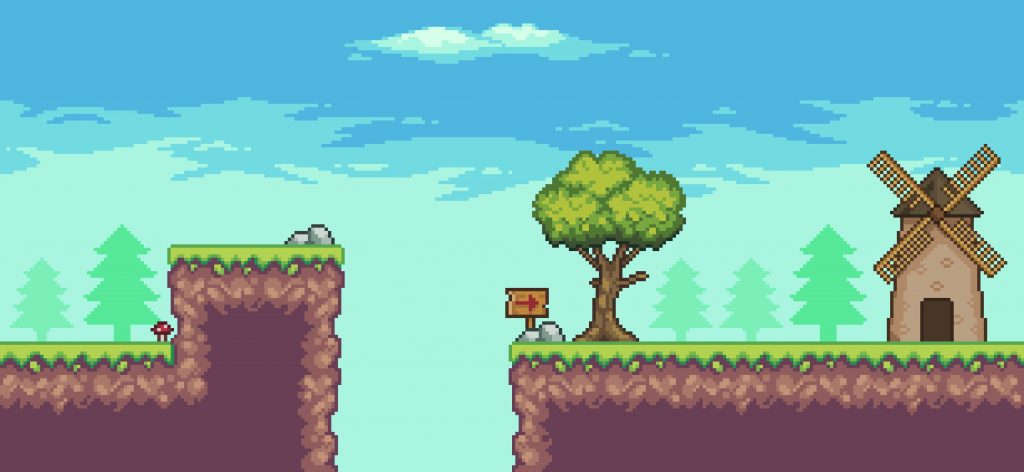
Fixing bugs: Game creation and IP issues
Intellectual property (IP) protection for video games—through copyright, patents, and trademarks—faces challenges similar to those seen in the copyrightability of software, as both are relatively new areas of IP law. The video game industry thrives on reusing and adapting concepts from earlier titles to create innovative gameplay experiences, while avoiding unlawful direct copying of existing games. This dynamic, combined with the fact that games are not confined to a fixed medium, makes defining clear IP protections particularly complex.
Common assets
Common game assets such as textures, 3D models, audio files, and user interface elements are primarily protected under UK law through copyright, which applies automatically when these assets are created and covers artistic works, sound recordings, and animations. In addition, design rights can safeguard the visual appearance of characters or UI components, while trademarks protect distinctive logos or branding used within the game. Developers often rely on licensing agreements for third-party assets and may use trade secrets to secure proprietary techniques or source files. These protections ensure that creators maintain control over the use and distribution of their original assets.
Mods and fan creations
Modding and fan creations often exist in a grey area of copyright law. Mods—user-made modifications to games—and fan works like art, stories, or videos typically build upon copyrighted material owned by the original creators. While these projects can foster creativity and community engagement, they may infringe on exclusive rights such as reproduction or derivative works under copyright law. Some companies tolerate or even encourage modding through licenses or community guidelines, while others enforce strict takedowns. Ultimately, legality depends on factors like permission, fair dealing, and whether the work competes with or harms the original market.
Game engine
A game engine is a framework that provides tools like rendering, audio, physics, and AI systems for building games. Because certain design elements and background processes are dictated by the engine, they often appear in all games created with it and fall outside copyright protection. Similarities due to shared source code or engine limitations are not considered copying. Large publishers often avoid these constraints by developing proprietary engines.
Contributors
Contributions that do not directly involve writing the game’s code are generally not protected as literary works under copyright law. However, these elements may fall under protection if an audiovisual copyright is obtained. Regarding authorship, most contributors are employees, so their work is typically classified as “work for hire,” meaning the rights belong to the employer rather than the individual. Music, on the other hand, is often outsourced to third parties rather than created in-house by game developers. In such cases, the arrangement may not qualify as a work for hire.
Piracy
Video game piracy and illegal distribution pose significant challenges to the gaming industry. Piracy involves obtaining and playing games without paying for them, often through unauthorized downloads or cracked versions. Illegal distribution extends this issue by sharing copyrighted games without permission, whether through torrent sites, file-sharing platforms, or selling counterfeit copies. These practices violate copyright law, deprive developers of revenue, and can harm players through malware or compromised files. While some argue piracy stems from high prices or limited access, it remains unlawful and undermines the sustainability of game development.
Cross border issues
Cross-border copyright issues arise when games, mods, or fan creations are shared internationally, often through digital platforms. Copyright laws vary by country, meaning what is considered fair dealing or permissible in one jurisdiction may be illegal in another. This creates challenges for enforcement, especially with piracy and illegal distribution, which often occur across borders through torrent sites or cloud services. Game developers and publishers rely on international treaties like the Berne Convention and agreements such as TRIPS to protect their works globally, but practical enforcement remains complex due to differing legal standards and limited jurisdiction over foreign actors.
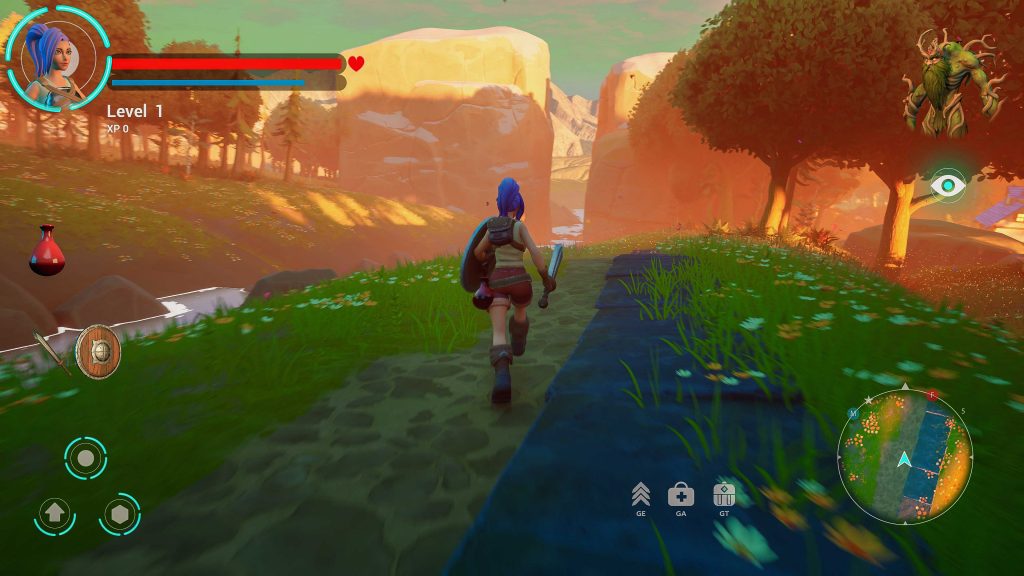
World sharing: Licensing
Games would not be the same without music, different characters, or cars. In cases such as these, games developers or publishers will have to get licensing agreements from third-party copyright holders to use that material. Some of these licensing options can be perpetual or can have a limited time. For example, the Forza Motorsport series includes realistic models of numerous existing car models which are licensed from the car manufacturers. These licensing terms are limited, requiring publisher Microsoft to pull the game from sale roughly four years after release.
Go Ape: King Kong v Donkey Kong
In the early 1980s, Nintendo’s Donkey Kong became a global sensation, introducing players to Jumpman (later Mario) and a mischievous ape. But success brought legal trouble. In 1982, Universal Studios sued Nintendo, claiming Donkey Kong infringed on their rights to King Kong.
Universal asserted that:
- They owned exclusive rights to King Kong.
- The similarities between the two apes and the damsel-in-distress storyline would confuse consumers.
They even pressured Nintendo’s partners, like Coleco, into paying royalties. Nintendo fought back, pointing out:
- Universal had previously admitted King Kong was in the public domain.
- There was no likelihood of consumer confusion.
- Donkey Kong was a unique, humorous creation—not a copy.
In 1983, Judge Robert W. Sweet ruled in Nintendo’s favour:
- Universal acted in bad faith.
- King Kong was not exclusively owned by Universal.
- No trademark infringement occurred.
The Second Circuit upheld the decision in 1984, cementing Nintendo’s victory.
This case set important precedents:
- Public domain works cannot be monopolized.
- Trademark law hinges on consumer confusion, not mere similarity.
- Aggressive IP enforcement without solid grounds can backfire.
- Creative reinterpretations and parody often enjoy legal protection.
Nintendo’s win boosted confidence in the gaming industry and paved the way for bold innovation.

Winning the Game: Conclusion
Copyright law and other intellectual property protections can be complex and difficult to navigate in the context of video games, particularly because copyright is territorial and varies across jurisdictions. This territorial nature means that enforcement and interpretation differ globally, creating uncertainty for developers, publishers, and fans alike. It is important to remember that protection does not apply to the game as a single entity but to its individual components—such as code, artwork, music, and narrative elements—which are all safeguarded under copyright. Piracy and illegal distribution undermine these protections, causing financial and reputational harm not only to publishers but also to the creative teams behind the games. As the industry continues to evolve, understanding these legal frameworks is essential to balancing innovation, fan engagement, and respect for creators’ rights.
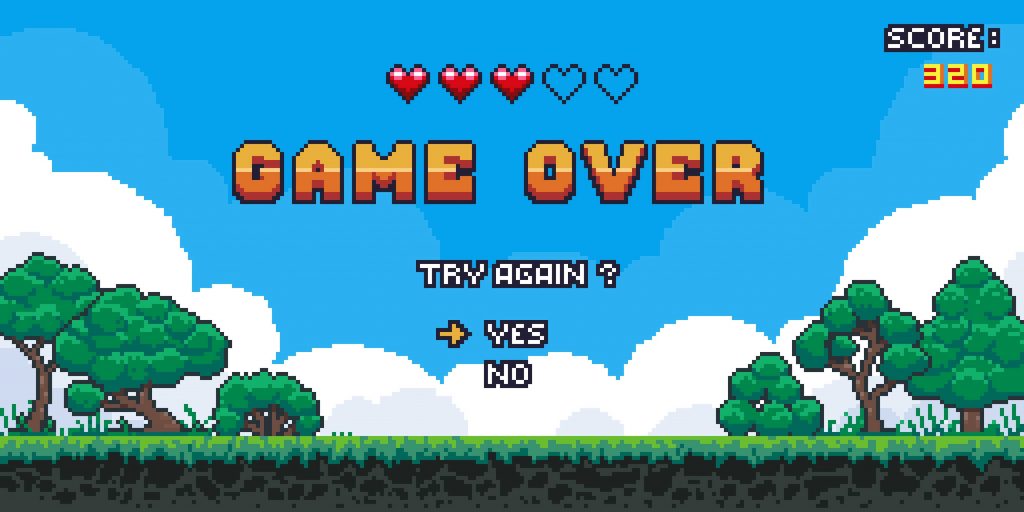
The information contained in this blog post should be taken as recommended advice or guidance but should not be taken as legal advice. If in any doubt, please seek proper legal advice. All images are downloaded from Adobe Stock library.
CRCC member Arianna Maiorani invited for residency at Texas Tech University
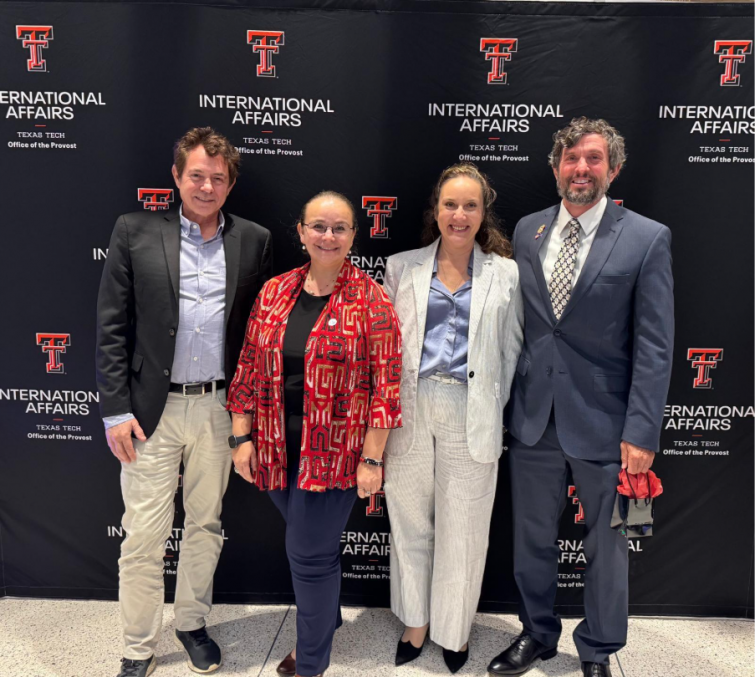
CRCC member Arianna Maiorani has been invited for a residency at Texas Tech University, USA, jointly funded by the College of Media and Communication and the College of Visual and Performing Arts and hosted by Professor Erik Bucy.
Lectures
During one week 1(8th-25th October), she lectured on her various research strands and projects to UG and PG students and staff of both colleges, she was invited to the Annual Fullbright Foundation celebration dinner, and she worked with Professor Bucy, already a Loughborough University IAS Fullbright Fellow and hosted by CRCC in 2024-2025 as Visiting Professor, on a new project focusing on movement-based communication in broadcast political events.
Academic partnership
Arianna Maiorani and Erik Bucy have already successfully presented their research at international conferences are currently working on a joint research grant application to the AHRC responsive mode: UKRI NSF-SBE lead agency scheme, which also involves Dr Nathan Ritchie and a strict collaboration between Loughborough University and Texas Tech University.
Research aims
The research aims at providing a novel and more comprehensive approach to the study of political and strategic communication, including an international and widely open data repository available to scholars of different fields, and will strengthen the already excellent relationship between the two universities.
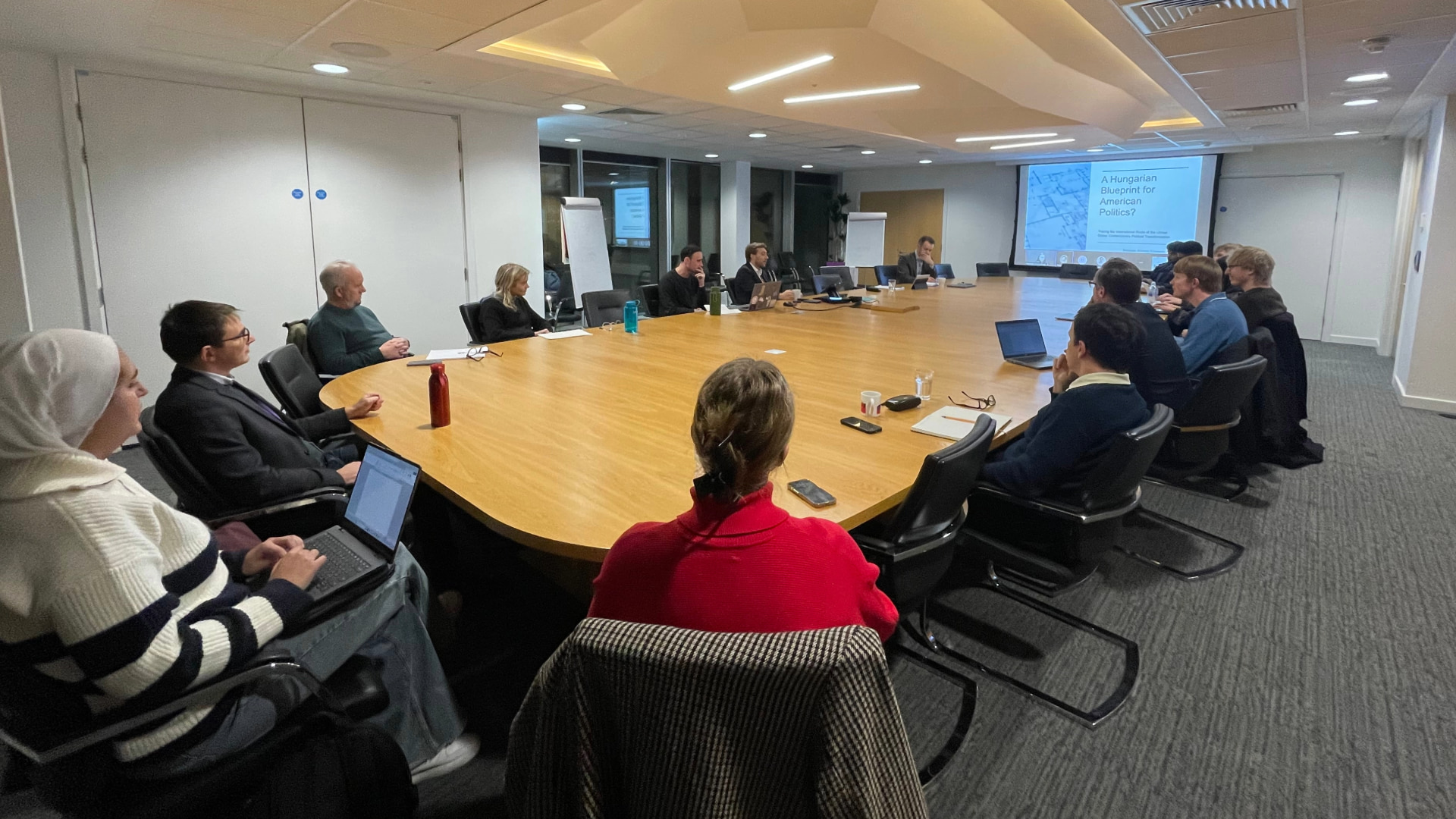
A Hungarian Blueprint for American Politics: Insights from Dr. Benjamin Abrams’s Lecture at IDIA.
By: K. Rashane Jude Pintoe,
MSc in Security, Peacebuilding and Diplomacy
The Institute of Diplomacy and International Affairs (IDIA) recently organised an illuminating lecture by Dr. Benjamin Abrams from UCL on ‘A Hungarian Blueprint for American Politics? Tracing the International Roots of the United States’ Contemporary Political Transformation’. The talk challenged the widespread assumption that democratic backsliding in Eastern Europe is simply a localised or post-communist phenomenon. Instead, Abrams argued that what occurred under President Viktor Orbán in Hungary – the deliberate dismantling and reconstruction of liberal democracy into an arguably “illiberal” regime – now stands as a transferable “blueprint” being exported to the United States before and during President Trump’s second term.
The Hungarian Model and Exporting the Blueprint
Abrams laid out how Orbán’s political machine seized the Hungarian state not in a sudden coup, but through a slow, comprehensive, five-pillar strategy targeting the Constitution, Judiciary, Elections, Media, and Economy. Leveraging a 2010 parliamentary super-majority, Orbán’s Fidesz party rewrote constitutional laws, restructured the courts, redesigned electoral rules, and built an economy and media system that suited the interests of a ruling elite connected to Fidesz. At the same time, the outward trappings of democracy, namely regular elections and constitutional procedures, were preserved, creating a veneer of legitimacy.
One telling anecdote stood out. Abrams described a recent election-watch party in Hungary, where attendees publicly cheered for Orbán, but their faces reportedly fell as soon as his victory was announced. This, Abrams suggested, reflects a deeper, often unspoken, social disillusionment behind the public display of support for Orbán in Hungary.
Reflecting on Trump’s chaotic first term, defined by disjointed attempts at power grabs, internal fractures (for instance, Vice President Pence’s breakaway), and ineffectual January 6 planning, Abrams argued that recent years have served as a “learning period” for US Conservatives. Through networks connecting Budapest and Washington, notably via gatherings such as CPAC Hungary, US Conservatives have carefully studied the Hungarian blueprint, cultivated ties with right-wing European elites, and rethought how to achieve long-term dominance more systematically. Hungary, therefore, is not simply a cautionary tale, but has become a training ground, a hub, even a symbol for the future of American Conservatism.
Weak Response, Fragmented Resistance
Abrams pointed to the relative impotence of mainstream democratic pushback and how this also mirrors what happened in Hungary. The US Democratic Party’s reaction to radical right-wing advances, he argued, remains largely symbolic with protests and moral condemnation but without any coherent strategic alternative. When asked how this can be resisted, he urged avoiding the piecemeal, uncoordinated efforts that characterised opposition in Hungary, and instead advocating a structured, long-term, unified civil society mobilisation.
When questioned about whether a strong pluralistic media and civil society might safeguard the US compared to post-communist Hungary, Abrams conceded that they have been sites of resistance. However, he also argued that Trump commands something Orbán did not – enormously wealthy and politically active oligarchs, individuals with the power of entire states behind them. He cited Elon Musk’s takeover of X (formerly Twitter) as one example, and noted with irony that even institutions like The Washington Post, once symbolically tied to the defence of democracy, now appear more sympathetic to Trump.
On a question about whether Trump and Orbán share not only domestic political strategies, but also a common worldview regarding the global order and global economy, Abrams argued that the real connective tissue between these leaders is what he called a “Nationalist International” – a transnational community of actors who, despite prioritising national interest at home, cooperate across borders on shared cultural and political goals.
According to Abrams, this emerging network allows right-wing leaders to exchange ideas, tactics, and ideological narratives, even if they disagree on foreign policy or economic strategy. In his view, this is what enables the Hungarian model to flow so effectively into American Conservative circles – not through formal alliances, but through a common ideological ecosystem capable of global coordination.
Reflection: Why the Left’s Drift Matters Too
Abrams’s warnings are vital for anyone seeking to understand contemporary international politics. I also believe that to understand why the Hungarian blueprint resonates with a growing constituency in the US, we must also look inward. Over the past decade, many centre-left and progressive parties globally have shifted markedly leftwards, whereby identity politics, aggressive social-justice agendas, and what many perceive as so-called ‘woke’ culture has taken centre stage. For a significant segment of the population, this drift has meant constant cultural upheaval, rapid change in social norms, and a sense that traditional identities or societal norms are being erased.
When this is added to frequent failures to deliver on economic security, border control, or cultural cohesion, it is unsurprising that right-wing and populist leaders succeed. They do so partly because they promise, rather simplistically, a return to order through secure borders, respect for traditional identity, and protection from what many feel is a runaway social agenda. To ignore this context, I believe, is to miss a core part of why illiberalism gains traction.
Therefore, as researchers, analysts, and defenders of liberal democracy, we must do more than simply castigate authoritarian models. We must also engage with the legitimate cultural, economic and social grievances that create fertile ground for radical change. Democratic decline does not arise from abstract ideology alone but also from real social tensions, unaddressed fears, and institutional failures on all sides of the political spectrum.
Abrams’s lecture is a timely reminder that democratic backsliding is no longer confined to specific regions or political contexts. The processes he described – the refinement of illiberal strategies, the cross-border exchange of tactics, and the emergence of what he terms a “nationalist international” – highlight the need for policymakers and scholars to better understand how political models now travel globally. For students of diplomacy, security, and international affairs, the discussion offered both a deeper theoretical grounding and a practical lens through which to analyse contemporary political transformations.
London Winter Break Guide 2026

December is a wonderful time to be in London! The city comes alive with lights, markets, winter festivals, and cultural events that everyone can enjoy. For many of our international students, the winter break is a chance to experience new traditions and explore the city at its most festive. Even if you don’t celebrate Christmas, it’s a great opportunity to immerse yourself in the British winter atmosphere and make the most of your time in the UK.
To help you plan your winter break we’ve put together a week-by-week guide filled with festive activities, free events, and seasonal experiences across London, perfect for discovering the city, spending time with friends, and creating your own winter memories.
London Christmas Markets:
There is a wide variety of Christmas markets across London that you can visit throughout the month. Most markets feature delicious food stalls, artisanal shops, and festive decorations, some even include rides and funfair attractions!
- Leicester Square Christmas Market: From November 1st to January 4th
- Trafalgar Square Christmas Market: From November 9 to January 2
- Christmas at Borough Market: From December 1 to December 24
- Southbank Centre Winter Market: From November 3 to January 4 – Free
- Hyde Park Winter Wonderland: From November 14 to January 1
- Wick Wonderland at Barge East – Every weekend from 6-21 December
First week of December: Monday 1st to Sunday 7th
- Festive breakfast and Xmas card decorating – Free event – 2nd and 4th December
London staff and students are coming together to create handmade Christmas cards for the children at Homerton Hospital. Everyone is welcome to drop in and get creative!
There will be two sessions: 2nd of December, from 10AM to11AM at Future Space and 4th of December, from 12:00PM to 2PM at the campus main reception area . No booking required
- Riverside East BIG Market – Free event – 6th December from 12PM – 6PM.
Discover small local businesses and traders at the Riverside East BIG Market, this is a great opportunity to support local vendors. Expect plenty of street food traders, a pop-up record shop, DJs all day, face painting, films and sports on a big screen and more. Discover what the Riverside East BIG Market has to offer.
Second week of December: Monday 8th to Sunday 14th
- Extraordinary Winter Jazz Showcase – Free event – 14th December from 5PM
This Extraordinary Winter Showcase is your chance to see the next generation of young jazz talent performing live. Visit the SouthBank Centre website to get the event details.
- Home Alone Screening, Vue Cinema Stratford – £6.99 – £7.49 – 13th of December
Watch the Christmas classic film Home Alone at Vue Cinema in Westfield Stratford! The cinema is just a few minutes’ walk from campus, making it a perfect festive outing; they are offering two screening times: 12:40PM or at 4:10PM. You may be eligible for a student discount, but please check directly with the venue. Book your tickets
Third week of December: Monday 15th to 21st Sunday
- Mix & Move: Winter Special – Free event – 19th December, from 3pm
Join Southbank Centre resident dancers Natasha Khamjani and Damien Anyasi for an extra special end-of-year dance with live music, this event will last around three hours. Visit the SouthBank Centre website to get the event details.
- Home Alone Screening, Odeon Cinema – £5 – from the 20th to 24TH December
Watch the Christmas classic film Home Alone at Vue Cinema in Westfield Stratford! The cinema is just a few minutes’ walk from campus, making it a perfect festive outing; you might also be eligible for a student discount, but please check directly with the venue. Book your tickets
Sustainability Blog Guide: Water
Welcome to the Loughborough University Sustainability Blog Guide – your go to guide to practical yet fun ways to live and work more sustainably. This blog series is part of Sustainability Week (10-14 November) and is designed to support both students and staff in making meaningful sustainable changes.

Water is one of our most precious resources, and every drop counts. At Loughborough, we’re committed to reducing water waste and helping everyone make small changes that add up to a big impact. Here are some practical tips for students and staff to keep water use in check.
For students
- Wait for a full load before running your washing machine or dishwasher. Half loads waste water and energy – combine laundry or share loads with housemates to make the most of every cycle.
- Don’t overfill your kettle: Boiling more water than you need uses extra energy and takes longer. Fill the kettle just enough for your cup or pot.
- Rinse fruit and vegetables in a bowl instead of under a running tap. Then reuse that water for houseplants or garden pots.
- Turn off the tap while brushing your teeth: A running tap can waste up to 6 litres per minute. Just wet your brush, turn off the tap, and save litres every day!
- Limit your shower time to 4 minutes: Quick showers save water and energy. Try timing yourself or use a playlist with short tracks to keep it fun!
For staff
- Fit an aerator to your tap: This simple device reduces water flow without affecting performance, saving litres every day.
- Apply for a free water meter from Severn Trent: Monitoring your usage helps identify waste and encourages mindful habits.
Try this
Bring your own bottle! There are plenty of refill taps across campus, so you can stay hydrated without single-use plastics.
Did you know?
Water and energy use are closely linked. Heating water takes energy, so saving water also reduces your carbon footprint. The average person in the UK uses around 150 litres of water every day.

Webinars and whatnots – November 2025
Upcoming:
Catch up:
- Ethical and legal guidelines in data sharing – from UK Data Service
Of interest:
Previous months’ Webinars and whatnots:
- October 2025
- September 2025- none
- August 2025
- July 2025
- June 2025
- May 2025 – Midlands Innovation Open Research Week 2025
- April 2025
- March 2025
- February 2025
- January 2025
- December 2024
- November 2024
Lessons from a London Derby: the UK is doing women's football right
We’re Céline and Sam, students of Diplomacy and Sport at The Institute for Diplomacy and International Affairs and we went to see Arsenal vs Chelsea at the Emirates Stadium on 8 November. We knew women’s football was growing in the UK, but nothing prepared us for the sight of 56,537 fans filling the stadium. For a sport that has for so long sat in the shadow of its men’s version, the sight felt like a quiet revolution in real time. The atmosphere struck us instantly. Families everywhere, countless young girls wearing shirts with their favourite players’ names, even a baby bouncing on the seat in front of us.
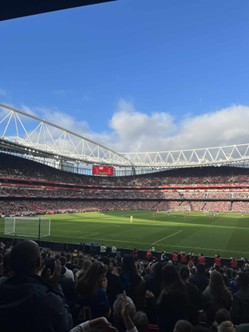
No tension, no aggression… just people who love the game. It reminded us that, at the end of the day, football is joy. It can shape your identity and give you a community, but it remains a game meant to bring people together. Next to us in the away end sat Nick, a proud Chelsea supporter who led chants throughout the match. We spoke briefly, and he told us that he comes to women’s games because he enjoys the atmosphere and men’s matches have become too expensive. It made sense: accessibility is part of this boom. Women’s football in the UK has become a space where fans feel welcome, families can afford to come, and the sport feels closer to its roots.
Céline’s take
Coming from Belgium, the contrast is stark. When I went to watch RSC Anderlecht Women, the ticket was free… yet the stadium was still far from full. Football back home remains deeply coded as masculine. The UK shows how quickly narratives can change when a country invests seriously in women’s football: financially, structurally, and culturally. The Lionesses are a powerful illustration of this dynamic: their success has encouraged more young girls to start playing football, which in turn has attracted more investment into the women’s game. Countries that fund girls’ football at grassroots level gain a long-term competitive advantage internationally. One detail stuck with me in the stadium toilets: free period products, laid out casually, like it was the most normal thing. Small gesture, huge message. It says women are not guests here, they belong.
I have followed women’s football in the UK for a while now. British clubs put effort into storytelling, marketing, and social media. Yet even in the UK, some details show how far equality still has to go. One example that always bothers me: social media naming. The men’s team is “Arsenal”, full stop. The women’s side becomes “Arsenal WFC”. Same for Chelsea: “Chelsea FC” vs “Chelsea FCW”. If one team needs a gender marker, shouldn’t the other? Otherwise, we keep reinforcing the idea that the default is male, and that women’s football sits in a secondary lane. Small choices in language reveal bigger cultural hierarchies.
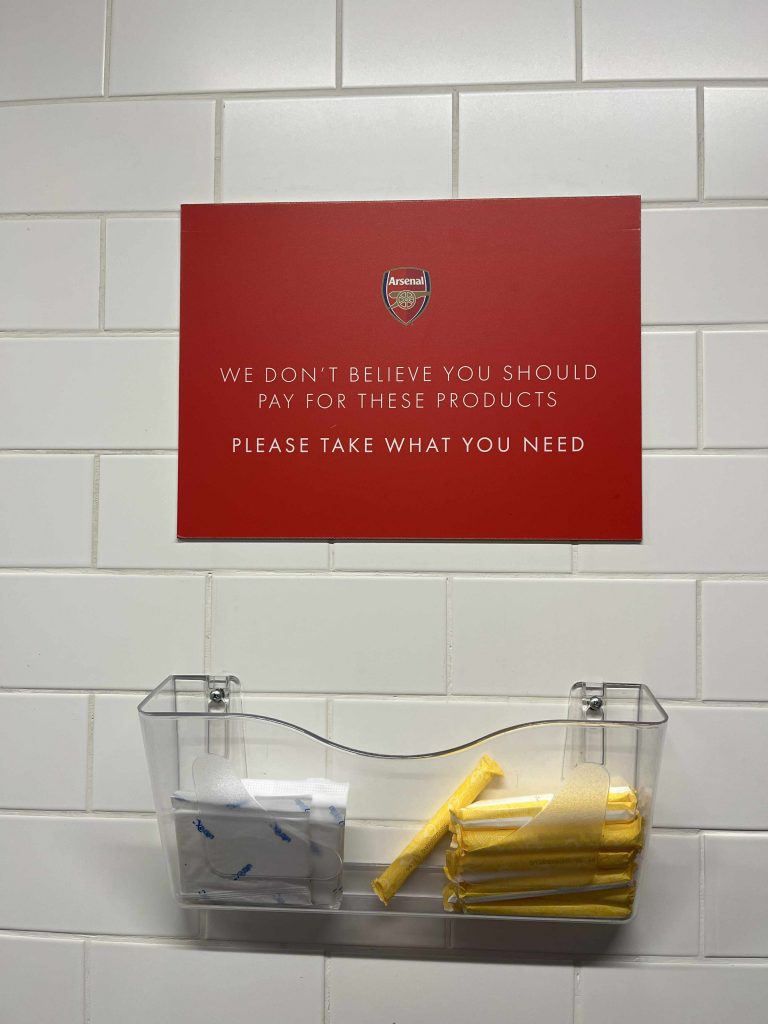
Sam’s perspective
Chelsea’s opening goal in this thrilling 1-1 draw at the Emirates was a brilliant chip from American starlet Alyssa Thompson. As an American and passionate US Women’s National Team (USWNT) supporter, this was my favourite moment of the match.
Back home in the United States, the women’s football landscape has always been unique – unlike most of the world, all National Women’s Soccer League (NWSL) franchises operate separately from men’s football clubs, making social media naming less of an issue and allowing modern, independent club identities to blossom. I’ve attended several Washington Spirit matches, all with sold-out, engaged crowds – Audi Field is nicknamed ‘Rowdy Audi’ for a reason.
However, the 20,000-seat capacity there felt nothing like the spectacle I saw at the Emirates. The NWSL is still the highest-rated women’s football league in the world, but none of its fixtures offer the tradition and crowd size a London derby brings. This, along with higher salaries, has lured American players across the ocean. – Saturday’s match featured three of them, with Arsenal’s Emily Fox defending against Chelsea forwards Catarina Macario and Thompson.
As the NWSL and WSL continue to compete for the world’s top talent against a backdrop of meteoric growth in women’s football, it will be fascinating to see how the next decade unfolds. Will “traditional” clubs in a country – the UK – with deep-rooted football culture be the most attractive model for fans and players? Or will it be original brands in the USA? It is also worth the NWSL’s league-wide player salary cap; while this is a staple of American sports leagues to promote competitive balance, it gives the WSL the upper hand in international transfer negotiations.
Conclusion
Walking out of the Emirates, buzzing from the noise and the joy inside, we felt genuinely hopeful. The U.K. has shown what is possible when women’s football is given space to grow. We are already planning to be at the return game at Stamford Bridge in January. Other countries now face a choice. They can wait for the sport to grow on its own, or they can invest, promote and celebrate it the way the UK has. If there is one conclusion to draw from 56,537 people in North London, it is this: the future of football is not male or female – it is whoever fills the stadium.
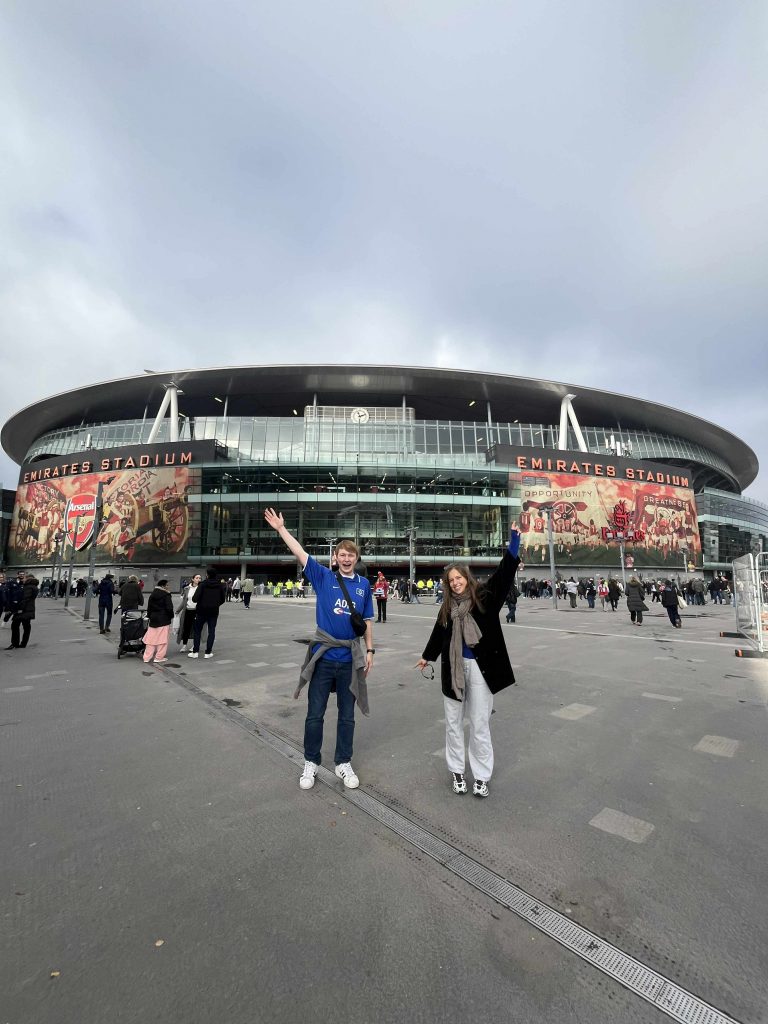
A big thank you to Céline and Sam for writing this blog!
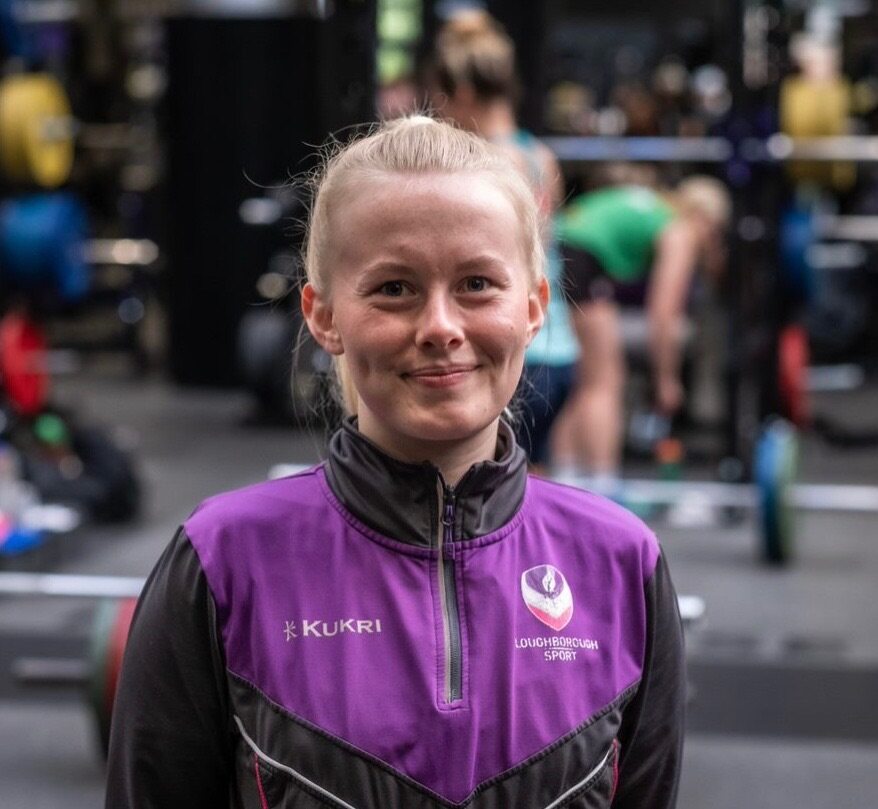
Five Minutes With: Bethan Crouse

What’s your job title and how long have you been at Loughborough?
I am one of the Performance Nutritionists for Loughborough Sport and have been at Loughborough Sport for 4 years – the first 2 as a placement student and now as a full time member of staff.
Tell us what a typical day in your job looks like?
Every day is a little different! I work across 3 sports – Athletics, Triathlon and Lightning Rugby – and also mentor some of our intern Nutritionists, I love the diversity this brings to my day. Right now, Lightning Rugby are coming towards the end of their pre-season period, so a lot of my attention is focused around prepping the squad to fuel their bodies for their first competitive matches of the season. This might be in 1-1 athlete meetings, quick education sessions on the gym floor, providing protein slushies (a personal favourite!) or planning when and where the girls will eat across a match day.
With Triathlon being a highly demanding sport from a nutrition point of view, I take a lot of time planning race timelines, practicing supplement protocols and calculating carbohydrate requirements to ensure all our athletes can execute an effective nutrition strategy on their race days. Although Athletics are in their quiet period at the moment, we’re starting the process of reviewing of the previous season and planning the next, so we know what went well and how we can do even better next year.
Besides this, some of the other parts of my role on a day to day can include arranging and reviewing blood tests, planning CPD for our interns or other departments, completing occasional interview requests, running tonnes of ice on and off pitch (weirdly very fun) and working with colleagues to integrate nutrition across all the support services.
What’s your favourite project you’ve worked on?
There are so many to choose from, but working on Project Momentum in Lightning Rugby has been an incredible learning journey and immensely fulfilling as a practitioner. At the start of the last season, we identified a need to increase muscle mass in some of our squad. As a group of staff, we put a huge amount of effort into make sure these players had access to the right nutrition, Strength and Conditioning, coaching, wellbeing and peer support to make this happen, and they have absolutely flourished as a result. I’m so proud of the planning and collaboration that went into this project, and how we were able to keep players happiness, wellbeing and sense of support at the centre, whilst objectively improving performance.
What is your proudest moment at Loughborough?
Watching Cassandre Beaugrand win Gold in the Triathlon at the Olympic Games last year was really special. Being an Olympians Nutritionist in the lead up to the Games was not something I ever saw on my career bucket list, and I think Loughborough might be the only environment to make that privilege happen so early on in my development. I am incredibly grateful to have so much support from my fellow Performance Nutritionists at Loughborough Sport, and to access so much wisdom from colleagues who have been through Olympic cycles before. It was nerve-racking to watch, but she pulled off an outstanding performance!
Which University value do you most resonate with and why?
Creative – one of my favourite parts of my role is the freedom to exercise creativity and think outside the box. Food and nutrition can be such a fun topic (I promise!) and I love being able to bring that to life for athletes. Coming up with engaging, performance-driven approaches to translate nutrition science into stuff athletes can actually do on a day-to-day never gets boring. I have been known to use a combination of coat hangers, jelly babies, paper cups and string to demo energy balance, and have sieved lumps out of 6 litres of protein hot chocolate on a VERY cold November training session.
Tell us something you do outside of work that we might not know about?
I am a country music obsessive…if it involves boots or stetsons I am there.
What is your favourite quote?
In the words of the great Dolly Parton – ‘We cannot direct the wind, but we can adjust the sails’
If you would like to feature in ‘5 Minutes With’, or you work with someone who you think would be great to include, please email Lilia Boukikova at L.Boukikova@lboro.ac.uk

More than facts: why understanding of multiplication matters.
Camilla Gilmore is a Professor of Mathematical Cognition in the Centre for Mathematical Cognition. Lucy Cragg is Professor of Developmental Psychology at the University of Nottingham. Natasha Guy is Research Assistant in the ESRC Centre for Early Mathematics Learning. This post summarises research conducted as part of the Skills Underlying Maths project funded by the ESRC.
What’s seven times nine? Quick, you’ve got six seconds to answer.
Learning to recall multiplication facts has always been part of mathematics in upper primary school. But over the last few years this has received more time and attention due to the multiplication tables check (MTC), a statutory assessment of multiplication fact recall.
The MTC was introduced in 2022 with the aim of driving up standards in mathematics. It’s an online test that children take on a tablet or computer, made up of 25 questions with six seconds per question. It’s therefore not surprising that in a survey of UK primary school parents we found that almost 90% reported that their children had been asked to practise multiplication tables at home.
Being able to quickly recall multiplication facts is valuable. Not having to think about seven times nine, just knowing that it’s 63, frees up a child’s mental thinking space. This means they can focus on different aspects of the mathematics they are doing, such as completing multi-step problems or using reasoning to solve context-based problems. Automaticity of multiplication facts also provides a foundation for more advanced mathematics topics that children will encounter at secondary school.
However, many have suggested that the MTC is unnecessary, and that it places too much emphasis on fact recall at a cost to other areas of mathematics. There are also concerns that it disadvantages some children for reasons such as digital accessibility. Nevertheless, the recent report of the Curriculum and Assessment Review (CAR), and the government’s response to it, make clear that the MTC is here to stay. So, what does research tell us about the MTC?
Assessing multiplication fact recall
Our research has investigated whether the MTC is a good way of testing children’s recall of multiplication facts. We found that children’s scores on a computer test equivalent to the MTC are strongly related (r = 0.8) to a more traditional paper-and-pencil timed fact test.
In our study, there was no evidence that any children were particularly disadvantaged by the computerised test. However, we did find that children’s attention skills and how quickly they could enter numbers into the tablet they were using did influence their scores. This suggests that, for it to be a fair test, it is important that children are familiar with the technology they are using to complete the test. Some children may have particular difficulties accessing the test and the CAR report rightly suggests that accessibility of the test should be explored.
Multiplication fact recall and multiplicative reasoning
The purpose of introducing the MTC was to improve children’s broader mathematics attainment by improving their multiplication fact recall. But performance in the Year 6 SATs tests, which assess a range of mathematical skills, shows little change and there is some evidence that MTC scores are not correlated with SATs outcomes. Of course, this may relate to the nature of the SATs tests as much as the nature of the MTC.
Our studies may suggest an important distinction between knowing multiplication facts and understanding how to use them. Multiplicative reasoning involves understanding and using relationships based on multiplication facts and applying this to solve problems. In our recent work, we found that children with good fact knowledge also did well on a test of multiplicative reasoning (r = 0.7). However, in a training study we found little association between improvements in fact recall and improvements in multiplicative reasoning (r = 0.2). This suggests that although the two skills are related, recalling multiplication facts doesn’t automatically help children to apply their knowledge. Working towards the multiplication tables check can support fact recall, but children will need extra support in knowing how to use and apply these facts.
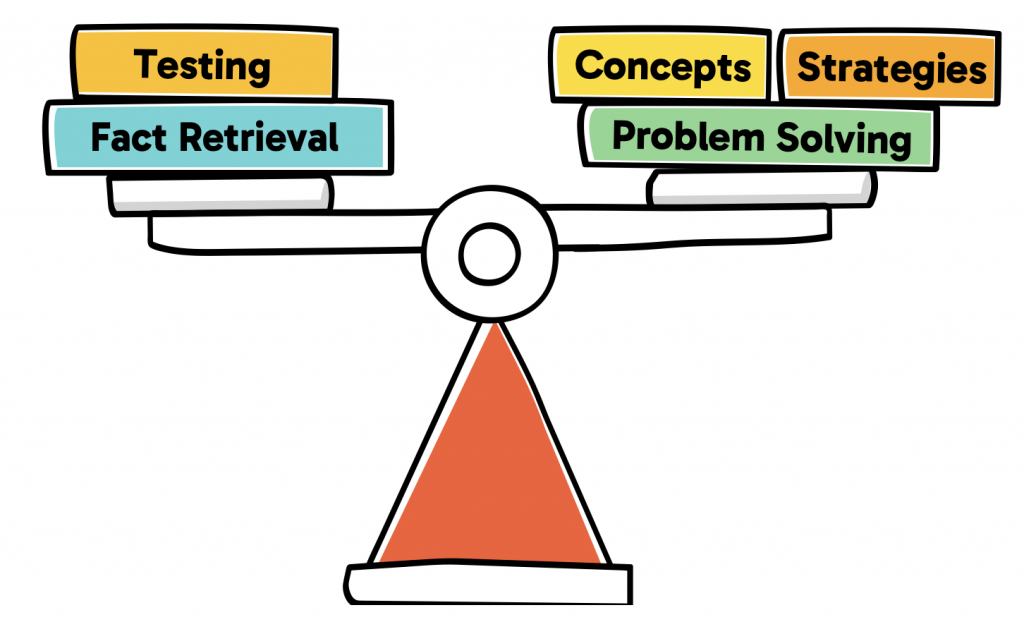
The CAR report suggests that the new curriculum should have an increased focus on multiplicative reasoning in Key Stage 2. An important aspect of this will be to help children link automaticity of facts with understanding of multiplicative structures.
Time pressure
The timed nature of the MTC is a particular concern to many. However, having a time limit per question – which is only possible with a computerised test – is essential to assess recall, rather than fast calculation.
Because the MTC is a timed test, teachers and parents may use similar time-pressured approaches to prepare children and help them improve their multiplication fact recall. But our research showed that while practice with a computerised game can support children’s fact recall, the benefits to learning are the same whether or not children are encouraged to answer as quickly as possible. This suggests that doing some regular multiplication fact retrieval practice is more important than the type of practice.
We did find that children who were anxious about mathematics learnt less when practising with time pressure compared to children without mathematics anxiety. Without time pressure, anxiety levels were not related to the amount of learning. Even though the MTC is a timed assessment, it doesn’t mean that children only need to do timed practice to prepare for this. Some children may benefit more from less time pressure when practising.
Multiplication fact recall is just one element of mathematics and so having a good balance is important. Fact recall and testing should go hand in hand with other areas of mathematics learning such as understanding concepts, choosing strategies and solving applied problems.
Find summaries of our research and infographics for teachers and parents on our website.
This article is republished from The Conversation under a Creative Commons license. The image was supplied by the University of Nottingham. Read the original article here.
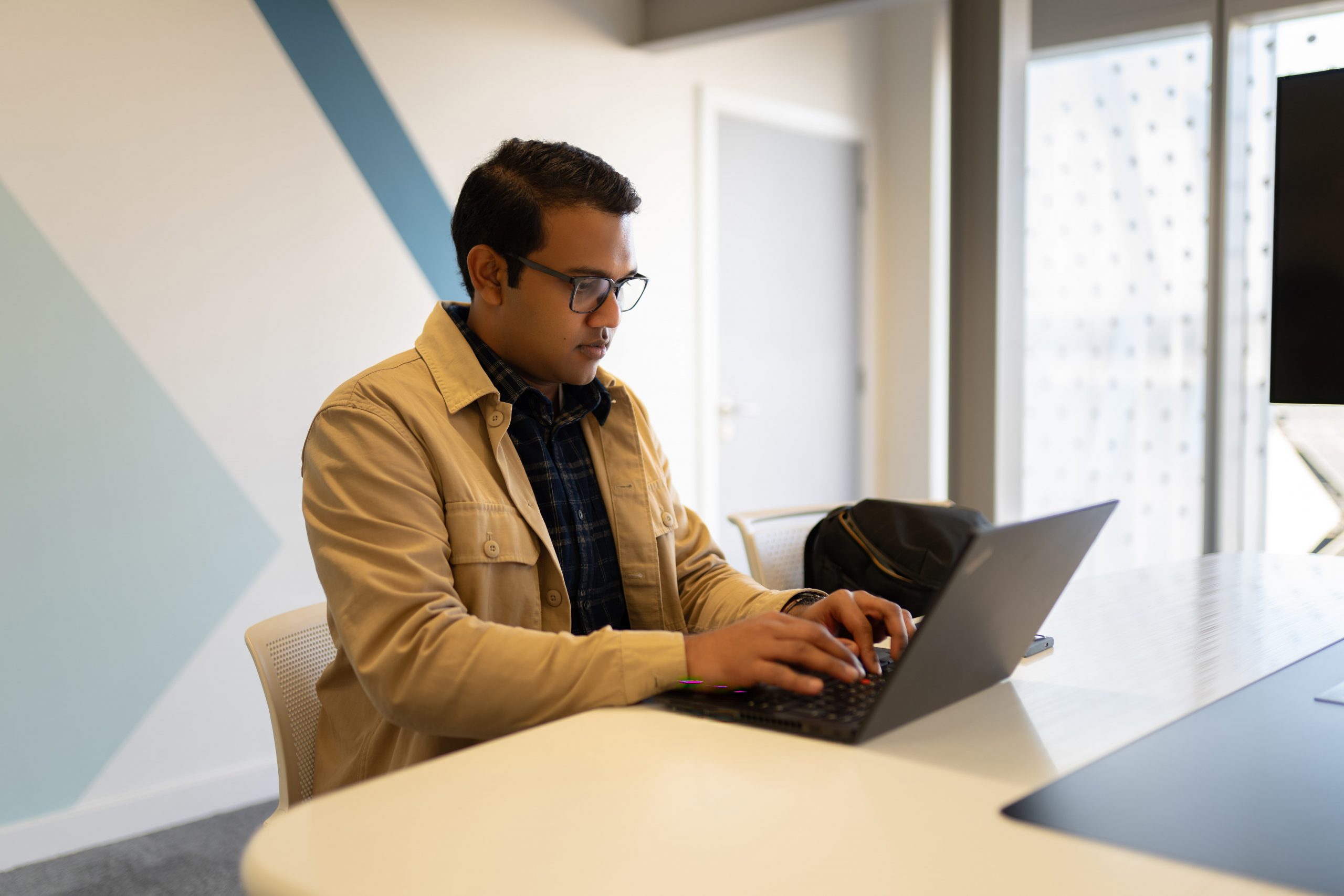
What should a strong body paragraph look like?
Have you ever received the below feedback in your academic work?
- Some of your paragraphs are too long or too short.
- You should analyse and evaluate the evidence rather than simply describing it.
- The focus of your paragraph needs to be clearer.
- You should connect the evidence to your claim.
- You need to provide more in-depth analysis.
If these comments sound familiar, you’re not alone!
Steps to improve your writing
One important step is to structure your body paragraphs appropriately. In academic writing, you’re encouraged to use the PEEL structure, which means Point, Evidence, Evaluation, and Link:
- Point: This is usually the topic sentence which comes first in a body paragraph and clearly gives the point of the paragraph. For example, in the topic sentence “Personalised feedback plays an important role in boosting students’ performance,” the reader expects the paragraph to provide evidence supporting this claim. In addition, remember to discuss only one main point in each paragraph.
- Evidence: Use different types of evidence, such as data, examples, and case studies, to substantiate your claim in the topic sentence.
- Evaluation: Show your own voice and judgment, which is usually your commentary on the evidence. You can do so, for example, by interpreting the evidence, discussing relevance and significance, and explaining its implications.
- Link: This can be a sentence that wraps up your paragraph or shows how it connects to the next one, or to the thesis/central argument of your paper.
Find out more about paragraph structure here.
Going Beyond the Basics
Based on the above, a body paragraph should contain at least four sentences. However, in order to make your claim strong and compelling, you need to go beyond the basics. Here are some suggestions:
Use topic sentences as argumentative pivots
This is especially useful when writing body paragraphs in a literature review or discussion section, where you need to provide evaluation, not just description. First, check whether your topic sentence sounds factual. If it does, you’re probably just stating information rather than making a point or argument. To introduce the main idea or argument of a paragraph, use verbs or phrases that indicate judgment, evaluation, or contrast. For example, you can use argumentative verbs like challenges, extends, highlights, or suggests.
Integrate synthesis when citing evidence
Synthesis refers to combining information from multiple sources to create a new, original argument or interpretation. You can demonstrate synthesis by showing similarities, differences, causal relationships, and more. Therefore, it’s important to use more than one source in each body paragraph and show how the sources are connected. Find out more about synthesis here.
To prepare for synthesis, you’re recommended to create research matrices when reading your sources. Find out more about research matrices here.
Include various textual features to highlight your evaluation
There are different ways to show nuances in your evaluation, or voice, and one of them is using hedges (e.g. could, would, likely, possibility, and appear to) or boosters (e.g. must, absolutely, definite, and certainty) to indicate your level of confidence. You can also use attitude markers, such as surprisingly, significant, critical, and desirable, to convey your evaluation or stance. In addition, by using a range of signposting language, such as however, therefore, and as a result, you’ll show how your ideas are linked.
Find out more about ways to show nuances in your evaluation here.
Demonstrate more critical voice
To show your critical voice, examine the evidence and ask yourself questions that start with why and how, as well as “so what” questions that push you to consider significance and implications. For example, when you write:
Smith (2025) found that students who engaged in one-to-one writing support sessions scored, on average, 15% higher than their peers who did not engage in such sessions.
You can ask: Why did one-to-one support lead to higher scores? How were the sessions structured to result in such a difference? Why is this result important for writing pedagogy research?
Find out more about showing critical voice here.
If you would like more support with paragraph structure, you can book a 1:1 meeting with Bess Chan, via email or the booking form
Book launch event: Tourism as Memory-Making: Russian Tourism in the Shadow of Empire, by Alena Pfoser
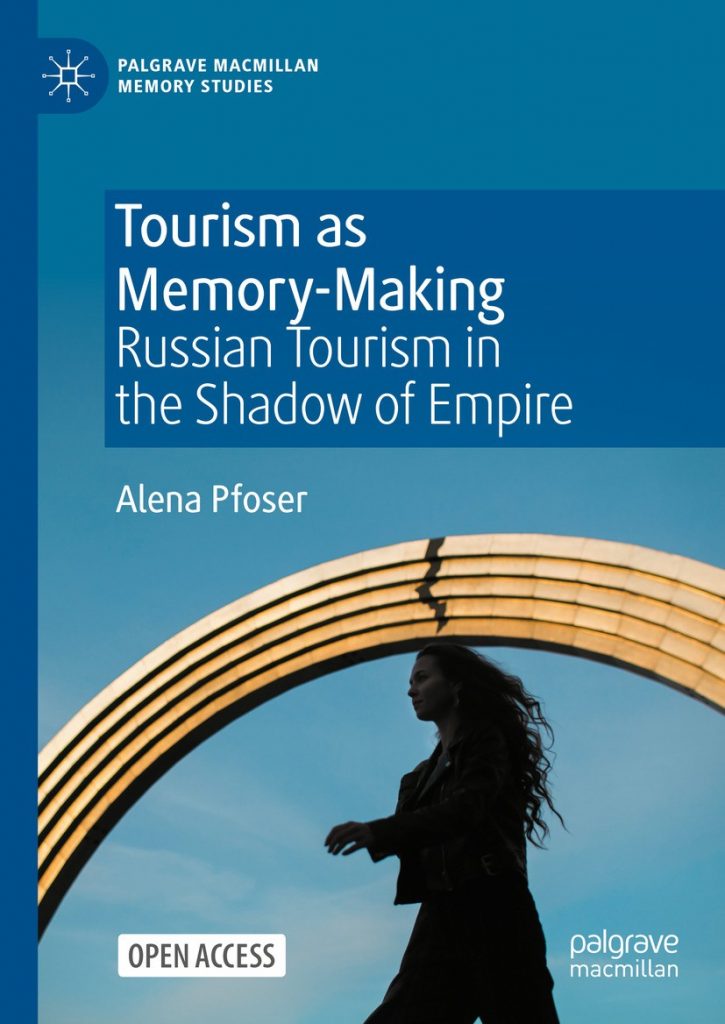
The CRCC will be hosting a book launch event on Wednesday 3rd December for member Alena Pfoser‘s recent publication: Tourism as Memory-Making: Russian Tourism in the Shadow of Empire.
Event details:
When: Wednesday December 3rd, 16.00-17.00
Where: U005 Brockington, Loughborough University, Loughborough, Epinal Way LE11 3TU and on Teams using the link below
This will be a hybrid event chaired by Professor Emily Keightley, Loughborough University. The author will be in conversation with Dr Jessica Rapson (King’s College London), a leading scholar of memory, commemoration and difficult heritage.
Refreshments will be provided.
Publication details:
This crucial new book puts forward a transnational approach that acknowledges diverse and entangled modes of remembering in tourism, situates memory-making in a wider political context, and reflects on its geopolitical implications.
Until recently the Russian Federation used to be one of the largest markets for outbound travel. Among Russians’ favourite destinations were cities that used to be part of the Russian Empire and the Soviet Union, and are now located in the independent nation-states bordering Russia. This open access book provides an empirically rich and conceptually sophisticated account of the mnemonic interactions between Russians and their neighbours in the shadow of empire and geopolitical confrontations. Based on extensive ethnographic research with tourists and tour guides in the cities of Tallinn, Kyiv, and Almaty before Russia’s full-scale war on Ukraine, it analyses the practices through which cultural memories are performed in tourism encounters, as well as the forms they take. Imperial nostalgia, the production and consumption of national pasts, and memory diplomacy are discussed as key modes of remembering in tourism.
Through the case of Russian tourism, the book argues for an invigoration of research on memory and tourism, which despite the significance of tourism for the circulation of cultural memories has so far received surprisingly little attention. Bringing debates in memory, heritage and tourism studies into a dialogue, the book expands the field of study beyond museums and heritage sites and puts forward a transnational approach that acknowledges diverse and entangled modes of remembering in tourism, situates memory-making in a wider political context and reflects on its geopolitical implications.
Microsoft Teams Need help?
Join the meeting now
Meeting ID: 331 981 054 005 16
Passcode: D4yd6Ei3
How I manage the wellbeing challenges of autism and ADHD
Graduate Management Trainee and Loughborough alumnus Lewis Jenkins talks about how his recent diagnosis of attention-deficit hyperactivity disorder (ADHD) and autism has reshaped his understanding of himself and his wellbeing.
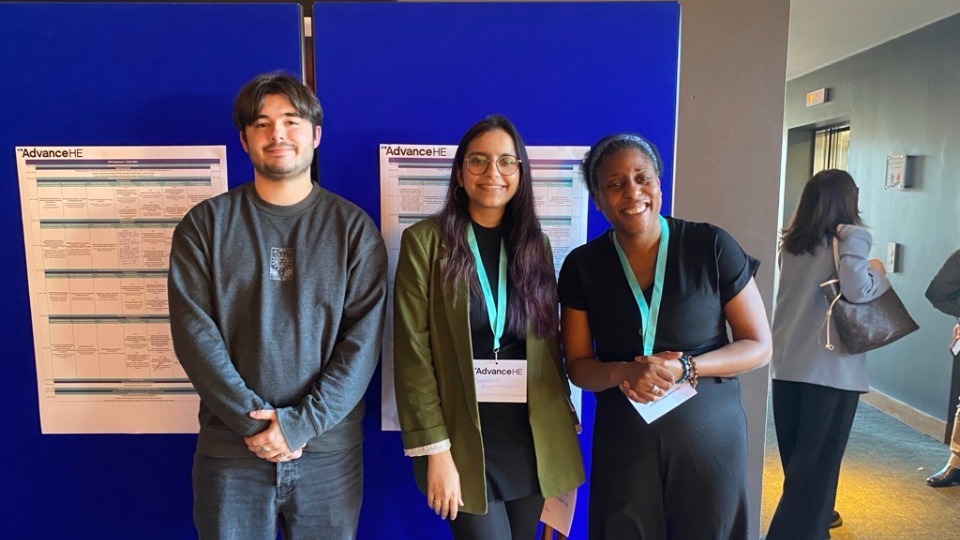
First, a quick disclaimer. In the UK, about 3-4% of the population has ADHD and about 1.5% are autistic. Neurodivergent people’s experiences are very different; we have our own unique interpretations of our conditions and require different kinds of support. My story is no exception and is only representative of my experience.
Having autism and ADHD is like living with two stubborn roommates with very different habits and needs. Autism will build a structured routine on Monday that ADHD dismantles by Thursday. Autism demands detail, but ADHD gets lost in the extra information. ADHD craves social interaction, but autism finds everything about it exhausting. ADHD will find a random embarrassing memory that autism will be ruminating over for weeks.
The tension between these two roommates leads to ‘task paralysis’: a subconscious numbness that freezes me in place, with my conscious mind fighting to break out of it. It’s like trying to drive a car that refuses to start – no matter how much I angrily twist the ignition key. If I get started at all, it’s sudden, I get overwhelmed and end up crashing spectacularly.
Until recently, I held all aspects of my life to a neurotypical model of success, trapping myself in a prison of internalised ableism. Autistic and ADHD people around me were punished for being ‘weird’ or ‘problematic’. I learnt to mask the traits they expressed that I wished to express, too. I wore the mask so much I never really stopped to take it off, leading to severe depression, dissociation and burnout.
Since my diagnosis, I’ve been slowly unwinding the decades of internalised ableism and subconscious masking to rediscover who I am. I’ve developed some ways to deal with the toughest moments and keep my wellbeing on track for as long as possible, some of which may be useful for you:
During the hardest moments:
- I’ll write a list of everything on my mind and how it makes me feel. Then I can pinpoint how all my busy thoughts are interacting, decluttering my mind.
- I’ll accept all the emotions that come with these thoughts and try to express them accordingly.
- I’ll use fidgets, pillows or a weighted blanket to expose myself to different sensory experiences and externalise my emotions safely.
- I listen to music, play musical instruments and write stories to help me relax and process complex feelings. A light walk with Racing Mount Pleasant is especially calming.
- I’ll practice deep breathing, with focus on longer out-breaths, acting as a ‘hard reset’ for my nervous system.
When I’m safe and stable:
- I’ll speak to family and friends for advice and support, in person if possible.
- I maintain a ‘rhythm’ of activity, as strict daily routines don’t work for me. Before starting chores, I might schedule a 30-minute timer before I begin.
- I’ll make one small change every week to gradually improve my health and sustainability. For example, I’ll swap snacks for healthy options, or go to bed 15 minutes earlier.
- When I sense myself getting overwhelmed, I practice grounding myself in the moment by remembering to stop, think and breathe.
- If I get any sudden urges, I’ll wait 24 hours. If I still have those same feelings, I’ll act on it sensibly – but usually I just forget about it!
Living in a neurotypical world with autism and ADHD is often disabling and unpredictable. But, without these conditions, I’d be without core aspects of my identity: my passion for learning, my empathy, and my relentless drive. My brain is built for sprints, not marathons.
Some people might call these conditions ‘superpowers’, but in my view, this ignores other ways a neurodivergent person may struggle. It also implies that we are only useful when a task suits our needs. We are capable of much more than our ‘superpowers’.
In an inclusive environment, it’s not someone’s disability that does amazing things, it’s the person, shaped by their experiences. With the right support, neurodivergent folk can help make the world into a more inclusive and empathy-led home for everyone.
Support available for University students and staff:
Students dealing with mental health challenges can find support from Student Services on their mental health and wellbeing webpage. You can also fill out the Health, Wellbeing and Disability Referral Form for a consultation with a member of the team.
Anyone can speak with a member of staff in the Chaplaincy for pastoral support. You do not need to be religious to access the Chaplaincy, though spiritual advice is available upon request. You can contact them on 01509 223741 or by emailing chaplaincy@lboro.ac.uk. In a crisis, you can call Samaritans on 116123 or text SHOUT to 85258 for anonymous support over the phone.
University staff can access the Employee Assistance Programme for wellbeing support. Health Assured offer a digital platform for those struggling with ADHD and autism. Access for this can be requested via their helpline or the Wisdom app. Lexxic or Genius Within offer additional support for neurodiverse people through their coaching services.
You can also book a consultation with Occupational Health if you have been or are currently seeking a diagnosis for autism, ADHD or other disabilities and health conditions by filling out this self-referral form. You can find more staff wellbeing resources on the Staff Wellbeing webpage.
Meet Your 2025/2026 IDIA Institute Representatives: Glory James and Nadeen Mohamed
The Institute of Diplomacy and International Affairs (IDIA) is delighted to introduce this year’s Institute Representatives; Glory James and Nadeen Mohamed passionate voices committed to ensuring that every IDIA student at Loughborough University London enjoys a truly engaging and unforgettable experience.
Glory James, studying for an MA in International Development, brings a strong background in community building, social impact, and events curation. She approaches leadership with empathy and a people-first mindset, centering her work on fostering belonging and creating spaces where others can thrive. In her words:
“I’m dedicated to making sure students are engaged and that valuable networking opportunities, the kind that can be leveraged long into the future, are established and sustained.”
Her leadership is guided by empathy, collaboration, and an unwavering commitment to ensuring that every student’s voice contributes to shaping a more inclusive and impactful Institute experience.

Nadeen Mohamed, studying for an MSc in Security, Peacebuilding and Diplomacy, brings a strong foundation in strategy, diplomacy, and advocacy to her role. She sees this position as an opportunity to bridge ideas, people, and possibilities. Her vision is to help IDIA students connect deeply with one another beyond the classroom. In her words:
“This role is more than representation; it’s about creating a space where every student feels empowered to thrive both academically and personally. We will make sure that your time here is filled with meaningful experiences, lasting friendships, and opportunities that open doors beyond the university.”
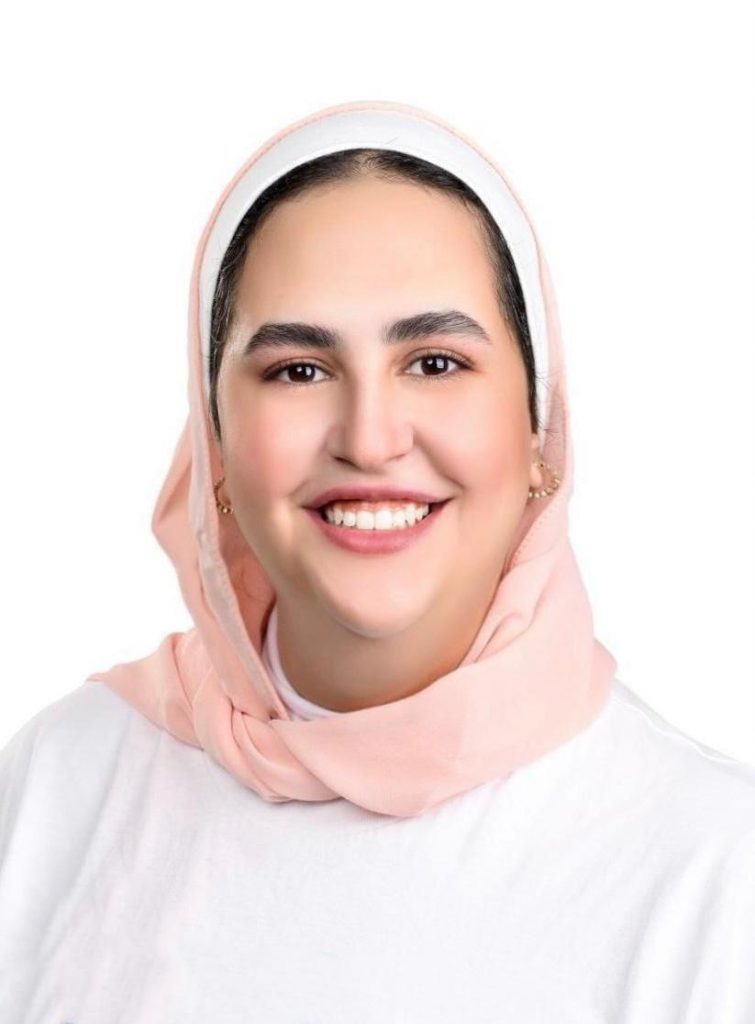
Guided by their shared framework of Collaboration, Inclusion, and Impact, Glory and Nadeen will work hand in hand to build a community of IDIA students, who feel a strong sense of belonging and commitment to the Loughborough vision.
Through educative events, thoughtfully curated gatherings, and interactive trips, they plan to create moments that spark learning, and lasting relationships, making sure that the Institute is not just a place to study, but a space to grow, and form meaningful alliances. They are excited and cannot wait to unfold the wonderful plans they have to move the Institute forward.
Written by Tim Oliver, Institute Director for The Institute of Diplomacy and International Affairs.
Sustainable Blog Guide: Waste and Recycling
Welcome to the Loughborough University Sustainability Blog Guide – your go to guide to practical yet fun ways to live and work more sustainably. This blog series is part of Sustainability Week (10-14 November) and is designed to support both students and staff in making meaningful sustainable changes.

One of the simplest and most effective ways you can be sustainable is through reducing, reusing and recycling. There’s something really satisfying about injecting new life into old waste, plus you’ll be saving money in the process of protecting the environment.
Reduce waste
- Buy loose groceries: whether at the local Loughborough market or in shops, choose loose groceries to cut out plastic waste.
- Use only what you need: avoid overusing cleaning or hygiene products and choose items with minimal packaging.
- Manage your utilities: switch off devices at the mains, close windows when the heating is on and only run water when you need it. These simple habits can reduce your bills and reduce environmental impact.
- Freeze leftovers: store any extra ingredients or cooked meals in reusable containers in the fridge or freezer. It’s an easy way to cut down food waste and save money.
- Donate: instead of throwing away clothes or household items, give them a second life by donating to charity shops.
Reuse and recycle:
- Check the labels: look for recycling symbols on packaging to find out what can be recycled and where it should go. A quick look helps keep waste out of landfills and makes recycling easier.
- Separate your waste: turn food waste into compost and separate your recycling into the right bins. Don’t forget to flatten boxes and bottles to save space in your bins.
- Save your scraps: stale bread makes great croutons, vegetable skins and bones can become tasty stock and old textiles are perfect for clothing repairs. With a little creativity, you can turn what you’d normally throw away into something useful!
- Look for refills: choose cleaning products that offer refillable options in sustainable packaging. It’s a simple way to make your hard plastic containers last longer and reduce waste.
- Don’t be fooled by single-use plastic: sometimes a quick clean is all it needs to be used again. Take care of undamaged items and reuse them where possible.
- Get it fixed: before buying new clothes, tech and furniture, see if it can be repaired. A quick sewing job or a simple battery change can give your items a whole new lease of life and save you money.
Try this
Instead of throwing away bottles, boxes and tins, think about ways you can repurpose them. Turn your cereal box into greeting cards, empty glass bottles into vases and baked beans tins into stationary storage! A little creativity goes a long way in reducing waste.

Walking Together Toward Belonging

Written by Ustadha Safra Razeek, Muslim Chaplain at Loughborough University.
It was a deep honour to be part of the launch of the Muslim Inclusion Report at Loughborough University, an important and timely piece of work that offers both reflection and challenge.
I want to begin by acknowledging the Al-Aziz Foundation, Dr Line, Ellie, Rafia, the participants, and the dedicated team behind this report. Their work has captured, with both clarity and care, the lived experiences of Muslim students, doctoral researchers, and staff at our university.
As the Muslim Chaplain at Loughborough, I have the privilege of journeying alongside many members of our Muslim community. I have witnessed not only their successes and contributions, but also their quiet struggles, moments of feeling both seen and unseen. This report gives voice to those experiences.
It tells the story of those who are part of a world-leading institution, yet who sometimes feel on the margins of its culture or policies. It speaks of students and staff who give their best — in research, in teaching, in leadership — all while navigating subtle exclusions, assumptions, or barriers.
This report is more than data and findings. It is a mirror held up to us as an institution. And, like any mirror, it invites not only reflection but action.
The message is clear: Muslim students and staff are not seeking special treatment, but equal belonging. They are asking for spaces that affirm their religious and academic identities. They are asking for systems that support their holistic wellbeing, from the classroom to the prayer room.
I’m encouraged that the University commissioned and publicly shared this report. That is a meaningful step. But what comes next matters even more. We now have an opportunity to reimagine inclusion, not just in statements or strategies, but in our daily practices, policies, and mindset.
Over the years, I’ve seen how small, intentional changes can have a significant impact. Providing suitable prayer spaces. Acknowledging Ramadan in scheduling. Equipping staff with greater faith literacy. These aren’t just logistical decisions, they are acts of respect that help students and staff feel that their whole selves are welcome here.
But beyond the practical, we must ask deeper questions:
- Are Muslim staff represented in leadership roles?
- Are the dietary needs of Muslims consistently met and clearly labelled?
- Do Muslim students feel safe to speak up in seminars or group work?
- Are Muslim perspectives reflected in our curriculum?
- Do our policies actively include their needs and realities?
These questions aren’t just for senior leadership. They are for all of us.
To the Muslim community: your voice matters. Your presence here is valued. You belong.
To colleagues across the University, let’s walk this journey together. Let’s not only listen, but act. Let’s not just aim to include, but to truly empower.
We are a university known for excellence, in sport, in innovation, in research. Let’s strive for that same excellence in how we foster belonging. When Muslim students and staff know their values are respected and their needs are considered, they don’t just survive here, they thrive. Not despite their identity, but because it is seen, embraced, and honoured.
May this report serve not as a conclusion, but a beginning, a catalyst for lasting, meaningful change.
Let’s move forward together with humility, with courage, and compassion.
To access further resources and support services, please visit the Equity, Diversity and Inclusion website.
Call for Papers – Counter-Research Symposium
King’s College London | 27th February 2026
Deadline for abstracts: Friday 21st November 2025
Keynote Speaker
Natalie Fenton, Professor of Media and Communications, Goldsmiths, University of London
NB: This is an in-person event to be held in London. Due to the sensitivity of the topics discussed, the symposium will not be recorded.
Symposium details:
The Counter-Research Symposium is a one-day event organised by CRIMSON (Counter Research in Media Studies Organized Network), a new cross-institutional research network that centres research on marginalised, precarious, contentious, and often silenced communities. It supports media scholars and activists undertaking politically and emotionally complex work in challenging environments, including closed authoritarian regimes, and whose research directly confronts state and institutional power.
The symposium will bring CRIMSON members together with invited participants to explore the meaning and stakes of counter-research in global media and communication studies – particularly in the context of rising right-wing populism and intensifying attacks on critical theories and DEI initiatives. It will also serve as a space for collective reflection on the methodological, ethical, and emotional challenges of conducting research that unsettles and confronts structures of the state, establishment, and academy.
Contributions:
We welcome contributions that engage with the concept of counter-research and examine its diverse dimensions – epistemological, methodological, and practical. We are especially interested in work that explores positionality and vulnerability in counter-research; interrogates the risks shared by researchers and participants and how these may be entangled; and work that complicates the very idea of the counter and considers how counter-research methods might unsettle conventional approaches to media and communication. We also invite contributions that propose new frameworks for sustaining such scholarship in precarious times, and that reflect on the role of institutions in promoting more inclusive and reflexive scholarly cultures.
We welcome papers related to any of the following topics:
• Researcher vulnerability in conflict-ridden contexts
• Researcher vulnerability in state-critical research
• Conducting research on authoritarian regimes (fieldwork challenges and strategies of resistance or workaround)
• Researching the ‘other’: ethics, representation, and power
• Researcher–participant relationships in counter-research contexts
• Intersections of gender, race, sexuality, class, coloniality, and caste in counterresearch
• How institutions (universities and beyond) respond—or fail to respond—to the challenges of counter-research
• Emotional labour, care, and precarity in counter-research
• Counter research as a contentious concept (thinking about who is claiming to produce counter discourse or research, why and for what ends)
Submission details
Please submit an abstract of no more than 250 words and a short biographical note (up to 100 words) to crimsonsymposium@gmail.com by Friday 21 November 2025. We encourage submissions from PhD students, Early Career Researchers, and scholars in precarious positions or from underrepresented backgrounds.
Key dates:
• 21st November 2025: Deadline for abstract submissions
• 19th December 2025: Notification of decisions
• 19th January 2026: Full programme released
• 27th February 2026: Symposium at King’s College London
Organising Committee:
Munira Cheema, King’s College Londo
Anna Khlusova, King’s College London
Yuval Katz, Loughborough University
Matthias De Bondt, KU Leuven
Woori Han, University of Exeter
Jiali Fan, University of Cambridge
Hong Yu Liu, University of Sussex
Book launch event: Cultural Policies in the Era of the Korean Wave by Taeyoung Kim
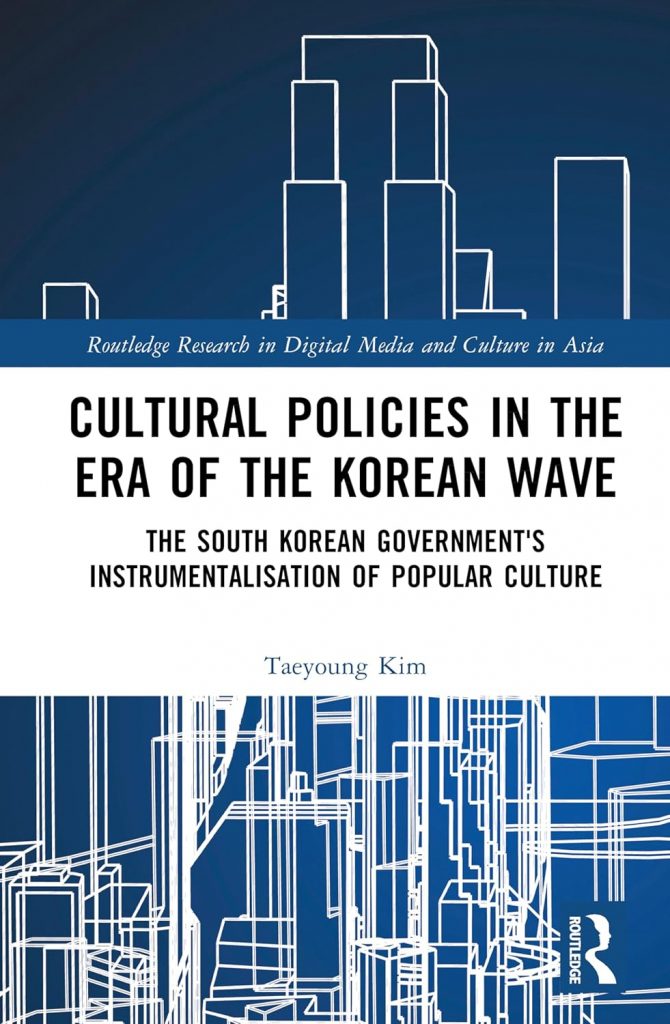
The CRCC will be hosting a book launch event on Wednesday 26th November for member Taeyoung Kim‘s recent publication: Cultural Policies in the Era of the Korean Wave: The South Korean Government’s Instrumentalisation of Popular Culture.
Event details:
When: Wednesday November 26th, 16.00-17.30
Where: U005 Brockington, Loughborough University, Loughborough, Epinal Way LE11 3TU and on Teams using the link below
This will be a hybrid event chaired by Dominic Wring, Professor of Political Communication, Loughborough University. The author will be in conversation with Hye-Kyung Lee, Professor of Cultural Policy at King’s College London.
Refreshments will be provided.
Publication details:
Published by Routledge, this timely and important book sheds light on how the South Korean state reappropriates the doctrines of neoliberal globalisation to serve its interests in instrumentalising culture.
Cultural Policies in the Era of the Korean Wave explores how the state instrumentalises cultural industries, despite the bulk of their production and delivery mechanisms becoming subject to the market logic and foreign stakeholders, through an in-depth study of the South Korean government’s cultural industry policies.
Drawing on interviews with policymakers and producers in the Korean film, music, and television industries, it investigates how the government’s policy schemes—ranging from funding programmes and public agencies established to promote cultural industries to the blacklisting of those opposing the administration’s political agendas—demonstrate the government’s strong desire to influence cultural production. The findings highlight how the state retains political power to instrumentalise cultural products, even as market forces shape production mechanisms and genre characteristics that have become increasingly transnational.
This book sheds new light on how the state approves and reappropriates the doctrines of neoliberal globalisation to serve its interests in instrumentalising culture, making it relevant for scholars and students in the areas of media and cultural policy, media and cultural industries, global media, and Asian studies.
Microsoft Teams
Join the meeting now
Meeting ID: 373 427 923 765 34
Passcode: DR9YY6eK

November Copyright Reads
November has brought with it darker evenings and rather wetter days and nights, at least in the UK. In the Romanian calendar, November is classed as brumar the big brother of brumărel which was October, meaning hoarfrost.

Image licensed from Adobe Stock
November tends to be the Christmas anticipation month. However, before all that Romanians celebrate two important days: 30th November is St Andrew’s Day which is a public holiday in Romania, as well as Scotland and Barbados. The 1st December is Romania’s National Day, which is a day of celebration for most Romanian’s, and is a Bank Holiday.

Autumn on Transylvanian hills, Romania, image licensed from Adobe Stock
This month’s reads are a combination of more AI news, sustainability news (Loughborough University is currently celebrating Sustainability Week with many events planned) but also regular copyright news from around the world.
Enjoy!
AI Competencies for Academic Library Workers
Why Right-Wing Outlets Attacked Wikipedia After Charlie Kirk’s Shooting
‘Opposing the inevitability of AI at universities is possible and necessary’
Are the European TDM Exceptions Applicable to GenAI Training? Despite the Three-Step Test?
Dog in Rembrandt’s ‘The Night Watch’ was copied from widely available book, suggests new research
Italy updates its copyright law to address AI
Japan ermahnt OpenAI wegen Urheberrechtsverstößen KI-generierter Anime-Videos [German article]
Wild honeybees now officially listed as endangered in the EU
Designing for people with limited English
Moka magic: how IP fuels your morning coffee ritual
AI and education: guidance for policy-makers
Damien Hirst’s 200-year plan: copyright’s uneasy role in the arts
Interlibrary loans, subscriptions and copyright in the UK academic library sector
‘Hallucinated’ cases are affecting lawyers’ careers – they need to be trained to use AI
Albanese Government to ensure Australia is prepared for future copyright challenges emerging from AI [Australian News]
Denmark Leads EU Push to Copyright Faces in Fight Against Deepfakes
Creative works can no longer be mined by AI without consent in Australia [Australia]
Social media sucks, but what’s the alternative?
In Grok we don’t trust: academics assess Elon Musk’s AI-powered encyclopedia
Copyright’s (extended) reality check: Challenges for copyright enforcement in virtual worlds
Navigating Uncertainty: Legal Risk Awareness and Management in European Museums
How AI exposes the moral hypocrisy of academic publishing
arXiv Changes Rules After Getting Spammed With AI-Generated ‘Research’ Papers
Getty Images v Stability AI: A landmark High Court ruling on AI, copyright, and trade marks
7 Common Copyright Pitfalls in GenAI Workflows
Universal Music went from suing an AI company to partnering with it. What will it mean for artists?
ChatGPT darf nicht ohne Weiteres Songtexte wiedergeben [Article in German about GEMAs win against OpenAI]
People thrive on good connections, so does wildlife
Munich AI ruling could reshape EU interpretation of copyright

Peles Castle, Sinaia, Prahova County, Romania: Famous Neo-Renaissance castle in autumn colours, at the base of the Carpathian Mountains, Europe, image licensed from Adobe Stock
We hope you enjoyed these reads and they have spurred some conversations in your teams. The images chosen for this blog post show Romania in autumn, but they are also tied in with Sustainability Week. If you have the possibility, why not go out in nature (when it stops raining) and enjoy the final moments of autumn.

Autumn Landscape of Fagaras Mountains, Carpathians, Romania, image licensed from Adobe Stock

Foreign Policy through English Eyes
What new polling reveals about the contrasting worldviews of voters in England and Scotland and their implications for the UK’s place in the world.
“England’s World: UK Foreign Policy in a Multi-Nation State” (2025), John Denham, Conor Gaughan and I explore whether “UK foreign policy” is an expression of England’s political dominance within the UK.
Although the UK presents itself internationally as a unitary state, it is a multi-nation union in which power and representation are unevenly distributed. England makes up over 80 per cent of the UK’s population and MPs.
With no separate English parliament, Westminster governs England directly, and through the Royal Prerogative the UK government controls most foreign and defence policy. Devolved governments in Scotland, Wales and Northern Ireland have little formal role.
This produces an Anglo-centric idea of Britain, in which England’s interests are often assumed to be those of the whole UK. Brexit made this starkly visible when England’s Leave majority took the UK out of the EU despite Remain votes in Scotland and Northern Ireland.
Our article begins by exploring how foreign policy issues become domestic political battlegrounds. This happens when foreign issues are seen to affect everyday life; when they connect with questions of national identity; when they divide the electorate; when they test government competence; and when political movements exploit them for electoral advantage.
Brexit met all five of these requirements. For many English voters, questions of sovereignty, immigration and economic control became the prism through which they viewed Britain’s relationship with the EU.
However, while a post-referendum vision of a “Global Britain” promised a confident, outward-looking nation, we found limited public enthusiasm for this idea. Polling in 2023 and 2024 in England and Scotland showed voters in both nations in favour of pragmatic cooperation, economic resilience and regulated trade over extremes of unilateral protectionism or deregulated globalisation.
Crucially, the data reveals three broad dimensions shaping public attitudes: sovereignty, Atlanticism, and the UK’s role in the world.
English respondents show stronger sovereigntist and Atlanticist leanings, meaning they favour national independence and close ties with the United States. Meanwhile Scottish respondents are more positive about cooperation with Europe and more sceptical about nuclear weapons.
Across both nations, the divide between Leave and Remain voters remains a powerful predictor of opinion. Former Leave voters support independence and economic nationalism, whereas Remainers lean towards multilateralism, climate leadership and humanitarian engagement.
We conclude that to understand UK foreign policy we must understand the UK’s internal politics. England’s structural and political dominance defines the UK’s global stance, even when its preferences diverge from those of Scotland, Wales or Northern Ireland.
Differences of opinion over Europe, nuclear weapons and climate change could open constitutional and political divisions. A foreign policy made “through English eyes” carries implications not only for Britain’s place in the world but also for the future cohesion of the Union itself.
The full article is: Denham, J., Gaughan, C., & Oliver, T. (2025). England’s World: UK Foreign Policy in a Multi-Nation State. Politics, 1–24, and can be read here.

From the Vice-Chancellor – October 2025

In my October newsletter: Reviewing the strategy, 10 years of Loughborough University London, Loughborough helps to unlock the region’s innovation potential, and marking Black History Month.

Reviewing the University strategy
In my July newsletter I updated you on the broad conclusions from our review of the University strategy, Creating Better Futures. Together, which we undertake each year to assess whether it remains relevant and appropriate.
From those discussions, three overarching priority areas emerged:
- To enhance the Loughborough Student Experience and maintain our leading UK ranking, to support our student recruitment
- To grow our research power for REF29, which will put us in the best possible place to undertake research at scale that delivers meaningful impact
- And to protect our sport USP (unique selling point) to raise Loughborough University’s global profile and give us a competitive edge over other institutions
Over the summer we have refined our thinking further and a short-to-medium-term delivery plan was approved by University Council earlier this month. The plan recognises that, due to changes in the higher education landscape, we have to be realistic about the resources we have available and focus our efforts on a smaller number of priorities to secure our financial sustainability and preserve our distinctive strengths.
The plans for our other strategic areas – Equity, Diversity and Inclusion (EDI), International Engagement and Impact, and Commercial and Partnerships – remain important and will be refocused to support the delivery of our three overarching priority areas.
Each of our Pro Vice-Chancellors has considered their priorities and outlined in short videos the areas that we’ll all need to focus on over the coming months and years.
Professor Sam Grogan is clear that our immediate Education and Student Experience priority is the National Student Survey (NSS). Our students’ feedback through the NSS helps to enhance the educational experience for current students, and the NSS results are a factor in many of the national league table rankings, which help us to attract future high-quality students. We need to redouble our efforts to renew our position as the best university for education and student experience. Watch Professor Sam Grogan’s short video.
Professor Dan Parsons’ Research and Innovation priorities are threefold: to focus on quality not quantity to support REF29 (Research Excellence Framework) and beyond, undertaking research and innovation that can have a major impact on the world’s societal challenges; to build a culture at the University that supports and enables staff to deliver that quality research; and to make it as easy as possible for others to partner with us in delivering our research and innovation. Our research and innovation underpins our global profile and plays a huge role in the financial stability of the University. Watch Professor Dan Parsons’ short video.
And similarly with sport. It’s our USP that differentiates us from other universities, helps to showcase Loughborough on the world stage and brings significant commercial potential. In her video, Professor Jo Maher, Pro Vice-Chancellor for Sport, says our priorities are to enhance our sporting ecosystem so that we remain a first-choice venue for athletes’ training and are able to offer both students and staff opportunities that enhance their Loughborough experience; to concentrate on developing our work in Women in Sport through the Research and Innovation Hub to accelerate growth and excellence in the women’s sport sector; and to enhance our Para and disability sport offering to improve accessibility and inclusivity for those who use our campus facilities and services and to support the research being undertaken through the Peter Harrison Centre. Watch Professor Jo Maher’s short video.
One of the other core elements of the delivery plan is an ambition to grow our undergraduate student numbers on the East Midlands campus and to increase the number of international postgraduate taught students on our London campus. Ensuring that we continue to recruit good numbers of high tariff students is crucial to the financial sustainability of the University.
We recognise that there are knock-on impacts from this, and so the Provost and Deputy Vice-Chancellor, Professor Rachel Thomson, and Chief Operating Officer, Richard Taylor, have developed a comprehensive set of actions to underpin this growth including new student accommodation, changes to bus, traffic and pedestrian flow, and extensions to learning and teaching facilities. As I said in July, the increased focus we have now agreed will enable us to concentrate on growing our income, maximising appropriate new opportunities as they arise, and making sure we’re operating as efficiently as we can. By working together to deliver these priorities, focusing our efforts and being sensible with both our time and resources, I am confident that we can face the future with optimism.
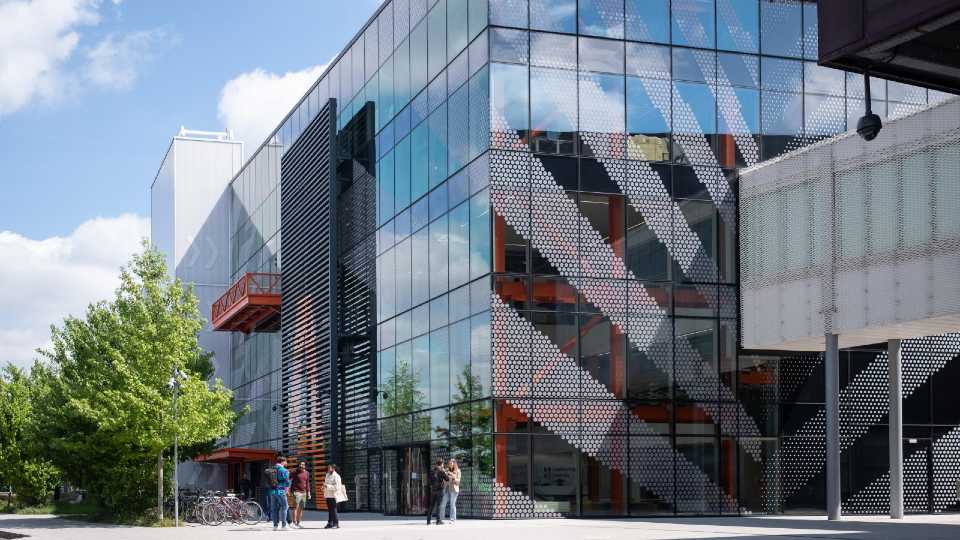
London campus celebrates 10th anniversary
This month marked the 10th anniversary since we opened our second campus on the Queen Elizabeth Olympic Park in London.
Throughout the last decade Loughborough University London has offered postgraduate study, pioneering research and cutting-edge innovation across its five institutes. It has graduated 5,600 students, secured £15m of research funding, invested £500,000 in scholarships for local people and community projects, and supported 160 small to medium enterprises through workshops and its micro-internships scheme.
We’ll be marking this important milestone for Loughborough University London throughout this academic year, starting with a panel event for our London alumni who are now working for global organisations including EY, Google, Sky Sports and the Bank of England.
The Park has changed a lot over the past decade; today it is a vibrant hub for innovation, sport and culture, with the V&A, Sadler’s Wells and the BBC among the iconic organisations that have sited new developments there alongside the world-class sports facilities that were central to much of the London 2012 Olympic and Paralympic Games. I’m proud that Loughborough University was at the forefront of the Park’s development.

New platform to unlock the Midlands’ innovation potential
Driving innovation is a key part of the Government’s growth strategy, and we have the potential to be central to its delivery.
The Midlands has a strong university knowledge base and is home to 11% of the UK’s high-growth companies. Yet despite its strengths, the region faces challenges in retaining and scaling its innovation. To fully realise the region’s potential, the Midlands must not only generate innovation but ensure it thrives locally.
This month we took a major step forward in unlocking the region’s innovation potential with the launch of the Midlands Ecosystem Platform, a digital gateway to the region’s £31bn innovation economy. The platform has been developed through a partnership between three Midlands Innovation-linked initiatives: Forging Ahead (a collaboration of 15 Midlands universities), the investment company Midlands Mindforge – with Loughborough a lead partner in both these initiatives – and the Invest in UK University R&D – Midlands campaign, which aims to promote the region’s strengths.
The new Midlands Ecosystem Platform brings together data on nearly 6,000 startups in the Midlands and connects users to science and tech campuses and over 1,000 active investors.
More than 600 Loughborough University-linked companies are listed on the site, covering industries from engineering to food technology. For instance, TransHumanity Ltd, a spin out from the University’s Transport AI Innovation Centre, helps transport authorities quickly analyse data to support congestion reduction and road safety. Dineticq has leveraged two decades of research in sports biomechanics to develop advanced motion analysis technology for cricket players and coaches worldwide. Spin-out Zayndu specialises in innovative seed priming technology that enhances crop yields without using agricultural chemicals. And Previsico’s flood forecasting and monitoring technologies enables organisations to prepare for, act upon and prevent flood impacts.
All the Loughborough-linked innovations on the new platform are outstanding examples of how we can transform our bright ideas and cutting-edge research into investment-ready spinouts that showcase not only the strengths of the University but also the wider Midlands region.
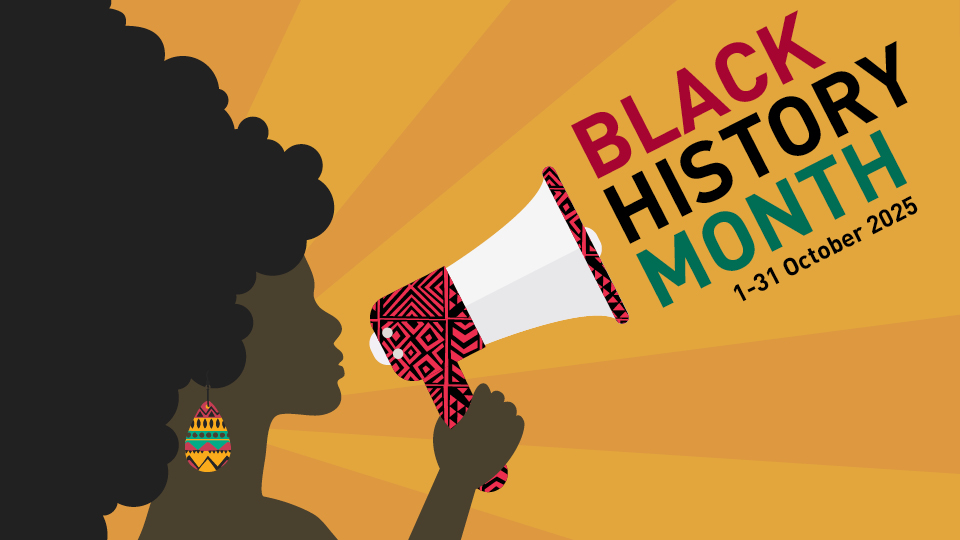
Marking Black History Month
Throughout October we’ve been marking Black History Month with a range of events and initiatives under this year’s theme of ‘Standing Firm in Power and Pride’.
Celebrating awareness events such as this is an important part of our ongoing strategic work on equity, diversity and inclusion (EDI). It enables us to improve our knowledge and understanding of the experiences, achievements and challenges faced by members of our communities and helps to drive positive change in our attitudes and behaviours.
As we move forward through the next phase of strategic development, EDI will continue to be an integral part of everything we do at the University, embedded within each of our strategic priorities of Education and Student Experience, Research and Innovation, and Sporting Excellence. Our vision remains for Loughborough University to become an anti-discriminatory organisation where everyone contributes to EDI.
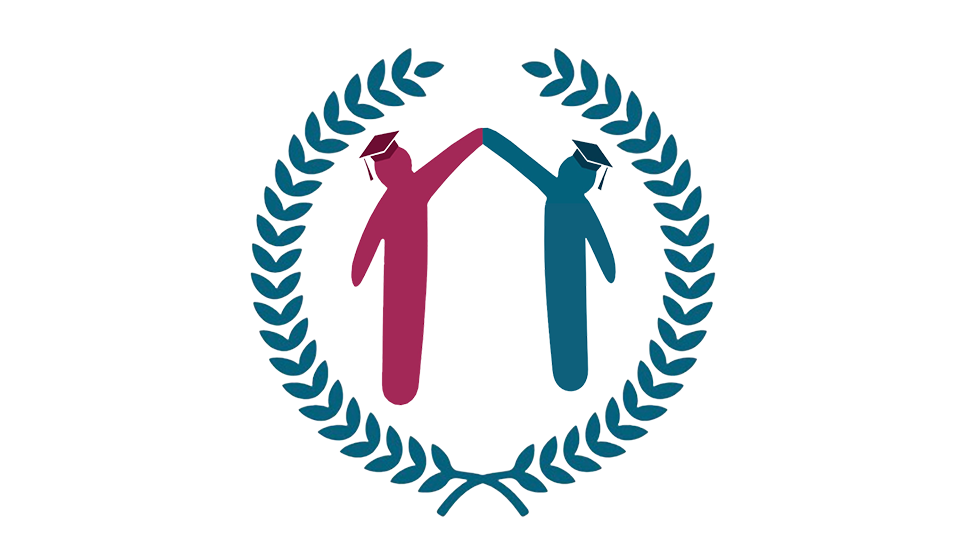
University of Sanctuary celebration
At the start of the month staff, students and members of the community gathered to celebrate our University of Sanctuary status, awarded earlier this year in recognition of our ongoing efforts in providing a welcoming environment for refugees and asylum seekers.
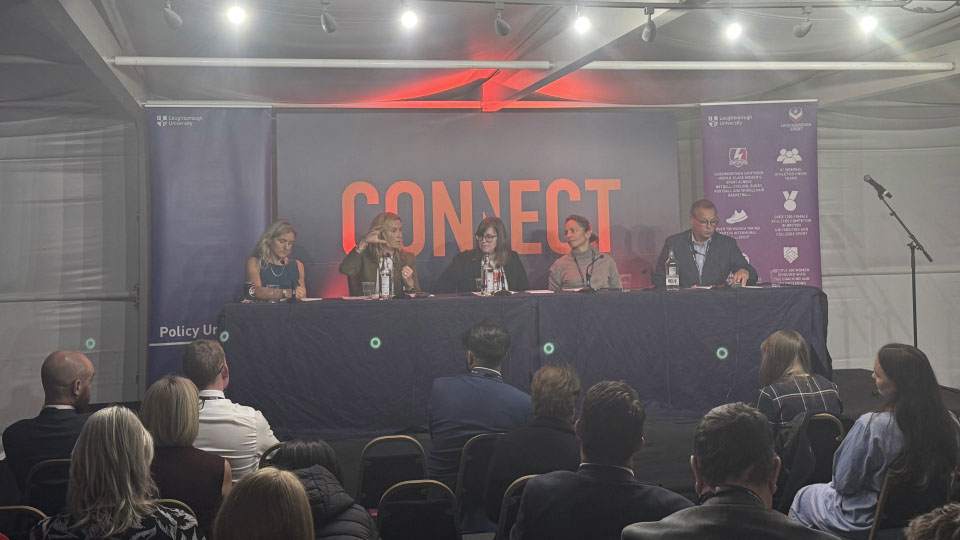
Loughborough at the Party Conferences
Loughborough’s research and innovation expertise was again showcased at this year’s Party Conferences. Party Conference season offers the chance to highlight research, shape policy discussions, build relationships across government and industry, and position ourselves as a delivery partner on national priorities such as growth, skills, innovation and net zero.
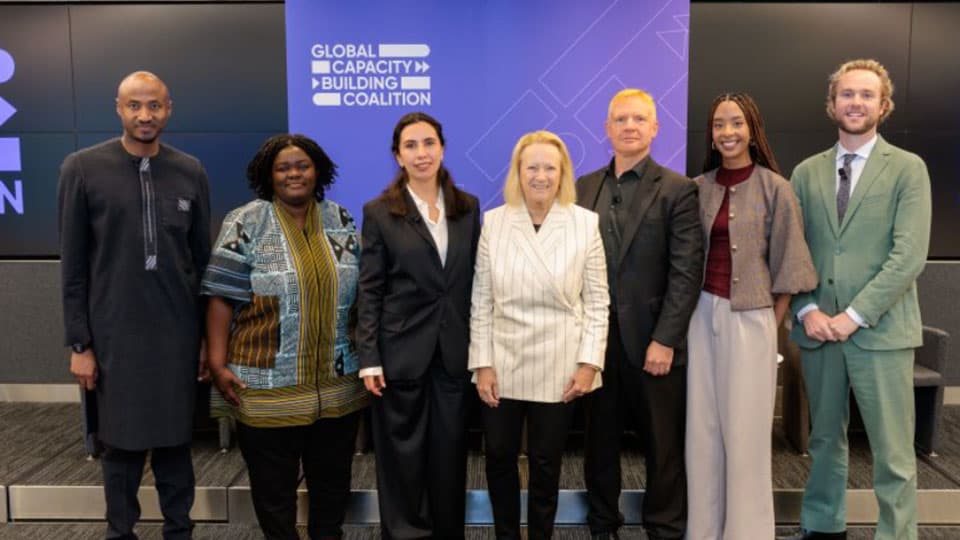
Prestigious global prize
The Foreign, Commonwealth and Development Office (FCDO)-funded project, Climate Compatible Growth, which is based at Loughborough, has been recognised with one of the inaugural Global Capacity Building Coalition (GCBC) Accelerator prizes at New York Climate Week.
Sustainability Blog Guide: Food choices
Welcome to the Loughborough University Sustainability Blog Guide – your go to guide to practical yet fun ways to live and work more sustainably. This blog series is part of Sustainability Week (10-14 November) and is designed to support both students and staff in making meaningful sustainable changes.

Our eating choices have a big impact on our ability to live sustainably. Mindful eating habits not only support sustainable living but also improve our health and foster positive habits in other areas of life.
Shopping tips
- Shop locally and seasonally: visit the local Loughborough market or look for food marked with a Red Tractor logo.
- Avoid plastic-wrapped food: choosing food without plastic packaging helps reduce waste and protect the environment.
- Buy organic where you can: reducing pesticide use helps protect ecosystems, soil health, and biodiversity.
- Make mindful swaps: many vegan alternatives like sauces, baked goods and desserts often taste just as good as their non-vegan counterparts.
- Check it’s certified: Look out for Fairtrade, RSPCA Assured and Marine Stewardship Council (MSC) logos on products.
- Rethink your weekly shop transport: walking or choosing delivery can cut emissions compared to driving. If you share a household, combine trips to reduce your carbon footprint even further.
- Collect your local takeaway: walk to your local takeaway for collection rather than getting it delivered, reducing carbon emissions. Bonus tip: reuse any plastic Tupperware for storage!
Alternative diets and habits
- Go vegetarian: avoid eating meat and fish products, which are significant contributors to greenhouse gas emissions.
- Go pescatarian: avoid eating meat products only so you can access a more sustainable source of high-quality protein with essential vitamins.
- Try veganism: avoid consuming any animal-derived products, which include meat, fish, dairy, eggs and honey. This has the additional benefit of limiting harm to animals and the environment from their non-meat produce.
- Be a flexitarian: going full-time vegetarian is not always possible, so try having days or weeks where you avoid eating meat, fish or animal-derived produce entirely.
- Use more plant-based protein: add beans, lentils, nuts, soya-based products and grains to your meals alongside or as a replacement for meat and fish.
- Meal prep lunches: replace daily meal deals and get in the habit of batch-making sandwiches, salads and other lunchtime meals to have on campus.
Try this
The next time you go to the shops, pay attention to how much plastic packaging and animal-based products you are buying. Then write a list of sustainable alternatives and slowly start switching what you buy.
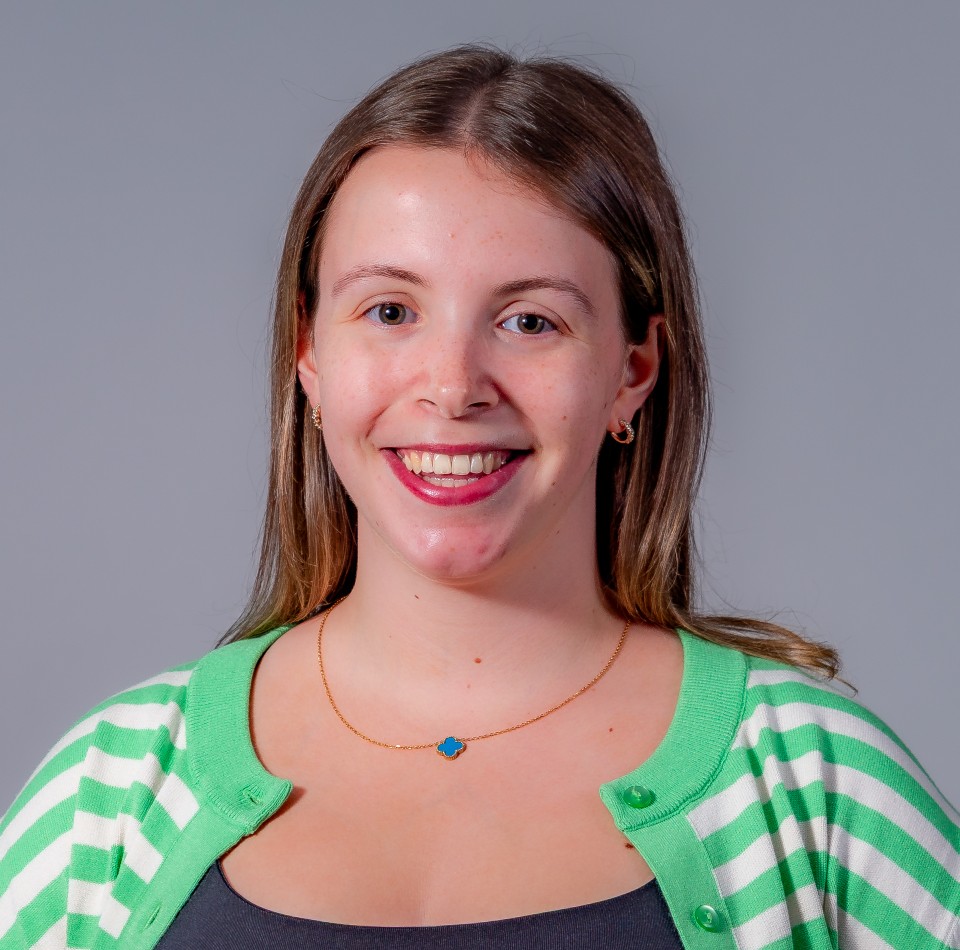
Five Minutes With: Mia Jackson

What’s your job title and how long have you been at Loughborough?
I have been in my role as LSU President since July 2025 and I joined Loughborough in October 2021 as an undergraduate. My degree was BSc Geography with Economics with a placement year and I graduated in the summer!
Tell us what a typical day in your job looks like?
No two days are the same, with a mix of training sessions and meetings involving departments across LSU and the University. Right now, much of our focus is on planning for the year ahead, especially Freshers Week in late September, which my team and I are really looking forward to! I also spend a large part of my day speaking with students and staff to stay in the loop with everything happening on campus.
What’s your favourite project you’ve worked on?
My Exec team and I are in the early stages of planning some events and projects which will hopefully be really exciting. This year is LSU’s 50th anniversary, so we are hoping to celebrate in style.
What is your proudest moment at Loughborough?
My proudest moment would probably be graduating in July or leading the Para & Disability Sport Exec to win Team of the Year at the 10th Anniversary CVA Awards.
Which University value do you most resonate with and why?
The value I resonate with most is adventurous. I’m always looking for ways to improve things, whether it’s an event or a process, and I’m not afraid to ask questions along the way. Working with new people motivates me, and I really enjoy seeing what can be achieved through collaborating with others.
Tell us something you do outside of work that we might not know about?
I summited Mount Kilimanjaro when I was 15, and I also play cricket for Loughborough Town CC.
What is your favourite quote?
I am a firm believer in “Everything happens for a reason”.
If you would like to feature in ‘5 Minutes With’, or you work with someone who you think would be great to include, please email Lilia Boukikova at L.Boukikova@lboro.ac.uk

Understanding and improving the lived experiences of Muslims at Loughborough University

Written by Line Nyhagen, Professor of Sociology, and Doctoral Researchers, Rafia Arshad and Ellie Moore.
Muslims are a distinctive minority at Loughborough University (LU)
In 2024, The Aziz Foundation, via its Muslim Friendly Universities Programme, issued a call for university-specific research on the experiences of British Muslims in higher education. At LU we had a knowledge gap when it came to understanding the lived experiences of Muslims on our two campuses. On responding to the call we were awarded funding by The Aziz Foundation with match-funding from LU, to gain evidence-based understanding of the experiences of Muslim students, doctoral researchers and staff, including barriers to participation, belonging and inclusion, existing faith-based provision and any unmet needs. The resulting research report is available here. Ongoing discussions are addressing several of the report’s recommendation, eg, in relation to LU’s halal food provision, the availability of prayer facilities, and university communication. A specific outcome is that LU has become a partner university in The Aziz Foundation’s Scholarship programme which awards Masters’ degree scholarships to British Muslim students.
Previous research suggests that ‘Muslims emerge as a distinctive minority’ in UK higher education institutions (HEIs) (Guest et al., 2020), as most Muslim students identify as religious and live an actively religious life expressed via collective and individual prayers, fasting, and dietary practises. Moreover, Universities UK recognises that Islamophobia and anti-Muslim hatred are widespread ‘and perhaps even normalised’ in the UK, including in HEIs, and encourages universities to tackle incidents of hate on the grounds of religion and belief (UUK 2021, pp. 2-3). The findings of our own study show that Muslims are also a distinctive minority at LU, with specific needs and challenges.
Our experience of the research from our own position
In her work as a sociologist of religion, gender and citizenship, and as a scholarly activist, Line seeks to understand social inequalities and promote social justice in ways that recognises people’s different identities and social locations. Her work also aims to identify structural barriers to equity, inclusion and belonging, as theorised by Black feminist thinkers such as U.S. sociologist Patricia Hill Collins. As a White, middle-class migrant woman who identifies as Humanist, Line acknowledges her own privileged position in academia and uses allyship to advocate for minoritised groups. These perspectives motivated her to engage in The Aziz Foundation’s call for research in ways that promoted a collaboration between Muslims and non-Muslims, and that sought to recognise, support and promote the voices and lived experiences of Muslims themselves. A key aspect of this collaboration was the Five Pillars: Lived Experiences, New Futures exhibition in Martin Hall (March-April 2025), which celebrated Muslim identities and Islamic culture at LU and regionally.
In her work, incorporating a socio-spatial lens, Ellie seeks to explore the intersection between society and space, focusing on how social, spatial, political and cultural structures shape social inequalities, power and culture. Primarily a sociologist, Ellie draws on theories from human geography and urban planning, informing her work on how sobriety impacts student experiences of belonging and academic citizenship within UK HEIs. Her work seeks to identify how normative social practices create barriers to belonging and inclusion. As a White, British-born citizen and trained sociologist, Ellie recognises that the disciplines in which she is trained have significant histories (continuing into the present) as tools of colonisation. She also acknowledges her positionality, the structures that afford her privilege in conducting her research and accessing resources. Her motivation for joining this project stemmed from a deepening awareness of the social injustices embedded in HE, and a commitment to contributing to work that sits at the intersection of inequality and inclusion, informed by hearing first-hand accounts from participants that reveal how systemic inequalities shape lived experience.
In her doctoral research, Rafia Arshad explores the experiences of diasporas and the ways their cultural traditions shape everyday life in societies different from their countries of origin. Her work focuses on how belonging, identity, and cultural continuity are negotiated across transnational contexts. Living for the first time in a non-Muslim country, she has personally reflected on questions of inclusion and representation. These reflections, along with the shared experiences of other Muslim students, inspired her to join this project to help improve Muslim students’ experiences and highlight the challenges they face in higher education.
Our personal biggest takeaways or learning points
Our research shows how intersections between religion, ethnicity, ‘race’ and gender play out in the everyday lived experiences of Muslims in higher education. Examples include how Muslim women may experience microaggressions if they are wearing a headscarf (hijab) and how Muslim men may be stereotyped as potential terrorists because they have a beard. These examples demonstrate what British Black sociologist and feminist Heidi Safia Mirza (2024) calls ‘embodied intersectionality’, where one’s bodily identity and practise is subjected to stereotyping, prejudice and structural violence from the majority society.
Our findings show how, for Muslim students and staff, perceptions of inclusion and belonging were often conditional and layered, shaped both by dominant socio-cultural norms and individual effort. Although most participants described LU as a welcoming and supportive university, our research suggests a surface-level of inclusion, rather than a deeper, sustained acceptance of inclusion at institutional and individual levels. Examples included being a ‘quiet and good Muslim’ as both expected and required to be met with ‘tolerance’ by the majority group. These insights align with what Islam, Lowe and Jones (2019, 94) coin as ‘satisfied settling’, defined as ‘a mechanism in which (Muslim) students have justified (unconsciously) not having access to a richer and more fulfilled university experience in relation to religious needs’.
Another key insight from our study is the contrast between Muslim students’ positive sense of inclusion on campus and the challenges they face beyond it, particularly in town or part-time work settings, where subtle racism and Islamophobia persist. This observation resonates with Zainuddin’s (2022) study, which found that Muslim students often experience greater barriers in social contexts than in academic life. These insights highlight how universities must extend their inclusion efforts beyond campus to address the wider realities shaping students’ everyday lives.
Moreover, the Martin Hall exhibition and our September 2025 report launch event were deeply inspiring, as such initiatives can create awareness and challenge misconceptions about Muslim students by offering open and inclusive spaces for dialogue. However, recruiting Muslim participants for the study was a challenge, demonstrating the need to build trust and provide safe spaces where students can speak openly.
To access further resources and support services, please visit the Equity, Diversity and Inclusion website.

In learning, AI must become a co-creator, not a shortcut
Co-authored by Professor Sam Grogan and Professor Nick Jennings
This article was originally published by Wonkhe in November 2025.
There are legitimate use-cases for AI that deliver efficiency, but for Nick Jennings and Sam Grogan the real prize is active development of AI learning partnership skills.
AI in all its multitudinous forms is here, it is here to stay, and its impacts are accelerating.
At a basic level, we see shifts in personal office practices with the tentative, steady adoption of large language models. We see AI being used alongside MS Teams or its equivalents to quickly produce summary transcripts of meetings or to generate starting places for documents which are then reworked.
As university educators and researchers, we also see debates regarding the ethics of AI adoption and a splintering ability of the collective and the individual to be able to discern fact from fiction. We are at the start of a long and unpredictable trajectory of impacts.
But, as we shape the skills, knowledge and abilities in our students that will see them thrive in an increasingly disrupted future world of work, where that track takes us is a subject of debate. What is consistently clear across various predictions is that the adoption of AI and increasing automation will deliver seismic changes to the world (of work).
Machine meets human
86 per cent of employers surveyed for the World Economic Forum’s 2025 Future of Jobs Survey saw AI and information processing technologies as being the dominant technology driver for workplace change through to 2030, affecting workplaces across all sectors, not just those welcoming students from STEM disciplines. Similarly, the same survey indicates the greatest rise in demand in the workplace through to 2030 is for the ability to work with AI and big data.
Noting the dominance of AI in the WEF survey findings, we are reminded of the 1998 interview between Jeremy Paxman and David Bowie, happening just as the internet was forming. Paxman queries the internet as being anything more than a “different delivery system,” while Bowie asserts that it is an alien life form:
“I don’t think we’ve even seen the tip of the iceberg – the things it will do, both good and bad are unimaginable right now. I actually think we’re on the cusp of something exhilarating and terrifying…”
Looking back at what has happened to society in the quarter of a century since that interview, Bowie is unnervingly accurate in his foresight.
It seems that right now we are navigating similarly uncharted territories of an epoch-defining transition as the world starts to play in earnest with the next gen version of Bowie’s “alien lifeform.” Higher education is not immune – it is grappling with the challenges across its core activities.
However, what is of particular interest beyond the specific AI skills is the other in-demand skills that occupy the places immediately following the top three noted above. Fourth is creative thinking, followed by resilience, flexibility and agility, curiosity and lifelong learning and leadership and social influence. These skills are high value cognitive competencies inherently human in their nature – an equalising “soft” counterbalance to the “hard” technological literacies of the top three.
Reflecting on the duality between technological literacy and social, emotional and cognitive skills in this overall picture, it is clear that AI is not a replacement for the work of thought, deduction, critical reasoning and curiosity. Instead, it is a powerful augmentation to the already formidable arsenal of technological capability at our fingertips.
From efficiency to co-creation
With education and the student experience in mind, we see two AI “swim lanes” forming out of the early stages of ubiquity ushered in by the popularisation of ChatGPT and other LLMs. These swim lanes should also acknowledge the broader mix of new and emergent technologies at play in tandem with AI – for instance AR/VR and data visualisation.
The first swim lane speaks to the need to optimise the complex wiring behind the institutional operations of higher education which provide our students with a world class experience. With efficiency, effectiveness and scale in mind, adoption of AI to underpin the crucial in-person experience with wider algorithmic personalisation becomes a highly desirable direction of travel. For instance, we can easily envisage a world in which AI is used to aid student navigation of module choice, tailoring the availability of elective courses and complementary extra-curricular and developmental activities.
The second swim lane is one of invention and co-creation, arguably pushing AI and the wider ecosystem of technological innovation to be the best it can be – far beyond the deployment of convenience or efficiency. At its best, AI can become a partner in creativity: an inspirer and a critical collaborator offering new perspectives. We are seeing promising points of innovation and departure in the early work at Loughborough as the range of technological capabilities within our DigiLabs continues to be adopted at pace.
However, to swim confidently in this lane we must dispel myths and fears with rigour and a critical navigation of AI as a co-creator. Scaffolding and skills development for staff and students are essential in order that we all might partner effectively with our new playmate.
Thinking together
Two points of skills development show themselves as a useful starting place towards consistency, innovation and collaboration in AI partnership. First, a good place to start would be recognition and development of prompt engineering as a fundamental digital skill and a shared structured practice. Second, it would be useful to focus on development of a consistent and structured means to better understand, interrogate and critically evaluate what the AI has generated in response to our prompting.
With frameworks for these two essentials of effective AI partnership in place, we can move beyond the cut-and-paste AI-as-shortcut, and beyond the simple fact checking of generated material. These two skills move us towards conversing and exchanging perspectives with AI, making content better together. The vantage point of having embedded these two AI partnership skills helps us then systematically inculcate the true value of AI by recognising the human skillset with which to strategically cocreate with it, rather than shortcut with it.
As our use of AI evolves, we should continually remind ourselves that understanding is not gained in the endpoint, but in travelling to that place (no student learns that much in the moment of a final assessment). AI becomes a meaningful companion on that journey, not a replacement for the experience of travelling. To shortcut the pleasure and frustration of our own creative and critical journeys by virtue of AI laziness is to deny ourselves the experience of our own essence – the struggle and the unknowing of what it means to question, to be alive and to be human.
Sustainability Blog Guide: Consumer Choices
Welcome to the Loughborough University Sustainability Blog Guide – your go to guide to practical yet fun ways to live and work more sustainably. This blog series is part of Sustainability Week (10-14 November) and is designed to support both students and staff in making meaningful sustainable changes.

As the seasons change and we head into a time of reflection and celebration, it’s worth taking a moment to think about the impact of our everyday purchases. Whether you’re a student or staff member, your consumer choices can shape a more sustainable future and save you money too.
Tips and to-do’s
- Find out your carbon footprint: Understanding your impact is the first step to reducing it. You can use the WWF Carbon Footprint Calculator.
- Buy only what you need: Consider the carbon cost of different products before purchasing. From production to packaging to transport, every product has a carbon cost.
- Choose local or UK-made products: This helps reduce emissions from long-distance transport and supports local businesses. The weekly Loughborough market is a great place to start!
- Keep your tech longer: Avoid upgrading phones and devices unnecessarily. You can extend the life of your devices by repairing, updating software and using protective cases.
- Avoid fast fashion: Use platforms like eBay, Vinted and Depop to find stylish second-hand clothes.
- Reuse, repair, upcycle: Give clothing, furniture, and household items a second life. Learn basic repair skills to reduce waste and save money.
- Shop second-hand: Loughborough has a great selection of charity shops worth exploring, offering clothes to kitchenware.
- Use Pilkington Library: Borrow books instead of buying new ones reduces paper waste and saves money. Loughborough University’s Pilkington Library has a wide range of resources for study and leisure reading.
- Go plastic-free: Choose products with minimal or no plastic packaging where possible. Re-fill shops and eco-friendly brands often offer better alternatives for household goods and toiletries.
Did you know?
Everything we buy has a carbon impact. The fashion industry is responsible for about 10% of global carbon emissions. By making more mindful choices, you can reduce your footprint and support a more sustainable economy.
Try this
Pick one item you were planning to buy new and try to find a second-hand alternative instead. You’ll likely notice a positive impact on both your wallet and the planet.

Top 10 Downloads in October 2025
The National Wind Tunnel Facility has five items in the Top10 downloads for this month (1, 2, 3, 4, and 8). Also in the Top10 is a thesis (see #6), a report (#7) and a book (#10) that was only added in June of this year. A journal article (#9) and a conference paper (#5) make up the set.

Can ChatGPT Catch Educational Neuromyths? What Teachers Should Know About Asking AI for Help
In this blog post, Professor Korbinian Moeller explores the double-edged sword of using large language models (LLMs) like ChatGPT in education. Drawing on recent research, this post discusses how these models outperform humans at identifying educational neuromyths (such as we only use 10% of our brain) when asked directly—but falter when such myths are implicitly included in everyday teaching questions. Professor Moeller outlines why this happens, what it means for educators, and how simple changes to your prompts can make LLMs much more reliable partners. Edited by Dr Joanne Eaves.
Introduction & Rationale
“We only use 10% of our brains”, “Kids learn better when receiving information in their preferred learning style.”
Statements like these might sound familiar to you, yet, they are wrong. But nevertheless, teachers around the world still believe and endorse them. Despite widespread efforts to debunk so-called educational neuromyths, many educators remain unaware that such ideas these have been repeatedly disproven by scientific evidence (Howard-Jones, 2014). With the rise of generative AI tools like ChatGPT, Gemini, and DeepSeek, you may hope that these help teachers avoid falling into such traps. Our research shows they can, but only if you ask the right way.
Why should educators care? Because neuromyths aren’t just trivia—they shape classroom practice, teacher training, and even educational policy. When teachers rely on generative AI systems that silently reinforce such misconceptions, endorsement of and believe in such neuromyths may actually increase rather than decrease. This post unpacks how generative AI deals with neuromyths, where it goes wrong, and how you can prompt them more effectively to get evidence-based answers.
Why We Did This Study
While decades of research have documented the global prevalence of neuromyths in education (Torrijos-Muelas et al., 2021), we wanted to know whether today’s generative AI can help reduce their endorsement. Recent research indicates that more than half of teachers now use generative AI tools in their practice, mostly to plan lessons, write feedback, or generate questions (e.g., Roy et al., 2024). When generative AI like ChatGPT could reliably spot and reject neuromyths in everyday queries, they might serve as a kind of “myth filter” in real time.
But here’s the catch: teachers rarely prompt generative AI in the way neuromyth endorsement is typically examined, this means by asking human participants whether a statement is true (e.g., “Individuals learn better when they receive information in their preferred learning style (e.g., auditory, visual, kinesthetic) – Correct – Incorrect – I do not know”). Instead, they may typically ask generative AI for help and thereby they often implicitly include misconceptions in the question itself. For example: “I want to support my visual learners. What resources do you recommend?”. This assumes that learning styles matter, a classic neuromyth. Would generative AI push back or rather go along with and thus endorse the respective neuromyth?
Method
We tested three generative AIs, ChatGPT, Gemini, and DeepSeek, on 20 known neuromyths. Each myth was prompted in four ways:
- Direct statement: Asking whether a neuromyth statement is true (see above)?
- User-like question: Realistic teaching questions including a neuromyth implicitly (see above).
- User-like question + evidence prompt: Same as 2. plus “base your answer on scientific evidence“.
- User-like question + correction prompt: Same as 3, but adding “correct any unsupported assumptions”.
Findings
- Generative AI outperformed humans when asked to evaluate neuromyth statements directly with their error rates (26–27%) only about half of those of humans (40–60%).
- Generative AI performed much worse when the same neuromyths were implicitly included in user-like teaching questions with error rates jumping to 51–66%.
- The fix? Prompting them to “correct unsupported assumptions” reduced error rates significantly, often outperforming even the direct neuromyth-checking approach.
Summary
When prompted with straightforward true-or-false questions, all three generative AIs were relatively accurate. However, they failed when neuromyths were included implicitly in genuine teaching requests. ChatGPT, for instance, often generated helpful-sounding answers based on the flawed premise (e.g., suggesting activities for “visual learners”).
But when we explicitly told generative AI to correct unsupported assumptions, their responses became more accurate and more cautious. Instead of validating the neuromyth, they even explained why the implicit assumption included in the question might be misleading.
Implications for those using AI
Educational Impact: 3 Key Takeaways
1. Large Language Models (LLMs) Reflect Your Questions—Not Just Facts
When your prompt implicitly contains a neuromyth, generative AI will try to be helpful and match your assumptions. This is known as sycophantic behaviour, aligning with the user’s beliefs rather than checking them. That’s a risk in education, where teachers might unintentionally embed false assumptions in their queries. As such generative AI tends to affirm users’ assumptions, even if those assumptions are based on discredited ideas.
2. Simple Prompt Tweaks Make a Big Difference
Just adding the instruction “correct unsupported assumptions” led to a significant drop in neuromyth-related errors. This tweak turned LLMs from myth-endorsers into myth-busters—more reliable than humans and even asking them directly if a statement is true or false. This means that asking LLMs to correct unsupported assumptions transformed their behaviour and improved accuracy beyond direct questioning.
3. Educator Awareness Is Key
LLMs are not fact-checking machines by default. They’re communication tools trained to predict the next best word, not necessarily the next true word. As educators, we must learn to use prompts wisely, especially when the stakes involve classroom practice or student learning outcomes.
Author bio
Korbinian Moeller is Professor for Mathematical Cognition at Loughborough University. His research interests include the neuro-cognitive underpinnings of mathematical cognition with a focus on how it develops and how we can facilitate mathematical learning using game-based and embodied approaches. In this context, he is especially interested in how neurocognitive science can inform evidence-based teaching practices.
Prof. Dr. Markus Spitzer is Head of the Cognition and digital Learning Department at the Institute of Psychology, Martin-Luther University Halle-Wittenberg, Germany (since 2023)
References
Dekker, S., Lee, N.C., Howard-Jones, P. and Jolles, J., 2012. Neuromyths in education: Prevalence and predictors of misconceptions among teachers. Frontiers in Psychology, 3:429.
Howard-Jones, P.A., 2014. Neuroscience and education: Myths and messages. Nature Reviews Neuroscience, 15(12), 817–824.
Macdonald, K., Germine, L., Anderson, A., Christodoulou, J. and McGrath, L.M., 2017. Dispelling the myth: Training in education or neuroscience decreases but does not eliminate beliefs in neuromyths. Frontiers in Psychology, 8:1314.
Torrijos-Muelas, M., González-Víllora, S. and Bodoque-Osma, A.R., 2021. The persistence of neuromyths in the educational settings: A systematic review. Frontiers in Psychology, 11:591923.
Roy, P., Poet, H., Staunton, R., Aston, K., & Thomas, D. (2024). ChatGPT in Lesson Preparation: A Teacher Choices Trial. Education Endowment Foundation, London, UK, 2024.
Disclaimer: ChatGPT was used to support the writing of this blogpost. For more information, contact j.eaves@lboro.ac.uk
Understanding how governments learn in crisis: new insights from Australia’s COVID-19 response
By Dr Neil Mortimer, Institute for Diplomacy and International Affairs, Loughborough University London
I am delighted to share that my first peer-reviewed article, Crisis Micro-Learning: A Framework for Understanding the Micro-Flow of Policy Learning and Australia’s COVID-19 Response, has been published in the Australian Journal of Public Administration (AJPA).
The article draws on my PhD at the Institute for Diplomacy and International Affairs (IDIA), where I examined how governments learn and adapt during times of crisis under the supervision of Professor Helen Drake, Dr Tim Oliver, and Dr Nicola Chelotti. The paper was co-authored with Dr Nicholas Bromfield from the University of New South Wales (UNSW), whose expertise in Australian public administration added valuable depth and perspective to the study.
Much of the research behind this paper was carried out during my Visiting Fellowship at the Australian National University (ANU) in Canberra. This opportunity was supported by Loughborough University’s Doctoral Researcher Support Fund, which helps doctoral researchers extend their training, build collaborations, and enhance their future career prospects. The fellowship allowed me to conduct extensive fieldwork, interviewing senior political decision-makers, civil servants, and expert advisers across Australia, including a former Prime Minister and Chief Medical Officer. These conversations offered a rare, first-hand view of how learning and decision-making took place within government during one of the most complex crises in recent history.
The COVID-19 pandemic required governments to make rapid, high-stakes decisions amid extraordinary uncertainty. My research asked a simple but revealing question: how do political leaders, officials, and experts actually learn in these moments? Drawing on more than fifty elite interviews, the study focuses on the micro-level of crisis learning, the small but critical interactions through which knowledge is exchanged, interpreted, and transformed inside government.
In the paper, we present a new framework called crisis micro-learning, which traces how learning evolves through three connected stages: context setting, learning needs, and learning practice. By following these stages, we show that early in the pandemic, learning in Australia was highly collaborative and adaptive. Expert advice flowed efficiently through institutions such as the Australian Health Protection Principal Committee (AHPPC) and the National Cabinet, enabling coordinated and timely action across federal and state levels.
Over time, however, these same structures that initially supported effective coordination began to limit flexibility. Decision-making became more politicised, and opportunities for adaptation narrowed. As the crisis evolved, certain forms of expertise were also sidelined, particularly those relating to children’s wellbeing, education, and mental health. This narrowing of advisory input meant that some societal impacts of the pandemic were not fully accounted for in real time. This pattern, known as path dependency, occurs when systems find it difficult to adjust even as new information becomes available. The finding serves as a reminder that learning mechanisms must remain open, inclusive, and adaptable if governments are to sustain responsiveness during prolonged crises.
Beyond the Australian case, my PhD also examined how similar processes unfolded in the United Kingdom’s COVID-19 response, revealing contrasting modes of learning and the different ways expertise was used within government. I am now developing this part of the research into a companion article that will extend the comparative analysis and deepen our understanding of how learning operates in different political contexts.
The full article is open access and available to read online, supported by the University’s commitment to facilitating open access research.
Read the article here – https://onlinelibrary.wiley.com/doi/full/10.1111/1467-8500.70025
Sustainability Blog Guide: Heating and powering your home
Welcome to the Loughborough University Sustainability Blog Guide – your go to guide to practical yet fun ways to live and work more sustainably. This blog series is part of Sustainability Week (10-14 November) and is designed to support both students and staff in making meaningful changes that align with the themes of the University’s Partnership Guide.

As the colder months settle in, it’s the perfect time to rethink how you are heating and powering your homes, not just for comfort, but for sustainability. Whether you’re living in halls, renting privately, or managing a household, small changes can make a big difference to your energy use, carbon footprint and your bills.
Heating tips
- Switch off when you leave: Make it a habit to turn off your heating when you’re not at home, especially when you are leaving for longer periods over the Christmas holidays.
- Avoid overheating: Keep your thermostat at a reasonable temperature and wear extra layers if needed.
- Insulate: Adding insulation helps retain warmth and reduce energy use.
- Timers and thermostats: Use them to control when and how your heating runs – no need to heat empty rooms!
- Dress for the season: Sometimes, a jumper or blanket is more sustainable than turning up the heating.
- Use natural cooling: In warmer months, close curtains and blinds to block heat, and open windows and doors instead of relying on fans or air conditioning.
Powering tips
- Repair don’t replace: Fix appliances when possible, and check energy efficiency ratings before buying new ones.
- Ask first: If you’re renting, check with your landlord or accommodation manager before making any changes.
- Be tech-aware: AI and cloud-based tools have a hidden carbon cost – use digital tools mindfully.
- Switch off: Unplug devices when not in use and turn off lights and monitors when leaving a room.
- Choose wisely: Look into your energy provider’s sustainability credentials – switching could make a big impact.
- Smart meters: These help you track your energy use in real time and spot areas to cut back.
- LED lighting: Replace old bulbs with energy-efficient LEDs to save power and money.
Try this
Unplug three devices in your home that usually stay on standby (like your TV, microwave, or gaming console). Track your energy usage with a smart meter and see what difference it makes over a week. You might be surprised!
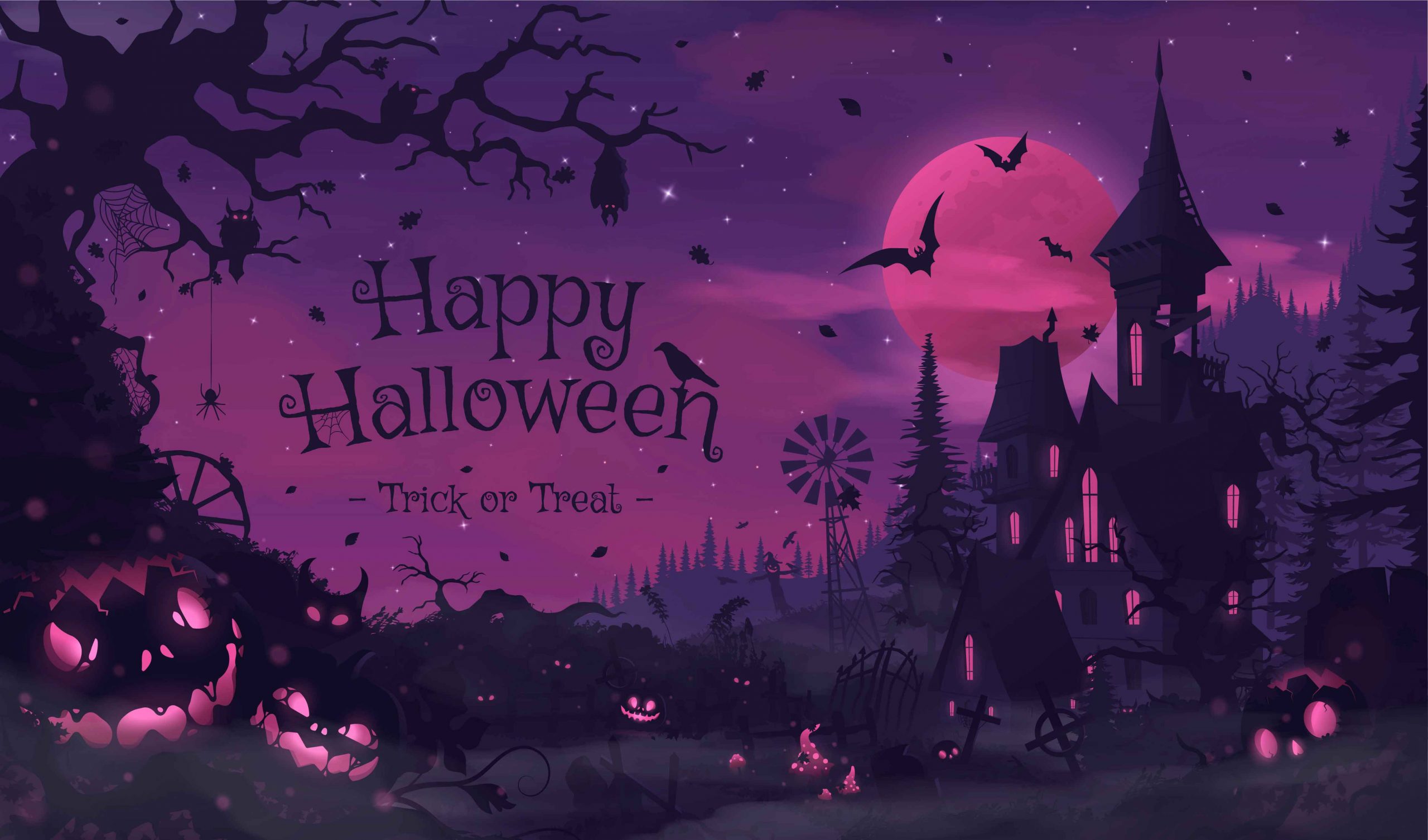
The Legends of Creepy Copyright: A Short Story by our Resident Ghoul, Sam Hain

The ghoul, Sam Hain. Image created with Adobe Firefly
Happy Halloween all you ghosts and ghouls, vampires, witches and goblins! It is that time of year were pumpkins are carved, houses become haunted, and many a goblin, witch and vampire roam the streets at dusk for mischief making.
However, this is a copyright blog, and I am sure you guessed it by now, we will look at how copyright and other IP intersects with the night of Halloween.
Halloween: A short, gruesome history
Did you know that Halloween is not an American invention but rather it originated in the British Isles more than 2,000 years ago? The celebration is believed to have its origins in the festival of Samhain among the Celts. The Celts believed that the veil between the natural and supernatural world thins during the night of 31 October, and they lit large fires to ward off the evil spirits.
The word Halloween stems from All Hallows Eve and is believed to be a contraction of the later in Scottish. As the Irish and Scottish emigrated to America, they brought many of their beliefs and traditions to the New World in the 19th Century and then through American influence various Halloween customs spread to other countries in the 20th and 21st Century.

Halloween and the IP mystery
As we have seen with Easter and the ramifications of IP, there are IP consideration in Halloween as well, from inventions, to brands and design and so much more. Let’s have a look at each in turn.
Haunted inventions
Halloween is perfect for spooktacular inventions, from animatronic haunted house to pumpkin carving kits, created in the 1980s by Paul John Bardeen. There is also an invention and patent (expired) for a bleeding costume created by Alan Geller in 1998.
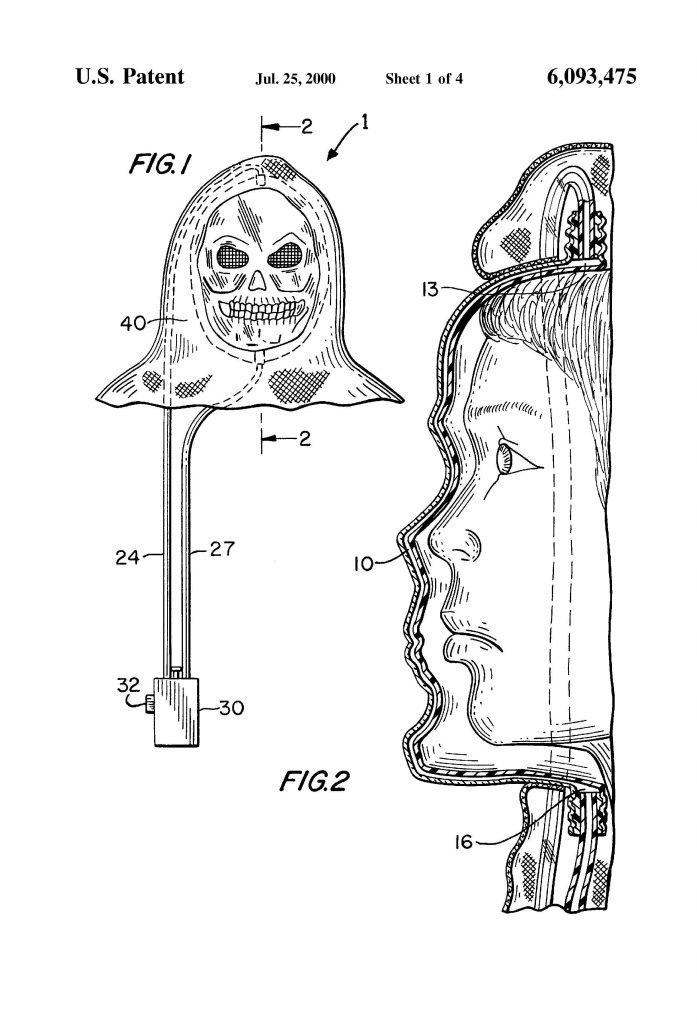
Spooktacular brands
We have all seen the aisles in supermarkets full of beloved Halloween themed candy, costumes, and home décor. All these can be unique to certain brands, like the LEGO® haunted house or Sanderson Sisters house. Hallmark Halloween themed cards and of course Hershey’s Peanut Butter Pumpkins. And for those not in the know, Hershey’s recently won a lawsuit brought by consumers alleging their aforementioned creepy chocolate pumpkins are not so creepy.
Creepy designs
Halloween wouldn’t be the same without its dazzling array of decorations—from eerie wall decals and ghost-shaped cake moulds to the iconic glow of intricately carved jack-o’-lanterns. These festive touches do more than set the mood—they’re also protected by industrial design rights.
In the UK, these rights help safeguard the unique visual appearance of seasonal products. That means the clever packaging on your Halloween sweets, the plush ghost toys in shop windows, or the lanterns lighting up your street can’t be copied without permission. Whether it’s a spooky silhouette or a charming character mold, design rights ensure that creators can enjoy the rewards of their originality, and that Halloween remains a celebration of imagination as much as fright.
Magically creative works
Imagine this: curled up on the sofa with some popcorn in hand, getting ready to watch horror films, followed by eerie board games about murder and mayhem and getting dressed up in fangtastic costume to receive your trick or treaters. These spine-chilling films and eerie soundtracks to Halloween-themed books and elaborate costumes, are creative works that capture the spirit of the season and are automatically protected by copyright the moment they’re created. This legal protection ensures that the original ideas behind these spooky creations remain in the hands of their creators. It gives them the right to control how their work is shared, reused, or adapted—helping Halloween-inspired creativity to flourish year after year.
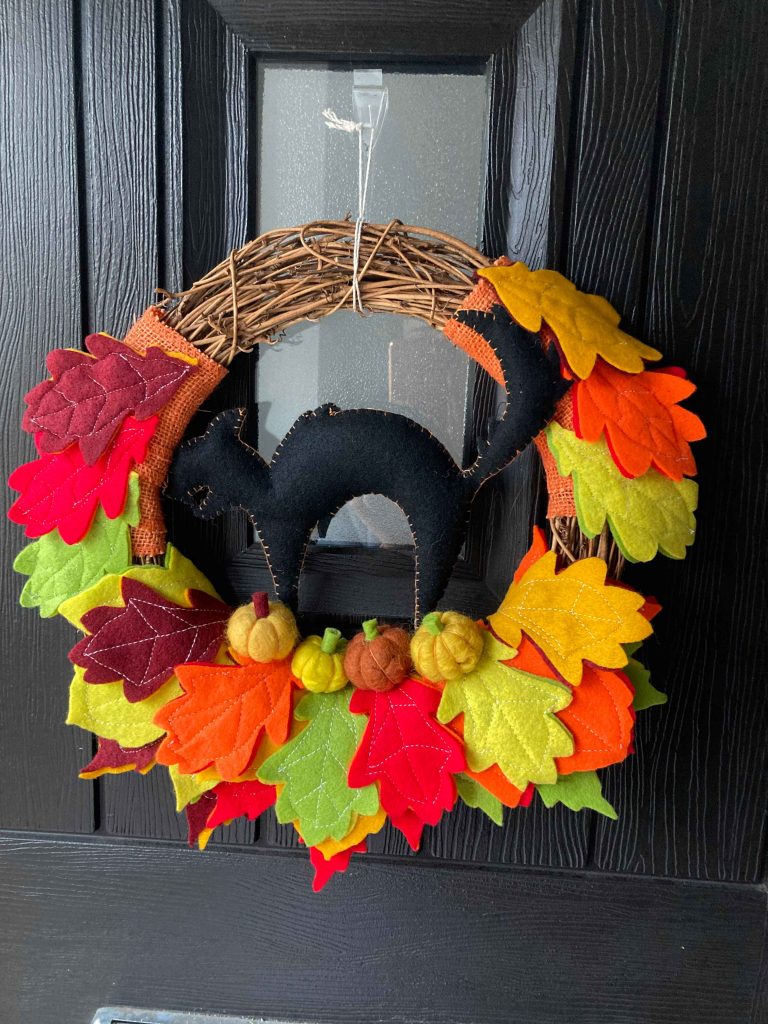
© Cristina Rusu for both the image and the wreath
Deadly secrets
Halloween would not be the magical, eerie and spooktacular night it is without some of its very own deadly secrets. I mean, trade secrets! Trade secrets are important in many businesses, think about the secret Coca-Cola recipe, or the KFC spices. When it comes to Halloween, you can have special formulas for glow-in-the-dark paints, special Halloween / October themed beverages (like Pumpkin Spiced Lattes) or even proprietary software for immersive haunted house experiences. This type of IP is important as it allows companies and businesses to keep a competitive edge while protecting those magical ingredients, you know, eye of newt and toe of frog, from the prying eyes of evil warlocks (mainly competition).
Ghoulographical Indications
You know that moment you crave something sweet but from a distinctively ghoulish region? How about some cioccolato di Modica, to start the day of, enjoying some Westfälischer Pumpernickel (Westphalian Pumpernickel) to your homemade pumpkin soup for lunch and ending with some good old Bayrisch Blockmalz (hard candy from malt extract) for an invigorating sweet treat before having some Cornish Pasties for tea. Now if you are thinking I completely lost the plot, you would be only partially right. Protected Geographical Indication (PGI) are registered products which come from specific locations around the globe. Put simply, you can’t sell name your pasty a Cornish one if it is not from Cornwall. It’s a way of protecting traditional food but also the consumer, Cornish Pasty should be from Cornwall, made accordingly to Cornish recipe. Geographical, pardon me, Ghoulographical Indications, do not protect only food, certain crafts and industrial products.
Witchy plants
I am sure, many of you are aware of the Witches Chant in Macbeth:
“Eye of newt, and toe of frog,
Wool of bat, and tongue of dog,
Adder’s fork, and blind-worm’s sting,
Lizard’s leg, and owlet’s wing,— […]” William Shakespeare

However, did you know that it isn’t really an eye of newt, but mustard seed, toe of frog is buttercup, wool of bat is holly leaves, tongue of dog is houndstongue, adders fork is violet, lizard leg is ivy and owlet’s wing is garlic while blindworm’s sting is knotweed. Similarly with other plant names, bella-donna is deadly nightshade while foxglove is digitalis. We also have plants named shepard’s purse or lady’s purse, and so on. But we are straying a bit far from the point and IP protections. Certain special and new plant varieties can be protected in the EU for a period of 25 years. From ghostly vines to bewitched asparagus, certain plant varieties—like trees, flower bulb clusters, woody fruits, and ornamental shrubs—can be protected for up to 30 years, keeping their witchy secrets safe from imitation.
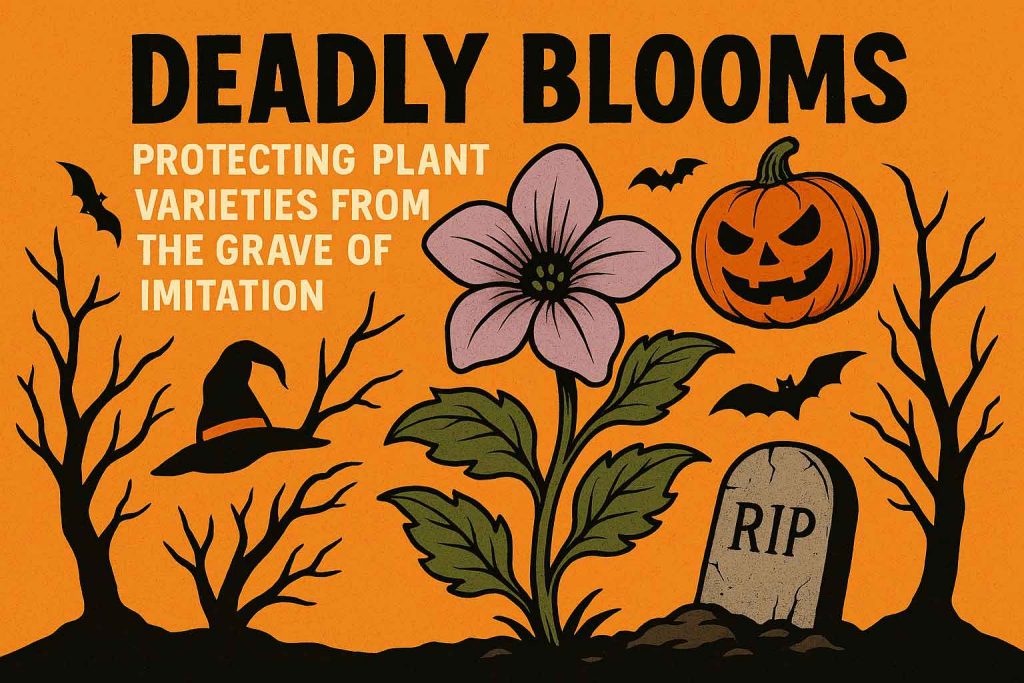
Image created with the help of Microsoft Copilot
The End
This is how our creepy IP story concludes. As you can see, IP protection applies to many weird and wonderful spooky things. These magical protections help creators and companies keep the Halloween spirit true and alive, making sure that each season brings with it something wickedly good.

The information contained in this blog post should be taken as recommended advice or guidance but should not be taken as legal advice. If in any doubt, please seek proper legal advice.
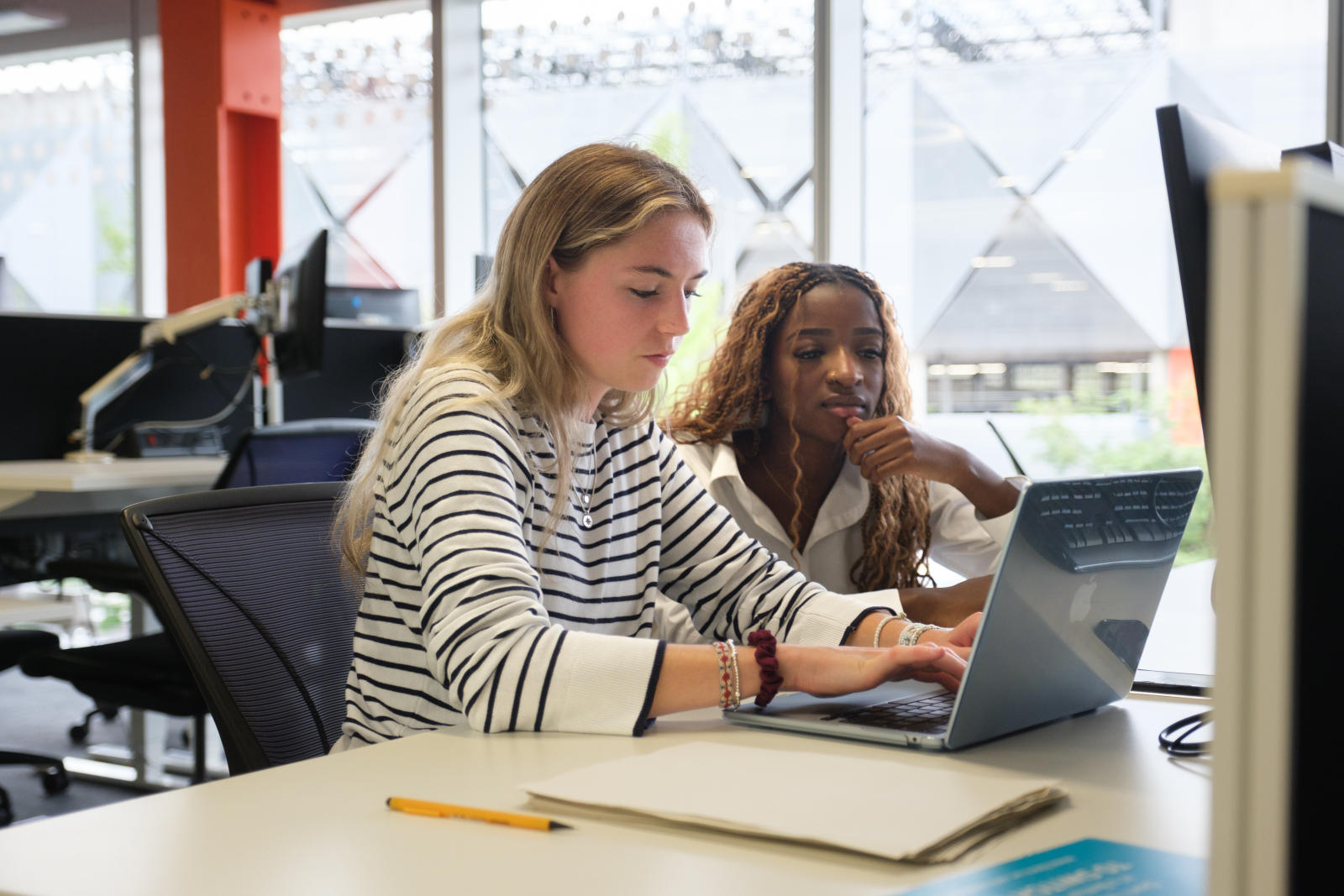
How can I avoid being accused of plagiarism?
Plagiarism means using someone else’s ideas without acknowledging where they came from. Every year, many students worry about being accused of plagiarism – especially after putting in so much time and effort on their assessments. So, how can you avoid falling into this trap? Luckily, there are several things you can do to steer clear of such academic misconduct:
Use your own words when reading sources and making notes
It’s convenient and tempting to highlight key ideas or copy exact phrases from the sources. But these methods aren’t as effective as making your own notes, since they don’t always require you to actively process the information. If you’re serious about understanding and mastering the material, try to put things into your own words – it helps you engage more deeply with the content.
Keep a record of your sources
At postgraduate level, you’re usually expected to read a wide range of sources when preparing for assessments, so it’s easy to lose track of what you’ve read. A common issue that can arise is mixing up ideas from your sources with your own opinions. To avoid this, keep a running list of everything you read. To take it a step further, you can also organise your ideas using research matrices.
Find out more about research matrices here.
Paraphrase or summarise the ideas from sources effectively
Paraphrasing means rewriting someone else’s ideas in your own words while keeping the original meaning, whereas summarising refers to condensing the main points of a source into a brief overview, also using your own words. As you can see, “using your own words” is key to both techniques, as they help demonstrate your understanding of the sources.
Find out more about the steps to effectively paraphrase or summarise ideas here.
Use quotation marks to enclose a direct quotation
If you’d like to use the original words from a source, make sure to enclose them in quotation marks and include a properly formatted in-text citation. However, relying too heavily on direct quotations can suggest a lack of understanding of the source material, so use them sparingly.
Find out more about the use of quotations here.
Cite everything that is not your own
You might think that you don’t need to include in-text citations for concepts or ideas you already knew before reading any sources, but this isn’t necessarily true. If an idea isn’t considered common knowledge, it’s important to cite the source where you found it. As for which referencing style to use, check your module information to find out the requirements.
Find out more about referencing here.
Develop your own ideas instead of always relying on sources
While it’s true that you should use sources to support your arguments, you shouldn’t solely rely on them when developing a body paragraph, as your voice may not be presented. Remember that, as postgraduate students, you need to show your own opinions and critical engagement with sources.
Find out more about presenting your critical voice here.
Lastly, some students may think that using generative AI tools to paraphrase or summarise ideas can help them avoid being accused of plagiarism. However, copying sentences generated by these tools is also considered plagiarism. For regulations on the use of Gen-AI tools, please refer to this page on the University website. If you’d like to learn more about upholding academic integrity, please visit this page on Learn for relevant resources.
Written by Bess Chan, EAP Tutor
Five Minutes With: Eric Hill
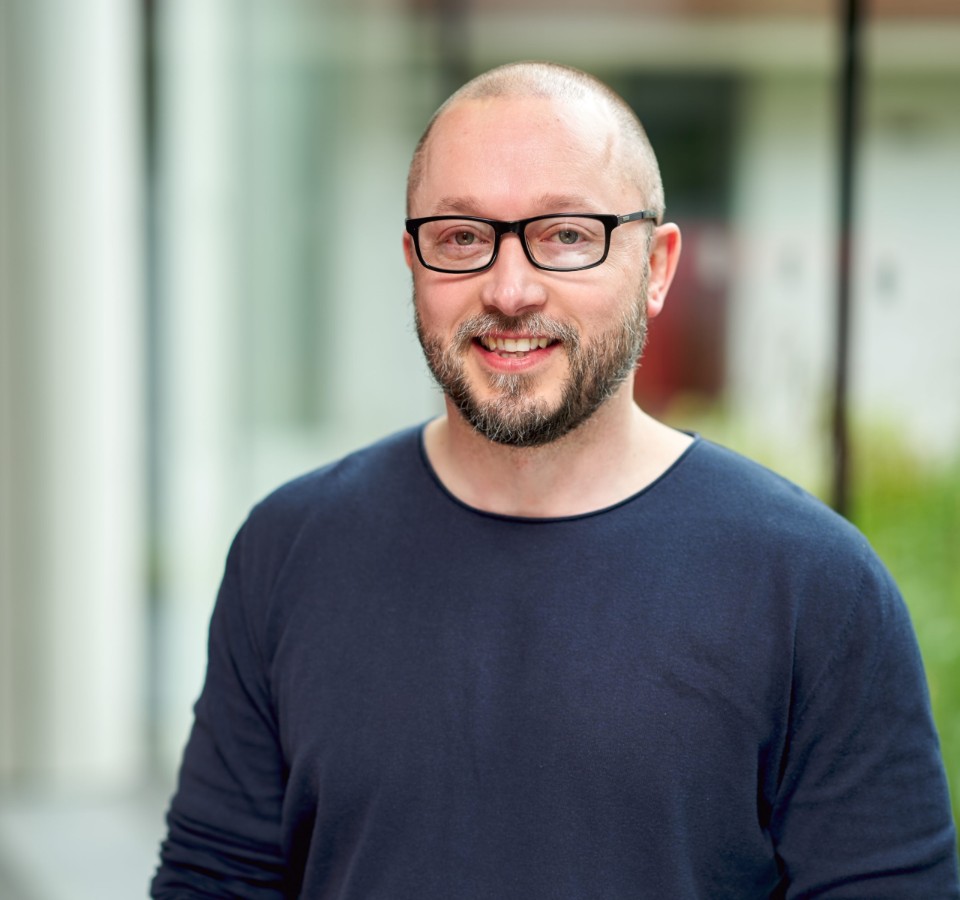
What’s your job title and how long have you been at Loughborough?
I am a Reader in Cellular and Molecular Neurobiology. I have worked at Loughborough University for about 2.5 years
Tell us what a typical day in your job looks like?
The thing that I really enjoy about being an academic is that my days are often quite variable. I typically like to get to work before 8am so that I can catch up with emails and administration tasks without distractions. My days will vary between teaching in lectures and practical laboratories and supervising project students carrying out research in my laboratory. I also spend a lot of time writing research grants and working closely with partners across Europe on our research projects. In my laboratory we grow brain cells that have been generated from stem cells. These need to be fed nearly every day and take about 3-6 months to mature. This takes a lot of time and often involves coming in the holidays and at weekends to make sure that they are healthy before we can do experiments with them. The laboratory is my happy place, so spend a lot of time in the lab!
What’s your favourite project you’ve worked on?
We have been working on a very exciting project over the past few years called NeuChip (https://neuchip.eu/). This research draws together a network of research working at the cutting edge of scientific discovery to demonstrate how human brain stem cells can be engineered into specifically designed complex circuits enabling them to function as an artificial biological computer. I have been able to work with fantastic scientists from around the world during this project and have been able to travel to learn new skills from other scientific disciplines.
What is your proudest moment at Loughborough?
During my time at Loughborough I have won a few awards in the School of Science including one for ‘Outstanding contribution to EDI’. This is an area I am passionate about. As an academic with ADHD I have tried to support academics and students living with neurodiverse conditions through education as well as coaching and mentoring.
Which University value do you most resonate with and why?
Collaborative: Although I have only worked at Loughborough for a short amount of time I have felt a strong sense of community. Research is incredibly collaborative and Loughborough is a great place to develop collaborations across multiple disciplines where people are genuinely excited by the work that they do.
Tell us something you do outside of work that we might not know about?
In my spare time I like weight training and going for walks out in the Leicestershire countryside. I love to watch live comedy and luckily my wife shares a similar sense of humour!
What is your favourite quote?
I teach synthetic biology and often refer to one of my favourite childhood books/films. “Life, uh, finds a way” Dr. Ian Malcolm (Jurassic Park)
If you would like to feature in ‘5 Minutes With’, or you work with someone who you think would be great to include, please email Lilia Boukikova at L.Boukikova@lboro.ac.uk
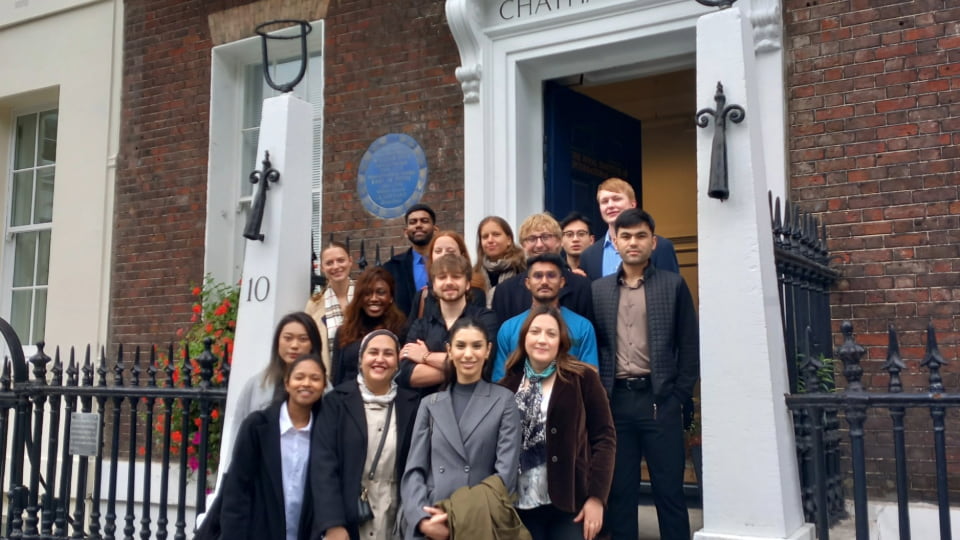
Will Iran Rearm or Reform? IDIA Students Explore Regional Diplomacy at Chatham House

By: K. Rashane Jude Pintoe Studying for MSc Security, Peace-building and Development
At the Institute for Diplomacy and International Affairs (IDIA), students are regularly given relevant and practical exposure to topics surrounding diplomacy, crises and security, as part of their flagship Inside the Profession Series of Events.
On 14 October 2025, students from IDIA attended a timely and thought-provoking event at Chatham House titled ‘Will Iran Rearm or Reform? War, Nuclear Standoff, and Shaken Alliances’. The discussion brought together leading experts on the Middle East and Iranian politics, including Professor Vali Nasr, Dr Sanam Vakil, and Dr Marion Messmer, and was chaired by Financial Times journalist Andrew England.
The event came at a critical moment in regional geopolitics. Just months after the US strikes on Iran’s nuclear sites in June 2025 and the subsequent peace agreement between Israel and Hamas in Gaza brokered by President Trump, questions continue to mount about Iran’s next move – will the Islamic Republic seek to re-establish deterrence through rearmament, or will it reform internally to consolidate stability?
For IDIA students, especially those currently taking the module ‘Diplomacy in the Digital World’ taught by Dr. Tatevik Mnatsakanyan, the event offered an opportunity to engage directly with these unfolding debates. It also provided a vivid example of how academic study connects with real-world diplomatic challenges.
Professor Vali Nasr, an Iran expert and Majid Khaddouri Professor at Johns Hopkins University, opened with a sobering assessment of Iran’s position in the aftermath of the strikes. Despite Washington’s claims that Tehran’s nuclear capacity had been permanently degraded, Professor Nasr argued that ‘Iran does not see itself as defeated’. Instead, he suggested, the leadership seeks to ‘restore a balance of power and deterrence with Israel’. His remarks underscored a broader point about the limits of coercive diplomacy, namely how military strikes may delay nuclear progress, but they rarely alter strategic intent.
Dr. Sanam Vakil of Chatham House’s Middle East and North Africa Programme reflected on the internal calculations driving Iran’s foreign policy. She noted that Supreme Leader Ali Khamenei faces a dangerous balance, namely on maintaining regime legitimacy, shaping his legacy, and preparing for succession – all amid economic strain and social discontent. This discussion resonated strongly with students examining how domestic politics intersect with international positioning of world leaders and political parties.
The speakers also addressed the fragmentation of Iran’s regional influence. As Dr. Marion Messmer observed, Tehran’s so-called Axis of Resistance, stretching from Hezbollah in Lebanon to Hamas in Gaza, has faced significant setbacks. The weakening of allies such as the al-Assad regime in Syria and the strain on Hezbollah’s military capacity have eroded Iran’s defensive buffer, challenging its long-standing strategy of deterrence through proxies, thus making them defend themselves in their own land.
Equally intriguing was the conversation about Iran’s evolving domestic policy. Professor Nasr pointed to a subtle shift toward pragmatism in social governance, speaking for example on the hijab issue, which he said is no longer as strict as it used to be. With the regime prioritising survival over ideological rigidity, authorities appear less inclined to provoke major uprisings through strict enforcement. This dynamic, he suggested, reflects a broader recalibration within the Islamic Republic – one that seeks to preserve stability even as its ideological core remains intact.
Reflections: Learning Beyond the Classroom
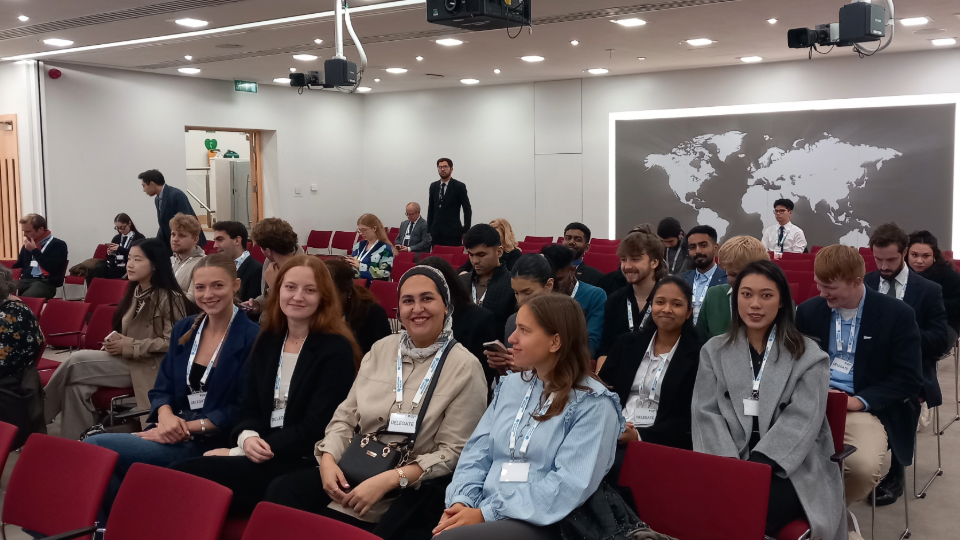
Students found the session both intellectually stimulating and professionally enriching. One student, Sirojiddin Gulomov, reflected:
‘We received really valuable data from scholars about Iran – about its geopolitical position, domestic challenges and its evolving relations with regional and global powers’.
Celine Erciyas added: ‘As a Master’s student in Diplomacy and Sport, I really appreciated attending the Chatham House conference: Will Iran Rearm or Reform? I learned a lot about Iran’s current political situation. The discussion made it clear that lasting peace in the Middle East is impossible without an agreement with Iran. I also found the insights on Iran’s growing ties with Russia and China particularly interesting, as they show how Tehran is adapting to Western pressure and reshaping its alliances. Overall, it was a very enriching event’.
Mohammad also reflected: ‘The visit was interesting, and the subject was very relevant, although I’d like to have seen more discussion of missed opportunities for diplomacy; as well as on projections of possible future developments or shifts in strategies in Iranian foreign policy. The opportunity to visit Chatham house was an honor by itself. Overall, I was greatly happy to have such an opportunity and hope to be able to attend other panels soon’.
The exchange also illustrated the value of exposure to practitioners and scholars who operate at the frontlines of policy debate. As many IDIA students prepare for careers in diplomacy, analysis, or international advocacy, hearing directly from figures like Professor Nasr and Dr. Vakil provided practical insight into how strategic decision-making unfolds in complex environments.
For IDIA, events like this reflect the Institute’s ongoing commitment to integrating academic study with professional experience. They also remind students that diplomacy is not confined to negotiation tables or statecraft alone, but is equally about understanding context, culture, and the calculations that drive national behaviour.
As Yan Chen noted, ‘It was really exciting to be part of an international forum in person. I’m so thankful for the chance because it made all those textbook ideas feel real. I realised that international relations and diplomacy are much more complicated than they seem in theory. I also noticed how much skill it takes to speak diplomatically, or on sensitive political themes.’
Reflecting on the event, I was struck by how the discussion illuminated the tension between deterrence and diplomacy that defines Iran’s current trajectory. The talk underscored that Iran’s choices will shape not only its future but also the strategic architecture of the wider Middle East. More importantly, it reminded us that diplomacy remains indispensable even in times of confrontation.
As the region continues to recalibrate after years of upheaval, the perspectives shared at Chatham House offered students an invaluable window into the intersection of power, policy, and principle. For those of us studying at IDIA, it was a vivid reminder of why we engage in this field – to understand, interpret, and one day influence the forces that shape global peace and security.
Apply to study in one of our Master’s Programmes here.
Read more about our Inside the Profession Series of Events here.

Webinars and whatnots – October 2025
Upcoming:
- PLOS Webinar: Open 2.0–The curious case of open science. Case-studies in monitoring open science. Fri, 31 Oct 2025 2.30-3.30 PM CET
- Liverpool John Moores University Open Data Week 2025: Introduction to the Open Science Framework Mon, 10 Nov 2025 10:00 AM – 11:00 AM
- Liverpool John Moores University Open Data Week 2025: Opening Up Research-PGR Voices Mon, 10 Nov 2025 2:00 PM – 3:00 PM
- Liverpool John Moores University Open Data Week 2025: Choosing the Right Journal and Avoiding Predatory Publishers Tue, 11 Nov 2025 2:30 PM – 3:30 PM
- Liverpool John Moores University Open Data Week 2025: License to Share – Open Data and Creative Commons Wed, 12 Nov 2025 2:00 PM – 3:00 PM
- Liverpool John Moores University Open Data Week 2025: Research Data Visibility & Metrics (Scopus, ORCID, DORA-aligned practices) Thu, 13 Nov 2025 10:30 AM – 11:30 AM
- Liverpool John Moores University Open Data Week 2025: Anonymisation Techniques Fri, 14 Nov 2025 1:00 PM – 2:00 PM
Catch up:
Of interest:
Previous months’ Webinars and whatnots:
- September – none
- August 2025
- July 2025
- June 2025
- May 2025 – Midlands Innovation Open Research Week 2025
- April 2025
- March 2025
- February 2025
- January 2025
- December 2024
- November 2024
How to make friends and feel at home as an international student

Starting university in a new country can be an exciting adventure, but it can also feel overwhelming and daunting.
This blog offers tips and resources to help build a new home here at Loughborough.
Attend welcome events
The International Student Experience Team (ISE) hosts a variety of events throughout the year for all students including town tours and social events. These events are a great way to meet other students from over 100 countries and connect with support services like the Students’ Union, Academic Language Support, and LU Arts. Keep an eye out for the latest events on the Student Services website.
Join the International Students’ Network (ISN)
The ISN, part of Loughborough Students’ Union, is dedicated to supporting international students and celebrating cultural diversity. They host:
- Cultural exhibitions
- Social nights
- Online meetups
- A vibrant International Day celebration
You can also connect with regional ambassadors who represent different parts of the world, perfect for finding people who share your background or interests. Make sure to follow the ISN on Instagram (@lsu.international) to keep up to date.
Join clubs and societies
Loughborough has over 100 clubs and societies, ranging from sports and arts to cultural and academic interests. Joining one is a fantastic way to:
- Meet people with shared passions
- Try something new
- Build confidence and communication skills
Loughborough Sport offers an inclusive sporting experience through three main pathways:
- Athletic Union offers 62 sports clubs, ranging from elite level teams to beginner friendly groups. These clubs compete in BUCS competitions against other universities
- Intra-Mural Sport, otherwise known as Hall Sport, is a free, fun and competitive programme where students can represent their hall in weekly league events
- Recreational and Social Sport is all about fun, fitness and wellbeing, with no experience needed.
Connect through your course and halls
Some of the easiest friendships start with the people around you:
- Say hello to your flatmates
- Chat with classmates before lectures or during group work
- Join study groups or attend academic support sessions
Remember, everyone is looking to make friends, just like you.
Use wellbeing and support services
Feeling at home isn’t just about socialising, it’s also about feeling supported. Loughborough offers a wide range of support for international students, including:
- Health and wellbeing support
- Faith and spirituality spaces
- Visa and immigration advice
- Career guidance
- Academic support
Tips from current student Ardhil Zubairdeen
Ardhil is originally from Sri Lanka and is currently studying Accounting and Financial Management at the University. He offered the following advice for new international students:
- Get involved early: Join as many societies and sports clubs as you can during your first year, it’s one of the best ways to beat homesickness and meet new people. Loughborough is great for this, and if you don’t find a group that matches your interests, you can even start your own society!
- Consider a part-time job: Taking up a part-time role can be a great way to gain experience and balance your priorities. I highly recommend the Student Ambassador scheme – it’s flexible, lets you choose your shifts, and offers opportunities to work across campus and even abroad. It was one of the highlights of my time here.
- Join the ISE activities: The International Student Experience team runs fantastic trips and events throughout the year. These are not only fun but also a great way to expand your network, connections that could be valuable when you start looking for jobs after graduation.
Making friends and settling in takes time, but every step you take brings you closer to feeling at home. Be open, be curious, and don’t be afraid to reach out. Loughborough is a welcoming, diverse community, and you’re already a part of it.
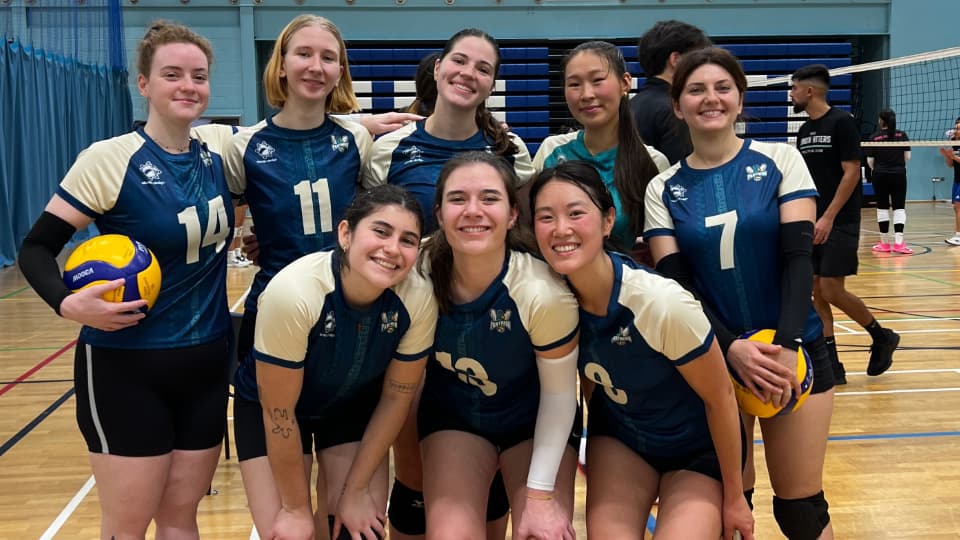
Knee-pads, nets and new friends: Getting invovled in amateur sports

Micaela, who was the Loughborough University London’s Sport Student Ambassador for the 24/25 academic year has been an active member of Pantheon Volleyball Club, an amateur sports club that boasts both men’s and women’s teams. We caught up with Micaela, who was enjoying some time off after submitting her dissertation, and asked her about the experience!
When did you start playing volleyball?
I started playing volleyball in 2011 when I was only 11 years old! I was always among the tallest girls in my school, and volleyball is a very big sport in Peru, where I’m from, so I decided to give it a try and immediately fell in love with it.
I then went on to play competitively for a club in Lima throughout university, and I’ve been playing club volleyball in London for the past two seasons. I’d say the best thing about volleyball is playing in a team. I’ve met some of my closest friends through volleyball and can say that the impact of the people you share a court with extends far beyond that.
What other sports apart from volleyball are you a fan of?
I will watch almost any sport as long as I can understand how it works, and especially if it’s women’s sport.
I’m generally a big fan of team sports, having grown up watching the NBA with my dad and brother, and every football World Cup.
The Olympic Games have always been my favourite to watch because of the number of options available, and when they’re on, I watch a lot of diving, swimming, and athletics. Recently, I’ve been watching a lot of women’s football, following both the Lionesses and Arsenal!
Tell us about your involvement with a volleyball team here in London?
Pantheon Volleyball Club was founded in 2023 as a student-led club that provides coaching sessions, open-format games, world-class clinics, and tournaments. I’ve been working closely with them since early 2025, organising and delivering their summer tournaments.
As the Pantheon community keeps growing, we wanted to create a competitive section of the club earlier this year and now have a women’s and men’s team registered in the London Volleyball League. We will be debuting this season and are looking forward to the next few months full of volleyball action!
What were some of the challenges you faced setting up the summer tournaments and competitive teams?
Thankfully, the set-up process has been running quite smoothly, so the biggest challenge during the initial stages was getting used to working with a new team behind the scenes, understanding their styles and processes, and adapting to make sure we were working together as best as possible. Maintaining clear communication between us has been one of the hardest things to manage, but as we continue working together throughout the season, we are getting better at it!
What do you find most rewarding?
The highlight of setting up the Pantheon competitive teams has been seeing the final product that we’ve been working towards for months. Seeing our idea grow into a real club, that is now competing and wearing our club colours, has been super rewarding, and being part of the team has been the cherry on top.
Getting to reconnect with past teammates has also been amazing, even more so in this specific club, where we constantly strive to create a space where players feel welcome and that they belong.
Tell us a bit about your time at Loughborough University London
I studied MSc Sport Business and Innovation, and during my time here was the Sport Student Ambassador. I worked closely with the student experience team to deliver sport-related events for students around campus. We hosted a range of events, from sport quizzes, futsal and basketball tournaments to networking events.
My favourite event would have to be the International Women’s Day Insights and Networking Evening with ISB Alumni, where we got to hear about their experiences working in a male-dominated industry. The Sport Student Ambassador role was a highlight of my time here and I would recommend it to anyone interested in sport events!
Micaela also wrote a blog about her experiences being the Sport Student Ambassador that you can find here.
What would be a dream career move after your studies?
I would love to work in the sport events space, either in the organisation, planning and/or delivery of them. A personal goal would be to work in a mega-event like the Olympic Games or the football World Cup.
The industry exposure and networking opportunities that I have been able to access during my time at Loughborough University London have helped me a lot in getting started on my trajectory to achieving my professional goals.
Once Grass, now Tarmac - why 600 football pitches of nature in Europe are being lost each day
This blog post has been taken with approval from the Barbour Consolidated Monthly Bulletin, for more information please see here.


An investigation by the Guardian and partners has revealed that Europe is losing green space at the rate of 600 football pitches a day. This is land that once harboured wildlife, captured carbon and supplied food.
Analysis of satellite imagery across the UK and mainland Europe over a five-year period shows the speed and scale which green land is turning grey, consumed by tarmac for roads, brick and mortar for luxury golf courses and housing developments.
The loss of the Amazon rainforest has been measured for years using satellite imagery and on the ground monitoring, but until now the scale of green land in Europe has never been captured in the same way.
The Green to Grey project, working with scientists from the Norwegian Institute for Nature Research (Nina) to measure nature loss, reveals the scale of nature and farmland engulfed by human interventions.
The cross-border project by the Guardian, Areana for Journalism in Europe (Arena), Nina, the Norwegian broadcaster NRK and other news outlets in 11 countries found that Europe loses about 1500 sq. km a year to construction.
According to the data, about 9000 sq. km of land, an area the size of Cyprus, was turned green to grey between 2018 and 2023, equivalent to almost 30 sq. km a week, or 600 football pitches a day.
Nature accounts for the majority of the losses, at about 900 sq. km a year, but the research shows we are also building on agricultural land at a rate of about 600 sq. km a year with consequences for the continent’s food security and health.
The most common developments, accounting for a quarter of all cases, were for housing and roads, but nature and farmland is also being destroyed to accommodate luxury developments for the tourism and consumerism industries.
The analysis covered 30 countries and whilst every country examined is losing natural and agricultural areas, but some are worse than others. The 5 countries with the highest green losses between 2018 and 2023 were:
- Turkey, <1800 sq. km lost
- Poland, <1000 sq. km lost
- France, 950 sq. km lost
- Germany, 720 sq. km lost
- UK, 604 sq. km lost
More information on this project can be found on the Green to Grey Website.
The UK is in the bottom 12% of countries globally for biodiversity intactness (Source: Rewilding Britain). The most recent check of our wildlife, the 2023 State of Nature report, revealed that across the UK species studied, there has been an average decline of 19% and 16% are threatened with extinction (State of Nature Report, 2023).
Here at Loughborough, we are trying to combat the problem of biodiversity loss through developments of a new Biodiversity Action Plan, commitment to Nature Positive Universities and our currently beginning a trial of Nature Friendly Grounds.

My experience of being the Sport Student Ambassador

We had a chat with Micaela who did a great job as the the Sport Student Ambassador for the 24/25 academic year. She told us about her experiences and reflections during her time in the role!
Tell us a bit about yourself and what you studied at Loughborough University London?
I’m a recent MSc Sport Business and Innovation graduate, and although I’m originally from Lima, Peru, I’ve lived in London since 2021! I also studied for my undergraduate degree in London, and by the time I graduated, I realised that I wanted to pursue a career in the sports industry, so I was immediately drawn to Loughborough University London.
I had a great time at Loughborough University London, and I’d say the best thing about studying here is the access to world-class academics and constant exposure to industry. My way of thinking about sports has completely transformed thanks to the amazing opportunities afforded to me at the University.
What motivated you to apply for the role of Sport Student Ambassador?
I have a strong passion for sports events across the board, and love being involved in their planning, organisation and delivery. I hope to develop my professional career in the sports events space, so I was very interested in the role.
The Sport Student Ambassador role greatly appealed to me as it was a great opportunity to have a part-time job during my master’s, whilst continuing to grow my experience in the realm of sports events.
Tell us about some of the things you do as a Sport Student Ambassador?
I worked closely with the University and the Sports Committee to plan, organise and deliver sports-related events for the Loughborough University London student body. This included regular catch-ups with Grace from the student experience team to understand what type of events the university was looking to host, especially around key dates like Christmas or International Women’s Day.
I also worked very closely with the Sports Committee to gauge and understand what the student body was interested in, so that we could create events best suited for what students wanted to attend.
The most fun part of the role was hosting the events, from tournaments to quizzes, we made sure that there was always something for everyone. This role taught me the importance of clear and constant communication, as a large part of my role involved making sure that priorities were appropriately communicated.
How did you manage studying and the role of Sport Student Ambassador?
The Sport Student Ambassador role is quite flexible, and one of the benefits of working closely with the University is that prioritising your studies is encouraged. Thanks to this, I always felt comfortable taking on less work around deadlines or busier academic periods. Sometimes things would clash, however, so good time management was important. I am a calendar lover, so I always had all important dates, deadlines and events, as well as my other commitments, in my phone calendar so I could access them easily.
This experience also helped me hone my time management and prioritisation skills, especially around university deadlines and knowing how and when to prioritise properly.
What was your favourite event/initiative you have put on, and why?
The International Women’s Day Insights and Networking Evening with the Institute for Sport Business (ISB) Alumni takes the top spot for me. I collaborated closely with the ISB to create this event, which aimed to connect the Loughborough University London community by showcasing past students’ trajectory into the workforce.
It was very inspiring to hear their stories and how women are creating their own spaces in a traditionally male-dominated industry such as the sports industry, and a pleasure to provide a space for them to share their experiences with current Loughborough London students.
Any advice for someone looking to be a Sport Student Ambassador?
The role is what you make it, so make it yours. This is a great opportunity to bring your own interests to the table, so make sure that you don’t shy away from them. I would also say to be open-minded, you’ll connect with some amazing people, which can really broaden your understanding.
But most importantly, I’d say enjoy it; it’s a really cool role so make sure that you have fun with it!
Finally, what is your favourite thing about Loughborough University London?
The community! I’ve met some fantastic people during my time here, both in and out of lectures. The fact that it’s a small campus allowed me to create deep and meaningful relationships and to also meet people and create connections that maybe would have been harder to establish in a bigger university.
If you want to find out more about the opportunitites for being a Sport Student Ambassador head to the webpage!
Five Minutes With: Matt Hammonds
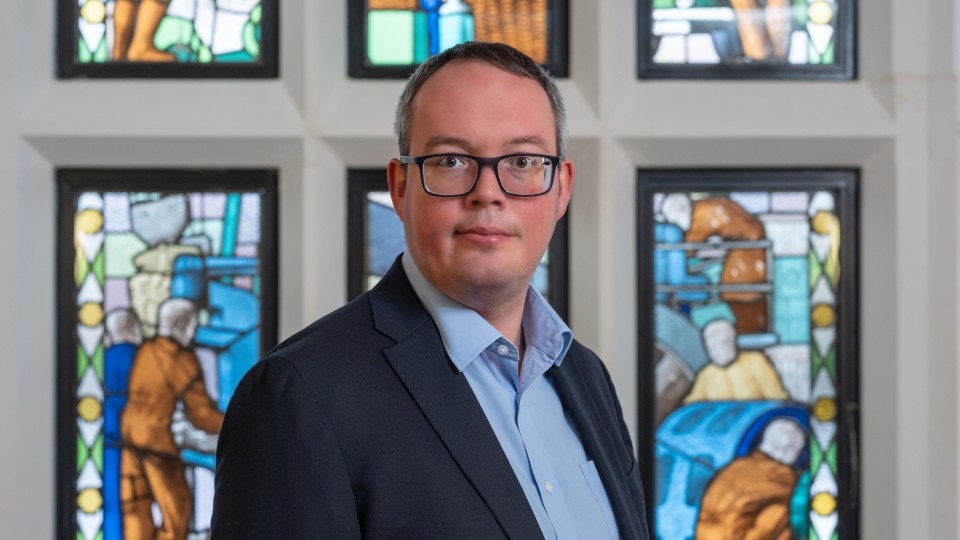
What’s your job title and how long have you been at Loughborough?
Director of Human Resources. I joined the organisation almost a year ago.
Tell us what a typical day in your job looks like?
I’ve worked in the HR and OD profession for almost 16 years. I can honestly say no two days are ever the same. I am fortunate in my role that I get to be involved in a whole range of things from recruitment, providing advice around a policy, helping to develop staff wellbeing initiatives or discussing our future people strategy. It’s a role and a profession with a huge amount of variety which I’m very grateful for. I have a fantastic team in HR who work with me to provide the HR service to colleagues across the organisation.
What’s your favourite project you’ve worked on?
So far the work that we did to introduce the Loughborough Real Living Wage supplement to enable us to come up with a local solution to address primarily pay compression within the University salary scale structures, particularly in the lower grades. When I started it was a common issue that was fed back to me and a solution didn’t seem readily available. Working with colleagues from within my team and across professional services we were able to come up with a solution for colleagues at Loughborough. We were pleased to receive a lot of positive feedback after its implementation.
What is your proudest moment at Loughborough?
So far it’s been attending Graduation week and seeing all of the students, their families and friends celebrating their collective achievement and the start of the next stage of their lives. The same week we received an email from a graduating student sharing how grateful they were and how every single member of staff across the campus had made a difference in their journey. It really was a great summary for me of the huge difference we make each and every day working together in our roles.
Which University value do you most resonate with and why?
Collaborative is the value that resonates mostly with me. It links in to my favourite quote because I believe what we can collectively achieve together, with all the skills, knowledge and experience we have is far greater than anything we can achieve alone. In the years ahead collaborative working is going to become more essential, and after all our University Strategy is Creating Better Futures. Together.
Tell us something you do outside of work that we might not know about?
Everyone in my team knows this already but I’m a huge Star Trek fan and have been ever since childhood. Probably one of the lesser known facts about me is that I’m a qualified musician. When I was growing up I studied my diploma in music playing the organ and piano. I sadly don’t have time to play much anymore between a busy work and social life.
What is your favourite quote?
No one of us is as clever as all of us.
If you would like to feature in ‘5 Minutes With’, or you work with someone who you think would be great to include, please email Lilia Boukikova at L.Boukikova@lboro.ac.uk

October Copyright Reads
Ah! The beauty of October. The days are drawing in, the air is crisp with just a nice hint of smoke from wood fires in the air, colourful leaves, pumpkin spiced lattes and just general autumnal vibes! Can you tell I love autumn?!

Two attendants are warming sake on a fire of autumn leaves; a woman stands like an apparition between them, holding the sake bottle. Colour woodcut by Kunisada II, 1857. by Kunisada – 1857 – Wellcome Collection, United Kingdom – CC BY.
On a more serious note, and before we move on to this month’s selection of copyright reads, October is also Breast Cancer Awareness Month. This is specifically important to me, as my own mother passed away from breast cancer. So if you have breasts, make sure you check them regularly and if you notice anything suspicious see your GP about it. Advise you friends and family to do so as well. Also, if you are called to breast screenings, attend them. Breast cancer is nowadays more survivable than it used to be. Stay safe, and let’s beat cancer!

And now, back to this month’s copyright reads. In the Romanian calendar, October is classed as brumărel, a diminutive from of the word brumă (hoar frost), so in English little hoar frost. Now, you might or might not be aware of the fact that Romanian is a Romance language (derived from the language of the Romans and Latin) and as all Romance languages (Spanish, Italian, Portuguese, French) uses diminutives. In general we use them to highlight smallness, affection or disdain. Languages are fun, aren’t they?! However, shall we return to our sheep (Să ne întoarcem la oile noastre!)? (Romanian saying to get back to business)

Image of lambs, sitting under a tree, © Cristina Rusu, 2022
We have some good ones for you this month. We have the final act in Taylor Swift and her Masters Saga, some not so veiled attack on Freedom of Speech in America, all things AI with more lawsuits, some copyright fun the pirate way, and so much more!
Happy reading!
How Swift Got Her Masters Back [Video] – US copyright
Applying a CC licence on YouTube
Jimmy Kimmel taken off air ‘indefinitely’ following Charlie Kirk comments
Delhi High Court orders Sci-Hub to be blocked in India
Weaponized Copyright: The New Censorship
Movie and TV Copyright Lawsuits Are on the Rise. Very Few Prevail In Court
Uni students are using AI to ‘ask stupid questions’ and get feedback on their work
How to Save My AI Lover? Legal Questions Around AI Companions
Switzerland launches transparent ChatGPT alternative
Against the Uncritical Adoption of ‘AI’ Technologies in Academia
What is AI slop? A technologist explains this new and largely unwelcome form of online content
Open Science and Copyright report
How data centre expansion risks derailing climate goals
AI in Libraries – Horizon Scanning Bodleian Libraries
Universities Are Selling Themselves Off Piece by Piece
Bulgaria ranks among EU’s worst-hit countries by forest fires in 2025
Why AI cannot be an inventor: a post-humanist rejection of AI as legal inventor
Morgan & Morgan sues Disney over Steamboat Willie Mickey Mouse ad
After Fair Use: AI and Copyright
A Comparative Framework For AI Regulatory Policy: Copyright and AI
Are Copyright Anxiety and Legal Chill Hampering Your Work?
Inside the battle to make AI giants pay for content [Australia]
Pirate’s Code of Creative Loot (UK Edition) [Fun quiz to celebrate Pirates Day! Arrr me hearties!]
Using Generative AI in Content Production [Netflix’s new policy on AI content production]
Disney, Universal, Warner Brothers sue MiniMax for Hailuo Agent video generator
Beyond the AI-copyright wars: towards European dataset law?
Communication to the public is about to shape the future of AI copyright
Generative AI in fashion design creation: a copyright analysis of AI-assisted designs
Encyclopedia Britannica sues Perplexity over AI ‘answer engine’
Artificial Intelligence and Fundamental Rights: The AI Act of the European Union and its implications for global technology regulation [Open Access book]
Piracy vs. Fair Use: How AI Training Intersects With Copyright Law
We hope you enjoyed this month’s copyright reads. There is a lot happening in the world, so why not take a minute and enjoy the beautiful autumn scenery.

View of Loughborough Campus in Autumn, October 2022, © Cristina Rusu
Note: While at the moment of writing Jimmy Kimmel has been reinstated on all Disney / Hulu and ABC services, who knows what will have happened by the time this post becomes available. To our readers in America, stay safe out there!

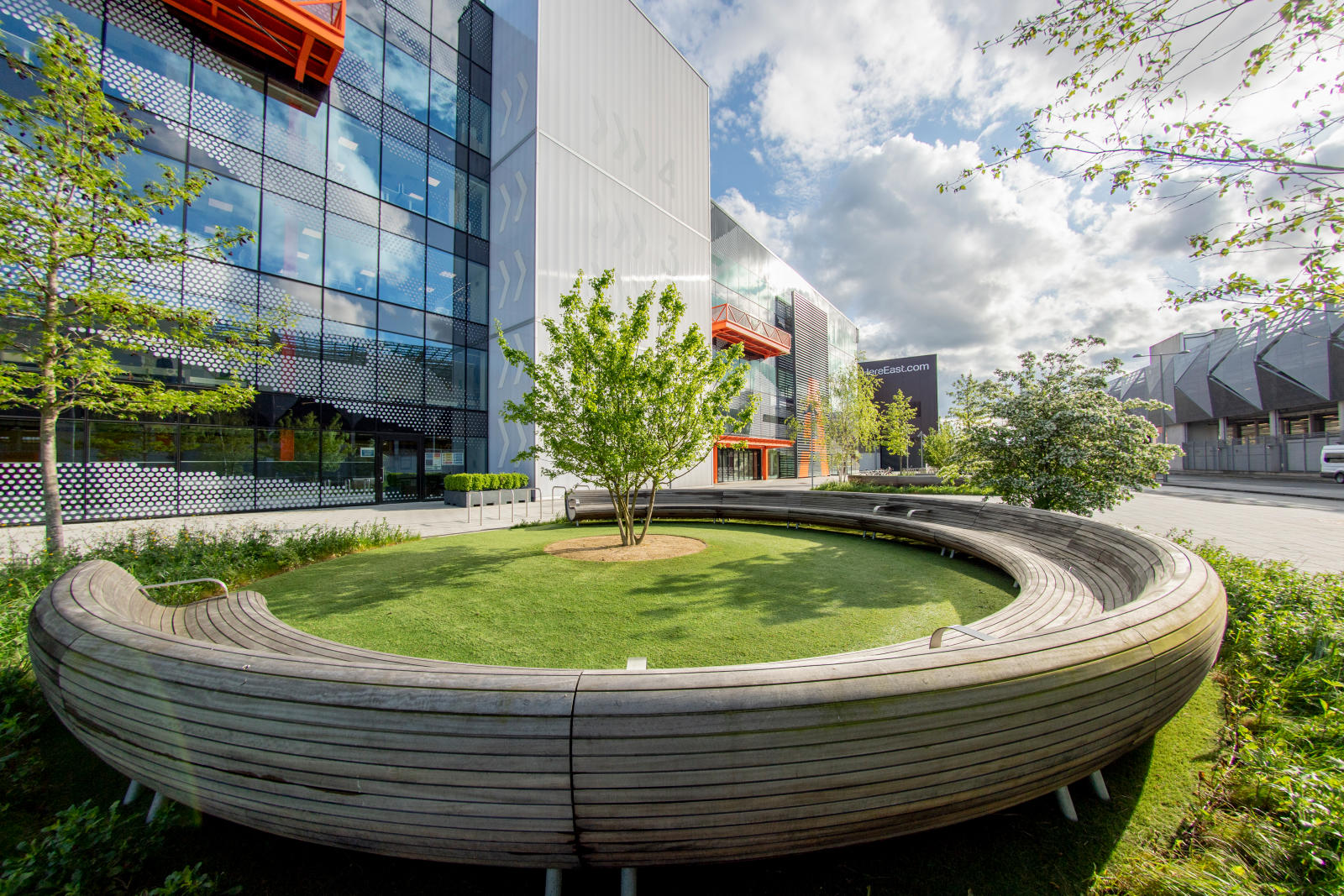
Moldova After Elections: Between Europe and the Echoes of the East (Past)
by Dr. Dorina Baltag, Visiting Fellow, Institute for Diplomacy and International Affairs
Moldova’s parliamentary elections have confirmed one thing above all: democracy in the region remains fragile, but alive. The victory of pro-European forces — narrower than before — shows that citizens still see their future anchored in the European Union, even if fatigue, frustration, and polarisation have made that choice more complex than in 2021.
The results reveal both resilience and vulnerability. Resilience, because despite relentless disinformation from Russia, economic hardship, and attempts to divide society, Moldovans once again rejected the promise of ‘stability’ offered by Moscow’s proxies. Vulnerability, because those same forces now sit in Parliament, ready to obstruct reforms and exploit divisions between citizens at home and abroad.
Election Climate: A Test of Resilience
This election became a testing ground — for Russia, which deployed multiple tools of interference, and for Moldova, whose institutions had to prove their resilience. For Moscow, this was the last real chance to cement political influence inside Moldova’s government — to bring loyal actors to power and preserve Moldova as a fragile state. A weak Moldova serves Russia’s destabilising interests at Europe’s frontier.
The country faced massive foreign interference, with hundreds of millions of euros funnelled to divide society, bribe voters, and amplify false narratives. Yet Moldova proved more resilient than expected. The government and institutions did a commendable job in raising awareness about the stakes of this vote and ensuring preparedness.
As experts assessed, compared to previous years, mobilisation was exemplary — media, police, the Central Electoral Commission, and civil society worked in coordination. Legal reforms introduced stronger safeguards for electoral integrity, backed by inter-institutional cooperation and swift responses to manipulation. Sanctioning political parties and politicians for illicit financing gave society a sense that impunity may finally be ending.
Moldova, EU and Russia
The current pro-EU ruling party – PAS – remains the strongest political force, securing 55 out of 101 seats in the next Parliament. This outcome represents a vote of confidence from citizens, even if it comes with a warning. The ‘hope vote’ of 2021 has given way to reform fatigue, slow judicial progress, and everyday economic pressures. For many Moldovans, the promise of transformation has yet to translate into better living standards — and people judge governments by the cost of life, not by policy frameworks.
At the same time, the pro-Russian Patriotic Electoral Bloc consolidated but did not expand the pro-Russian electorate, maintaining a stable 30–35% base concentrated in Gagauzia, Transnistria-adjacent districts, and rural communities. Its campaign relied on fear narratives — war, NATO, ‘loss of sovereignty’ — amplified by Russian-backed media and the co-optation of trusted institutions such as the Church, long absorbed into Moscow’s propaganda ecosystem.
For Russia, this election was a missed opportunity — its last realistic attempt to cement influence in the Moldovan government. A weak and divided Moldova would have served the Kremlin’s destabilisation agenda. Instead, the results confirmed that Moldovans—both at home and abroad—continue to choose Europe, even if that choice is cautious and conditional.
For the EU, the implications are equally clear: the pro-European majority is intact but vulnerable. PAS governs with a slim margin and faces an aggressive opposition determined to obstruct reforms and weaponise public frustration. The government must respond not with rhetoric but with results — improving living standards, strengthening the rule of law, and making the benefits of European integration tangible in every region, including Moldova’s periphery.
At the same time, Chisinau must not normalise anti-European narratives as a legitimate alternative in political discourse. The danger is not only external interference but also internal fatigue — when democracy feels abstract and distant. Moldova’s long-term stability will depend on moving beyond ‘geopolitical elections’ and building a political culture rooted in well-being, dignity, and credible governance.
The Road Ahead: Resilience and Lessons for Europe
Moldova has moved swiftly through the EU accession process — completing the screening stage and preparing to open the fundamental clusters of negotiations. The next strategic question is whether to decouple its path from Ukraine — a move that could accelerate Moldova’s readiness but also test regional solidarity.
The EU’s credibility now hinges on its ability to deliver on promises. Integration support must go hand in hand with protection against destabilising actors — both domestic and foreign. This means investing not only in state institutions but also in civil society, independent media, and diaspora organisations, which act as natural allies for democracy and communication.
Yet Moldova’s path to Europe will be shaped as much by resilience as by reform. The country continues to face security threats, economic fragility, and social divisions. Combating disinformation cannot rely solely on debunking falsehoods — it must focus on building trust, civic education, and inclusion.
For the EU, Moldova’s experience offers a broader lesson: strengthening democratic resilience in candidate countries is not only about institutions at home but also about diaspora enfranchisement abroad. These are complementary forms of resilience-building, showing how diaspora knowledge can advance democratic literacy and counter foreign manipulation.
Moldova’s story demonstrates that the defence of democracy does not stop at borders — it extends through the networks of citizens, both at home and abroad. Europe’s task is to support that connection: to make integration not just a bureaucratic process, but a lived experience of belonging.
These should be the last elections defined by geopolitics. The next must be about prosperity, justice, and dignity — the true hallmarks of Europe.
Dr Baltag is a Visiting Fellow of the Institute for Diplomacy and International Affairs. She researches EU external relations and diplomacy, with particular focus on the European Neighbourhood Policy and the performance of diplomatic organisations.

How to transform your day with music

Image: Courtesy of Getty Images
One powerful, often underestimated tool for enhancing our wellbeing is music.
Whether you’re working at your desk, commuting to campus, or winding down after a long day, music can be a transformative companion.
Research shows that music can have a profound impact on our emotional and physical wellbeing by:
- Reducing stress: Listening to calming music can lower cortisol levels and slow heart rate, helping you feel more relaxed.
- Improving your sleep: Calming music at bedtime can help reduce the time it takes to fall asleep, increase sleep duration, and improve sleep quality.
- Boosting mood: Upbeat music can trigger the release of dopamine, the brain’s ‘feel-good’ chemical.
- Enhancing focus and productivity: Instrumental or ambient music can enhance concentration, especially during repetitive or creative tasks.
- Encouraging movement: Music with a strong rhythm can motivate physical activity.
- Fostering connection: Sharing playlists or attending live music events can strengthen social bonds and create a sense of community.
Practical ways to use music at work
Here are a few ideas to integrate music into your daily routine:
- Start your day with a ‘mood boosting’ playlist to set a positive tone
- Use instrumental music during focused work sessions to reduce distractions
- Create a shared playlist with your team to build connection and discover new songs
Loughborough University staff playlist
We asked Loughborough staff to tell us about a song that makes them feel happy, calm, energised, or motivated. Here’s what they shared:
- Lilia Boukikova, Internal Communications Assistant: ‘Dive’ by Olivia Dean – “I love this song, it’s super upbeat and makes me smile!”
- Dr Ana Cristina Suzina, Lecturer in Media and Creative Industries: ‘The Little Train of the Caipira’ by Heitor Villa-Lobos – “It’s a piece of music that energises and moves me. If I am not able to move my body when I listen to it, it does not matter. I feel my soul dancing anyway.”
- Surya Mahdi, Teaching Associate: ‘Aja’ by Steely Dan – “It calms me when listening to it.”
- Sarah Van-Zoelen, Head of Occupational Health and Wellbeing: “I love running to anything by Sam Fender.”
- Bryony Stewart-Seume, Programme Quality Officer: ‘Ladybird’ by Natalie Merchant – “Any Natalie Merchant song fits the brief, as it doesn’t matter what mood I am in; her music always complements or lifts it, but ‘Ladybird’ is the epitome of this. It starts reasonably quietly, but by the end I am conducting the string quartet in its rousing finale. It lifts me, it motivates me, and it caresses my soul.”
- Rebecca Higginson, Reader in Metallurgy and Materials Engineering and Associate Dean for EDI: ‘Fields of gold’ by Sting – “It makes me feel calm.”
- Thomas Steffen, Reader in Control of Energy Systems: ‘Read my sign’ by Bell, Book and Candle – “For me it has to be metal. That may not sound relaxing, but it is. Just a matter of taste.”
- Anne Souchon, Professor of International Marketing and Associate Dean (Enterprise): ‘Pump It’ by Black Eyed Peas – “For pumping iron (pun intended) in the gym!”
- Courtney Reed, Lecturer in Digital Technologies and Creative Futures: ‘Mr. Blue Sky’ by Electric Light Orchestra – “I just love the positivity of the beat and the lyrics of the song, even at the end when of course the blue sky does have to fade away, its memory is still there. I can’t help but to jump around a bit or do some ‘running down the avenue’ when I hear it. Great for road trips!”
Get involved with music at Loughborough
LU Arts offer a variety of opportunities for staff to engage with music including:
- Seven music practice rooms on campus which are free to use and open every day from 8am-10pm (to access these music rooms you need to join the Music VIP club)
- Music short courses, one-off workshops and live music nights which take place throughout the year, keep an eye out for these events on the LU Arts events page
- The University Choir, open to staff, students and members of the public to join, they rehearse on Monday evenings during term time and put on two concerts each year
- Music tuition, available for beginners and advanced musicians, LU Arts currently offer tuition in clarinet, flute, guitar (acoustic, electric and bass), piano, saxophone, singing, violin, viola and other woodwind